Democrat Gil Cisneros defeats Republican Young Kim, flipping last GOP House seat in Orange County
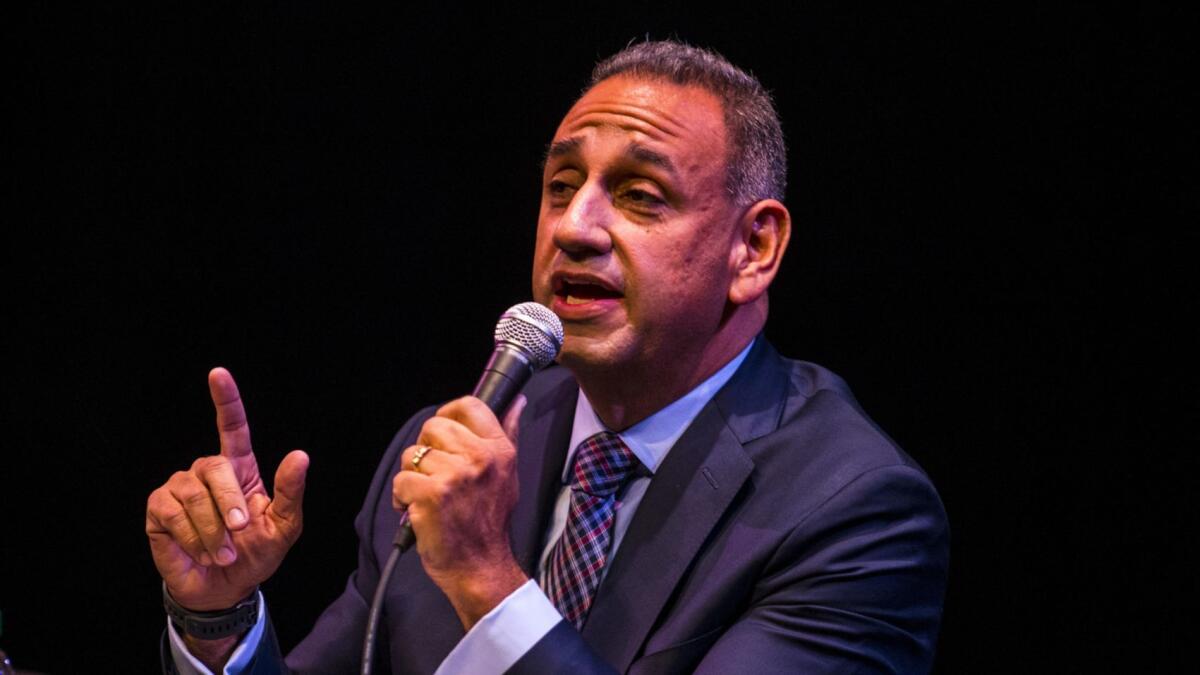
Gil Cisneros has defeated Republican Young Kim in the 39th Congressional District, putting the seat held by retiring GOP Rep. Ed Royce into the Democrats’ column. His victory means the longtime conservative stronghold of Orange County will be represented entirely by Democrats in the House next session.
Kim and Cisneros had been locked in battle over the seat left open by Royce’s retirement. Kim was considered by many to have an edge going into the race because of her name recognition and long history as a district staffer for Royce, who had endorsed her.
Cisneros, who dominated the money race by pouring $9 million of his own funds into his first run for office, tried to use President Trump’s unpopularity to weigh down Kim’s bid, even registering a lookalike campaign web address that declared “Young Kim is Donald Trump.” Kim broke with Trump on several of his policies, including family separation at the border and curtailing family-sponsored visas. Nearly a third of the district’s residents are Asian American, and a third are Latino.
Democrat Katie Porter unseats two-time incumbent Rep. Mimi Walters in California’s 45th Congressional District
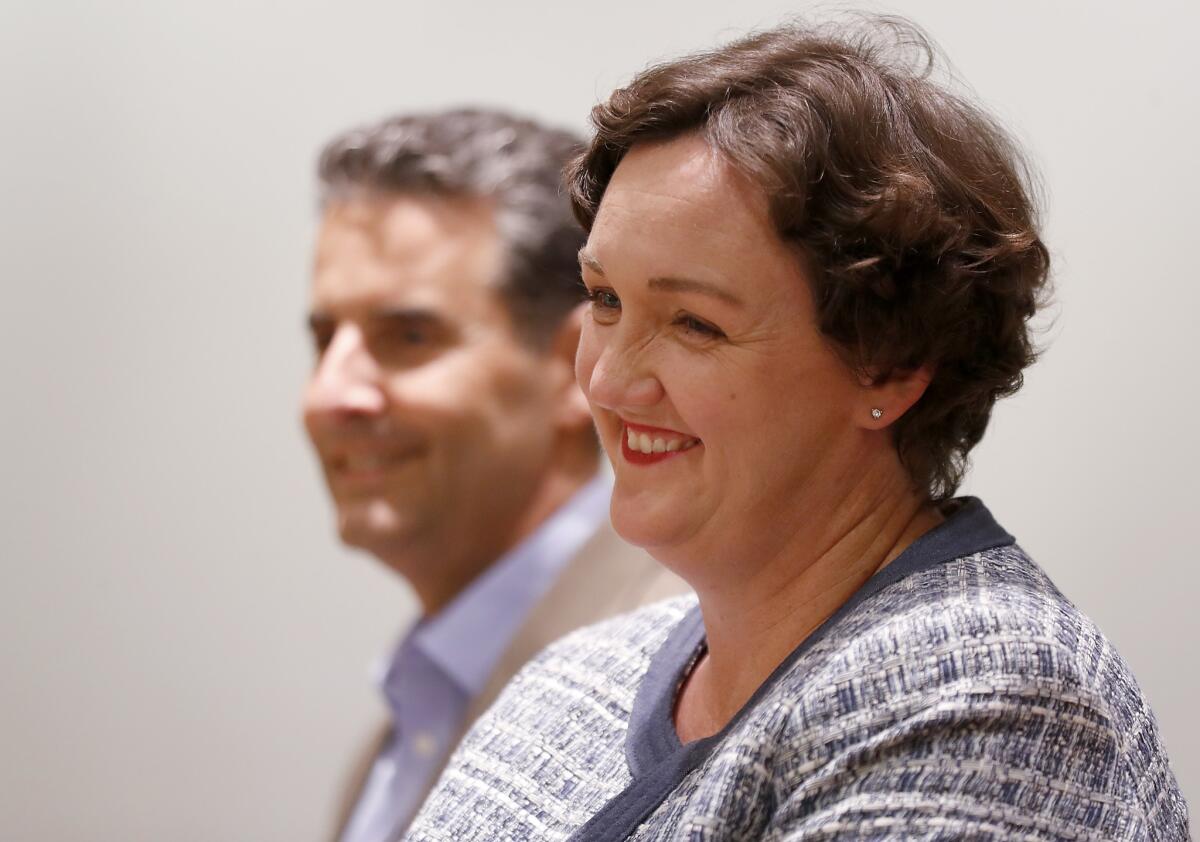
First-time candidate Katie Porter, a UC Irvine law professor and consumer protection attorney, defeated two-time incumbent Rep. Mimi Walters of Laguna Niguel in California’s 45th Congressional District, becoming the first Democrat elected to the seat in the longtime Republican stronghold in Orange County.
Porter ran on a progressive platform, touting her support for universal healthcare and vowing to take corporate money out of politics. Her victory in the wealthy, highly educated district including Tustin and Mission Viejo, which had never sent a Democrat to Congress, signals the shifting political landscape in the county.
Walters, a former state legislator, was first elected to the seat in 2014 by a wide margin and reelected in 2016 by a comfortable 17 percentage points, even as Hillary Clinton won the tony suburban district by five points.
Democrats saw an opportunity and poured in resources to back Porter and attack Walters, focusing on Walters’ record of voting predominantly in line with President Trump’s policies. Porter, who emerged from a crowded primary field even though the state Democratic Party backed another candidate fellow UC Irvine professor Dave Min, assailed Walters’ vote to repeal the Affordable Care Act and for the 2017 Republican tax plan, which could be costly for many Californians.
Walters avoided media attention and maintained a low profile throughout the campaign. Her ads told voters that Porter’s policies would result in massive tax increases and government-controlled healthcare.
GOP Rep. Jeff Denham loses heated race for Central Valley’s 10th District to Democrat Josh Harder
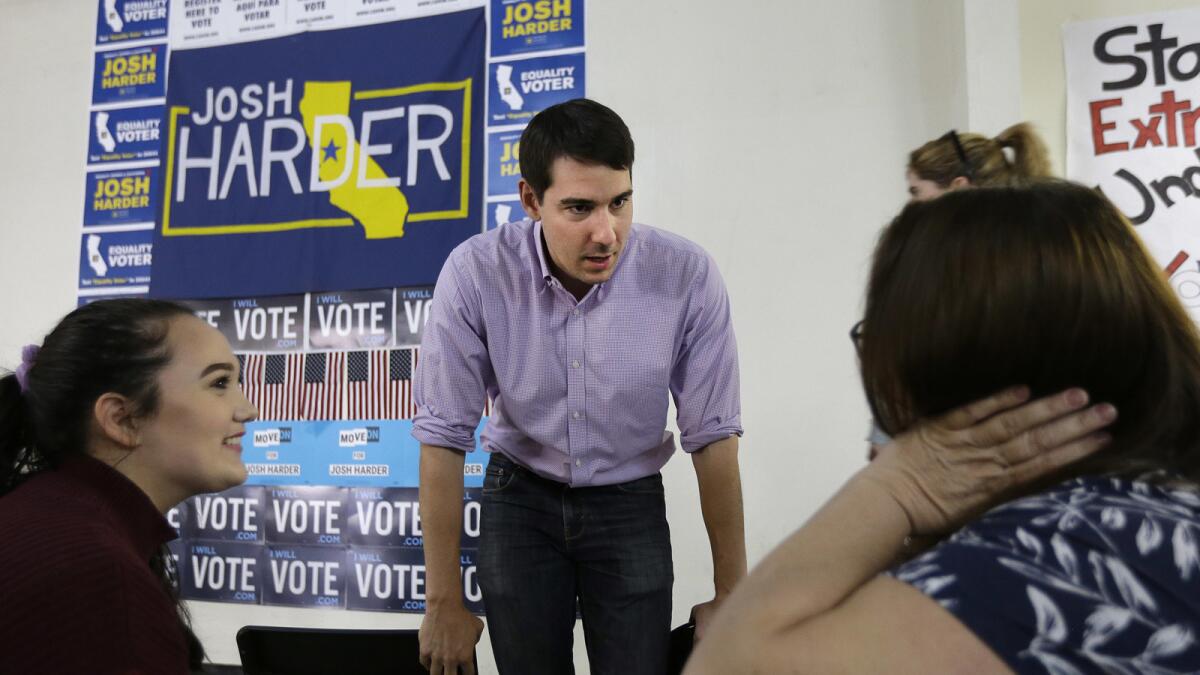
Republican Rep. Jeff Denham has lost a tight race against Democrat Josh Harder in a heated race for the Central Valley’s 10th Congressional District.
The seat was one of seven in California heavily targeted by national Democrats after the election of President Trump. Denham, 51, had previously beaten the odds in a district carried by Hillary Clinton and President Obama in the last two presidential elections.
Harder, 32, an investor and former venture capitalist, spent most of the last decade going to school and working on the East Coast. But he was born and raised in the district and said he decided to take on Denham upon his return to stand up to Trump and protect residents’ healthcare.
For years, Democrats have looked at the district that the three-term Republican congressman represents and seen winnable odds. The region, which takes in all of Stanislaus County and the southern portion of San Joaquin County, has a slightly higher share of registered Democrats than Republicans, and Latinos — who generally lean Democratic — make up nearly the same percentage of residents as non-Latino whites. But higher GOP turnout has given Republicans an edge.
Until now, Denham had managed to keep a low national profile, more likely to be known among supporters at home as a fellow farmer committed to water and other agricultural issues. But Trump’s presidency thrust new attention on his farming credentials and policy decisions, including his middle-of-the-road approach to immigration.
Harder attacked Denham for supporting the GOP tax bill and voting to repeal the Affordable Care Act. Denham attempted to cast Harder as a Bay Area outsider with little experience on one of the Central Valley’s key issues — water.
Both oppose Democratic Gov. Jerry Brown’s delta tunnels proposal and had pledged to fight a plan by the Democrat-appointed state water board that could reduce the amount of water diverted from Northern California rivers for irrigation.
GOP Rep. Tom McClintock defeats Democrat Jessica Morse in deep-red Sierra Nevada district
Republican incumbent Tom McClintock of Elk Grove has defeated Democrat Jessica Morse to retain his seat representing California’s 4th Congressional District.
Morse, 36, jumped into the race after the election of President Trump and gave Democrats new hope of riding a national wave of energy among young voters and suburban moms to victory. But the national security strategist faced long odds in the Sierra Nevada district, home to the highest share of registered Republicans in the state.
The sleepy region primarily covers Placer and El Dorado counties; it is anchored by Sacramento suburbs and stretches from Lake Tahoe in the north to Kings Canyon National Park in the south.
Although activists have confronted McClintock, 62, at town hall meetings and protested outside his office, Republicans here hold a 13-point voter registration advantage. On Wednesday, he said his reelection victory proved his Sierra constituents valued minimum government interference, low taxes and secure borders.
“These are the policies I have pursued in Washington and will continue to pursue with increased vigor and confidence — knowing that these positions are the clear and decisive will of the vast majority of voters in this district,” he said.
The five-term incumbent helped pass the GOP tax plan, voted to repeal the Affordable Care Act and advocated for stricter immigration enforcement. He also has challenged the scientific consensus on climate change and recently came under criticism for a campaign appearance with right-wing provocateur Dinesh D’Souza, who has promoted anti-Semitic and racist tropes.
Democrats hadn’t been so excited about their prospects in the district since 2006. Morse outraised McClintock and finished the week before the race with nearly $1 million cash on hand that she poured into TV and digital ads, volunteer canvassing and more campaigning.
Detractors accused her of inflating her resume. But Morse shrugged off the allegations and touted her record working for the military, the State Department and the U.S. Agency for International Development. She said she wants to allow Americans to buy into the Medicare system, called for comprehensive immigration reform and emphasized protection of public lands in a district with four national parks.
“I went to bed last night filled with gratitude. While we didn’t prevail at the polls, we built a foundation that strengthened our community and built a common vision for leadership that can dissolve the poisonous partisanship threatening our nation,” Morse said in a statement Wednesday.
“In a moment in history where our country is being shredded by fear, anger, and partisanship, we rose up, and I am grateful to have been part of it.”
UPDATES:
6:03 p.m.: This story has been updated with comments from Morse.
Nov. 7, 1:42 p.m.: This post was updated with comments from McClintock.
This post was originally published at 10:47 p.m., Nov. 6.
GOP Rep. David Valadao wins again in Central Valley district where Democrats have more registered voters
GOP Rep. David Valadao has outrun Democrat TJ Cox for a Central Valley seat that has long eluded Democrats despite favorable odds.
California’s 21st Congressional District, which tilts against Republicans in terms of registered voters, was one of seven seats across the state targeted by national Democrats soon after the election of President Trump. But Valadao once more proved to be a formidable incumbent in a district that he won with more than 55% of the vote in his previous three elections.
Democrats have struggled with ineffective campaigns and low voter turnout in the district, whose population is more than 70% Latino, that stretches across the rural parts of Fresno, Kings, Tulare and Kern counties. The nonpartisan handicapper Cook Political Report had labeled the race “likely Republican.”
Valadao, 41, hails from a family of local Portuguese dairy farmers and has withstood Democratic challengers because of his focus on local issues such as irrigation and water storage. Like other Central Valley Republicans, he attempted to gain some distance from the president on immigration. But Trump placed attention on his otherwise GOP-aligned policy preferences, which Democrats attacked as deeply mismatched with the needs of his constituents.
Cox, 55, was a late contender in the race after originally seeking to challenge neighboring Republican Rep. Jeff Denham. The businessman and engineer pushed Valadao on his voting record and what he called inaction on local issues.
Shortly after the race was called, Valadao pledged to return to Congress to work on education and water issues.
“The Central Valley has always been and will always be my home and I am beyond grateful for the opportunity to continue serving the place I love,” he said.
Cox said he was proud of his campaign, and its “message of working for the people to deliver healthcare, jobs and opportunity.”
UPDATES:
4:22 p.m.: This post has been updated with a comment from Cox.
Nov. 7, 2:04 p.m.: This post was updated with comment from Valadao.
This post was originally published at 11:14 p.m., Nov. 6.
5 takeaways from the California governor’s race
Democratic leaders may hold up the Golden State as the center of the country’s resistance to President Trump, but they can’t write off California’s Republican and independent voters. Despite limited money and little name recognition, Cox got 40.6% of the vote in Tuesday’s election. That number could change as provisional and late mail-in ballots are counted, but it’s in line with previous Republican gubernatorial candidates including Neel Kashkari (40%) and Meg Whitman (41%) in their bids.
Cox was able to hit 40% despite falling Republican Party registration in California. The party has steadily declined over the last two decades, falling to 24% of the state’s registered voters compared with 35% in 2002, while no party preference registration grew 12% over the same period.
Unrelenting television spots helped Newsom’s campaign spread his positive and progressive message, but Cox didn’t have the money to reach the same number of people.
Wisconsin Gov. Scott Walker concedes to Democrat Tony Evers
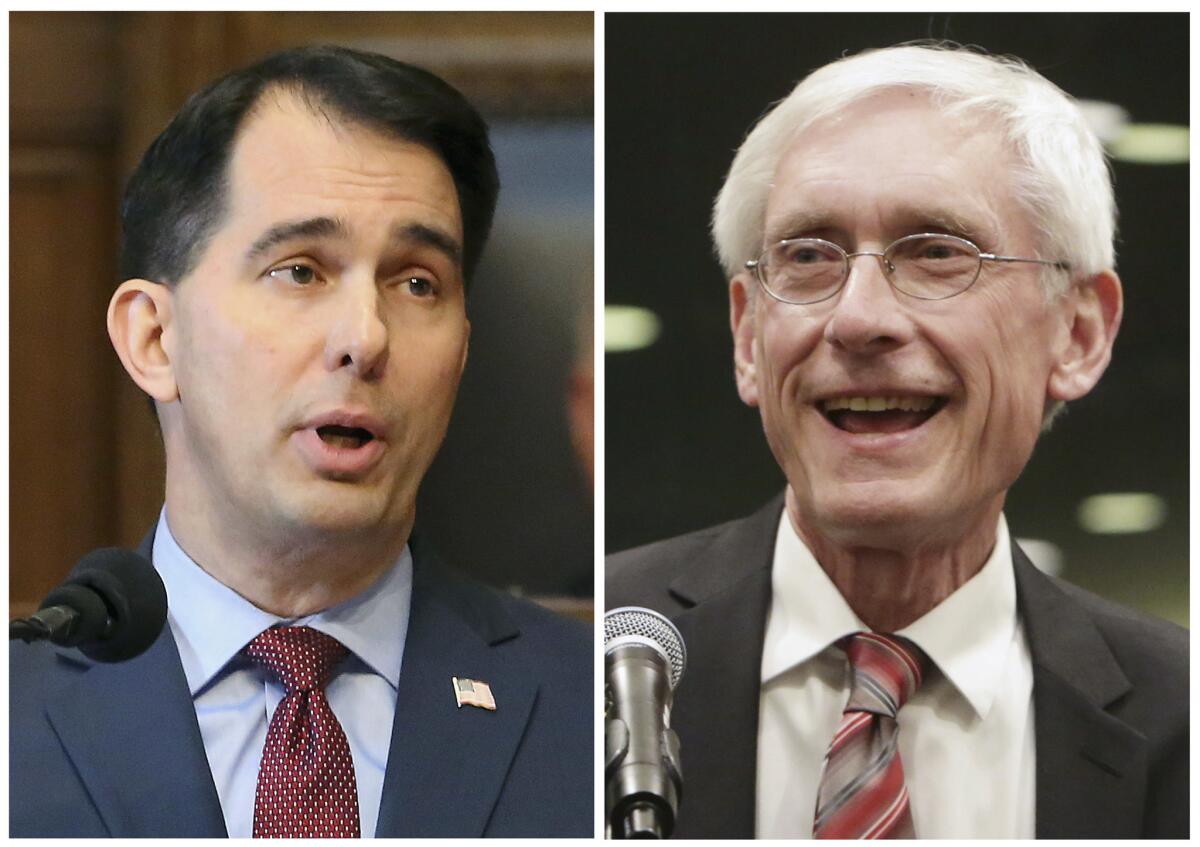
Wisconsin Gov. Scott Walker said Wednesday he has conceded defeat to Democrat Tony Evers in their election contest.
Walker said he called Evers to offer his concession concede defeat. The two-term Republican incumbent said he had held off because the race was so close, but that his campaign decided Wednesday there were not enough votes in play to change the outcome.
Based on unofficial results, Evers won by about 31,000 votes.
Walker said in a statement that he had offered the full support of his staff and Cabinet to Evers as he begins the transition.
Walker had earlier expressed concern about 2,000 absentee ballots in Milwaukee that had been reconstructed due to errors or damage. But his campaign said it ultimately determined there weren’t enough votes in question to change the outcome of the race.
Evers is slated to be sworn into office Jan. 7.
Republican Rep. Steve Knight concedes to newcomer Katie Hill in north L.A. County district
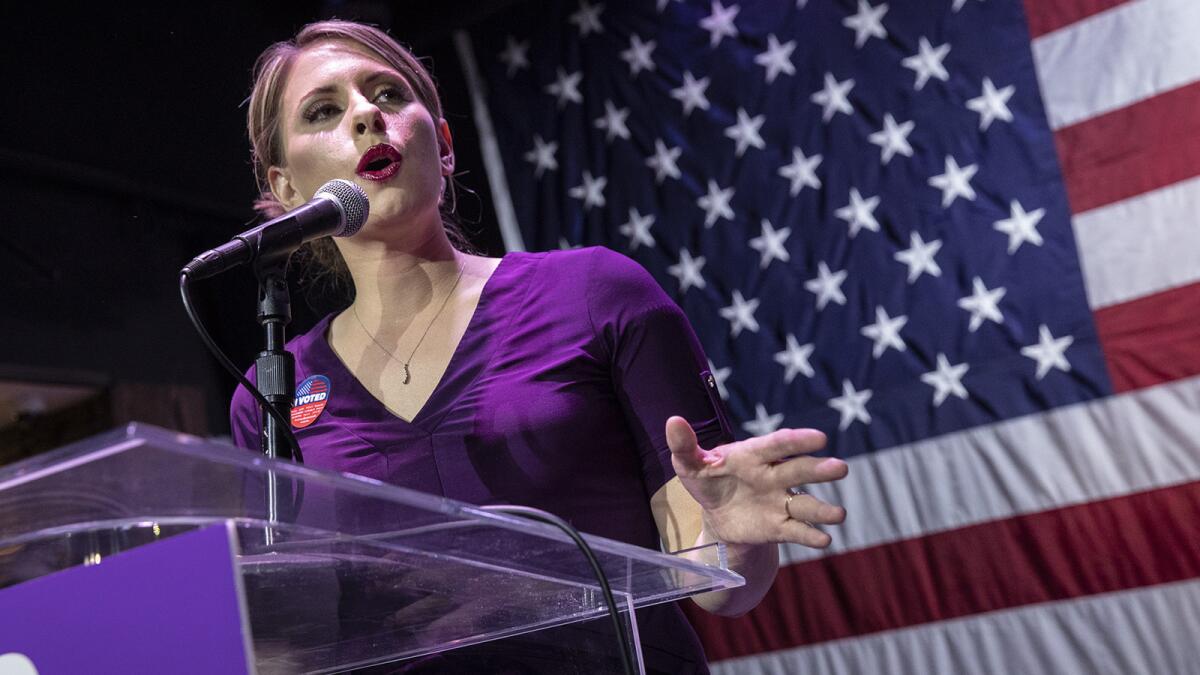
Republican Rep. Steve Knight of Palmdale conceded to Democratic challenger Katie Hill on Wednesday as votes were still being counted in the race to represent California’s 25th Congressional District in northern Los Angeles County.
Knight’s defeat was a major blow to the Republican Party, which lost one of its last footholds in a county that is tilting more and more Democratic as growing Latino and Asian American populations reshape the region’s politics.
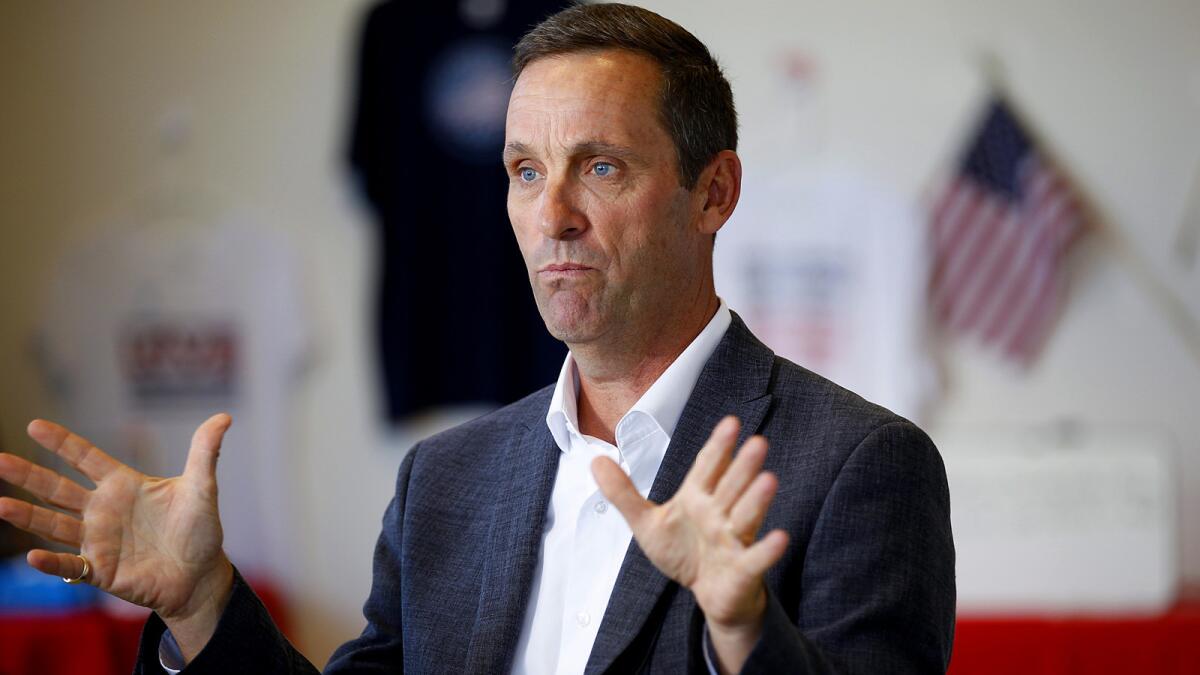
Knight, an Army veteran who served 18 years as a Los Angeles police officer, was first elected to the House in 2014. He took pains during the campaign to cast himself as a nonpartisan problem solver for constituents with a more moderate approach to immigration than President Trump.
But at a time when Republicans are increasingly unpopular in California, Knight, 51, almost always voted with the GOP, backing Trump’s 2017 tax overhaul and the repeal of the Affordable Care Act.
Hill, 31, will be one of the youngest members of freshman Democrats in the House. A former executive director of PATH, a Los Angeles nonprofit that provides services to the homeless, Hill has never before held public office.
In her campaign, she backed lowering the cost of prescription drugs and cutting taxes for the middle class, saying she would challenge a corrupt Washington culture that caters too much to the needs of campaign donors.
Mike Levin wins in the 49th Congressional District, flipping Rep. Darrell Issa’s seat to Democrats
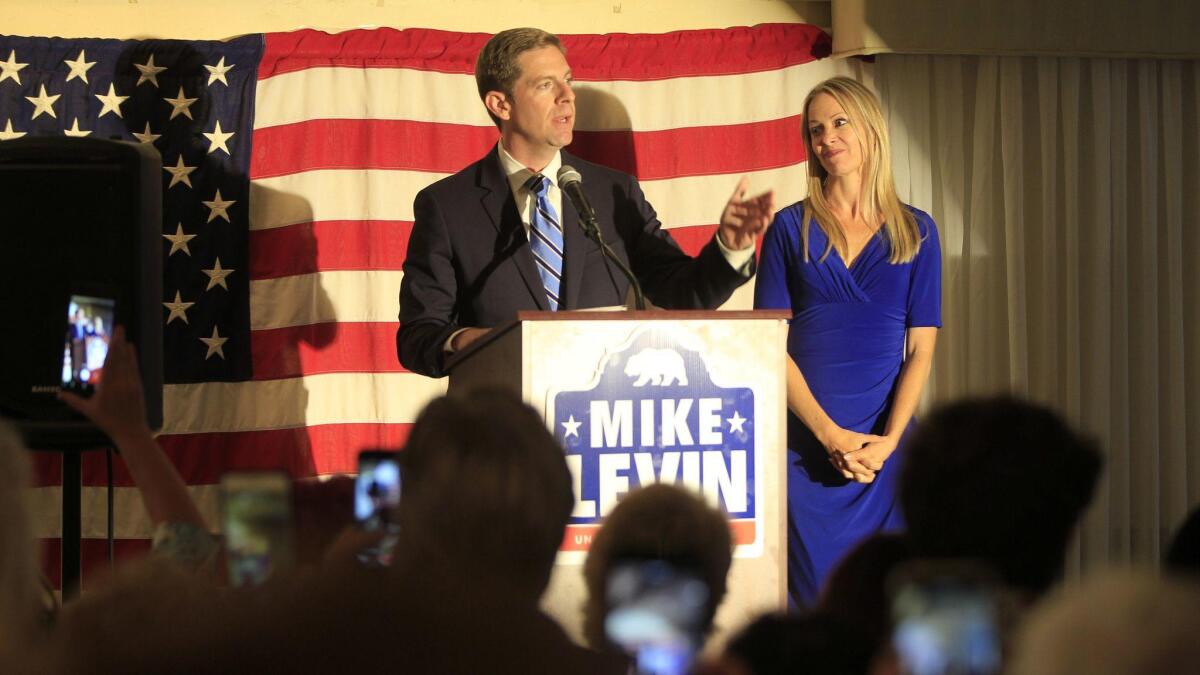
Democrat Mike Levin has won the race for the 49th Congressional District, moving controversial Rep. Darrell Issa’s seat from the Republican column. Issa has held the seat since 2002.
Levin will probably seek to put his influence on environmental issues, which have occupied most of his career since law school. He has been an executive and advocate at alternative energy organizations and has favored the state’s goal to eliminate fossil fuel in electricity production.
Democrats narrow the GOP’s lead in governors from 17 to 3
Democrats made gains at the state level as well on Tuesday, though they were greater in governors’ mansions.
Democrats captured seven governorships from Republican control. These wins break up the Republicans’ single-party control of state government in both Michigan and Wisconsin. The split of governors’ seats between the parties has narrowed significantly from 17 to three.
Democrats won majorities in six state houses, but Republicans still hold a large advantage nationwide. The results were slightly less than the eight gained by the party in 2006 and half of the 12 that Republicans gained in 1994.
Some key wins involved not flipping but winning seats. Gains in the New York Senate break up control by a Republican-led coalition there. Seats gained in the North Carolina state houses break up a Republican supermajority there, relieving the Democratic governor of a constant veto threat.
Democratic incumbent Jon Tester wins Montana Senate race
Democratic Sen. Jon Tester of Montana fended off Republican Matt Rosendale to win a third term in a red state that President Trump won by 20 percentage points in 2016, according to the Associated Press.
Tester won although Trump repeatedly traveled to Montana to boost Rosendale, the state auditor. The president said he made it a personal quest to help defeat Tester for opposing Trump’s onetime nominee to be Veterans Affairs secretary, Ronny Jackson.
Tester, a farmer and rancher, won by tacking to the center and vowing to work with Trump. He supported partial repeal of the 2010 Dodd-Frank financial law.
Indicted Rep. Duncan Hunter wins reelection in inland San Diego County district
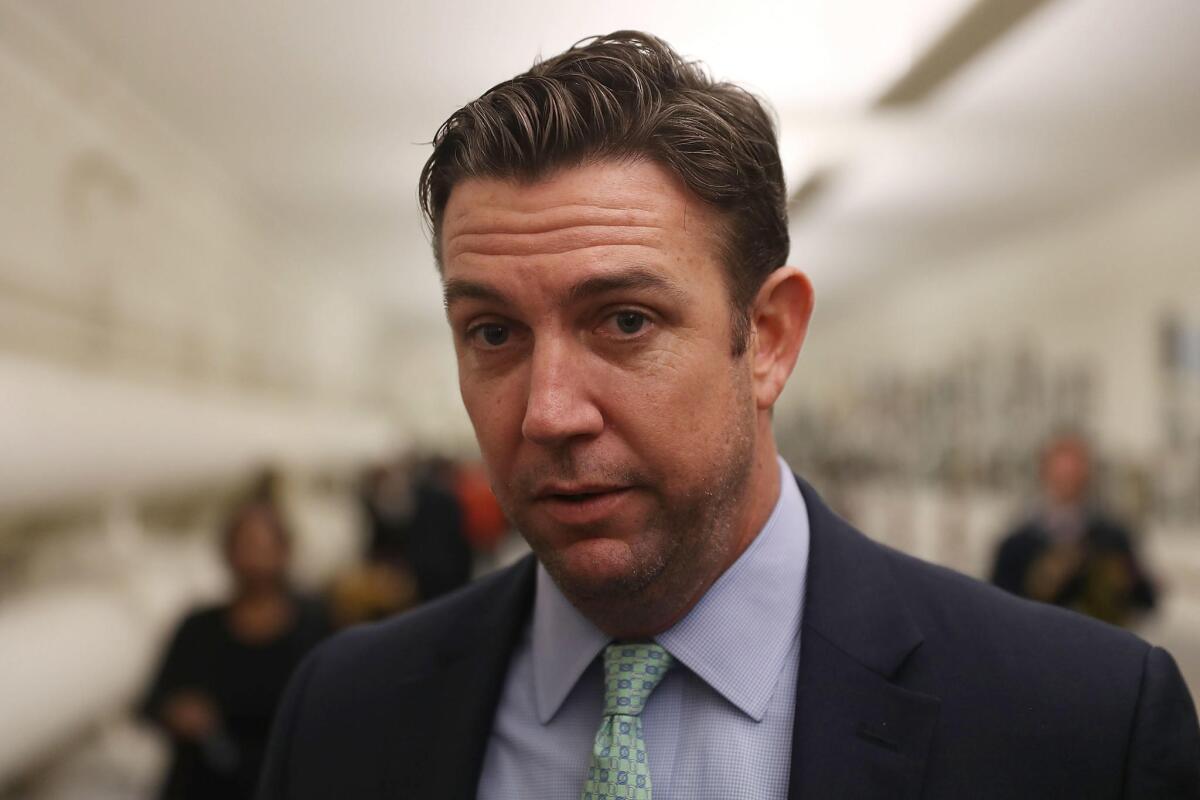
Rep. Duncan Hunter (R-Alpine) has secured a sixth term in his deep red congressional district, two months after he and his wife were indicted on charges of campaign finance violations and wire fraud.
The indictment put the normally safe Republican district into play, but first-time candidate Ammar Campa-Najjar — a 29-year-old former Obama administration employee — couldn’t overcome the 14-point Republican registration advantage.
Hunter has earned at least 56% of the vote in each of his five races. The Democratic Congressional Campaign Committee didn’t consider the 50th Congressional District, which stretches across east San Diego County and into Riverside County, among its top targets.
The race drew national attention after Hunter began running an ad that claimed, without proof, that Campa-Najjar was a “security risk” with ties to terrorism.
Hunter, 41, served in the U.S. Marine Corps before winning the seat previously held by his father, who represented San Diego County in Congress for 28 years. He was among the first congressmen to endorse then-candidate Donald Trump, and has hewed closely to the president on issues ranging from immigration to environmental policy.
Hunter was not the only congressman under federal indictment to win reelection on Tuesday: fellow Republican Chris Collins, indicted on charges of insider trading, eked out a fourth term in New York’s 27th Congressional District earlier in the night. Hunter, who pleaded not guilty, is next due in court on Dec. 3. Should he be found guilty and resign from Congress, there will likely be a special election.
Wisconsin’s Democratic governor-elect faces a GOP-run Legislature; Scott Walker eyes a recount
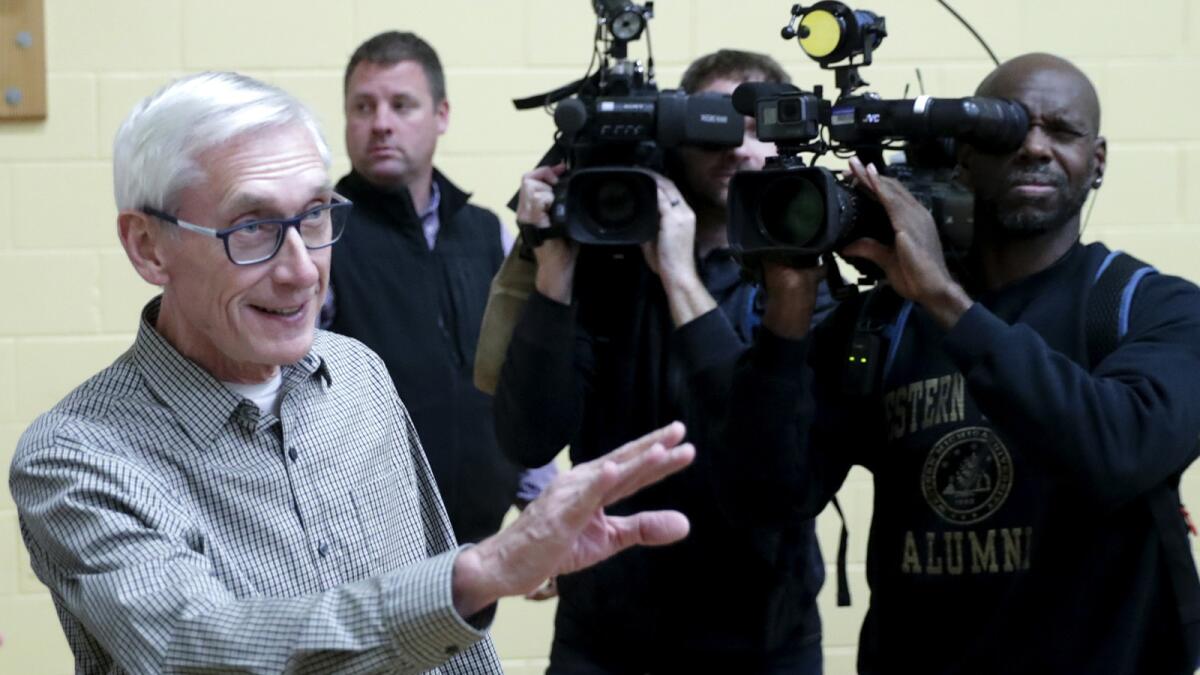
Democrat Tony Evers looked ahead to leading Wisconsin with a Republican-controlled Legislature, the first time state government has been divided in a decade, while ousted Republican Gov. Scott Walker eyed a possible recount following the state’s closest governor’s race in more than half a century.
The Evers victory, coupled with the apparent win by Democratic attorney general candidate Josh Kaul in a race too close to call, realigns the political dynamic in Wisconsin following eight years of Republican control. While Democrats had hopes of making headway in the Legislature, Republicans will remain in the majority with Evers as governor, setting up at least two years of divided government. That hasn’t happened in Wisconsin since 2008, when Democratic Gov. Jim Doyle was in office and Republicans controlled the Assembly with Democrats in charge of the Senate.
Evers declared victory early Wednesday morning, but Walker held off conceding while his campaign investigated 2,000 absentee ballots in Milwaukee that were reconstructed due to damage or errors. The city’s elections commission said the reconstruction process is routine, transparent and overseen by representatives of both political parties, election workers and the public.
With the unofficial count substantially complete, Evers led by about 31,000 votes, or 1.15 percentage points, which is just outside the margin at which a losing candidate may request a recount.
Walker’s first comment since the loss came via Twitter on Wednesday morning, when he posted a Psalm from the Bible: “This is the day that the Lord has made; let us rejoice and be glad in it.”
Walker’s defeat came amid record turnout for a midterm election in Wisconsin. More than 57% of the voting-age population — nearly 2.7 million people — cast ballots in the governor’s race. Walker’s loss was driven by massive turnout in the Democratic stronghold of Dane County, home to the state capital and University of Wisconsin main campus.
But he also did worse elsewhere compared with 2014 — namely in the conservative Milwaukee suburbs that are vital for Republicans in statewide races. Those counties also came out less for President Trump in 2016 compared with Mitt Romney four years earlier.
Walker’s loss spells the end of what some called the “Cheesehead Revolution.” That described Walker, who ran for president in 2015, Rep. Paul Ryan’s ascendance to House speaker and Reince Preibus’ role as head of the Republican National Committee and, briefly, as Trump’s chief of staff.
Markets open higher after midterm election ends with no major surprises — and businesses won’t mind the gridlock
Major U.S. stock indexes opened higher Wednesday after the uncertainty of a contentious midterm election ended with the most widely expected result: a Democratic takeover of the House and Republicans retaining the Senate majority.
Despite President Trump’s contention last week that Democratic victories would lead to a stock market crash, the Dow Jones industrial average was up about 150 points, or 0.6%, on Wednesday. The broader Standard & Poor’s 500 index and the technology-heavy Nasdaq composite also were trading higher.
A divided Congress likely means gridlock in Washington for the next two years on major policy matters. That would be just fine with businesses that already have received a large tax cut and sweeping relaxation of regulations under Trump and congressional Republicans.
Rep. Dana Rohrabacher in near draw with Harley Rouda in Orange County House district
Republican Rep. Dana Rohrabacher trailed challenger Harley Rouda by 2,682 votes with all precincts reporting early Wednesday in Orange County’s 48th Congressional District. Provisional ballots and late mail ballots still have to be counted.
If Rouda, a real estate entrepreneur, holds onto the lead, it would mark a stunning defeat for Republicans in what has long been the deepest red part of the county. Rohrabacher has held the seat for 30 years.
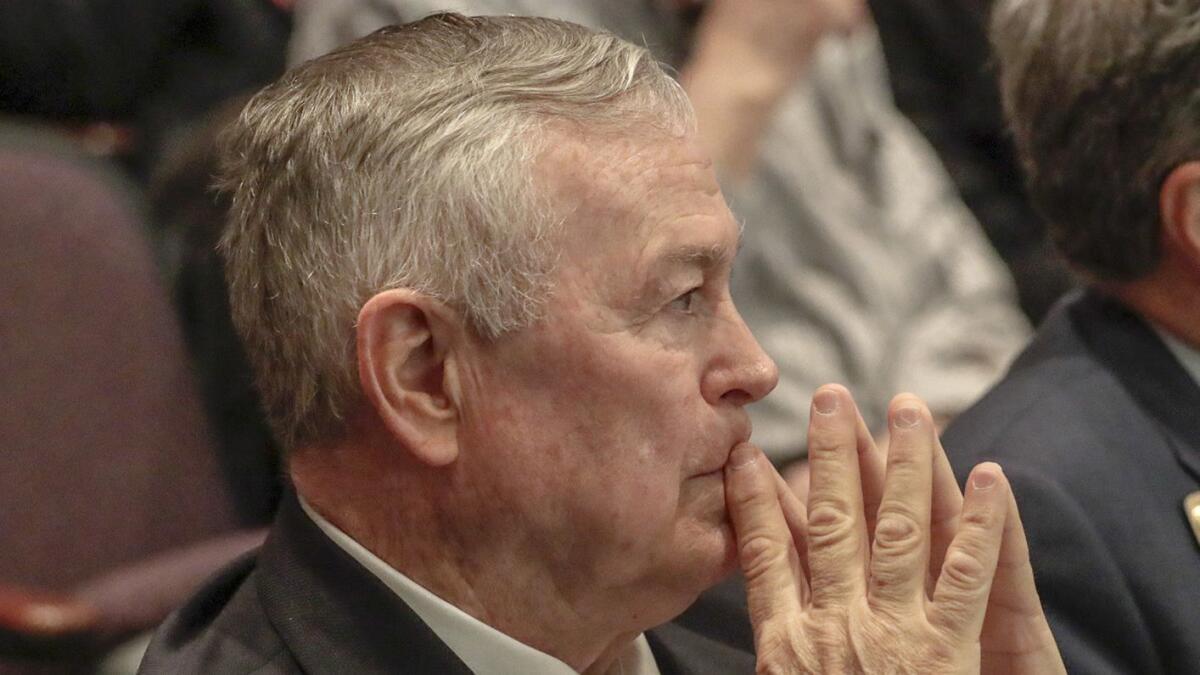
Former state legislator Fiona Ma elected state treasurer
Democrat Fiona Ma was elected state treasurer Tuesday in a win over Republican Greg Conlon. Conlon and Ma ran for the open seat after incumbent John Chiang, a Democrat, ran for governor and lost in the primary.
Ma is a former CPA, San Francisco supervisor and assemblywoman. Conlon is a retired CPA who has run for the seat twice before and lost both times.
The treasurer oversees the state’s investments and administers the sale of bonds and notes.
Democrat Betty Yee reelected state controller
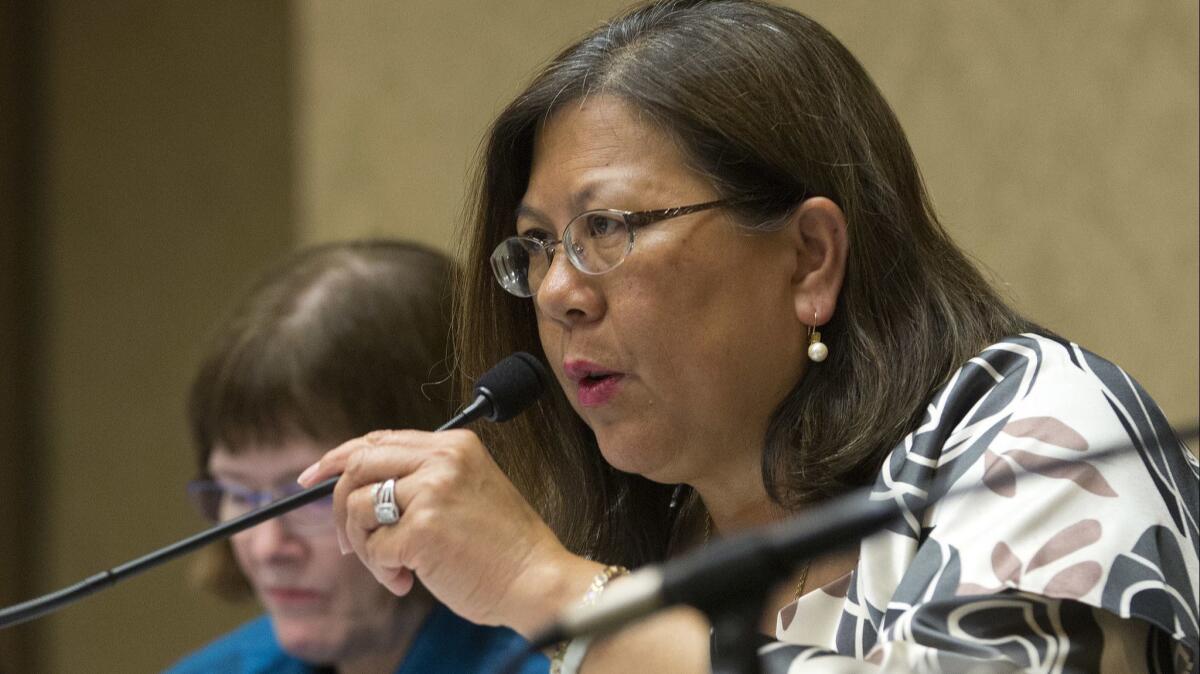
Democrat Betty Yee won another term as state controller on Tuesday, defeating Republican challenger Konstantinos Roditis.
Yee is the officer in charge of paying the state’s bills and administering the payroll system for state workers. In her role, she is one of the state officials with the power to audit state agencies and local governments.
Roditis, of Anaheim, built his campaign around a “trickle-up taxation” proposal to radically alter the way the state collects taxes — cities and counties collect all revenue before a percentage of funds go to Sacramento. He also pledged to defund the state’s high-speed rail project.
Alex Padilla wins second term as California secretary of state
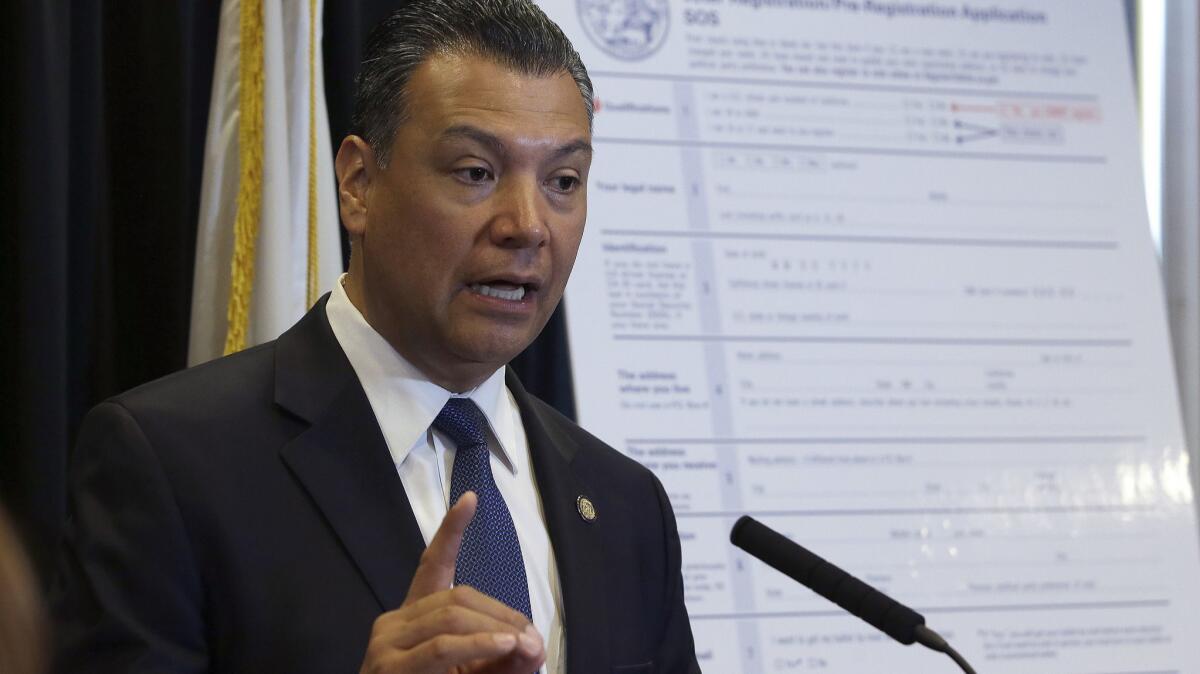
Secretary of State Alex Padilla was reelected Tuesday and will serve a second term, defeating Republican challenger Mark Meuser.
Padilla is a former state senator and Los Angeles City Council member from the San Fernando Valley. He spearheaded a new Motor Voter act in 2015 and a new system for online business registrations. But the new systems have had hiccups: More than 23,000 Californians were registered to vote incorrectly by the state DMV.
Meuser, an attorney, ran on a campaign to stamp out alleged voter fraud. He has claimed that some counties have more voters than people eligible to vote, though elections experts said the claims misrepresent the way the data are collected.
The secretary of state’s office oversees business and corporate filings. It also handles statewide elections and collects voter data.
Former U.S. Ambassador Eleni Kounalakis elected lieutenant governor
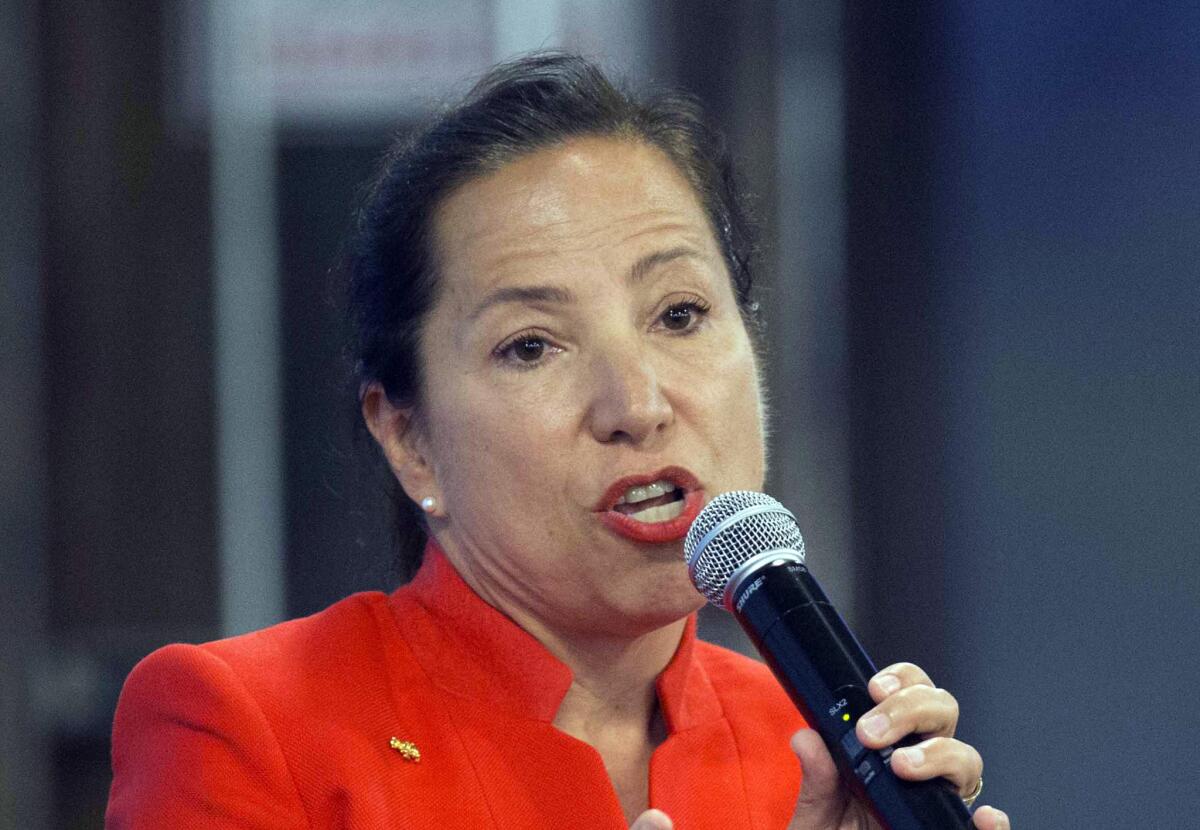
Former U.S. Ambassador Eleni Kounalakis, was elected lieutenant governor Tuesday, defeating state Sen. Ed Hernandez (D-Azuza).
Kounalakis, a prominent Democratic Party donor, was appointed ambassador to Hungary by President Obama and has never held public office. Her father, prominent developer Angelo Tsakopoulos, has been a major source of financing for her first campaign.
Hernandez, an optometrist from the San Gabriel Valley, was first elected to the Assembly in 2006 and then the state Senate in 2010. The lieutenant governor has a seat on several state boards including the University of California Board of Regents, the California State University board of trustees and the State Lands Commission.
The officeholder’s primary function is to fill in when California’s governor is out of the state, impeached, resigns, is removed from office or in case of death. The lieutenant governor can also break a tie in the state Senate.
California voters reject proposition to give property tax break to homeowners 55 and older
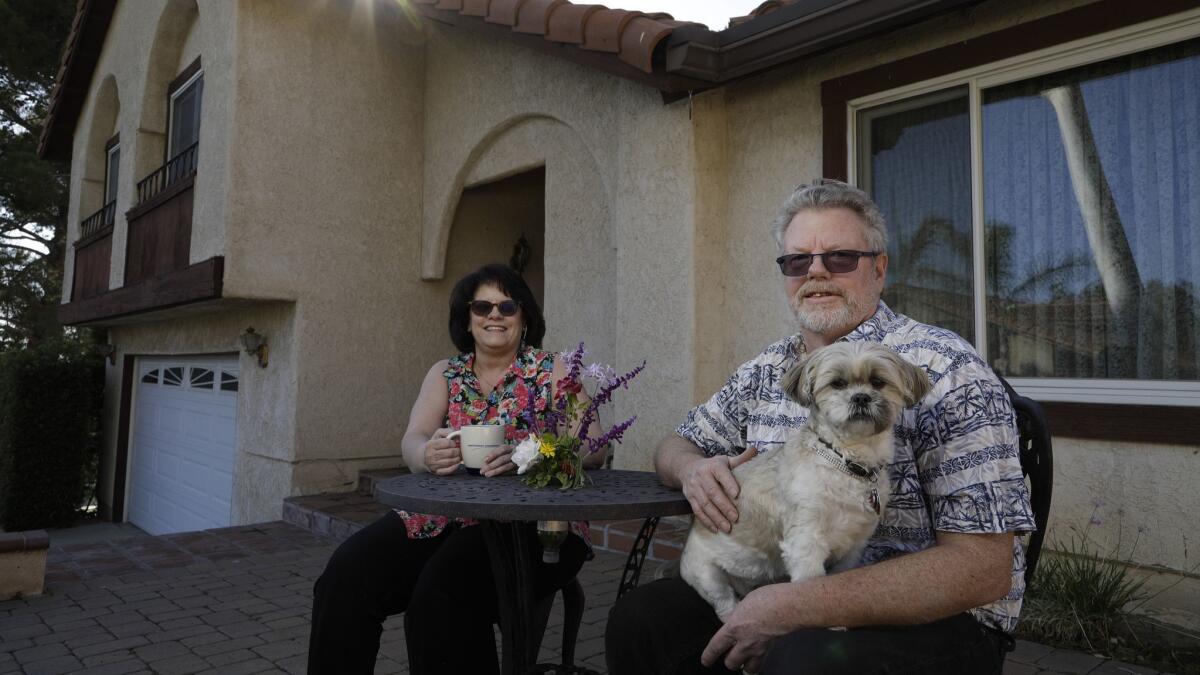
California voters on Tuesday rejected Proposition 5, a measure that would have offered a property tax break to homeowners 55 and older as well as the severely disabled and natural disaster victims if they move to a new home.
Under the measure, which was placed on the ballot by the California Assn. of Realtors, qualifying homeowners would no longer have to pay property taxes based on the purchase price of their new home. Instead, they would pay based on a combination of their new and old home values, lowering their property tax payment.
In potential major upset, Alex Villanueva holds slim lead over L.A. County Sheriff Jim McDonnell
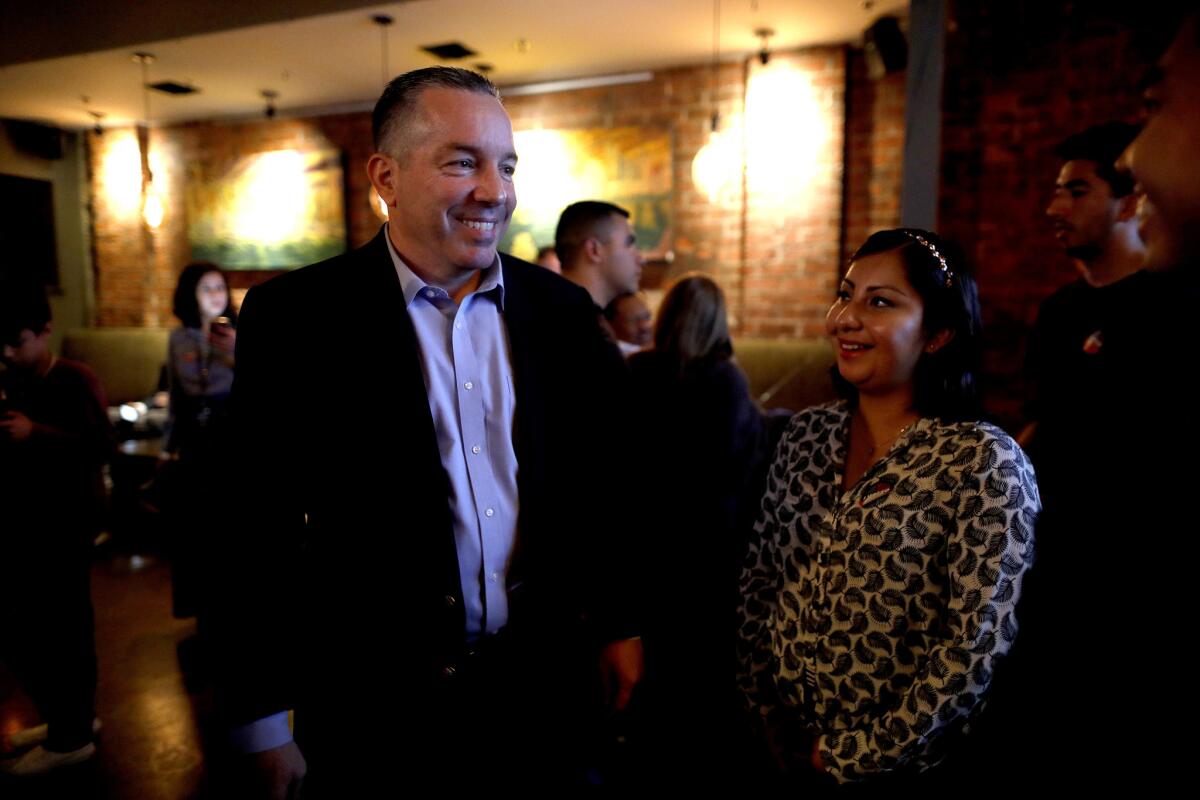
In what could be a stunning upset, retired Sheriff’s Lt. Alex Villanueva took a narrow lead over Los Angeles County Sheriff Jim McDonnell early Wednesday. With 100% of precincts reporting, he was ahead by 4,927 votes.
Provisional ballots and late mail ballots still have to be counted.
Villanueva would be the first challenger to unseat a living incumbent sheriff in the county in more than 100 years. Villanueva, who has served in the Sheriff’s Department for three decades, took a lead despite McDonnell out-fundraising him 8 to 1. He made expelling immigration agents from the county jails a centerpiece of his platform.
After knocking on half a million doors, they wait
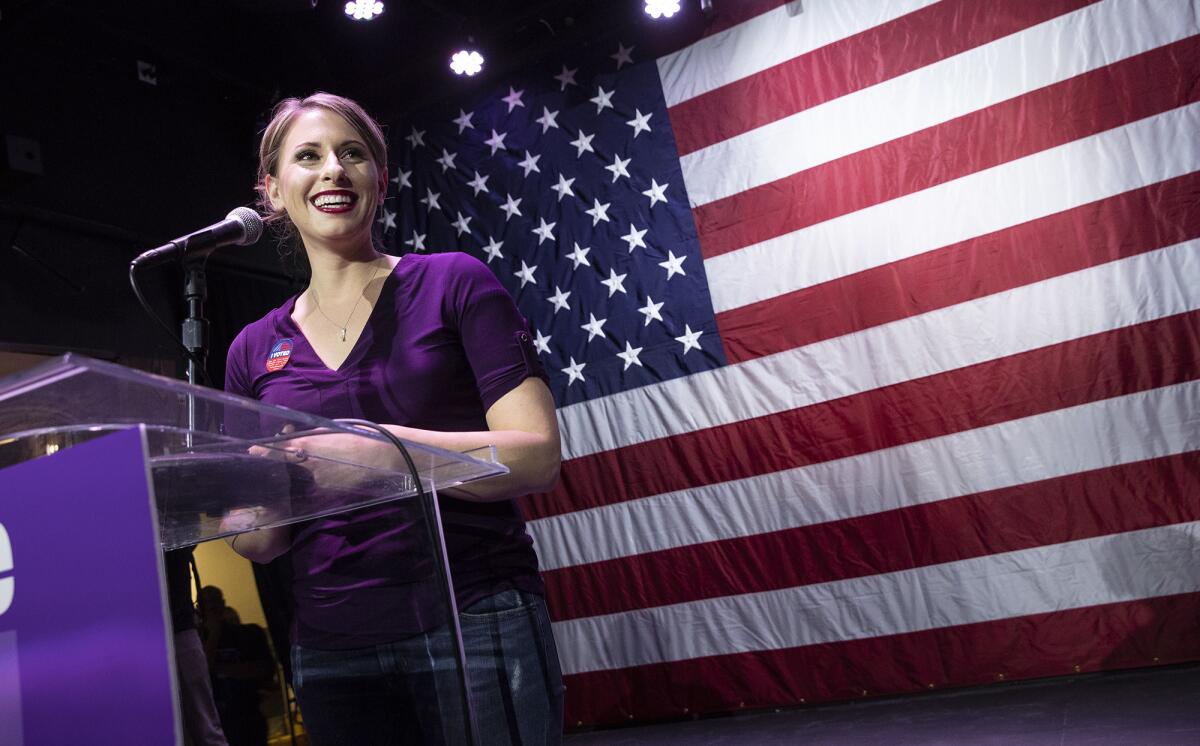
There was no decision, but there was “Despacito.”
In Santa Clarita, the 400 or so people who’d gathered for House candidate Katie Hill’s and Assembly candidate Christy Smith’s election-returns party kept the mood buoyant despite no sign of a decision in either race.
The party took place in a music venue in the Westfield Valencia Town Center and outlasted the shopping mall, which shuttered before California returns began rolling in.
Just before 11 p.m., Hill thanked her supporters at the party and praised the more than 5,000 campaign volunteers who knocked on half a million doors in the district.
“We’re truly in a moment where Americans are standing up, where young people are standing up, where women are standing up,” she said.
As of early Wednesday morning, the Democrat and Rep. Steve Knight (R-Palmdale) were neck and neck in the vote tally for the 25th Congressional District.
Some Senate seats and governors’ mansions remain in the balance Wednesday
Republicans held narrow leads in three Senate races that were still not called early Wednesday, leaving the size of the Republican majority in the chamber uncertain the morning after ballots were cast.
The outcome in those races could boost the Republican advantage in the Senate to as wide as 54-46, giving the party a significantly larger cushion as President Trump attempts to expand his hold on federal courts and beat back the incoming Democratic majority in the House.
Before Tuesday’s balloting, Republicans held a tight 51-49 majority in the Senate, leaving little margin for close votes, especially lifetime appointments of federal judges, which both parties see as a priority issue.
Mike Levin, leading in his bid to flip Rep. Darrell Issa’s seat to Democrats, isn’t waiting to celebrate
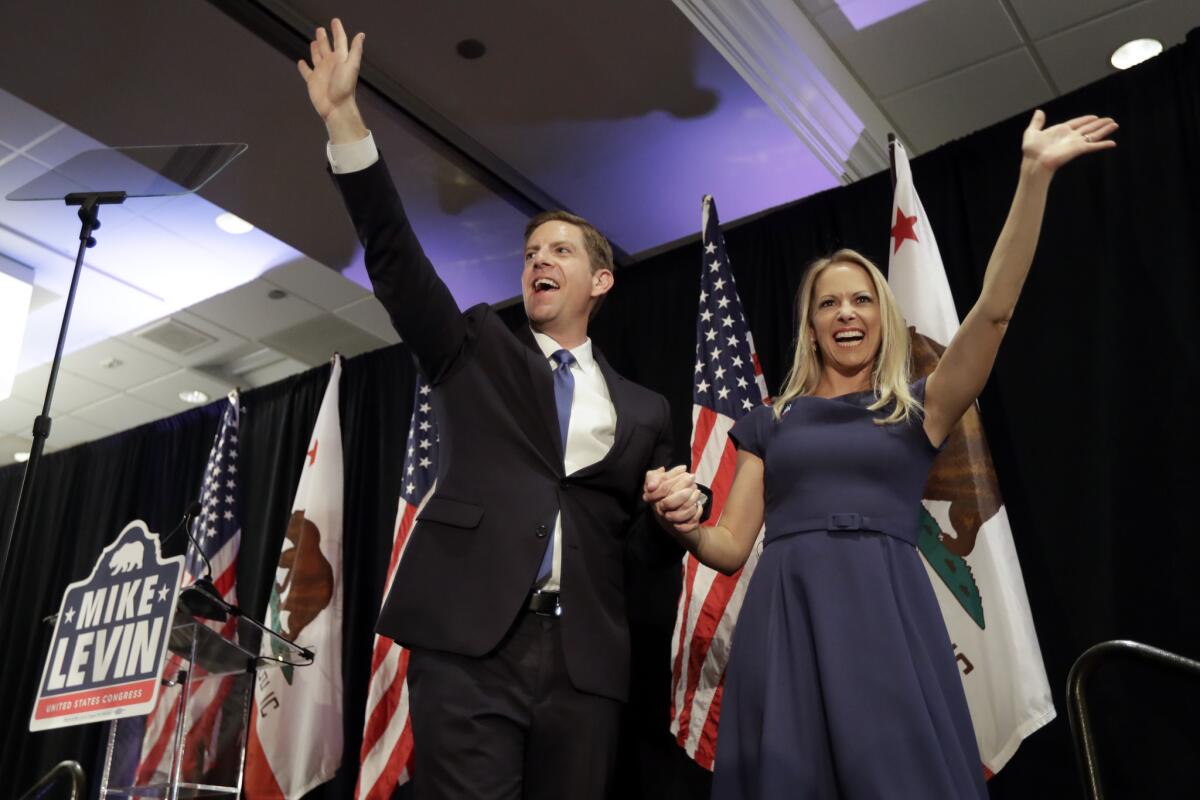
Leading in the vote count nearing midnight Tuesday and before the race had been called, a jubilant Mike Levin went ahead and claimed victory in the 49th Congressional District.
“We are going to win,” said Levin, an environmental attorney in Orange County, as he awaited a tally from the San Diego County registrar of voters.
In a crowded hotel ballroom in Del Mar, accompanied by his wife, Chrissy, his two children and his parents, he told several hundred enthusiastic supporters and campaign workers that it was time to celebrate.
“I am confident that thanks to you when all the votes are counted, we will have won the 49th District,” he said. “While we celebrate a great victory in the 49th District, it is not the only victory. The Democratic Party has won a victory.”
Levin was leading veteran Republican Diane Harkey, who served in the Assembly and now sits on the state Board of Equalization. They were battling to replace retired Rep. Darrell Issa (R-Vista), who has held the seat since 2002.
When Levin mentioned Issa’s name, a roar of boos filled the room.
“Don’t boo Darrell Issa,” Levin said. “He gave me a call tonight to congratulate me.”
In fact, Issa had predicted Levin would win in a television interview earlier Wednesday, adding to the frustration of Harkey.
Levin had collected more than three times more funding than Harkey and dedicated the bulk of it to an active field operation that covered the two-county district. Harkey complained in the closing days of the race that national Republican donors had abandoned her campaign.
The seat was going to be a tough one for Harkey to keep in the GOP fold, given the demographic changes that have brought young, educated tech industry workers to the district. And she had to battle attacks by Levin on the failed financial scheme that her husband operated that took millions of dollars from elderly investors.
The district still has more Republicans than Democrats, but a large block of independents had the ability to swing the election either way. Issa’s victory margins had been growing thinner in the last few elections, reflecting the changes to the district.
As Rohrabacher and supporters wait for results, they call his fight against a well-funded Democrat ‘Dana vs. Goliath’
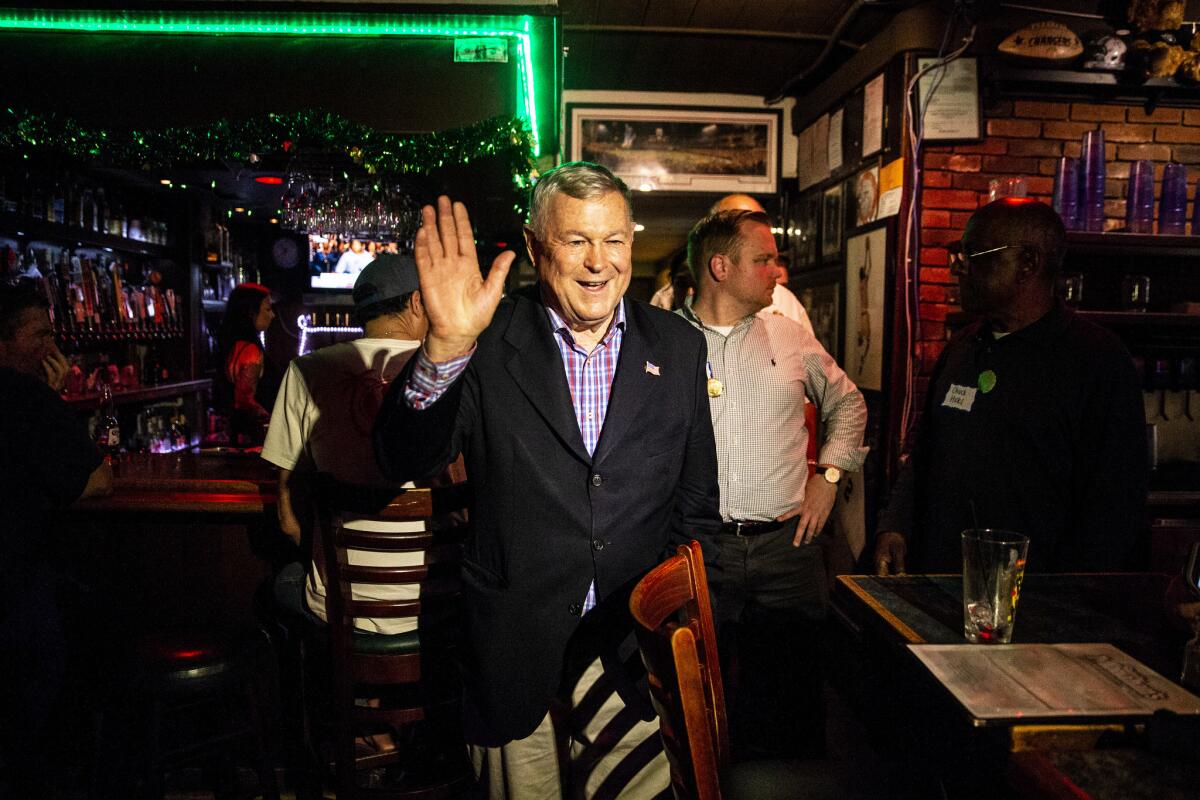
Longtime Rep. Dana Rohrabacher stood on stage at an Irish pub, next to an old surfboard that read, “Give me Liberty or Give me Surf,” and called his bid for reelection a race of “David against Goliath.”
A supporter shouted back, “Dana versus Goliath!”
Rohrabacher, a Republican who’s served in Congress for 30 years, told the supporters and volunteers at his election-night party that Democrats had spent wildly to try to defeat him.
“We’ve had billionaires coming from outside,” he said. “We’ve taken on Goliath. We’ve taken on billionaires.”
Even though his race against Democratic challenger Harley Rouda was too close to call Tuesday night, Rohrabacher told the crowd at Skosh Monahan’s, in a working-class stretch of Costa Mesa next to the 55 Freeway, that it was a night of mixed outcomes.
“I can’t say I’m pleased with the outcome in the rest of the country. We did lose control of the House,” he said. “That has to be balanced by the fact we’re going to be a lot stronger in the U.S. Senate.”
But he said he was looking forward to the results in his race: “I’m still very optimistic things are going to go my way.”
Mark Knoss, a neighbor of the bar and a Rohrabacher supporter who has campaigned for him in the past, said that if the congressman lost, it was because of his outspoken support of President Trump.
“Trump has soured me,” said Knoss, 61. “Dana two months ago started taking on Trump’s attributes.”
In California’s Central Valley, two candidates who reflect the urban-rural divide remain neck and neck
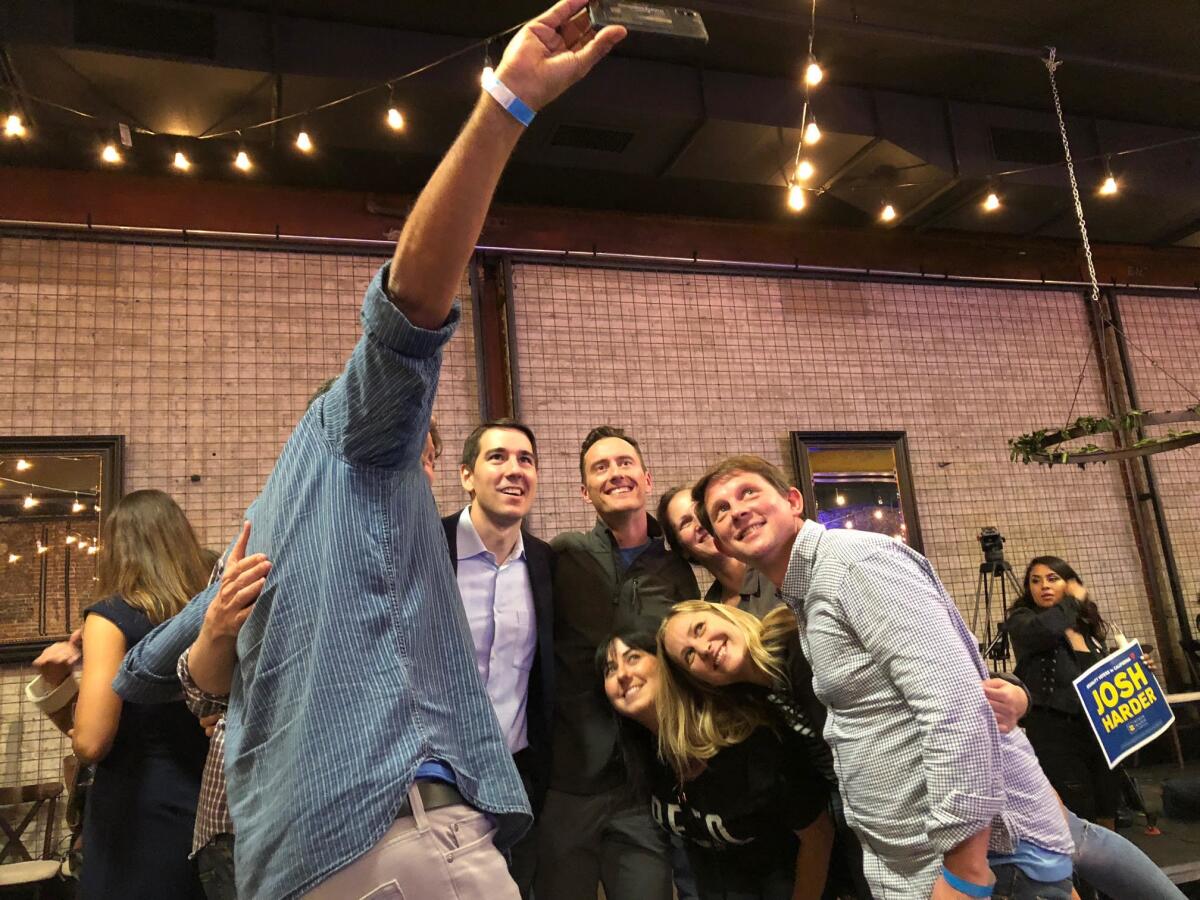
To resounding cheers and applause on Tuesday, Democratic congressional candidate Josh Harder took the stage at a downtown Modesto banquet hall and said he was proud of running a campaign that didn’t “get dragged down into the mud” but painted a brighter picture for the Central Valley.
“What we are seeing across our nation right now, in this community, is rebuke to the last two years ... rebuke to the politics of hate, of fear,” he said. “We don’t believe that. We reject that.”
If there has been any Central Valley congressional district with a shot of turning blue this election, it has been this one where Democrats hold a slight edge in registered voters and carried the last two presidential campaigns. And if there has been any candidate that supporters have believed could bridge the area’s growing urban-rural divide, it has been Harder.
The 32-year-old former venture capitalist made his return to the place where he was born and raised, galvanizing Democrats over Republican Rep. Jeff Denham’s vote to repeal the Affordable Care Act. Over the past days, volunteers have poured in from across the state to walk precincts and knock on doors for his campaign.
But Denham, 51, has long been a strong incumbent with wide support among farmers, veterans and white blue-collar voters. He has seized on Harder’s outside support to cast the 2018 election as a battle between the liberal values of the Bay Area and the conservative way of life of rural California.
The candidates’ reflection of their changing parties and of the Valley was captured in their campaign signs. Denham’s were large and tended to be found along long stretches of orchards and ranches. Harder’s were smaller, usually found in subdivisions encroaching on that farmland.
Those differences also were on display Tuesday at their election watch parties — Denham’s at a barn near Salida, Harder’s at a restaurant in downtown Modesto — and in the demographics of their attendees.
At Harder’s event, cumbias blasted from the speakers and the crowd was jubilant, though the race remained tight and was likely to remain uncalled for days. On stage, Harder stressed the real opponent has not been Denham but voter apathy and the belief that nothing in the country was going to change.
“It is going to be a long night,” he said. “We are going to make sure that every vote gets counted, but outside of that — we took back the House.”
With Gavin Newsom as governor, California’s battle with Trump intensifies
California cemented its role as a defiant counterweight to the federal government on Tuesday as the state’s voters elected Gavin Newsom, an enthusiastic adversary of President Trump, as their next governor.
The Democratic lieutenant governor ran an unabashedly Trump-centric campaign, one that alternated between forceful confrontation and winking sarcasm, but always framed the president — rather than Republican opponent John Cox — as his rival.
But as campaign jabs give way to governing, Newsom must weigh his combative impulses against the complications of leading a state that is home to millions of Trump supporters — and one that is interdependent with the federal government.
Trump turned the midterm election into a big show for network news
Bob Schieffer, the elder statesman of CBS News, has been part of the network’s midterm election coverage since 1970. But he was not getting into the prediction business on Tuesday night.
“I’ve never gone into one of these so unsure of what is going to happen,” he said as he prepared some notes in the green room at the CBS Broadcast Center before joining the “CBS This Morning” team to help analyze the results.
Network political teams, many of whom had been stunned by the surprise win of President Trump two years earlier, were generally cautious about predictions on who would control the House and Senate.
A new Democratic governor must decide how far he wants to lead California to the left
Few can argue with California Democrats that their sweeping victories on Tuesday are a clear mandate to set in place an agenda for the state that will last well into the next decade. Less clear, though, is what those marching orders should be — and whether voters will embrace the full panoply of demands that have lurched the state’s dominant party leftward since the election of President Trump.
No one will face that task more directly than Gov.-elect Gavin Newsom. The 51-year old Democrat, who won a resounding victory over Republican challenger John Cox, will preside not only over the nation’s largest economy, but as leader of America’s most fierce resistance to Trump and the nationalist shift of mainstream GOP politics.
But the history of how Democrats came to dominate California politics over the past quarter-century is a story less about provocation than pragmatism. The majority of the state’s modern-era governors have been Republicans. And the electorate was rarely as liberal as its national reputation — socially moderate but fiscally stingy, environmentally progressive but solidly behind get-tough-on-crime efforts.
Democrats capture Nevada Senate seat, ousting Republican who embraced Trump
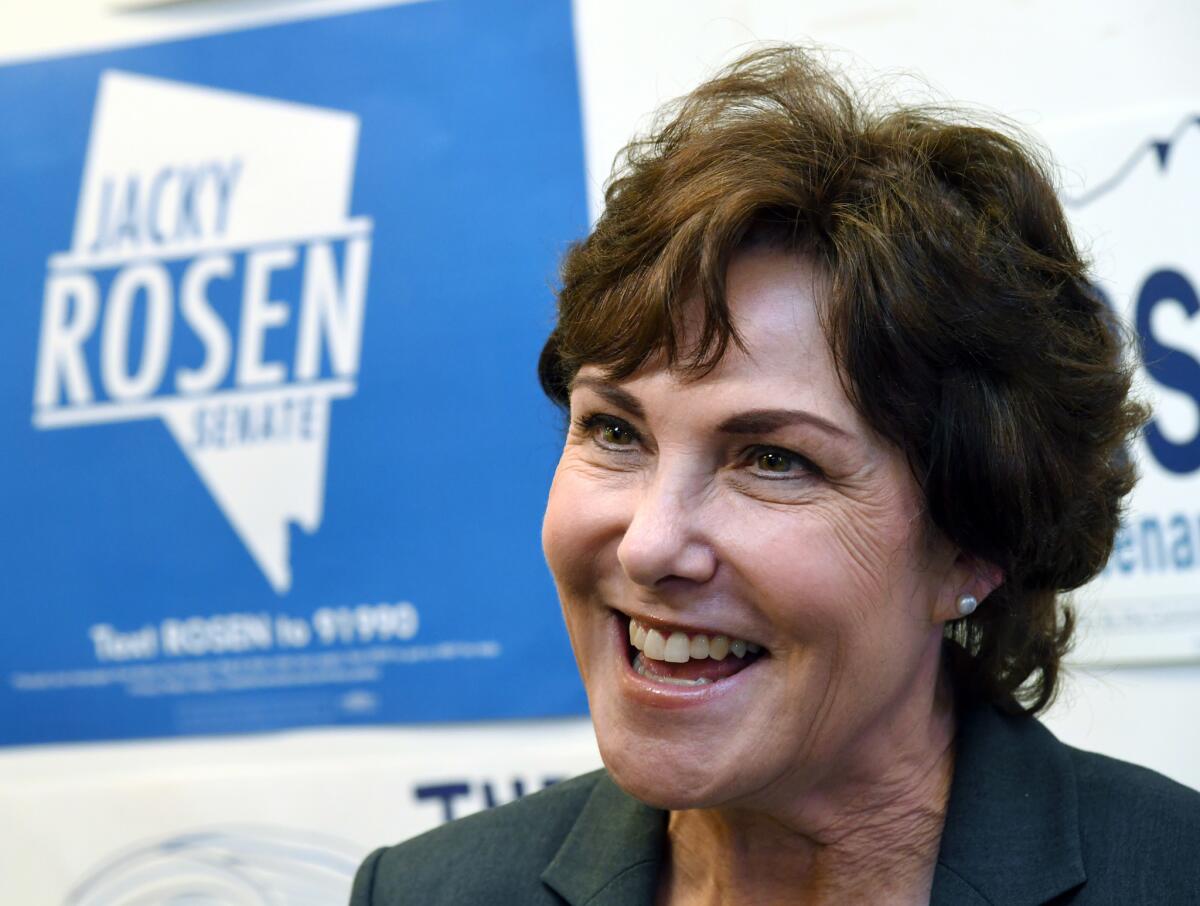
Rep. Jacky Rosen, dubbed “Wacky Jacky” by President Trump as he campaigned for Republican Sen. Dean Heller of Nevada, defeated the incumbent in a bitter race.
Heller, once a Trump critic, had allied with the president and welcomed his help, which proved a losing bet in a heavily Latino state where the president’s anti-immigration rhetoric was particularly incendiary.
Despite his defeat, John Cox predicts a Republican resurgence in California
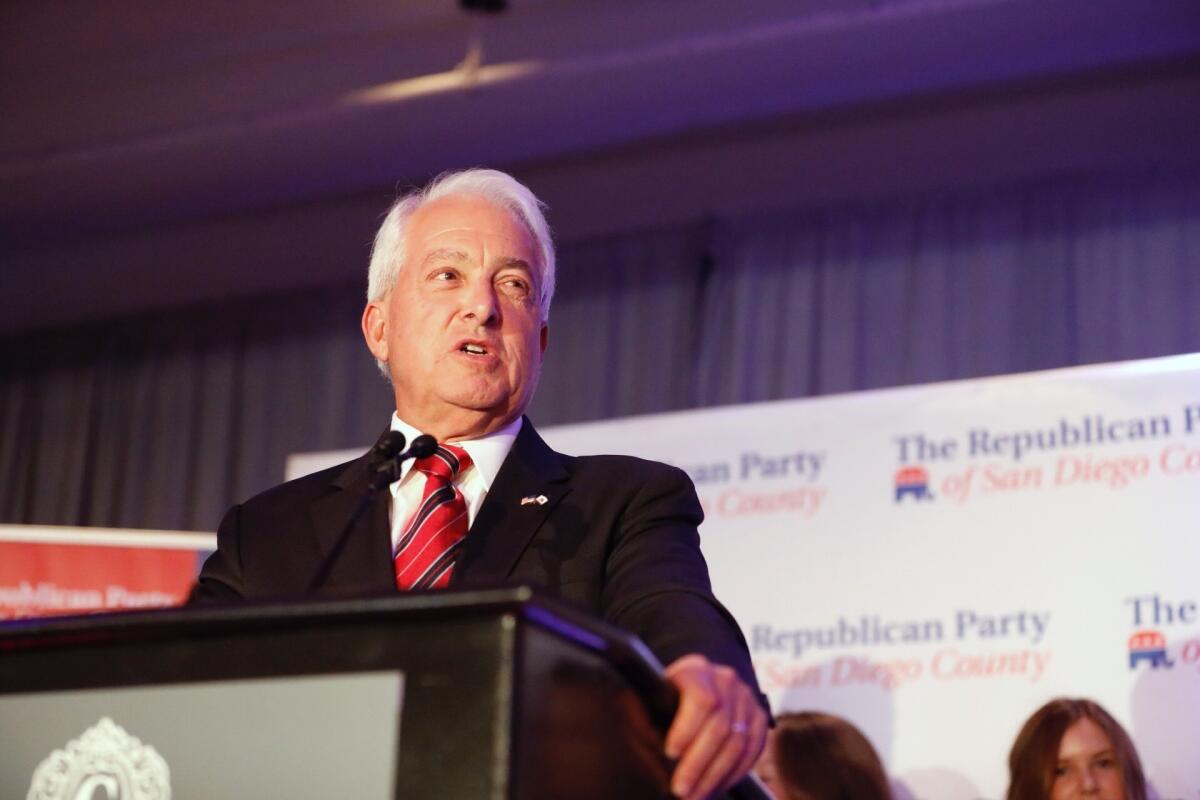
Republican gubernatorial candidate John Cox conceded defeat Tuesday night but told supporters in San Diego that he predicts a resurgence of the Republican Party in California and said he’s “not going anywhere.”
“Let me tell you, this Republican Party will be back in this state,” Cox said to applause. “And our path to success is going to be based on delivering the quality of life that people need so desperately.”
Cox was met with cheers as he took the podium in the U.S. Grant Hotel’s ballroom shortly after 9:30 p.m., telling the crowd that he’d called his opponent, Lt. Gov. Gavin Newsom, wished him well and offered him assistance.
“We highlighted the incredible struggle that the people of this state have had for years under the people that are running this state,” Cox said. “We identified the needs of these people, the fact that they can’t afford housing, they can’t afford gasoline, they can’t afford the basics of life.”
Despite his loss, the mood in the hotel was upbeat as the crowd celebrated Republican wins in the U.S. Senate, including Texas Sen. Ted Cruz’s victory over challenger Rep. Beto O’Rourke. Several men in the crowd wore red “Make America Great Again” hats. One infant was decked out in a red onesie and hat with the logo.
Steve Hasty, who runs the Tri-City Tea Party in Oceanside, said he was disappointed with Cox’s loss, but that “California is so blue, it’s going to be a long shot for anyone to win.”
He may be dead, but pimp Dennis Hof wins bid for Nevada state Assembly seat
Even in death, Dennis Hof remains larger than life.
The pimp and reality television star easily cruised to victory Tuesday in his race for a seat in the Nevada state Assembly — 21 days after his death.
Hof died Oct. 16 at the Love Ranch, his brothel just outside the city of Pahrump, after being found unresponsive by male porn star Ron Jeremy following a campaign event. The Clark County coroner’s office has not released a cause of death.
Democrat Tony Evers defeats Wisconsin Gov. Scott Walker
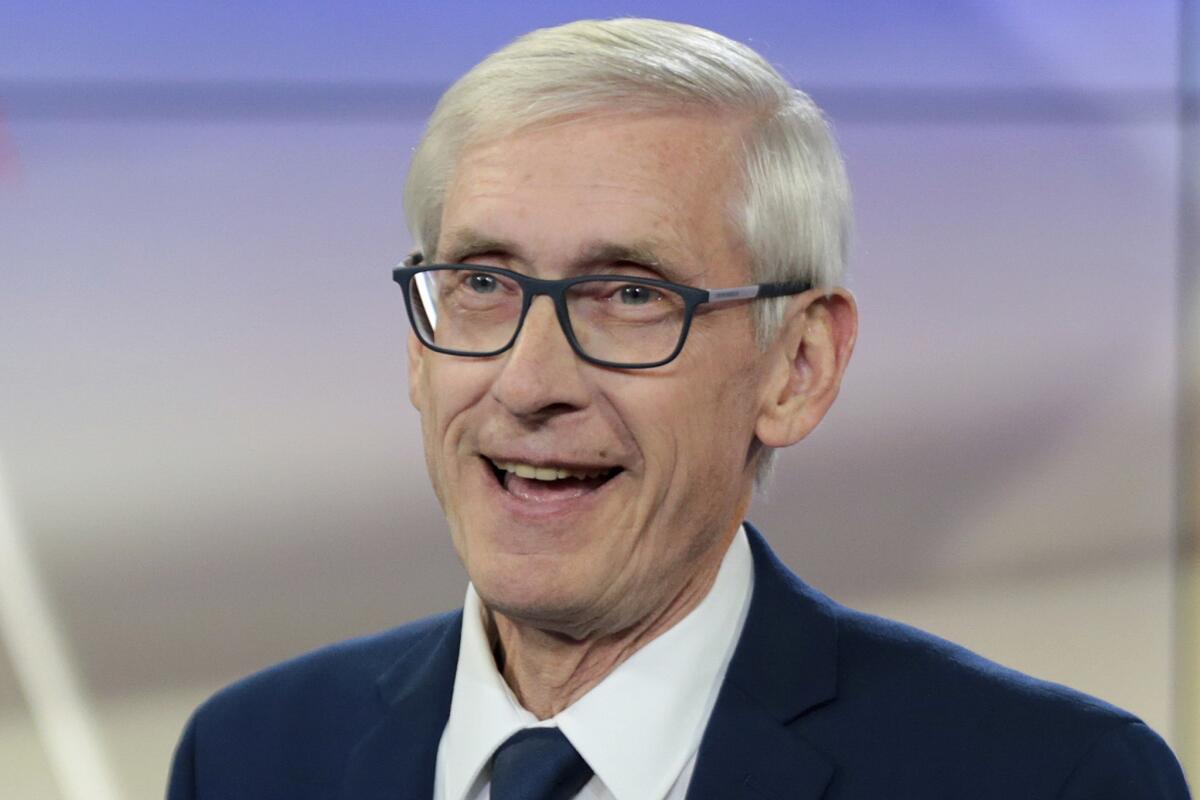
Democrat Tony Evers ousted Wisconsin Gov. Scott Walker on Tuesday, denying the polarizing Republican and one-time presidential candidate a third term and succeeding where his party had failed in three previous attempts, including a 2012 recall.
Evers’ victory is a monumental win for Democrats and a steep fall for Walker, who just three years ago was seen as an early front-runner in the GOP primary for president. When Walker dropped out of the presidential race, he focused on rebuilding his low approval ratings in Wisconsin.
Walker had promised if he won the third term would have been his last, but voters decided that two was enough.
Evers, 67, a former teacher and state superintendent since 2009, used his folksy, nondescript personality to his advantage in the campaign, using words like “jeepers” and “holy mackerel” while arguing that voters were tired of divisiveness and yearned for more collegial politics.
The win gives Democrats a boost after President Trump narrowly carried Wisconsin by less than 1 point in 2016. It also puts Evers in position to dismantle much of what Walker and Republicans did over the past eight years, including rolling back portions of the law that effectively ended collective bargaining for public workers.
Democratic voters were ecstatic about ousting Walker.
“Tony Evers provides us with a new direction that a lot of people want to go,” said Danielle Moehring, 27, a scientist from Madison.
Moehring said she thought anger over Trump was motivating people to “come out of the woodwork,” get involved and vote.
Ellen Martin, a 67-year-old retired occupational therapist from Madison, said she voted for Evers because he will “save our state, especially the environment, education.”
Martin said she thought voters in Wisconsin were tired of Walker after eight years in office.
“I never liked him,” Martin said. “He’s shamed our state, embarrassed our state, ruined our politics.”
Evers, a cancer survivor, campaigned on supporting the national health care law and its guarantees of coverage for people with preexisting conditions. He also promised to cut middle class taxes by 10 percent, paid for by all-but repealing a manufacturing and agriculture tax credit program Walker enacted. Evers is also open to raising the gas tax to pay for road repair and construction, although he hasn’t released a specific plan.
Walker, the 51-year-old son of a Baptist preacher, swept into office in 2010, part of a Republican wave that saw the GOP take over control of the state Legislature as well. With Republican partners in the Statehouse, Walker pushed through a law that effectively ended collective bargaining for teachers and most public workers.
Anger over that law led to the failed 2012 recall election. Walker’s stature among conservatives and national profile skyrocketed after the union fight and the passage of a host of Republican priorities, including making Wisconsin a right-to-work state; cutting taxes by $8 billion; implementing a voter ID law; expanding the private school voucher program statewide; freezing tuition at the University of Wisconsin; rejecting federal Medicaid expansion money under the Affordable Care Act; and restricting access to abortion.
Walker ran for president in 2015, but dropped out before any votes were cast, out of money and down in the polls. His voter approval rating in Wisconsin dropped to its lowest levels.
Last year, working closely with the Trump administration, Walker signed a deal with Taiwan-based Foxconn to build a display screen factory in the state that could result in $10 billion in investments and 13,000 jobs. He’s pointed to that as signs of the state’s economic recovery.
Evers wants to renegotiate the deal, saying the potential $4 billion in state and local tax breaks for the Taiwan-based company is too much. Evers has also vowed, on his first day in office, to withdraw Wisconsin from a federal lawsuit seeking repeal of the Affordable Care Act.
Xavier Becerra is elected to full term as California attorney general
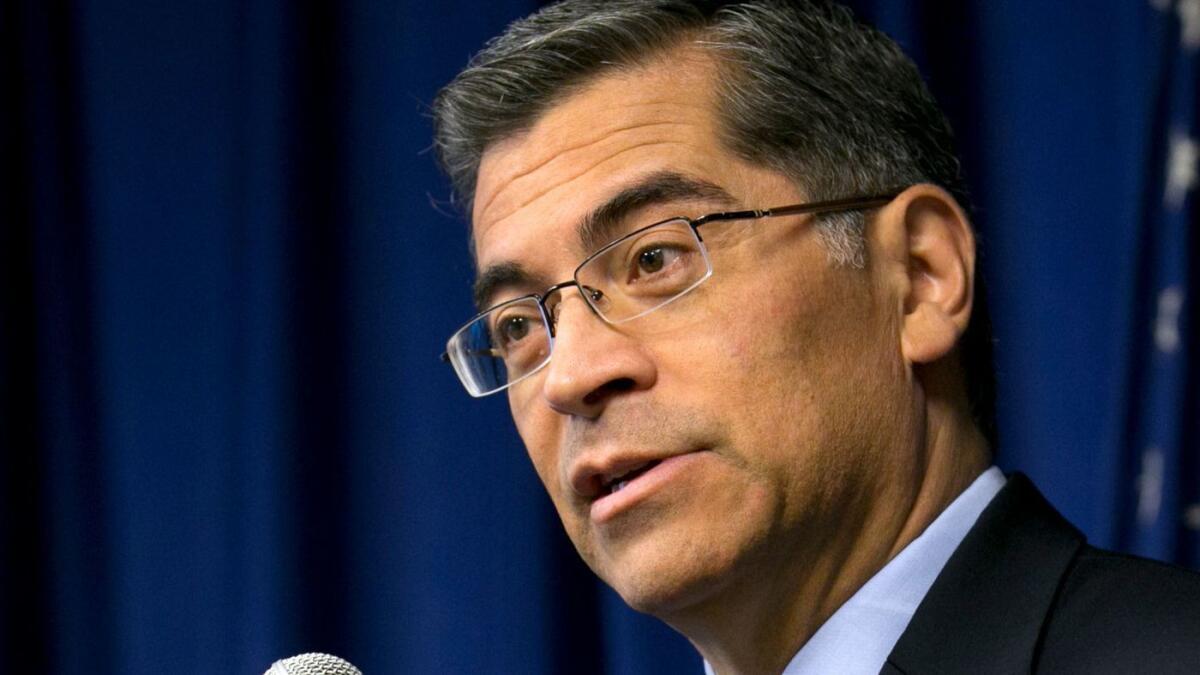
Democratic state Atty. Gen. Xavier Becerra has been elected to a full term as California’s top cop, holding off a challenge from Republican Steven Bailey.
Becerra, a former congressman from Los Angeles, was appointed by Gov. Jerry Brown to replace the state’s former attorney general, Kamala Harris, after she was elected to the U.S. Senate in 2016.
In his time in office, Becerra has made headlines by suing the Trump administration over a number of federal policies. Bailey is a retired defense attorney and judge from El Dorado County in Northern California.
Will Hurd’s House victory in Texas appears to be in question as results show opponent has narrow lead
Abortion. Marijuana. Voting rights. A look at ballot measures across the country
Efforts to make voter registration easier. Marijuana legalization. Limits on abortion.
While the focus of Tuesday’s midterm election centered on control of Congress, voters nationwide weighed in on an array of ballot proposals. In total, voters in 37 states faced 155 ballot questions.
Here’s a look at some of those that passed .
Sen. Feinstein defeats Kevin de León to win fifth full term
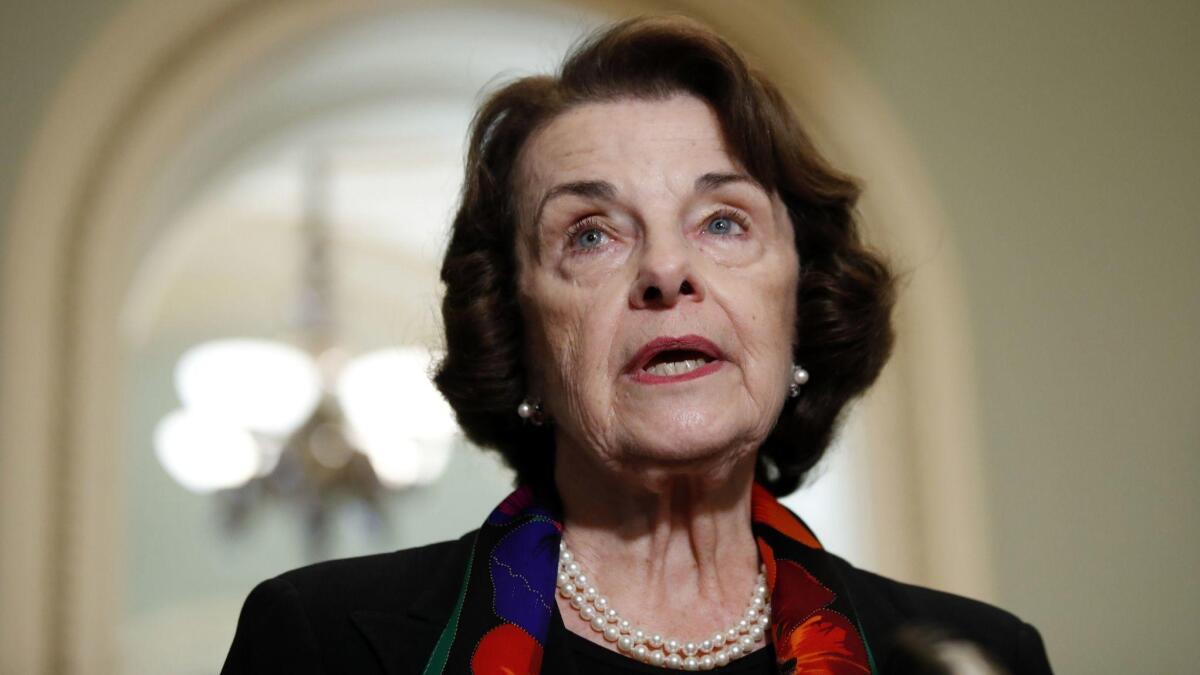
Sen. Dianne Feinstein fended off her first significant Democratic challenger in more than two decades today, beating state Sen. Kevin de León to win a fifth full term.
De León challenged Feinstein from the left in a deep blue state that has become more hyper-partisan since President Trump took office.
Feinstein’s reputation as a moderate has always been an advantage in facing Republicans in general elections. But under California’s new top-two voting system, she faced a fellow Democrat who attacked her for not doing more to stand up to Trump.
Voters backed Feinstein this time, but some experts say De León’s politics might end up better reflecting the future of the Democratic Party in California.
De León, who served 2 1/2 years as leader of the California Senate, depended largely on retail politics, an impractical strategy in California but especially against Feinstein, who held a more than a 10-to-1 cash advantage over him.
Gavin Newsom’s message to Trump: California is ‘too powerful to bully’
Claiming victory as California’s next governor, Gavin Newsom positioned the state as the alternative to so-called “Trumpism” and the rancorous tone of today’s politics.
“It’s been a long two years, but tonight, America’s biggest state is making America’s biggest statement,” Newsom told supporters Tuesday night. “We are saying, unmistakably and in unison, that it’s time to roll credits on the politics of chaos and cruelty.”
Trump went unnamed in Newsom’s speech, but implied contrasts ran through his remarks, as well as the pointed declaration that “the California dream has always been — and will always be — too big to fail and too powerful to bully.”
A mix of volunteers, politicos and lobbyists gathered to fete Newsom at the Exchange in downtown L.A., an imposing Moderne-style event space that was the historic home of the Los Angeles Stock Exchange. While Newsom’s win was expected by most, the mood was palpably anxious earlier in the evening, as attendees scoured results for Democrats nationwide. Once the Democratic takeover of the House of Representatives was assured, the atmosphere became more festive, with a performance by hip-hop artist Common injecting a dose of celebrity into the gathering.
Former Assembly Speaker John A. Perez (D-Los Angeles) said he expected Newsom’s contrasting message with Trump to continue when the governor-elect takes office, simply because the state’s political preferences differ so much from those of the president.
“I don’t think that Gavin Newsom will govern in reaction to the White House, but in support to the values that are essential to California,” Perez said. “The reality is those will be a stark contrast to what’s happening in the White House but it’s not because of who the occupant of the White House is.”
Voters approve Proposition 11 to require ambulance crews to stay on call through breaks
Proposition 11, which would require ambulance crews to be on call through their rest and meal breaks, was approved by voters on Tuesday.
Supporters have argued that mandatory rest breaks will unfairly raise costs for the industry and possibly lead to cutbacks in available ambulances in some communities. Opponents, led by labor unions representing the workers, argue the crews are tired and overworked, making them less effective in the event of an emergency.
California voters reject ballot measure to cap dialysis company profits
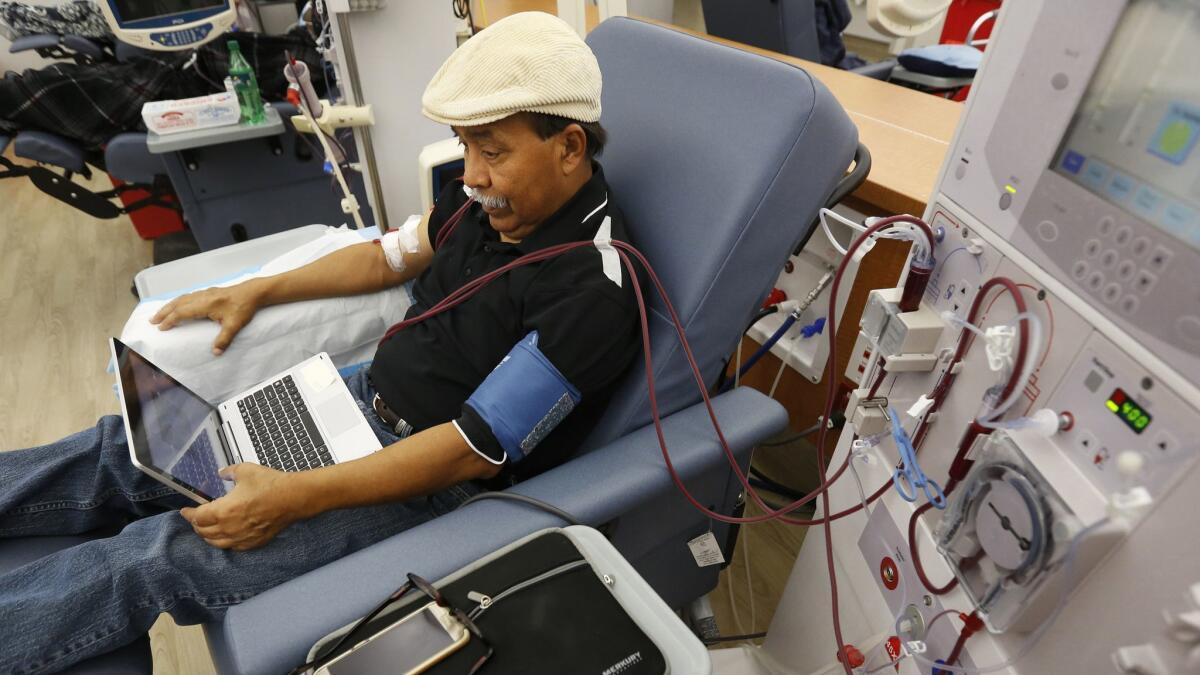
Proposition 8, which would have imposed a cap on the profits earned by large dialysis companies such as DaVita, was defeated by voters on Tuesday.
Sponsored by the Service Employees International Union-United Healthcare Workers, the measure would have shrunk the profits of hundreds of dialysis clinics across California, requiring clinics to provide rebates to insurers and pay a penalty to the state on business revenue that exceed 115% of certain costs to deliver care.
A coalition led by DaVita and Fresenius Medical Care, the two companies that control a combined 72% of the dialysis market in California, has given $110 million to a campaign to beat the measure — contributing to the most money raised for such a campaign in state history.
San Francisco homeless tax measure leading in early results
San Francisco voters were leaning toward approving a ballot measure that would tax corporate businesses to fund services for the homeless, according to early results Tuesday night.
Proposition C, a tax on gross annual receipts of the city’s largest companies, was leading handily in preliminary returns. If it passes, it will nearly double San Francisco’s budget dedicated to the curbing homelessness by adding $300 million a year to fund housing, shelters, mental health services and preventive measures.
About 400 businesses, which make up the top 20% of the city’s job base, would be subject to the tax, according to an analysis by City Controller Ben Rosenfield.
California voters approve year-round daylight saving measure
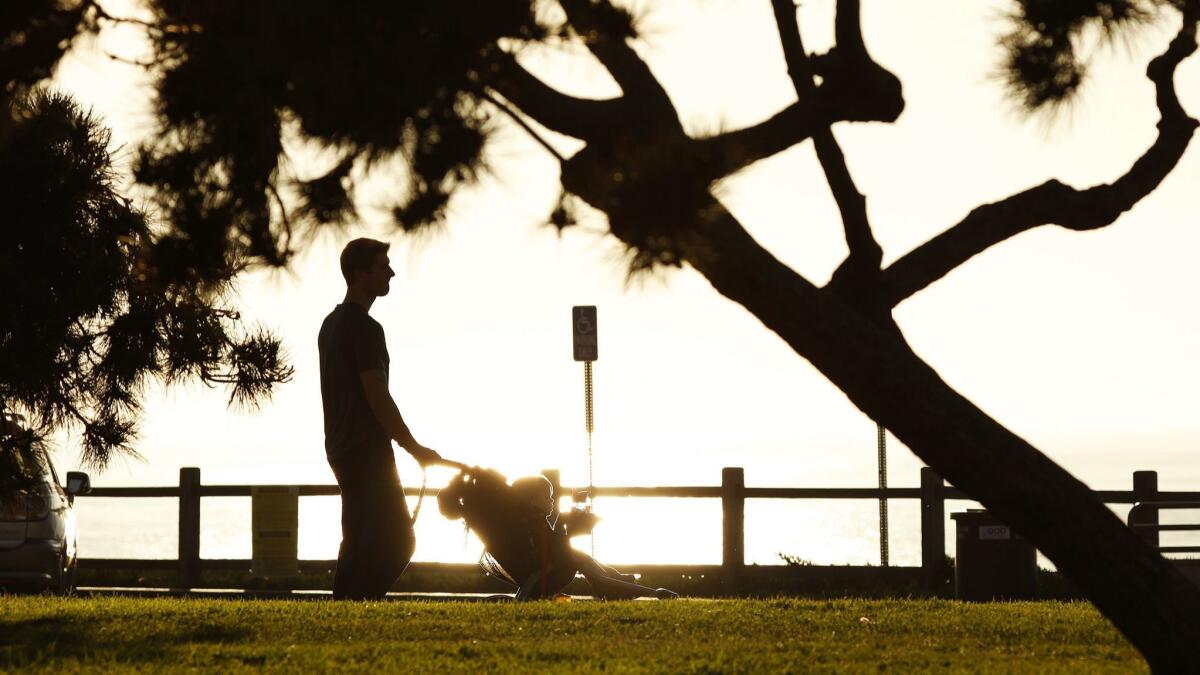
Californians approved Proposition 7 on Tuesday, giving the Legislature the power to enact year-round daylight saving time if Congress allows states to do so.
The measure would conceivably also allow lawmakers to enact year-round standard time — currently used by Arizona and Hawaii — because the measure mostly would abolish a 1949 ballot measure that enshrined the changing of the clocks in state law.
Maine and South Dakota elect first female governors
Democrat Janet Mills, the attorney general of Maine, was the first woman elected governor of the state. In South Dakota, Republican Rep. Kristi Noem was the first woman elected to the post.
And in New Mexico, Democratic Rep. Michelle Lujan Grisham was the first Democratic Latina to be elected governor in the U.S.
California voters reject move backed by top Republicans to repeal state gas tax increase
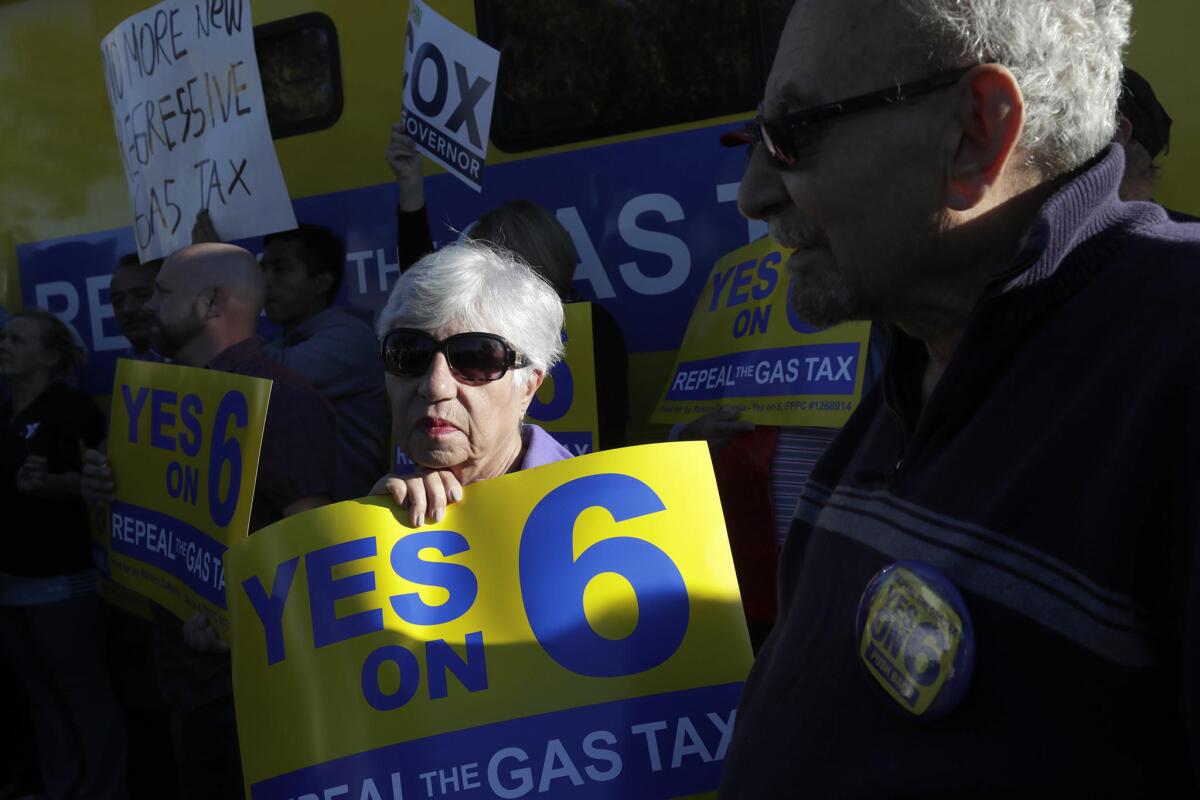
California voters on Tuesday defeated Proposition 6, which would have repealed recent increases in the state gas tax and vehicle fees to provide more than $5 billion annually for road and bridge repairs and mass transit.
Top Republicans including House Majority Leader Kevin McCarthy of Bakersfield, House Speaker Paul D. Ryan of Wisconsin and California gubernatorial candidate John Cox put the initiative on the ballot in hopes of boosting conservative voter turnout for the party’s candidates for Congress and governor.
However, after collecting more than the 585,407 signatures of registered voters required to put the measure on the ballot, the money from Republican leaders dried up.
Gov. Jerry Brown helped raise funds to defeat Proposition 6, which would repeal Senate Bill 1, legislation approved by state lawmakers and signed by Brown in April 2017.
The legislation raised the state gas tax by 12 cents a gallon and boosted the diesel fuel tax by 20 cents a gallon. The measure also created a new annual vehicle fee ranging from $25 for cars valued at less than $5,000 to $175 for cars worth $60,000 or more.
In addition to repealing SB 1, the initiative would have required state officials to obtain voter approval of all future increases to state gas taxes.
Once again California votes for happy chickens and cage-free eggs
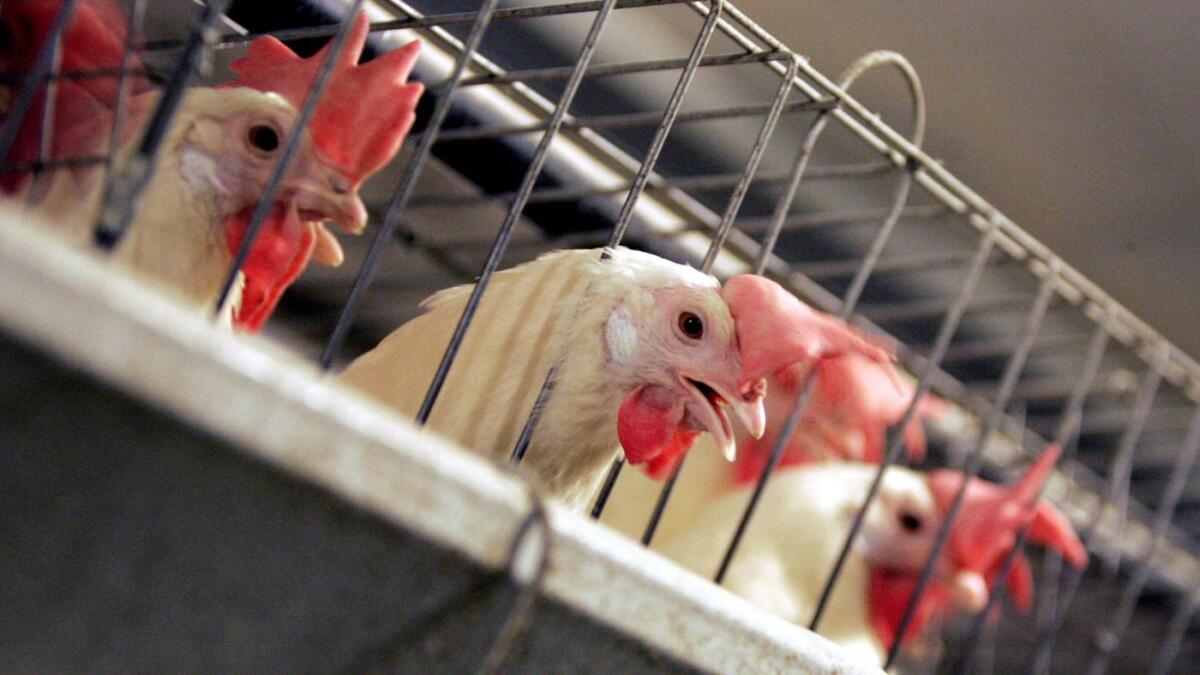
Proposition 12, a statewide ballot measure that would phase in requirements to provide more space for egg-laying hens, breeding pigs and calves raised for veal in California, was approved by voters Tuesday.
Starting in 2020, the measure bans the sale of eggs from hens confined to an area with less than 1 square foot of usable floor space per animal. And beginning in 2022, hens must be kept “cage-free,” although that could include an indoor area that provides 1 to 1.5 square feet of space for each hen as long as they can move throughout the structure.
In 2008, PETA and the Humane Society campaigned in support of Proposition 2, a California initiative that was approved by voters and that requires hens, veal calves and pigs to be kept in sufficient space to be able to turn around freely, lie down, stand up and fully extend their limbs.
While many farms installed bigger cages, the Humane Society sought to build on the 2008 measure with this year’s Proposition 12.
Candidates supported by Disney lead in Anaheim but voters are split on ‘living wage’ measure
Anaheim City Council candidates who are supported by the city’s biggest employer — the Disneyland Resort — were leading a wide field of hopefuls in early returns Tuesday night, but voters were split on a controversial “living wage” initiative that Disney has opposed.
The politics in Anaheim have recently centered on whether the Disneyland Resort, the source of nearly half of the city’s general fund revenue, is paying enough local taxes and whether it should be offering its workers higher wages.
Harry Sidhu, a businessman and former mayor pro tem who received campaign donations from Disney, was leading a field of eight candidates in the race to replace Mayor Tom Tait, an ardent Disney critic who has to step down because of term limits.
GOP Rep. Devin Nunes beats Democrat Andrew Janz in his toughest race in years in his Central Valley district
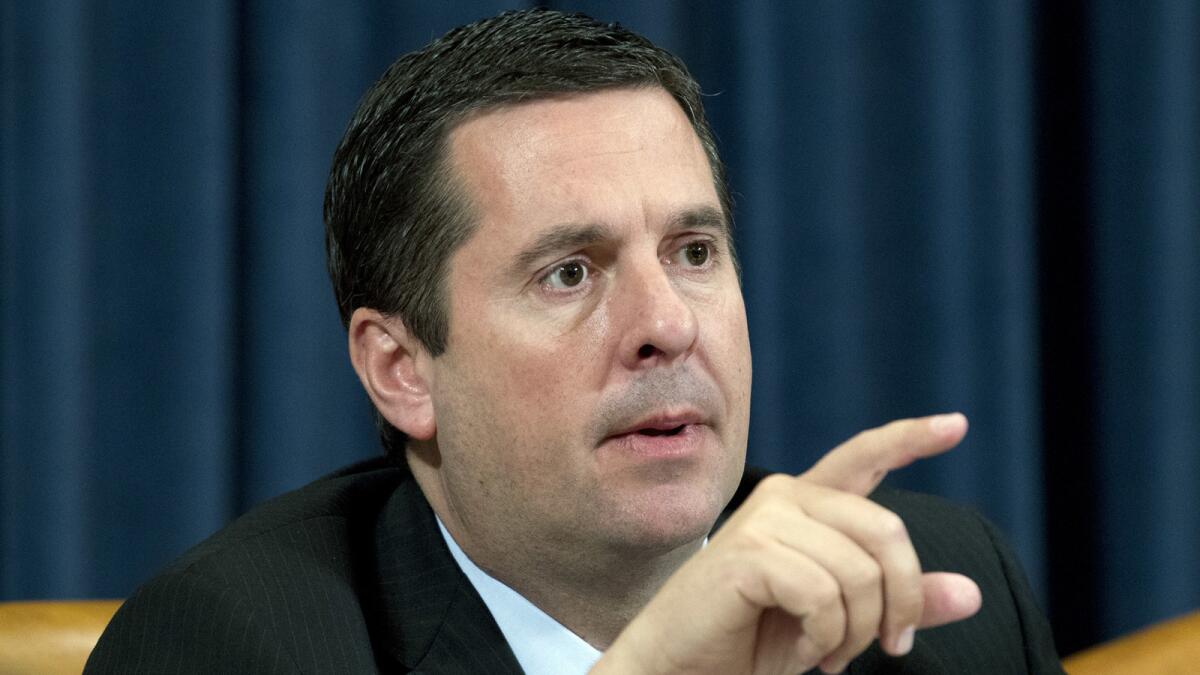
GOP Rep. Devin Nunes has warded off the toughest political challenge he faced in years, claiming victory over Democrat Andrew Janz in California’s 22nd Congressional District.
The eight-term incumbent was once a nearly untouchable political figure in his solidly Republican district in the Central Valley. But the race drew national attention and millions of dollars into both candidates’ war chests as Nunes became a staunch protector of President Trump from the Russia investigation.
Janz, a 34-year-old Fresno County prosecutor, decided to challenge Nunes after Trump’s election. National Democrats chose not to fund him amid the unfavorable odds in the solidly Republican region.
Spanning the more conservative parts of Fresno and Tulare counties, the district leans toward the GOP in voter registration by about 9 percentage points. Nunes, 45, has spent much of his career focused on water storage and irrigation. But he increasingly came under scrutiny on several fronts: his actions to protect Trump, his family’s out-of-state dairy farm and what some call his lack of responsiveness to constituents.
In more recent months, he had taken to the television and radio airwaves to attack not his opponent but the local newspaper, the Fresno Bee, which had angered him with harsh editorials and less-than-flattering news stories.
California voters reject Proposition 10
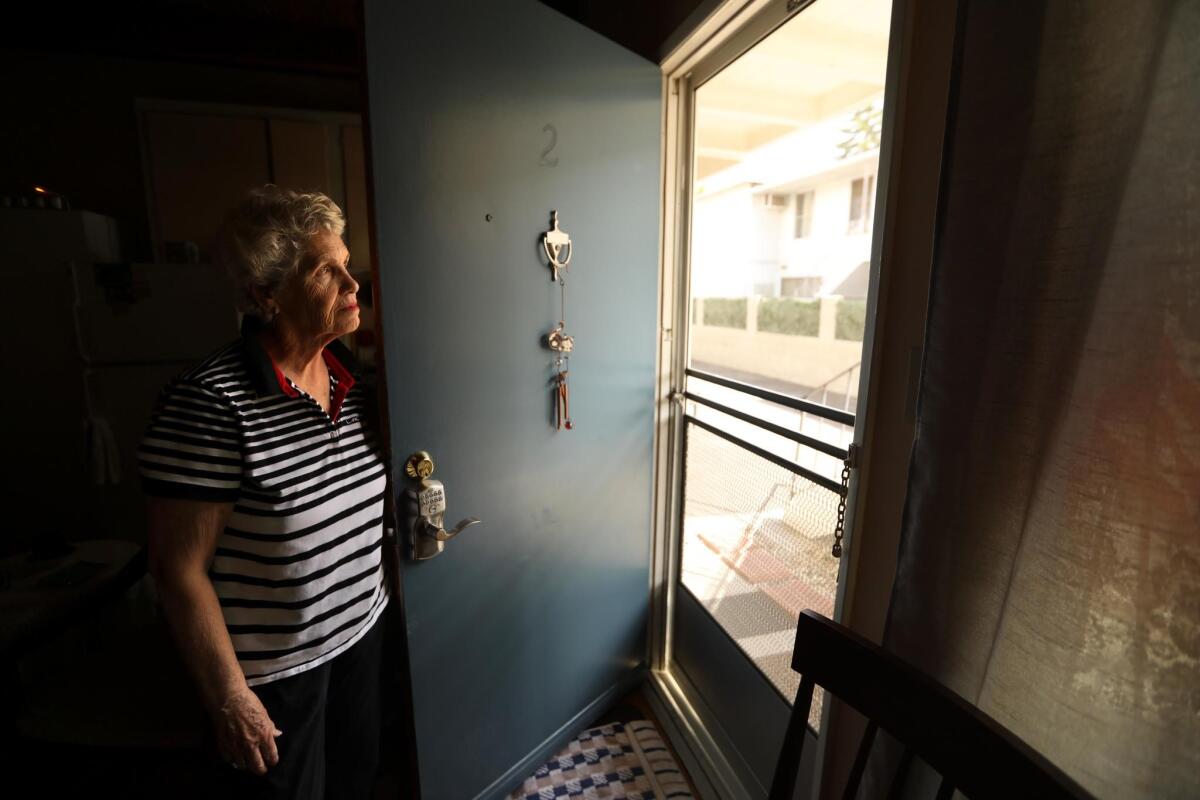
California voters have decisively rejected Proposition 10 on Tuesday, an initiative that would have expanded rent control across the state.
With its failure, a statewide ban on most new forms of rent control remains in effect.
The campaign to expand rent control was pitched to voters as California renters continue to face pressure from rising housing costs. A total of 9.5 million renters — more than half of California’s tenant population — are burdened by high rents, spending at least 30% of their income on housing costs, according to a UC Berkeley study.
Live results from the 2018 midterm elections »
To address the issue, tenant advocates decided to go after the Costa-Hawkins Rental Housing Act, a state law passed 23 years ago that blocks cities and counties from imposing rent control on single-family homes and apartments built after 1995, among other prohibitions. After a bill to repeal Costa-Hawkins failed in a legislative committee in January, groups turned in signatures for a ballot measure, Proposition 10, which would have done the same thing.
Had the initiative passed, local governments would have been free to add new restrictions on rents, something Los Angeles, Berkeley and other cities were considering.
First-time voter hopes to have made a difference

Ebere Amadi, 18, voted at Pomona College.
First-time voter Ebere Amadi, 18, voted at Pomona College.
Trump congratulates Pelosi after Democrats take House majority; staff hinted he wouldn’t
After denouncing her on the campaign trail for more than a month, President Trump congratulated House Democratic Leader Nancy Pelosi on Tuesday night for her party’s having retaken control of the House.
He called shortly after Pelosi’s remarks, which were broadcast on the main cable networks.
“President Trump called Leader Pelosi at 11:45 p.m. this evening to extend his congratulations on winning a Democratic House Majority,” Pelosi spokesman Drew Hammill tweeted. “He acknowledged the Leader’s call for bipartisanship in her victory remarks.”
Just a few hours earlier, before control of the House had been decided, press secretary Sarah Huckabee Sanders said in an interview that it was unlikely Trump would reach out to Pelosi should Democrats win back the majority.
“Look I’m not sure why you would call Nancy Pelosi considering a lot of members of her own party have said they wouldn’t support her,” Sanders said. “If Democrats win tonight, I think we need to wait and see who their speaker is.”
Pelosi, a polarizing figure Republicans have run against for several election cycles, is likely to win the speakership again, even though some members and members-elect have said they would not support her.
Trump had bashed Pelosi for weeks, trying to depict her party as a “mob” intent on crashing the country’s economy and allowing an influx of illegal immigrants. But he has also said he might try to forge deals with the Democrats on some subjects.
Spitzer leads in early returns in contentious O.C. district attorney race
Very early returns Tuesday in the Orange County district attorney’s race showed Todd Spitzer, challenger to incumbent Tony Rackauckas, with a notable lead.
The election culminated months of flame-throwing between Rackauckas, who has held the position for two decades, and Spitzer, his former protégé. The winner will lead an office that handles more than 60,000 cases a year and wields an annual budget of about $145 million.
The race for Orange County’s top prosecutor was among the ugliest in Southern California, and a key test for an office that has been repeatedly rocked by scandal in recent years.
Trump congratulates Pelosi on Democrats’ House win
President Trump called Rep. Nancy Pelosi (D-San Francisco) to congratulate her on Democrats’ winning majority control of the U.S. House, according to the House minority leader’s chief of staff.
Earlier in the night, Trump tweeted about Republicans’ continued control of the U.S. Senate.
Pelosi relishes Democratic takeover of the House

House Democratic leader Nancy Pelosi speaks at a victory party in Washington.
The top House Democrat promised Tuesday night that the party will use its new majority to serve as a check on the Trump administration but promised to strive for bipartisanship.
House Minority Leader Nancy Pelosi — who promises to overcome an intraparty challenge to become House speaker again — said Tuesday’s election is about “restoring the Constitution’s checks and balances to the Trump administration.”
“The American people have spoken,” she said at the House Democrats’ election night party. “Tomorrow will be a new day in America.”
The San Francisco Democrat tried to strike a tone of unity. “We will strive for bipartisanship with fairness for all sides, responsibility to find common ground where we can, stand our ground where we can’t,” she said.
Pelosi promised that House Democrats would pursue legislation to address rising healthcare costs, dark money in politics and infrastructure.
She entered the ballroom to chants of “Speaker! Speaker!” but did not address the coming leadership race. Despite calls for new leaders from a minority in her party, Pelosi has said previously that she expects to regain the speaker’s gavel.
Gavin Newsom elected California’s next governor in win for resistance against Trump
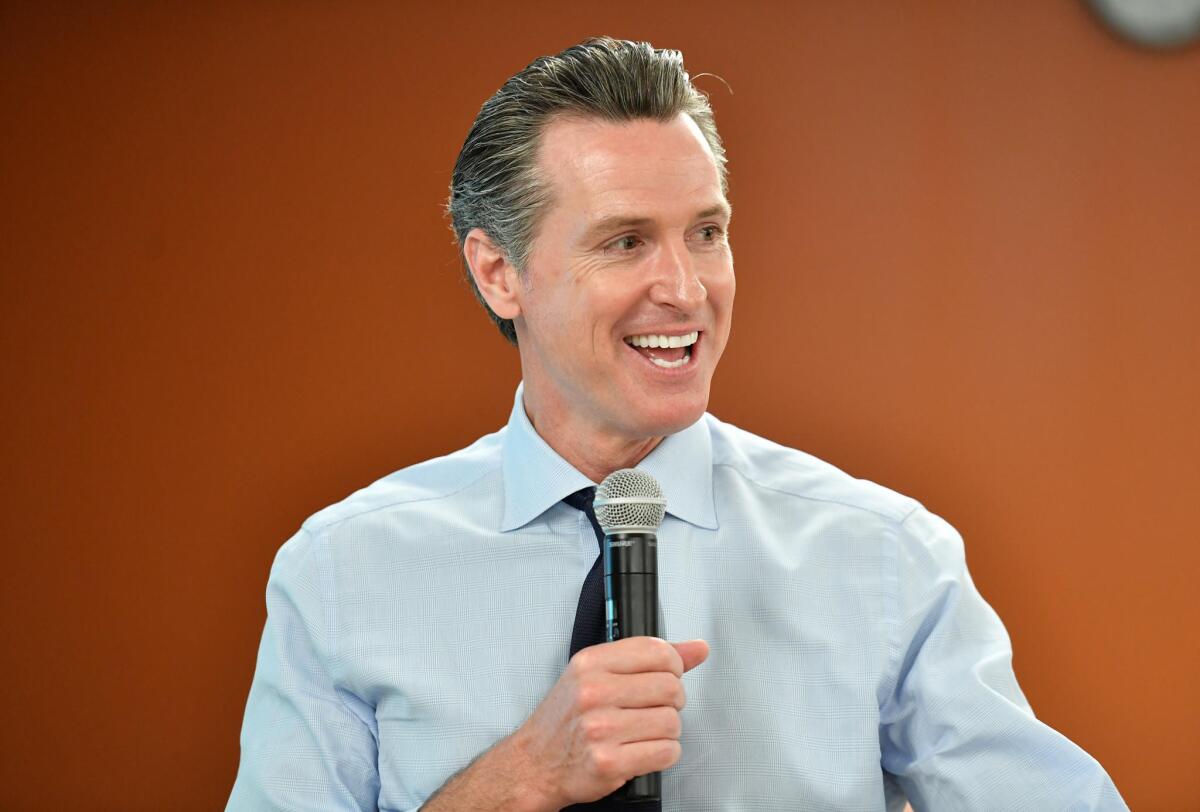
Gavin Newsom won a decisive victory for governor Tuesday night, placing the risk-taking liberal at the center of the resistance to President Trump at a critical moment for California.
Newsom is expected to shift state politics and policy even further to the left after eight years of Gov. Jerry Brown, a pragmatic Democrat known for his fiscal restraint and distaste for expensive new social programs.
Jared Polis to become Colorado’s first openly gay governor
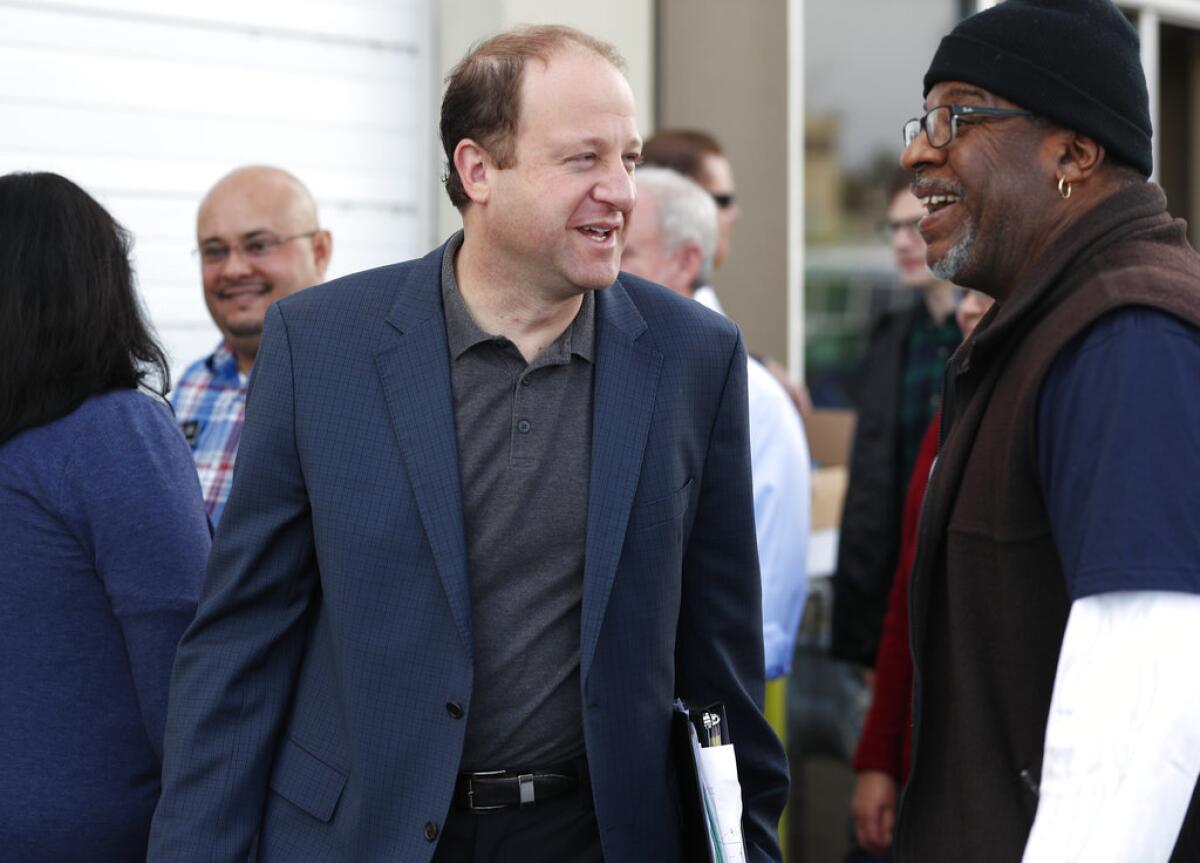
Democratic U.S. Rep. Jared Polis on Tuesday defeated Republican state Treasurer Walker Stapleton in the Colorado governor’s race, keeping the seat in Democratic hands.
Polis will succeed the term-limited John Hickenlooper to become Colorado’s first openly gay governor. The 43-year-old is a five-term congressman and technology entrepreneur who promised to fight for universal healthcare, renewable energy standards and publicly funded preschool and kindergarten. He vowed to stand up to President Trump’s efforts to dismantle former President Obama’s healthcare law.
Stapleton is a two-term state treasurer who campaigned on defending Colorado’s constitutional restrictions on taxing and spending. The 44-year-old Stapleton insisted that Polis’ ideas for funding K-12 education, roads and energy would bankrupt the state.
Colorado has not had a Republican governor since 2007. The state has one of the nation’s lowest unemployment rates and highest rates of economic growth, largely fueled by the tech, aerospace and oil and gas industries.
Polis banked on defending Obama’s healthcare law and riding a wave of anti-Trump sentiment in a state that voted for Hillary Clinton in 2016 and saw overwhelming Democratic turnout in June’s party primaries.
Stapleton sought to court unaffiliated voters, Colorado’s largest voting bloc, by insisting that Polis would jeopardize economic growth with costly and ill-defined proposals to fund schools and roads and expand healthcare.
Stapleton portrayed himself as a defender of conservative fiscal policies that underlie that growth. Polis repeatedly promised to build bipartisan coalitions to invest in underfunded roads and public schools — suggesting the time has come to ask Colorado residents to loosen their strict constitutional limits on taxes and spending.
Healthcare was a top issue in the race. Many Colorado rural and mountain towns pay some of the nation’s highest insurance premiums — and have only one provider — under the Affordable Care Act.
Polis, endorsed by single-payer healthcare proponent Sen. Bernie Sanders of Vermont, unapologetically called for universal healthcare coverage as a long-term goal and suggested a first step might be to create a regional market with neighboring states.
Stapleton praised Trump’s elimination of tax penalties for those without health insurance but said he would defend an expanded Medicaid program that covers 1 in 4 Colorado residents.
Trump endorsed Stapleton, who embraced the administration’s antipathy toward so-called sanctuary cities that don’t closely cooperate with federal immigration authorities. But Stapleton sought to distance himself from Trump in the campaign’s final weeks, arguing that Trump’s scornful tweets about immigrants, women and minorities had no bearing on policy in the governor’s race.
“I’m not going to sit here and defend President Trump’s personality,” Stapleton said in one debate.
Citing the threat of climate change to Colorado’s outdoors industry, Polis proposed a 100% renewable energy standard for Colorado by 2040. Stapleton attacked the goal, saying it would harm Colorado’s $31-billion oil and gas industry. Polis, who raised the ire of the fossil fuels industry by once supporting limits on drilling, insisted the green standard was a goal, not a mandate.
On abortion, Polis insisted that he would guarantee women’s right to choose if a conservative-leaning U.S. Supreme Court were to overturn Roe vs. Wade, the 1973 decision that established a nationwide right to abortion. Stapleton said he would be a “pro-life governor” who would respect Roe as “the law of the land” but didn’t say what he would do if the decision were overturned.
As Stapleton trailed in the polls, he tried to argue that his opponent acted aggressively toward a woman in a 1999 workplace incident in which Polis, then 24, tried to stop a female employee from stealing documents from a company he ran. Police and prosecutors concluded Polis was the victim of theft and did nothing wrong.
First Muslim women elected to Congress
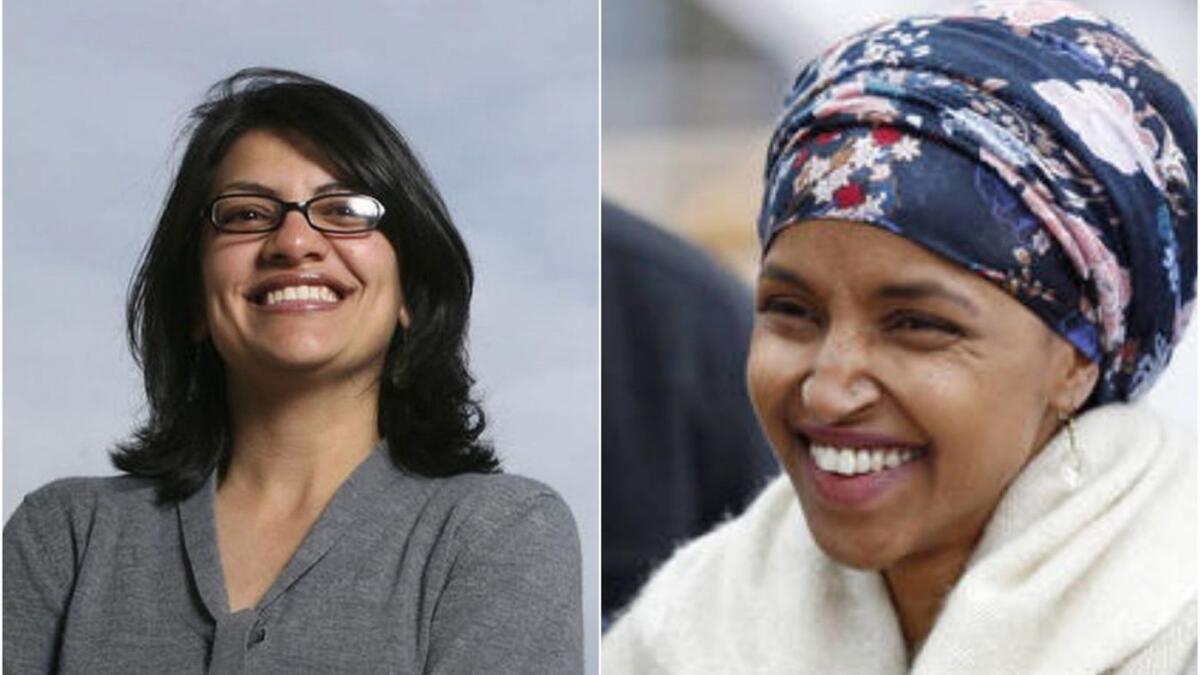
The first two Muslim women were elected to the U.S. House.
Democratic Minnesota state legislator Ilhan Omar won her race in Minnesota’s 5th Congressional District and former Michigan state Rep. Rashida Tlaib won in Michigan’s 13th Congressional District.
Omar is also the first Somali elected to Congress.
Tlaib won the Democratic nomination in the primary to fill the seat of former Rep. John Conyers Jr., who resigned amid sexual harassment allegations.
Democrats take control of the House
Democrats took control of the House in a dramatic midterm rebuke to President Trump. Putting them in the majority, voters gave Democrats a check on Trump and his agenda and the power to investigate him and his administration.
Democrat Laura Kelly defeats Republican Kris Kobach in Kansas governor’s race
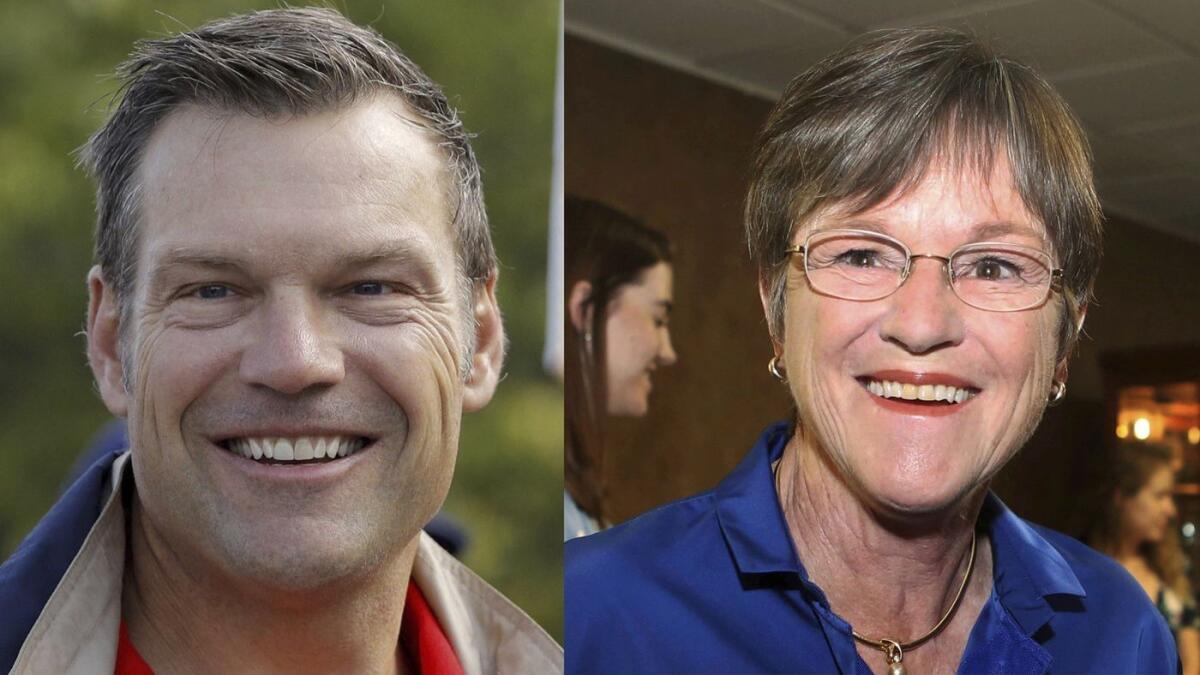
TOPEKA, Kan. — Traditionally red Kansas leaned left Tuesday night, electing a Democrat to the governor’s seat and rejecting Republican Kris Kobach, one of President Trump’s most ardent supporters.
The victory of Laura Kelly, a state senator, was powered in part by moderate, anti-Kobach Republicans crossing party lines. It paves the way for Medicaid expansion in the state, which had been vetoed by Republican Sam Brownback when he was governor.
At least one of the state’s four congressional seats went Democratic as the Kansas City suburbs continued their years-long drift to the left and upstart Sharice Davids, a former MMA fighter, unseated Republican incumbent Rep. Kevin Yoder in the state’s 3rd Congressional District.
The governor’s race was seen less a referendum on Trump than on Brownback, who passed a large tax cut in 2012 that destabilized the state government’s finances and made him deeply unpopular.
Kobach, the current secretary of state and a news-making firebrand known for hardline stances on immigration and voting requirements, had enjoyed near-universal name recognition in the state but also carried a large unfavorable rating. He supported reinstating the Brownback tax cuts, which were reversed by the state Legislature last year after moderate Republicans seized power from their more conservative counterparts.
For the Record, 5:38 a.m. Nov. 7: An earlier version of this post referred to Sharice Davids as a former WWE fighter. She is a former MMA fighter.
Republican Ron DeSantis elected Florida governor, defeating Democrat Andrew Gillum and keeping seat in GOP control
Florida elected Trump stalwart Rep. Ron DeSantis as governor today, rejecting Democrat Andrew Gillum’s strong bid to be its first black chief.
DeSantis, one of the president’s most vocal allies in Congress, shares his victory with Trump, the part-time Florida resident who repeatedly campaigned for him and against Gillum, Tallahassee’s mayor, calling Gillum, without evidence, corrupt and incapable of doing the job.
Before Associated Press called the race, Gillum conceded.
Lauren Underwood projected to win in Chicago suburb that Trump won in 2016
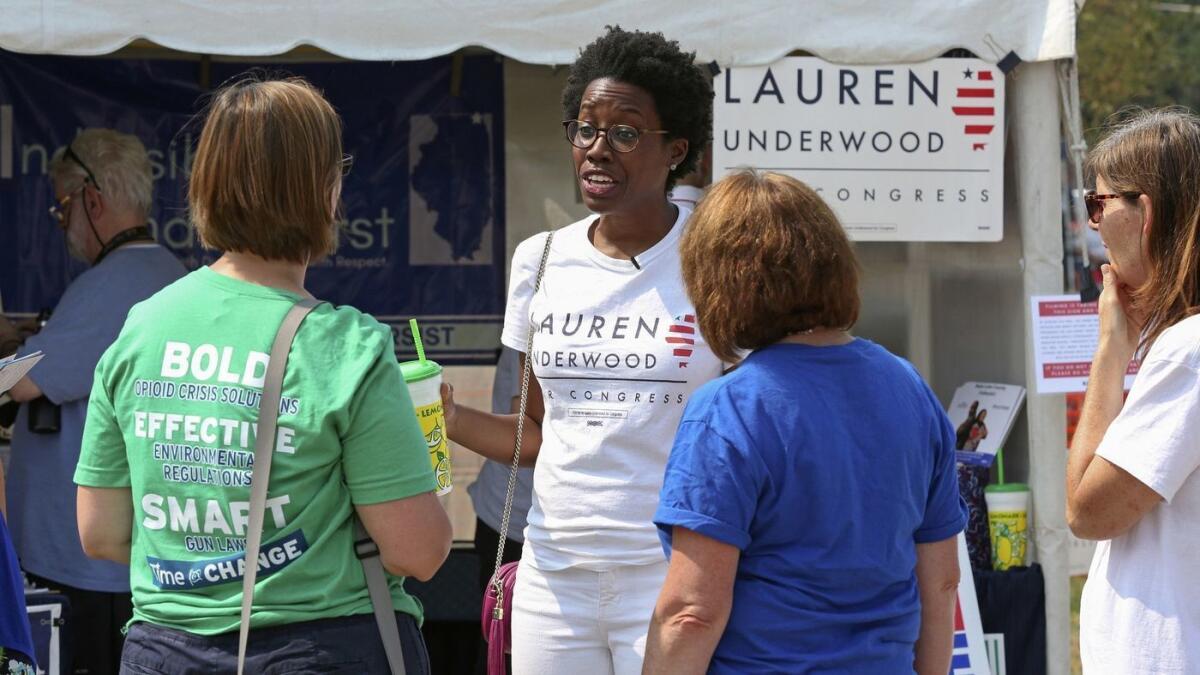
Democrat Lauren Underwood defeated Republican Rep. Randy Hultgren in the far suburbs of Chicago, a high-profile pickup for Democrats in a district that President Trump won by nearly 4 percentage points.
Two years ago, Democrats said they would target the district, but it was considered a long shot, given Trump’s popularity and Hultgren’s history of defeating challengers by nearly 20 percentage points.
Underwood, a 32-year-old African American woman and nurse, quickly raised money and made healthcare a key issue. She said Hultgren’s vote for Obamacare prompted her to run. “I decided: You know what? It’s on. I’m running,” she told constituents in a wine bar in Wauconda, Ill., last month.
Underwood’s victory underscores just how widely Democrats were able to stretch the electoral map this year. Hultgren, who first won his seat in the 2010 conservative tea party wave, told The Times last month that he expected his district to be safe but warned that it would decided by turnout.
Polls have closed in California
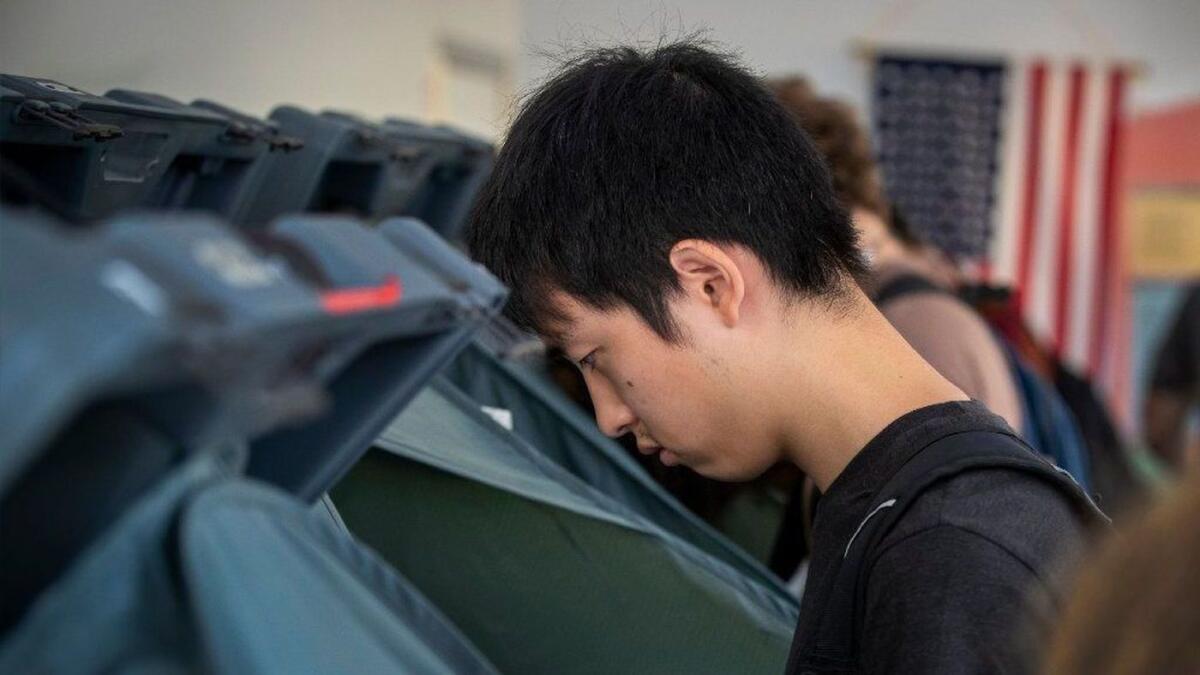
The time has come, Californians.
The polls have closed.
The good news is that if you are already in line at your polling place, you can still cast a ballot.
Read The Times’ coverage:
Where California candidates for governor John Cox and Gavin Newsom stand on top issues
5 things to watch for in California’s tight congressional races
A vote for his daughters and all the women in his life
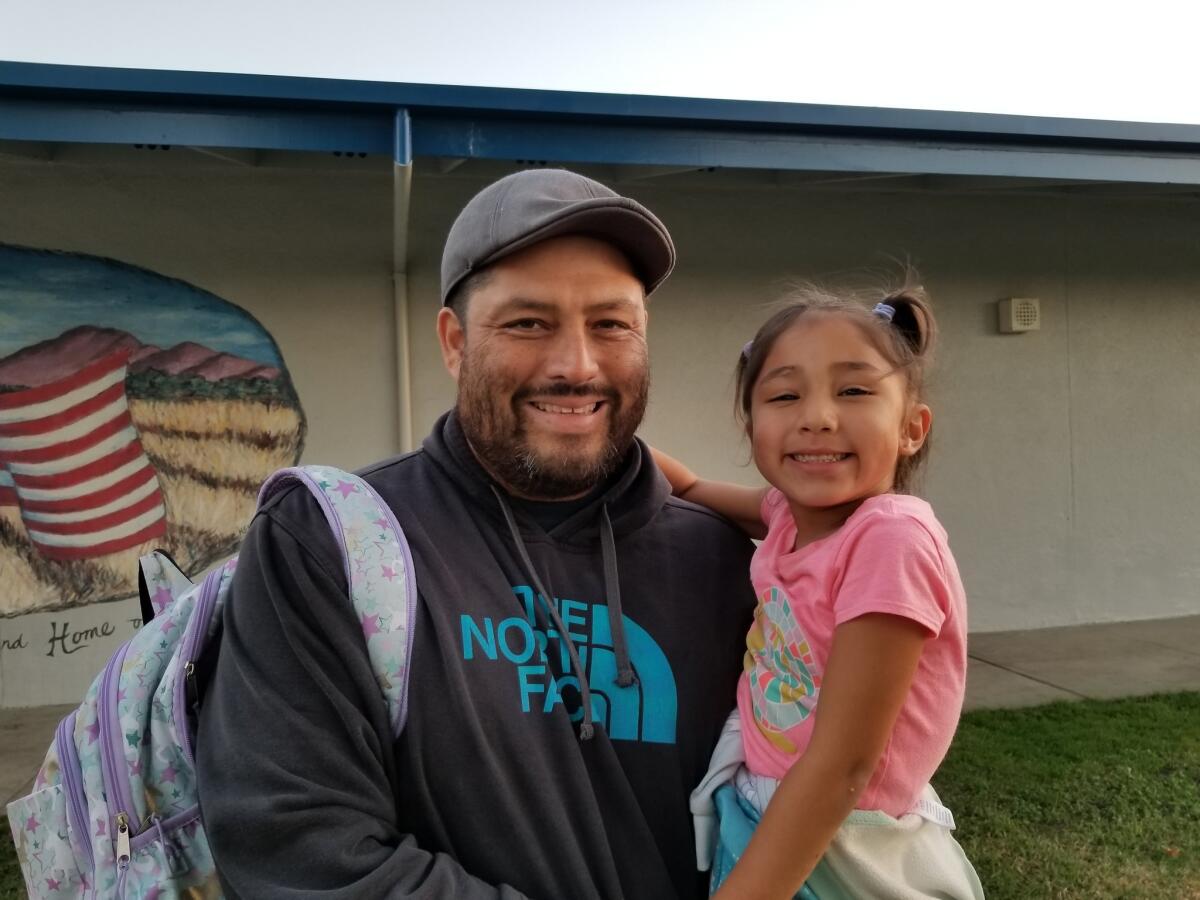
Jon Navarro is usually in the minority. The cabinet maker from Fullerton is a father of three daughters, and his wife has five sisters.
“I’m around a lot of women,” said Navarro, 40, who had his 4-year-old, pigtailed and smiling Elena, in tow as he voted at Fern Drive Elementary School in Fullerton.
He was incensed when he listened to news coverage of the Supreme Court confirmation hearings for Brett M. Kavanaugh. And he especially didn’t like the way President Trump commented on the matter.
“I want everybody to be equal,” he said. “I want my daughters to be strong, powerful women.” (Elena wants to be a veterinarian when she grows up.)
He said he cast a ballot for Gil Cisneros, the Democrat running in the 39th Congressional District, primarily to send a message opposing Trump.
Immigration reform was another priority for him.
“To build a border wall is absolutely insane,” he said. “You’re not accomplishing anything and we should be a more global society.”
Ted Cruz fends off Beto O’Rourke to keep Texas seat
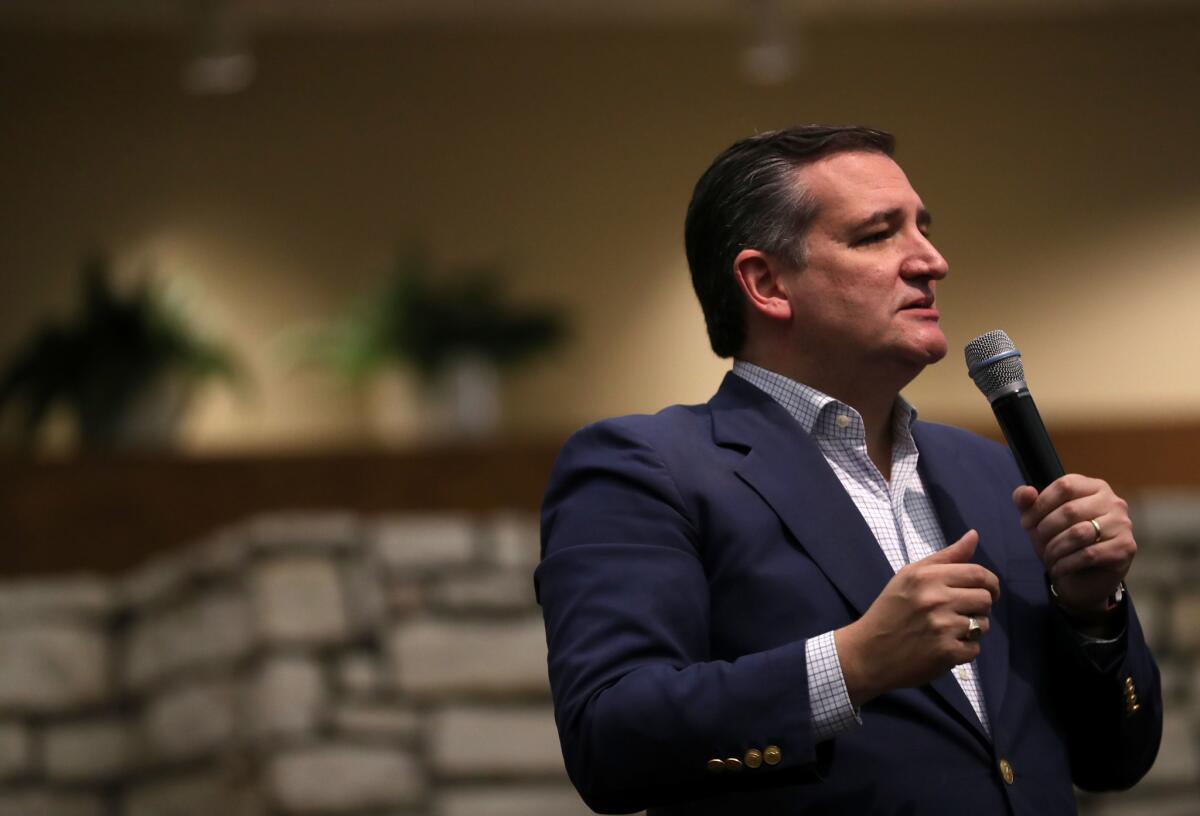
Sen. Ted Cruz held off a bold challenge from Democrat Beto O’Rourke to keep the Texas Senate seat in Republican hands.
Cruz, aided by 2016 rival President Trump, won a second term after a tough race with O’Rourke, who passionately campaigned in an effort to prove that long-red Texas could again elect a Democrat to the Senate. Though his bid fell short, O’Rourke’s efforts excited voters in the state and nationally, bringing in millions of dollars.
Republicans keep control of the Senate
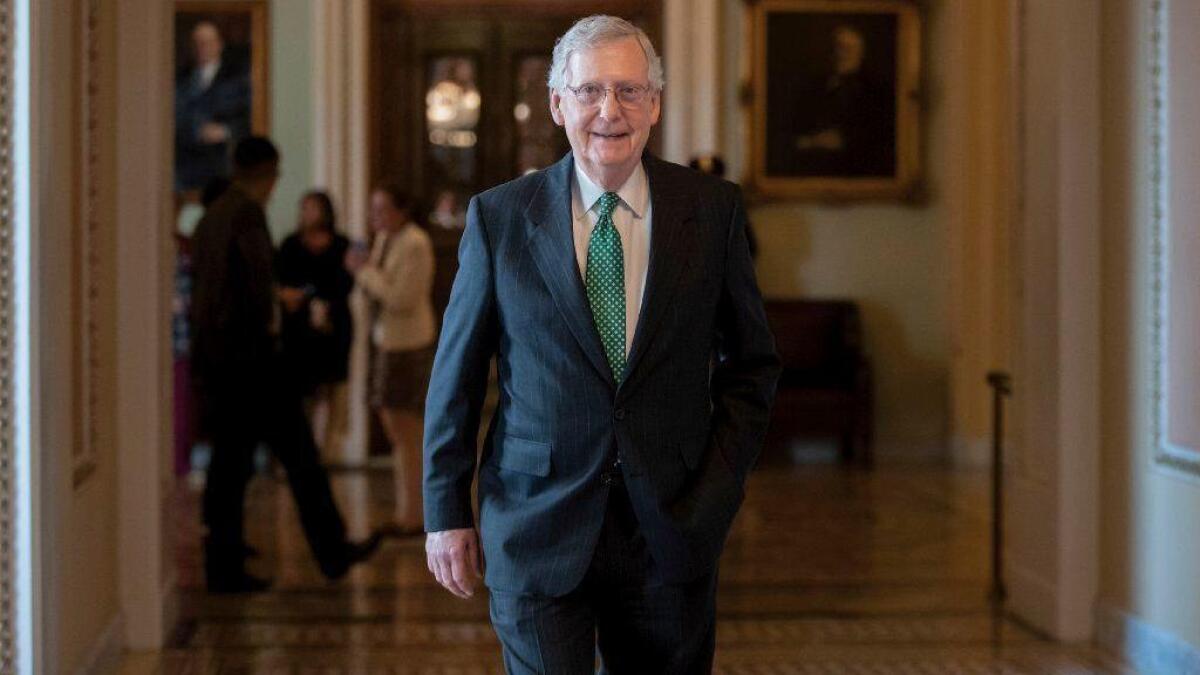
Republicans kept Senate control with a narrow majority helped by a favorable election map.
Despite widespread dissatisfaction with President Trump’s performance, voters kept the Senate in his party’s control and maintained Republicans’ power to reshape the federal judiciary and to protect the president against investigations.
Voting at the Luxe on Sunset Boulevard with some ‘Midterm Elixir’ tea
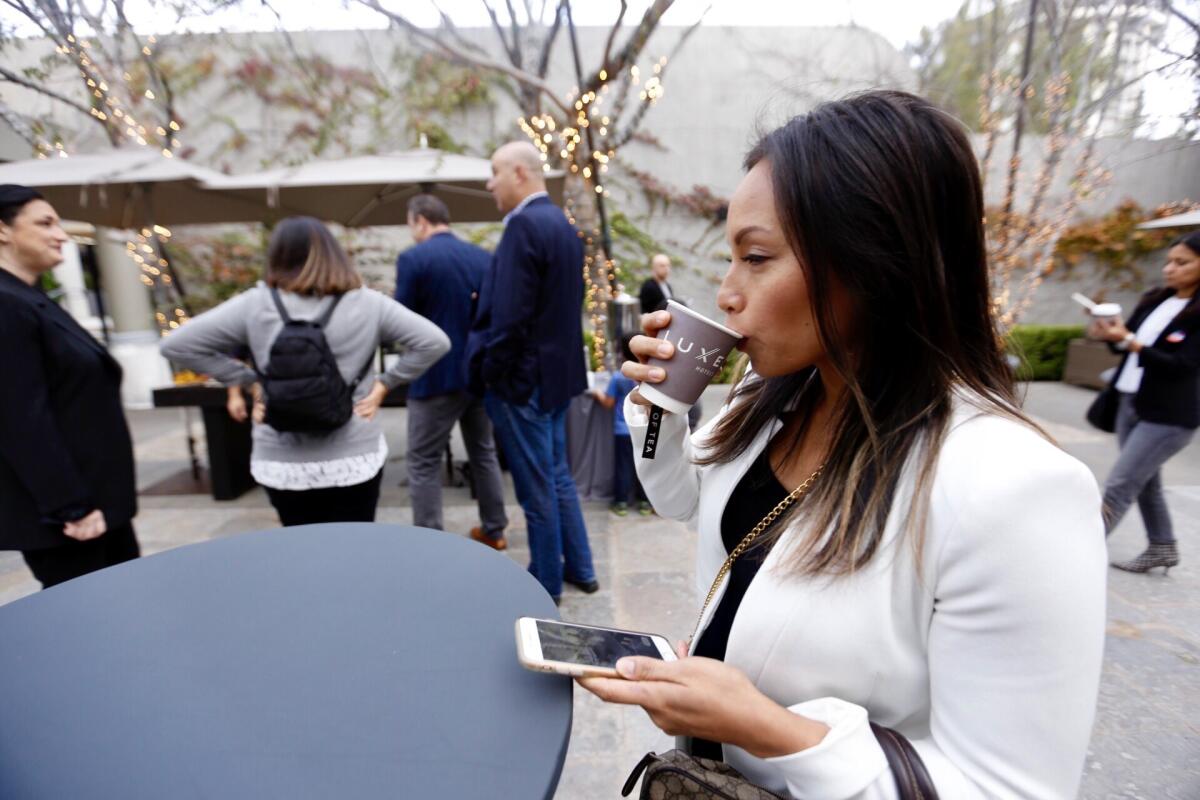
Along Sunset Boulevard, just past the hellish traffic on the 405 Freeway, is a heavenly place where Angelenos gather to vote.
At the Luxe Hotel, the official polling place for residents living in and around the Brentwood and Bel-Air areas, voters are treated to valet parking, finger sandwiches and a soothing tea dubbed “The Midterm Elixir.”
Oh, there’s also a flutist jamming out some Mozart and other classical gems.
These perks are part of the luxury hotel’s effort to provide a calm voting experience amid a contentious midterm election. The serene setting is in contrast with other polling places not just across Los Angeles County but countrywide, where there have been reports of lines snaking around street corners, malfunctioning machines and other problems hindering voters from casting their ballots.
The “Midterm Elixir” is a hand-blended tea that includes minty and floral notes and was created solely for Tuesday’s election. Additionally, lavender plants and olive branches decorated the table where the tea and sandwiches were laid out. Another sign of the efforts to create a tranquil environment.
Sarah Clark, executive manager at the hotel, said previous elections have included yoga sessions, sitar players and a harp player.
“It’s one of the most stressful days of the year, but this year, for the midterm elections, there’s been nothing like it, in terms of the stress levels,” she said.
Efrem Harkham, chief executive and chairman of Luxe Hotel, came up with the idea hoping that voters would not only feel less anxious about the voting process but welcomed by a neighbor.
“His whole idea is no one should ever vote on an empty stomach, and it really is about being here for the community and make it as stress-less as possible,” Clark said.
Just how different was this election for Luxe Hotel? For the first time it had people waiting in line to vote before the polling place opened. Usually, the lines begin to form by 8 a.m., Clark said.
“The traffic was terrible, I was rattled and angry,” said Henry, a 30-year resident who declined to give his last name. “There’s almost an academic understanding of what you’re doing and then you come here and it’s like a zen corridor. I look forward to coming here. I just love relaxing in this place.”
Eating a chicken salad, 50-year-old Josh Davis said he looked forward to voting at the polling place.
“I consider myself very lucky,” Davis said. “It makes you want to go out and vote, and I also love it because my son also sees it’s not as stressful when you do.”
Among the issues he considered important was the superintendent of public instruction. As for the governor’s race, he said he went with Gavin Newsom, a candidate he and his wife feel would be more effective at running California.
Trump tells confidants Ryan is to blame for Republican election setbacks
Hours before polls closed on Tuesday, President Trump already was blaming retiring Speaker Paul D. Ryan for not doing enough to support his agenda and keep the House in Republican hands.
That bit of blame-gamesmanship is according to a Trump supporter who was on a call that the president had with surrogates as voters cast final ballots, but who asked to remain anonymous while talking about the private conversation. Trump’s criticism of Ryan, with whom he’s never had a close relationship, was in keeping with the president’s comments to associates throughout the week leading up to election day.
In those earlier private exchanges, the supporter said, Trump sought reassurance that a political setback for Republicans — in particular the widely projected loss of their House majority — couldn’t be laid at his feet.
That person, echoing Trump’s complaints that congressional Republicans hadn’t fought hard enough for him, pointed to party leadership resisting the president’s requests to finance his proposed wall on the southern border.
On Fox News on Tuesday night, White House Press Secretary Sarah Huckabee Sanders said that “the candidates who have embraced the president … are candidates that we see doing very well tonight.”
Blackburn wins Tennessee Senate race, keeping seat for GOP and becoming the state’s first female senator
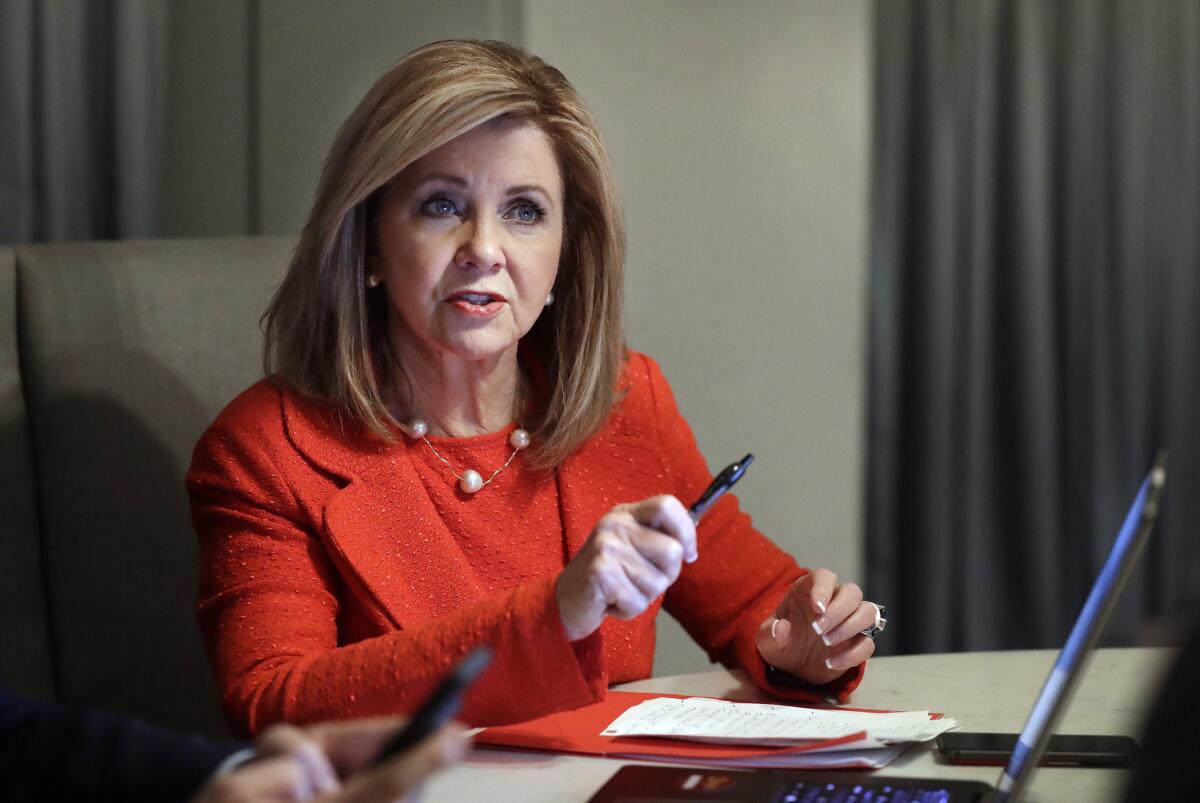
Republican U.S. Rep. Marsha Blackburn won a grueling, expensive contest Tuesday to become the first female U.S. senator from Tennessee, keeping a key midterm seat under GOP control.
The congresswoman defeated Democratic former Gov. Phil Bredesen by closely aligning her bid with President Trump, who drummed up support for her during three visits to the state that he won by 26 percentage points, including a rally in Chattanooga two days before the election.
Blackburn’s win represents a rightward shift from the retiring GOP senator she will replace, Bob Corker, who fell in line with Tennessee’s historical preference for more-centrist senators and at times was a vocal critic of Trump.
Blackburn worked to undermine Bredesen’s popularity and reputation as an independent thinker by tying him to national Democrats at every turn. She rarely diverged from Trump and touted his proposed U.S.-Mexico border wall and tax cuts while blasting Bredesen’s opposition to both. She backed Brett Kavanaugh for Supreme Court the same day Trump nominated him and criticized Bredesen for taking so long to say he would have supported Kavanaugh’s confirmation as well.
First elected to the House in 2002, Blackburn aligned with the tea party movement and regularly appeared on Fox News. She opened her campaign by dubbing herself a “hard-core, card-carrying Tennessee conservative.” Before that, she made a name for herself as a state lawmaker who helped lead the revolt against a proposed Tennessee income tax in the early 2000s.
The pricey race set a state record in spending by candidates and outside groups, gaining national interest because of its potential implications for the GOP’s slim majority in the Senate.
Pop superstar Taylor Swift even broke her political silence for the Tennessee contest when she went on Instagram to endorse Bredesen and encourage people to vote.
Blackburn took aim at Bredesen for donating to Hillary Clinton and Barack Obama and receiving campaign checks from high-profile Democrats. Although Bredesen largely kept his distance from other well-known Democrats, Blackburn had no qualms bringing Trump and fellow national Republicans to Tennessee.
She welcomed in Vice President Mike Pence twice. The president’s son Eric Trump and U.S. Sens. Marco Rubio of Florida, Lindsey Graham of South Carolina, Joni Ernst of Iowa, Tom Cotton of Arkansas and Thom Tillis of North Carolina also came along for separate campaign events.
Corker, the outgoing senator, had backed Blackburn but refused to campaign against Bredesen, whom he considers a friend. Corker briefly heard out pleas from some peers last winter that he reconsider retirement, prompting a Blackburn spokeswoman to say anyone who thinks she can’t win the general election is a “plain sexist pig.”
Afterward though, she managed to consolidate support across the GOP’s various political circles, including from former U.S. Rep. Stephen Fincher, who briefly opposed her in the primary and called for Corker to run again upon dropping out of the race.
Orange County caregiver delivers absentee ballot in person: It’s ‘too important’ to lose
Caregiver Phuong Le rushed out of the house to run errands Tuesday morning, checking off her top task: hand-delivering her ballot to the Westminster Library polling station.
“I have to make sure it is not lost. I understand every vote is important,” said the longtime Westminster resident, 61.
Counting down the weeks before the election, she dutifully listened to Little Saigon Radio and surfed multiple TV stations in both English and Vietnamese to memorize names and issues.
In the City Council races, one name stood out to her: Tai Do, whose job as a police officer inspired a sense of trust, she said. She also voted for state Sen. Janet Nguyen, running for reelection, saying, “It’s because she’s so active in advocating for all the good causes, including my favorite measure of requiring Vietnamese history to be a part of the curriculum for our students. When we are old, we need the young to know their past so they can make better decisions.”
Voting is “an honor” that her parents especially value, according to Le, who says she talks over issues with them, who are in their 90s, as well as her husband, making sure she also drops off all their ballots in person.
“Even my father reminds me, he doesn’t want to miss the chance to vote,” she said. “We are lucky we have this opportunity.”
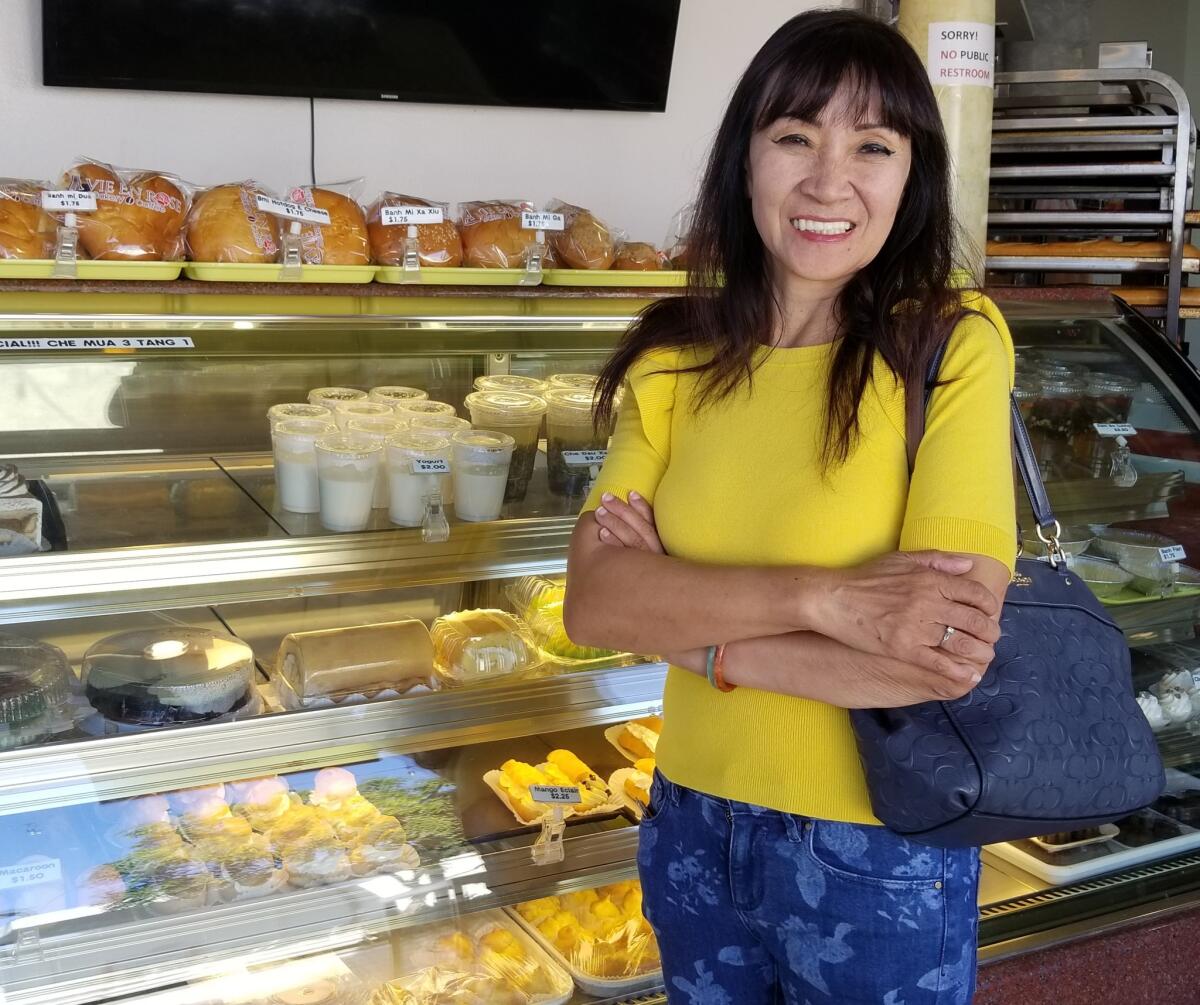
Texas elects first two Latinas to Congress
Texas is sending its first two Latinas to Congress.
Both Democrats, state Sen. Sylvia Garcia won her U.S. House race in Congressional District 29 and former county Judge Veronica Escobar won hers in Congressional District 16.
Democrat Alexandria Ocasio-Cortez elected to House, would become youngest member of Congress
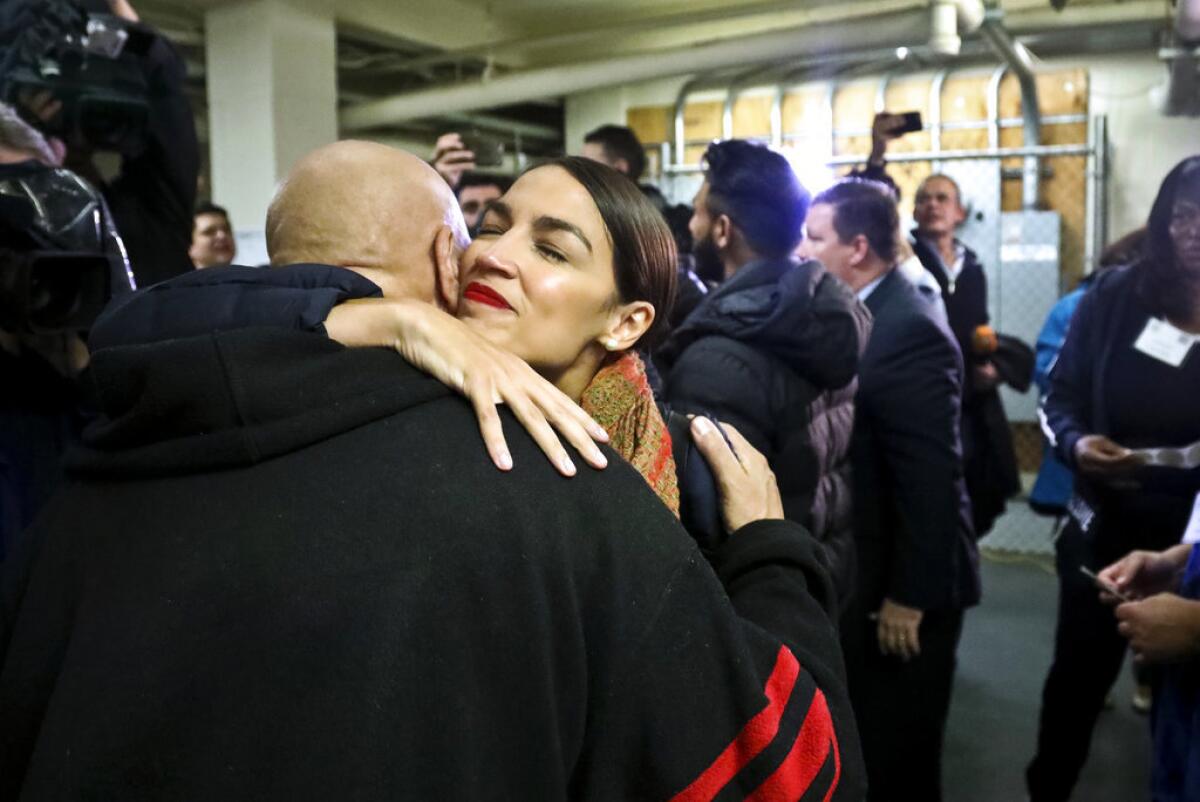
Democrat Alexandria Ocasio-Cortez has defeated a little-known Republican opponent in a district representing part of New York City.
Her victory Tuesday over economics professor Anthony Pappas was widely expected after Ocasio-Cortez scored an unanticipated upset over 10-term U.S. Rep. Joe Crowley in the Democratic primary in June.
At 29 years old, Ocasio-Cortez would become the youngest member of Congress.
She is one of a handful of Congressional candidates who identified as democratic socialists.
Ocasio-Cortez has promised to try and push the Democratic party further to the left.
She supports government-paid healthcare for all, a $15 minimum wage, free college tuition and the abolition of U.S. Immigration and Customs Enforcement.
‘I am the red wave,’ says one Trump supporter in Fullerton
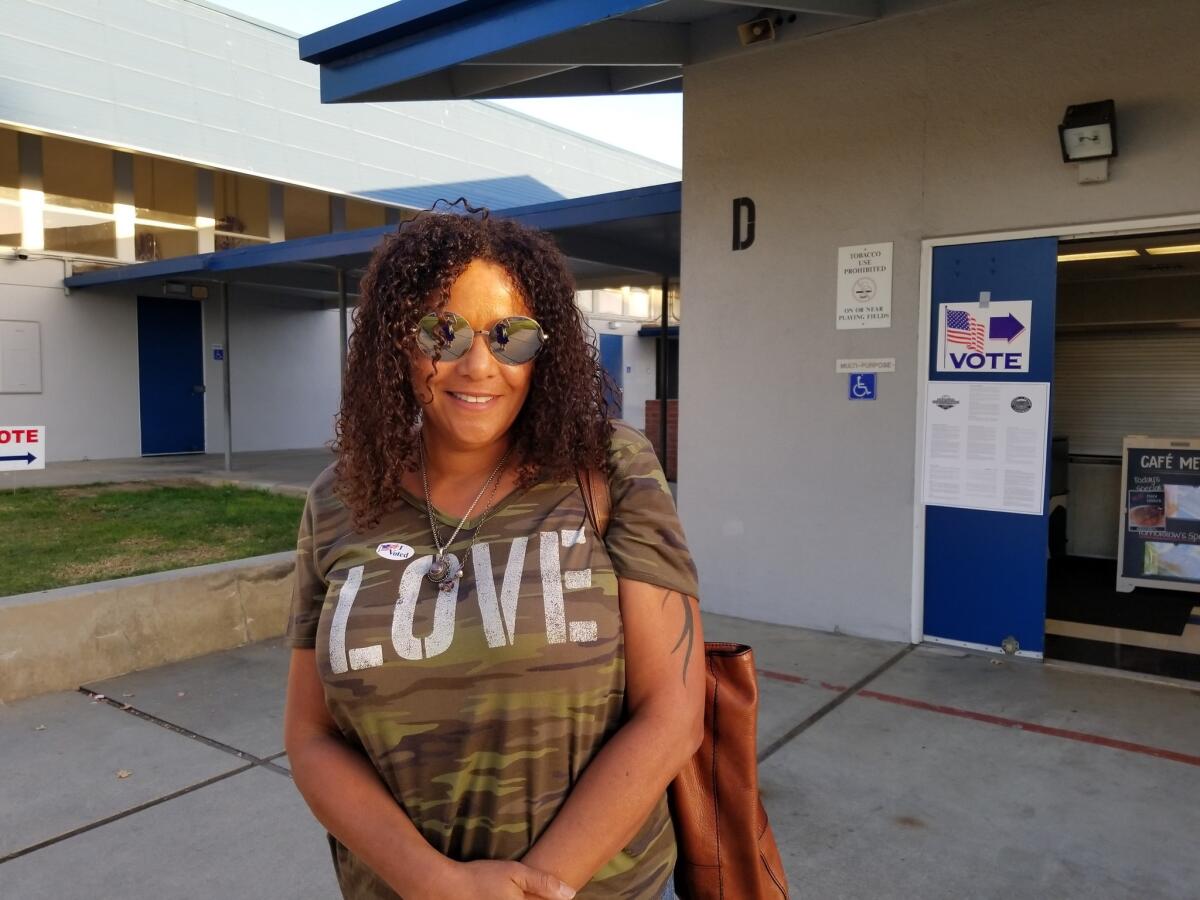
Cat Reese didn’t hesitate when asked who she voted for in the 39th Congressional District.
“Young Kim,” she said. “Anything conservative. I’m voting a straight Republican ticket. I am the red wave; I am a full-on Trump supporter.”
Reese said supporting Trump and his immigration policies was her top motivator in this election.
“We’re having a huge influx of people who are trying to take over and get freebies,” she said. “It sounds all great to let everybody in, open our borders and hug it out with everyone, but it’s not the right thing.”
She said she disagrees with providing healthcare and other benefits to immigrants in the country illegally. “That raises our taxes; it’s an easy math equation,” she said. “That makes it harder for us hard-working Americans.”
Reese concluded with a question of her own, which probably doesn’t get asked often in Orange County: “Please tell me there’s more of me out there. Are there a lot of them?”
Trump’s mocking a disabled person felt like a personal insult to this father of an autistic son. Today, that son cast his first vote
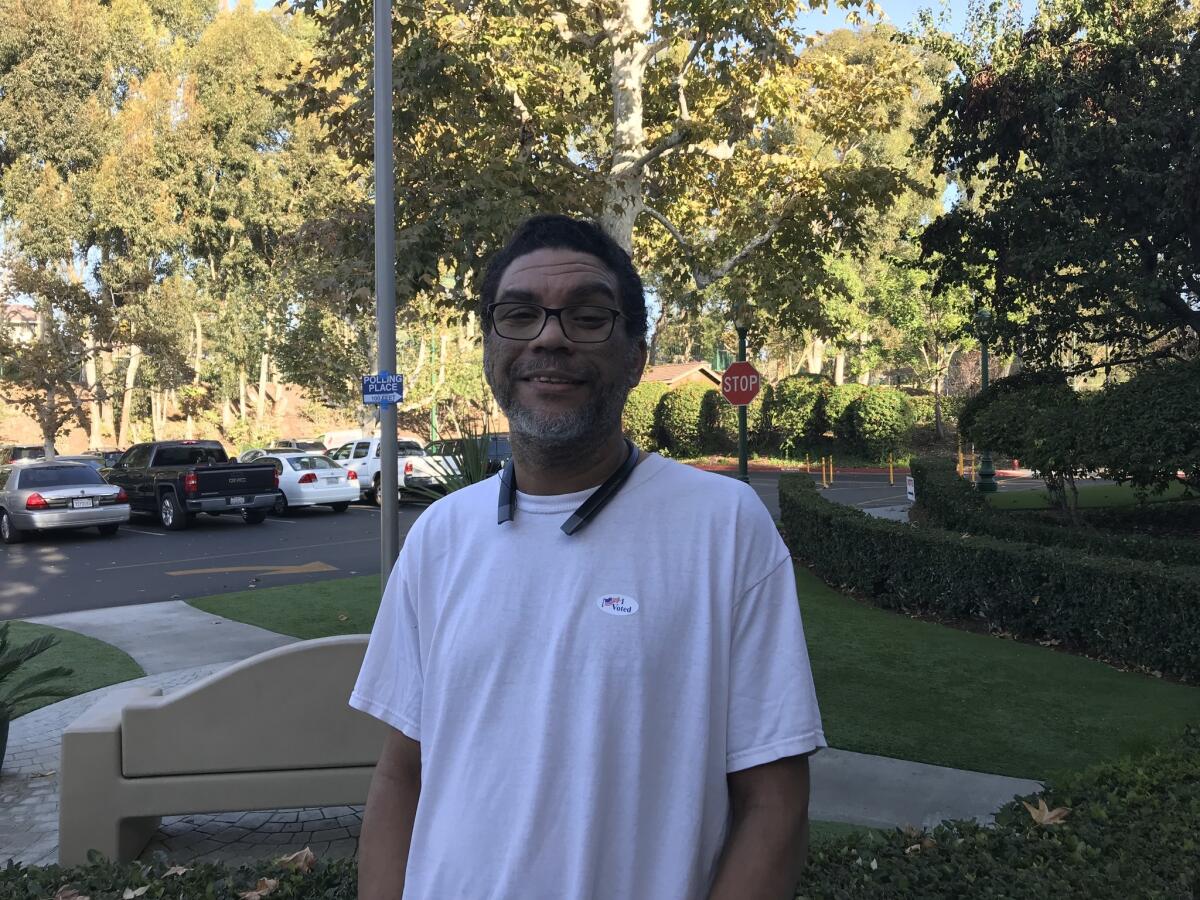
During the 2016 presidential election, Dennis Whitlow Jr. was heartbroken when his son asked him a question about Donald Trump.
“How can America elect somebody that makes fun of disabled people?” his son, Dennis III, asked him at the time, Whitlow recalled.
The insult had felt personal, he said, because his son is autistic.
On Tuesday, he showed up to the polls at a Lake Forest clubhouse with his son as the younger Whitlow cast his first-ever ballot.
His son didn’t want to talk about how he voted — he went with his gut — but the older Whitlow said the choice was easy.
“Straight Democratic this time,” said the registered independent, who said he usually splits his ballot.
The 46-year-old web developer said he was concerned the incumbent, Rep. Mimi Walters (R-Laguna Beach), was too closely aligned with Trump.
“She basically gave him a ticket to do whatever he wanted,” he said. “We need checks and balances. It’s basically one group in charge.”
Florida will restore felons’ voting rights
Most Florida felons who have finished their sentences will be able to vote again in future elections.
Voters on Tuesday approved Amendment 4, which says that most felons will automatically have their voting rights restored when they complete their sentences or go on probation. The amendment exempts those convicted of sex offenses and murder.
Supporters said the state’s current system was too onerous. It required felons to wait at least five years after completing their sentence before they could file a request with the governor and Cabinet. About 1.5 million people are affected. Nearly all states allow felons to vote after completing their sentences.
Opponents argued that the measure treats all felons alike and takes away the ability to judge each individually.
The measure was placed on the ballot by petition.
Yes, Trump was a factor in her vote. But also, chickens
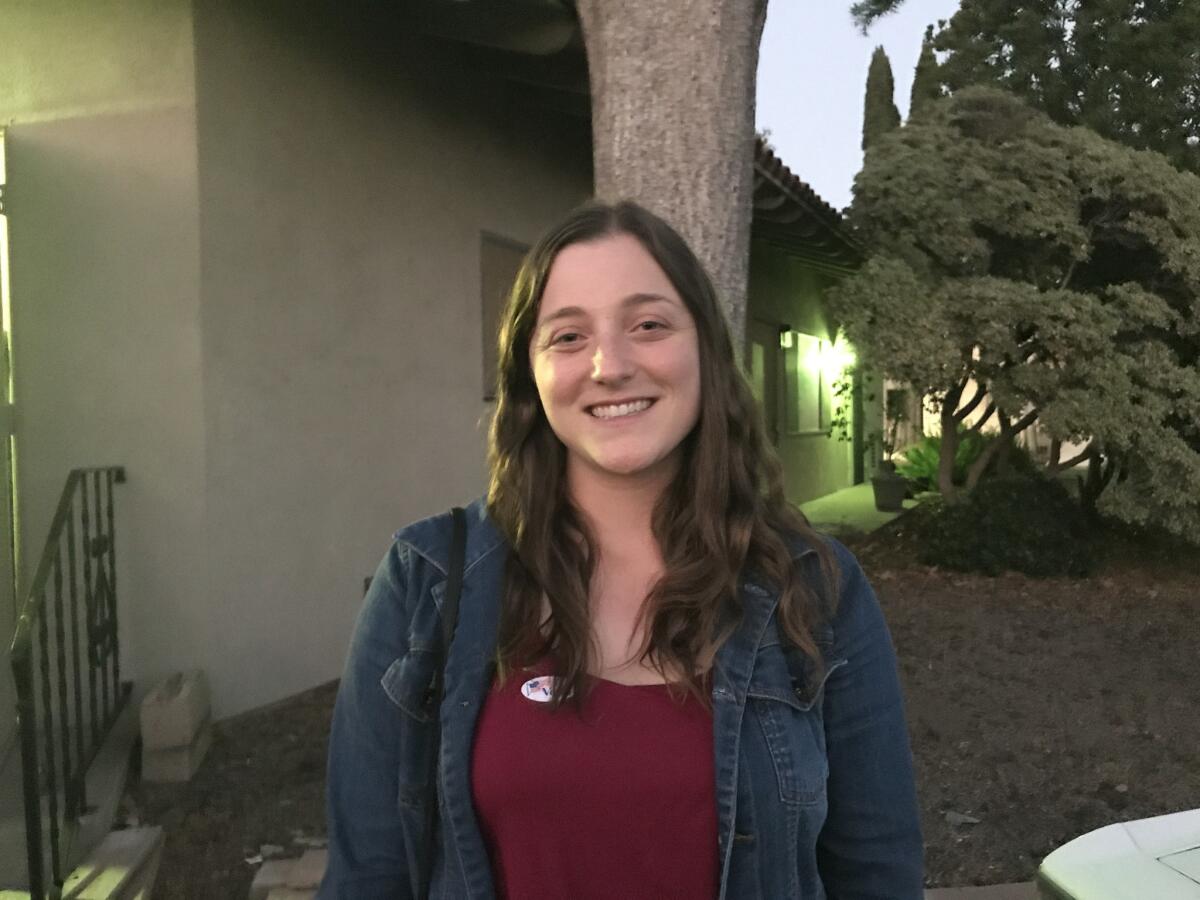
After a year in Japan, Mackenzie Malerstein was excited to have returned to California in time to cast a ballot in Tuesday’s election.
The nation may be focused on the congressional races in Orange County that could determine which party controls the House, but Malerstein said it was some of the state propositions that were more dear to her heart.
Especially Proposition 12, about the treatment of chickens.
“I’m vegetarian, and even though I don’t partake in those practices, I care about animals,” said Malerstein, a school behavioral interventionist.
Also close to home was Proposition 10, which could give cities the authority to expand rent control laws. The last landlord she had before moving to Japan increased her rent by $300 as soon as her lease was up.
As for the candidates on the ballot, Malerstein said she researched whether any had policy positions that aligned with President Trump.
”Candidates who supported things that Trump supported, like the wall, that steered my decision to vote against them,” the Tustin resident said.
Ayanna Pressley is Massachusetts’ first black woman elected to Congress
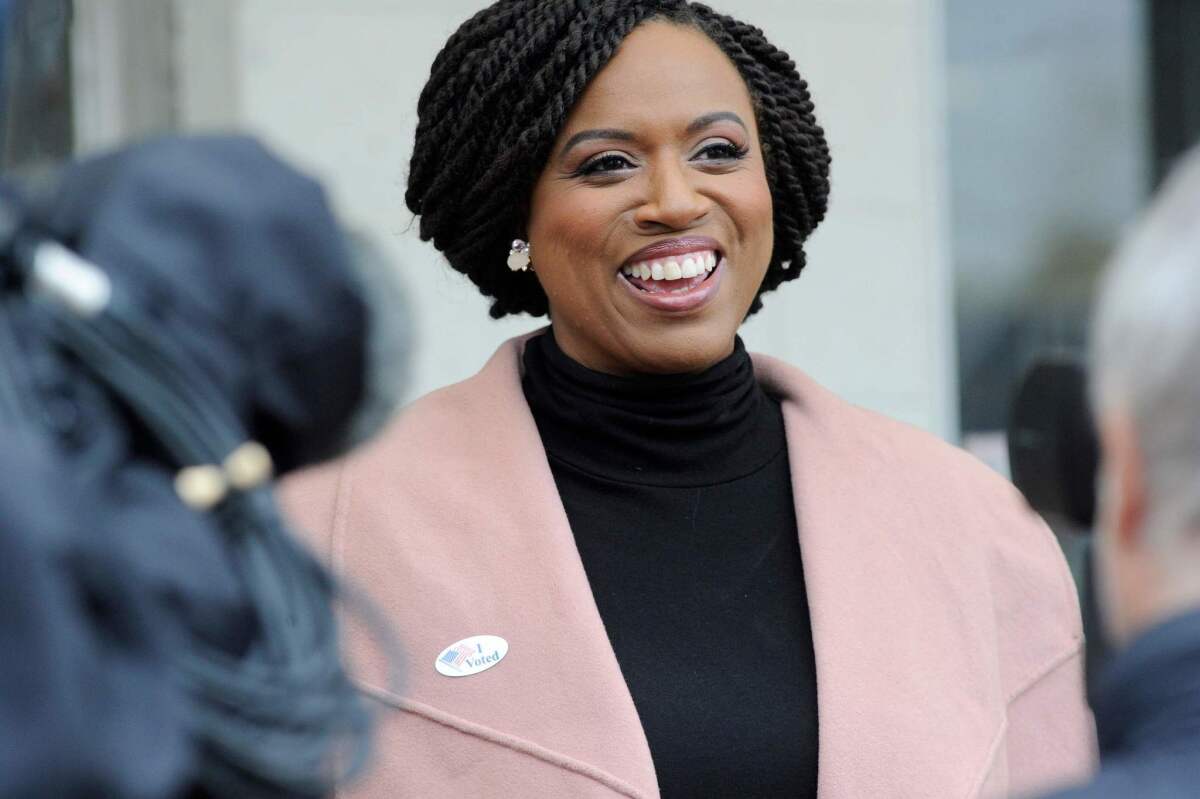
Massachusetts elected its first black woman representative to the U.S. House.
Democratic candidate Ayanna Pressley, the first black woman elected to the Boston City Council, ousted veteran Democratic Rep. Michael E. Capuano in the primary. Pressley candidate ran unopposed.
A first-time voter sits out a crucial House race
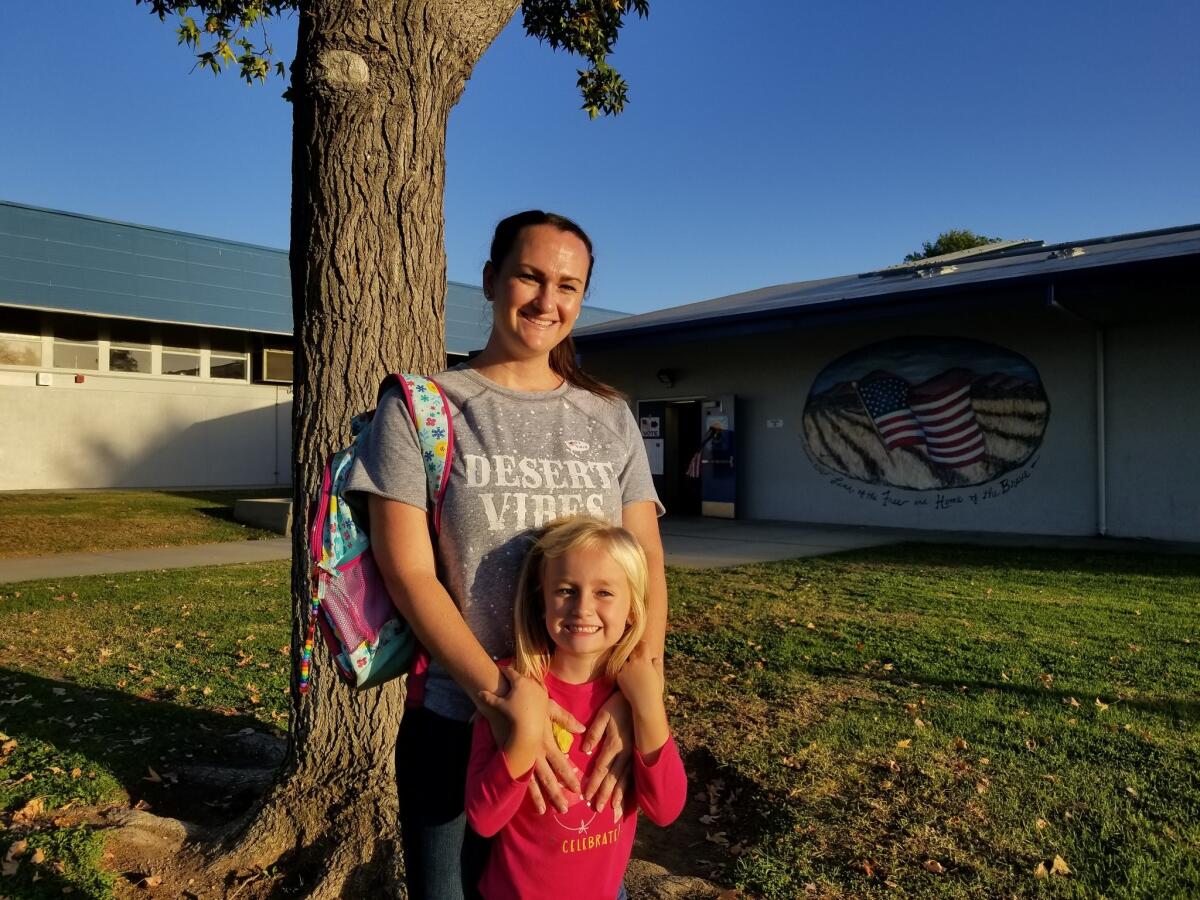
Lacey Kraft has been registered to vote for 16 years, but today was the first time she cast a ballot.
She knew voting was important, but politics had always intimidated her.
“It’s so important it scared me almost, if I chose the wrong ones. It still does,” she said, standing next to her 5-year-old daughter, Lexie. When Kraft’s father found out recently that she’d never voted, he gave her a stern talking-to.
She said she was also motivated to vote by President Trump, whom she called a “bully.”
So she studied up and went to the polls Tuesday.
But the resident of the 39th Congressional District, which could be key to which party controls the House, didn’t vote in the race between Democrat Gil Cisneros and Republican Young Kim. She focused instead on local school board races and the statewide ballot measures, leaving the rest of her ballot blank.
“It was overwhelming, and it snuck up on me,” she said of the election. “It’s very embarrassing that I haven’t voted, and I actually haven’t shared that with many people.… I kind of look at it as an accomplishment, and now I’m hoping I can do better research for the next election.”
Kentucky clerk who nixed same-sex marriage licenses loses reelection bid
The Kentucky clerk who went to jail in 2015 for refusing to issue marriage licenses to same-sex couples has lost her bid for a second term.
Republican incumbent Kim Davis was defeated by Democrat Elwood Caudill Jr. in Tuesday’s election for clerk of Rowan County in northeastern Kentucky.
Caudill is well known in the county, having worked for the county Property Valuation Administrator’s Office for 21 years. He lost to Davis by just 23 votes in the 2014 Democratic primary. Davis later switched to the GOP.
Davis went from obscure local official to a national figure when she stopped issuing marriage licenses days after the U.S. Supreme Court ruled that the U.S. Constitution guarantees same-sex couples the right to marry. The ruling overturned same-sex marriage bans nationwide.
Davis cited her religious beliefs for her action, saying she was acting under “God’s authority.” She was released from jail when her staff issued licenses in her absence.
Independent-minded Simi Valley millennial wants to replace career politicians
The deluge of voters at the Simi Valley Masonic Lodge, where half a dozen voters had queued up at 6:30 in the morning, had slowed to a trickle by the time T.J. Tolliver came to cast his ballot early Tuesday afternoon.
“I think that every citizen should vote, so I voted for what I thought would improve our life,” said Tolliver, adding that he was concerned most with increasing access to housing, education and healthcare.
Trump wasn’t a big factor in his vote, the 26-year-old substitute teacher and caterer said, pointing instead to the state ballot measures that dealt with issues he cared about.
His vote for Democrat Katie Hill in the House race was borne mainly out of a dislike for career politicians and what he understood as the pro-Trump positions of Republican Rep. Steve Knight (R-Palmdale), his congressman in the 25th Congressional District.
Tolliver said he was most disappointed with the elevated rhetoric he saw both Democrats and Republicans employ. He said both sides needed to calm down and focus on reuniting the country rather than pushing two alternative truths.
Tolliver’s independent-mindedness was a factor in previous elections: In 2016, he voted for Green Party nominee Jill Stein for president.
Susan B. Anthony’s grave decorated with ‘I Voted’ stickers
Voters showed up by the dozens to put their “I Voted” stickers on the headstone of Susan B. Anthony, an election day ritual that pays homage to the women’s voting rights pioneer.
Deborah L. Hughes, president and chief executive of the National Susan B. Anthony Museum and House, said there were already a few dozen stickers decorating the gravesite by the time she arrived about 10 a.m. Images of the headstone covered in voting stickers quickly became widely shared on social media.
Jessica Crane drove 40 minutes to add her sticker to celebrate “everything we have accomplished and have yet to accomplish.”
Visiting Anthony’s gravesite on election day has become a popular ritual in recent years. Hughes said thousands turned out in 2016 for the presidential matchup between Hillary Clinton and Donald Trump.
Early returns indicate big nationwide turnout; Trump a major factor, exit polls say
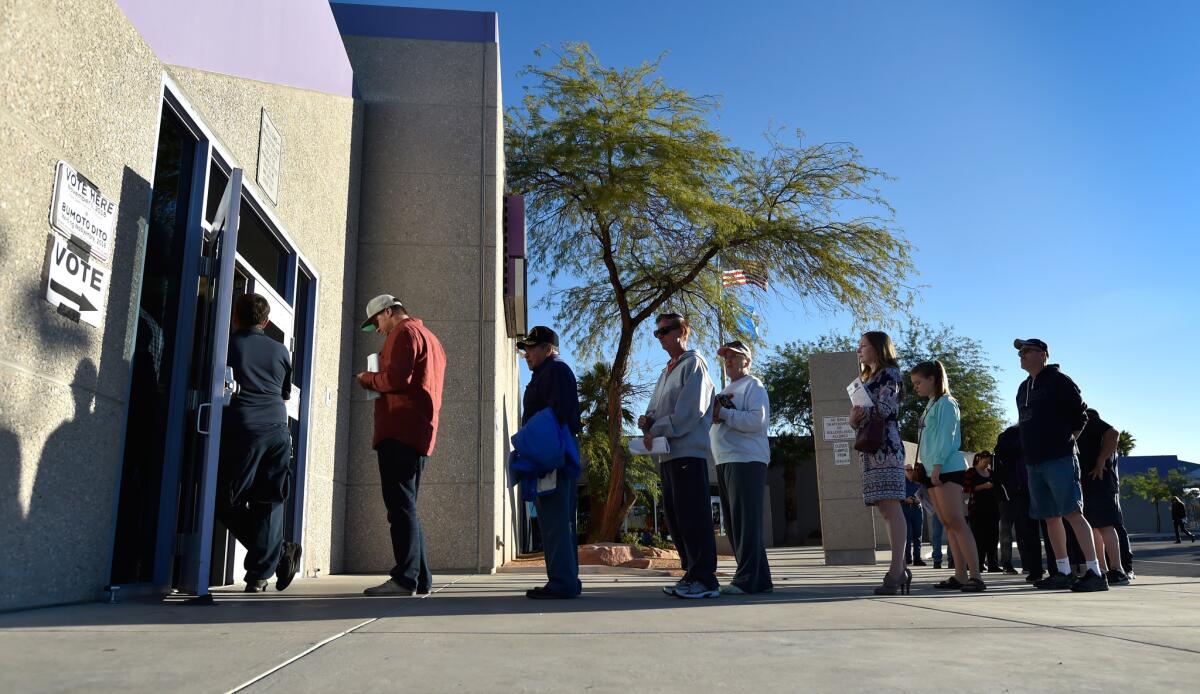
Early returns from around the country indicate unusually high turnout for a midterm election in several key states.
One in six voters were casting ballots for the first time in a midterm, according to an exit poll conducted for several of the major television networks
Both the network exit poll and a separate survey of 113,677 voters nationwide conducted for the Associated Press showed widespread dissatisfaction with the state of the nation.
In the AP poll, about 6 in 10 voters said the country was headed in the wrong direction despite the fact that about two-thirds said the economy was in good shape. In the network poll, 56% said the country was on the wrong track, compared with 41% who said it was headed in the right direction.
About two-thirds of voters in both surveys said that President Trump was a major factor in their vote.
Nearly 40% of voters cast their ballots to express opposition to the president, according to AP VoteCast, a national survey of the electorate; about 25% said they voted to express support for Trump.
In the network poll, 54% disapproved of Trump’s job performance and 47% strongly disapproved, compared with 44% who approved. The share who strongly disapproved of the president was several points higher than the share who felt that way about President Obama in 2010, when his party lost control of the House.
About 1 in 4 voters in the network poll said their vote expressed support of Trump, and about 4 in 10 said their vote was in opposition to him.
Nationally, the electorate was more diverse than in past midterms. Nonwhite voters accounted for 28% of those casting ballots, according to the preliminary results of the network exit poll. In 2014, nonwhite voters made up 25% of the electorate. The racial makeup of the electorate more closely resembled a presidential election than a midterm, the exit poll indicated.
Both polls showed that healthcare was the top issue on voters’ minds. In the network exit poll, 41% cited that as their top issue, compared with 21% who said the economy and 23% who said immigration.
Democrats had centered their campaign around healthcare, emphasizing Republican votes to repeal the Affordable Care Act and its protections for people with preexisting health conditions.
Asked which party would better protect those people, voters favored the Democrats 58% to 34%, the network exit poll found.
5:46 p.m. This article was updated with exit poll data on voter diversity. This article was first published at 4:51 p.m.
Moby performs at a rally for Katie Porter in Orange County

Grammy-nominated artist Moby performs at a Katie Porter rally on election day.
Grammy-nominated musician Moby broke out the acoustic guitar at a rally for Democrat Katie Porter in Tustin on Tuesday. Porter is running against Rep. Mimi Walters of Laguna Beach in California’s 45th Congressional District.
Singers Mindy Jones, middle, and Julie Mintz joined Moby onstage.
Donna Shalala flips Florida’s 27th district to Democrat for the first time in decades
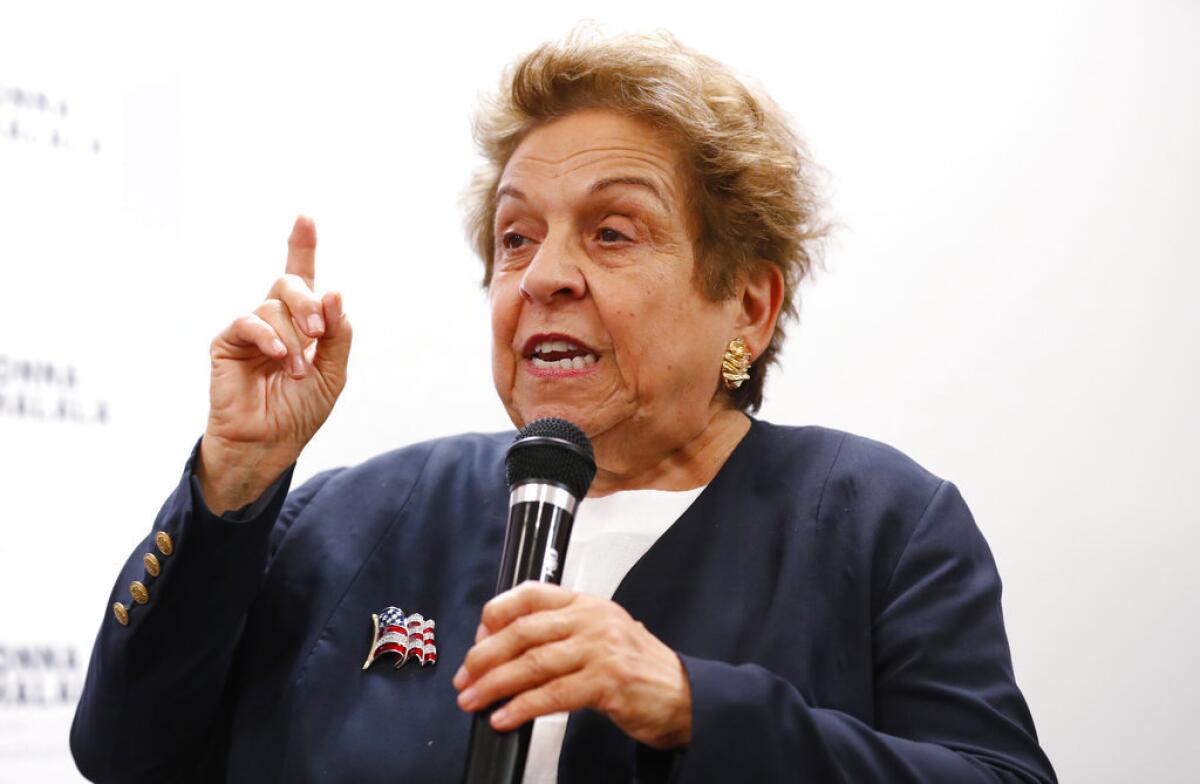
Former U.S. Cabinet secretary Donna Shalala has won election to a House seat in Florida, flipping it into the Democratic column for the first time in decades.
Shalala defeated Republican former television journalist Maria Elvira Salazar on Tuesday in the Miami area’s 27th District. It’s the first foray into elective politics for the 77-year-old Shalala, who was President Bill Clinton’s secretary of Health and Human Services throughout the 1990s.
Shalala also was president of the universities of Wisconsin and Miami and headed the Clinton Foundation from 2015-2017.
The district has long been represented by retiring Republican Rep. Ileana Ros-Lehtinen, but has trended Democratic in recent years.
Salazar is a 56-year-old Cuban-American. She had sought to capitalize on the district’s strong Hispanic presence and cast Shalala as past her prime.
President Trump hunkers down with Corey Lewandowski and others to watch election results
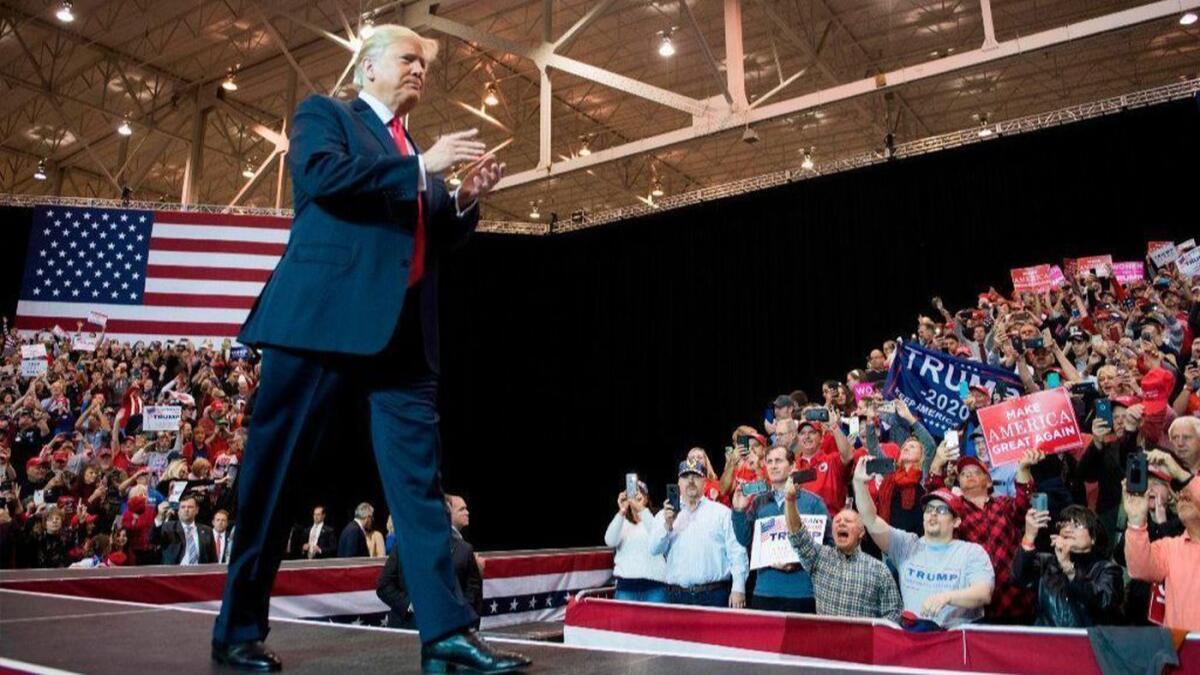
After a rare day of silence, and out of public view, President Trump hunkered down inside the White House to watch election results with political advisors, donors and friends.
He was joined by Corey Lewandowski, his former 2016 campaign manager; David Bossie, his former 2016 deputy campaign manager; and Brad Parscale, his 2020 campaign manager, according to a source with knowledge of the president’s plans.
All three men have been spending considerable time with Trump, joining him on Air Force One as he flew from red state to red state trying to mobilize supporters to help Republican candidates, and laying the groundwork for his own reelection campaign.
The president invited a number of donors and friends, including Las Vegas casino mogul Sheldon Adelson, though it wasn’t clear who was in attendance, the source said.
While a wave of Democratic victories — including in battleground states that Trump won in 2016 — would be an ominous portent for the president’s reelection prospects, this person said, Trump is confident that he could prevail by running against a Democrat-controlled House that presumably will focus on investigating and possibly trying to impeach him.
Half of polls are closed as voters pit Trump strength against Democratic resistance
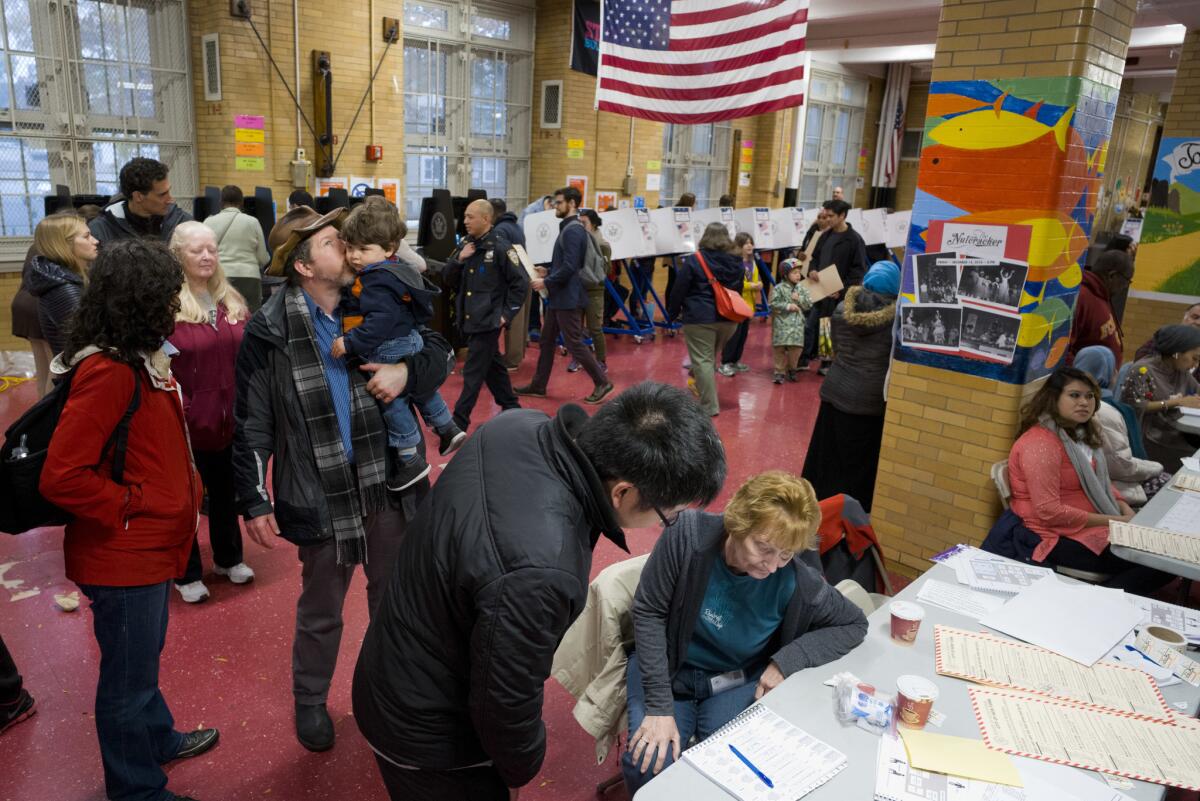
Votes were being counted across half the country Tuesday evening as the energy and outrage of the Democratic resistance faced off against the brute strength of President Trump’s GOP in a fight for control of Congress and statehouses across the nation.
Fundraising, polls and history were not on the president’s side. But two years after an election that proved polls and prognosticators wrong, an air of uncertainty — and stormy weather across parts of the country — clouded the outcome of high-stakes elections from Florida to Alaska and everywhere in between.
Sens. Bernie Sanders of Vermont and Elizabeth Warren of Massachusetts easily won reelection as they consider bids for the Democratic presidential nomination. Other 2020 prospects on the ballot included New York Sen. Kirsten Gillibrand and New York Gov. Andrew Cuomo.
Anxious Republicans privately expressed confidence in their narrow Senate majority but feared the House was slipping away. The GOP’s grip on high-profile governorships in Florida, Georgia and Wisconsin were at risk as well.
“Everything we have achieved is at stake,” Trump declared in his final day of campaigning.
Long lines and malfunctioning machines marred the first hours of voting in some precincts, including in Georgia, where some voters reported waiting up to three hours to vote in a hotly contested gubernatorial election. More than 40 million Americans had already voted, either by mail or in person, breaking early voting records across 37 states, according to an Associated Press analysis.
Nearly 40% of voters cast their ballots to express opposition to the president, according to AP VoteCast, a national survey of the electorate, while 1 in 4 said they voted to express support for Trump.
The nationwide survey indicated that nearly two-thirds said Trump was a reason for their vote.
Overall, 6 in 10 voters said the country was headed in the wrong direction, but roughly that same number described the national economy as excellent or good.
Two issues were on voters’ minds more than any others: 25% described healthcare and immigration as the most important issues in the election.
Trump encouraged voters to view the first nationwide election of his presidency as a referendum on his leadership, pointing proudly to the surging economy at recent rallies.
He bet big on a xenophobic closing message, warning of an immigrant “invasion” that promised to spread violent crime and drugs across the nation. Several television networks, including the president’s favorite Fox News Channel, yanked a Trump campaign advertisement off the air on the eve of the election, determining that its portrayal of a murderous immigrant went too far.
The president’s current job approval, set at 40% by Gallup, was the lowest at this point of any first-term president in the modern era. Both Presidents Obama’s and Clinton’s numbers were 5 points higher, and both suffered major midterm losses of 63 and 54 House seats, respectively.
Democrats needed to pick up two dozen seats to seize the House majority and two seats to control the Senate.
All 435 seats in the U.S. House were up for reelection, although fewer than 90 were considered competitive. Some 35 Senate seats were in play, as were almost 40 governorships and the balance of power in virtually every state legislature.
Trump spent Tuesday at the White House, tweeting, making calls, monitoring the races and meeting with his political team.
He and First Lady Melania Trump were to host an evening watch party for family and friends. Among those expected: Vice President Mike Pence and former House Speaker Newt Gingrich, an informal advisor to the president.
Democrats, whose very relevance in the Trump era depended on winning at least one chamber of Congress, were laser-focused on healthcare as they predicted victories that would break up the GOP’s monopoly in Washington and state governments.
The political and practical stakes were sky-high.
Democrats could derail President Trump’s legislative agenda for the next two years should they win control of the House or the Senate. Perhaps more important, they would claim subpoena power to investigate Trump’s personal and professional shortcomings.
Some Democrats have already vowed to force the release of his tax returns. Others have pledged to pursue impeachment, although removal from office is unlikely so long as the GOP controls the Senate or even maintains a healthy minority.
Tuesday’s elections also tested the strength of a Trump-era political realignment defined by evolving divisions among voters by race, gender, and especially education.
Trump’s Republican coalition is increasingly older, whiter, more male and less likely to have a college degree. Democrats are relying more upon women, people of color, young people and college graduates.
Women voted considerably more in favor of their congressional Democratic candidate — with fewer than 4 in 10 voting for the Republican, according to VoteCast, a nationwide survey of more than 113,000 voters and about 20,000 nonvoters — conducted for the AP by NORC at the University of Chicago.
In suburban areas where key House races will be decided, voters skewed significantly toward Democrats by a nearly 10-point margin.
The demographic divides were coloring the political landscape in different ways.
Democrats were most optimistic about the House, a sprawling battlefield set largely in America’s suburbs where more educated and affluent voters in both parties have soured on Trump’s turbulent presidency, despite the strength of the national economy.
Democrats faced a far more difficult challenge in the Senate, where they were almost exclusively on defense in rural states where Trump remains popular. Democratic Senate incumbents were up for reelection, for example, in North Dakota, Indiana and Missouri — states Trump carried by almost 25 percentage points on average two years ago.
History was working against the president in the Senate: 2002 was the only midterm election in the last three decades when the party holding the White House gained Senate seats.
Democrats boasted record diversity on ballots.
Three states could elect their first African American governors, while several others were running LGBT candidates and Muslims. A record number of women were running for Senate, House, governorships and state legislative seats.
Anaheim student tries to ‘block out’ Trump-inspired politics to focus on democratic voting process
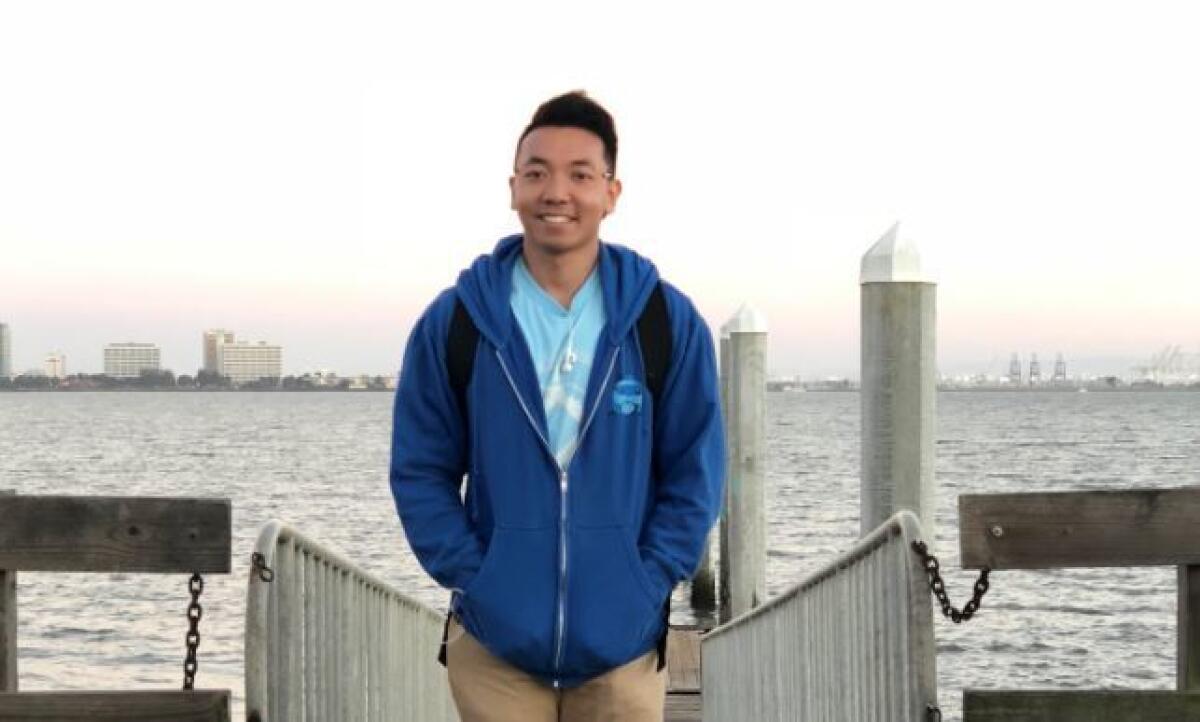
Jessy Nguyen, 25, knew he would be away at school when the election rolled around. So, during a summer filled with volunteer work in California, the Anaheim resident began studying ballot measures and the personalities behind the state’s diverse regional and local races.
“Honestly, the president is not a factor in my votes, not at all,” said Nguyen, a master’s candidate in public policy at the University of Chicago. “The narrative that he’s perpetuating is very violent and many times, he’s targeted communities of color.
“I don’t want to be part of that and I just try to block out what he’s saying,” he said.
Nguyen, a premed student as an undergraduate at UCLA, says he’s concentrating on learning more about health policy now and researching ways more people can get easier access to healthcare. His inspiration for voting is that “I always want to fulfill my civic duties as a citizen. My motivation is that I believe my one vote matters. You can’t think ‘I’m just one vote’ and feel defeated because that can cause a domino effect. We all have incentives to vote.”
Issues that grab hold of his heart are those that involve anti-poverty measures. “We should pay attention to those who are marginalized — fight for their needs. For example, if tenants can have good health insurance, then they spend less on insurance and the money they save can be applied to rent,” Nguyen said.
He mailed his absentee ballot from Chicago and is eager to see local results starting tonight. Nguyen, who did not vote for Trump, says he thinks legislators working with Trump would find it difficult “if you don’t conform to what he believes. So I believe Congress should be pursuing agendas that will help the American citizen and ignore Trump.”
If Nguyen had a chance to talk with the president, he said he does not feel “I can have a productive conversation with him. But, if he is willing to listen, then I would tell him to have more empathy. At the end of the day, he represents the people of the U.S. and so he should try to understand what the people are going through.”
In Venice Beach, a polling place with an ocean view

Westside voters hit the polls in true SoCal fashion. In Venice Beach, voters have a view of the sand and the Pacific Ocean while they cast ballots. At the Luxe Sunset Boulevard Hotel, they can sip a cup of soothing Midterm Election Tea.
Lou Leon Guerrero is elected Guam’s first female governor

Former Democratic lawmaker and current Bank of Guam President Lou Leon Guerrero has been elected the first female governor of the U.S. territory.
“We are extremely grateful for the opportunity given to us to make a positive change for all our people,” Leon Guerrero said, according to Pacific Daily News.
With all 67 precincts counted, Leon Guerrero and Joshua Tenorio, her running mate, received 50.7% of the votes cast for governor of Guam, defeating incumbent Republican Lt. Gov. Ray Tenorio and Tony Ada, who received 26.4% of the vote. Leon Guerrero won by more than 8,600 votes.
The margin is large enough to avoid a runoff, according to final unofficial results.
Leon Guerrero will be the ninth elected governor of Guam and will be limited to two four-year terms.
Guam is about 4,000 miles west of Hawaii, with a population of more than 160,000 people.
This Cambodian American loves Trump and votes Republican ‘all the way’
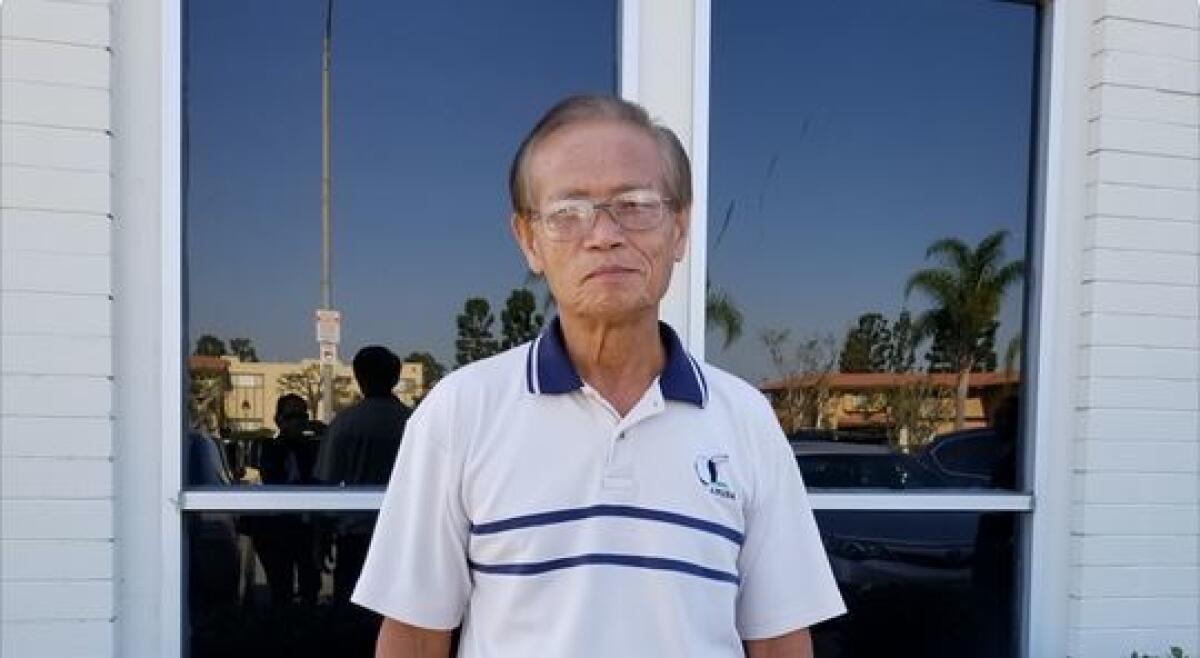
After several rounds of tennis Tuesday, Phon Buor was ready for a juicy bowl of pho in Westminster’s Little Saigon, and was relieved that he had completed his mail-in ballot earlier.
As a Republican, the FedEx delivery man said: “Of course, I voted Republican all the way. I … how do you say it? I like the possibility of Mr. John Cox” for governor. “Of course, I love Mr. Trump very, very much because look what he has done for our economy, look at all the stocks high up, plus the employment is up.”
At 70, the Cambodian American father of four is a devotee of Fox News and spends countless hours listening to its analysis of the state of the country.
“Now I live here. My two oldest children — one is an attorney, the other one is a firefighter — we are grateful they have good jobs. We are part of this great America. We need to be responsible and remember to vote.”
The Long Beach resident who loves watching superstar athlete Serena Williams compete on television, says the convenience of mail-in ballots actually can make people more disciplined. “You can get the work done ahead of time,” he said. “Easy to relax.”
Trump-motivated voter casts her ballot
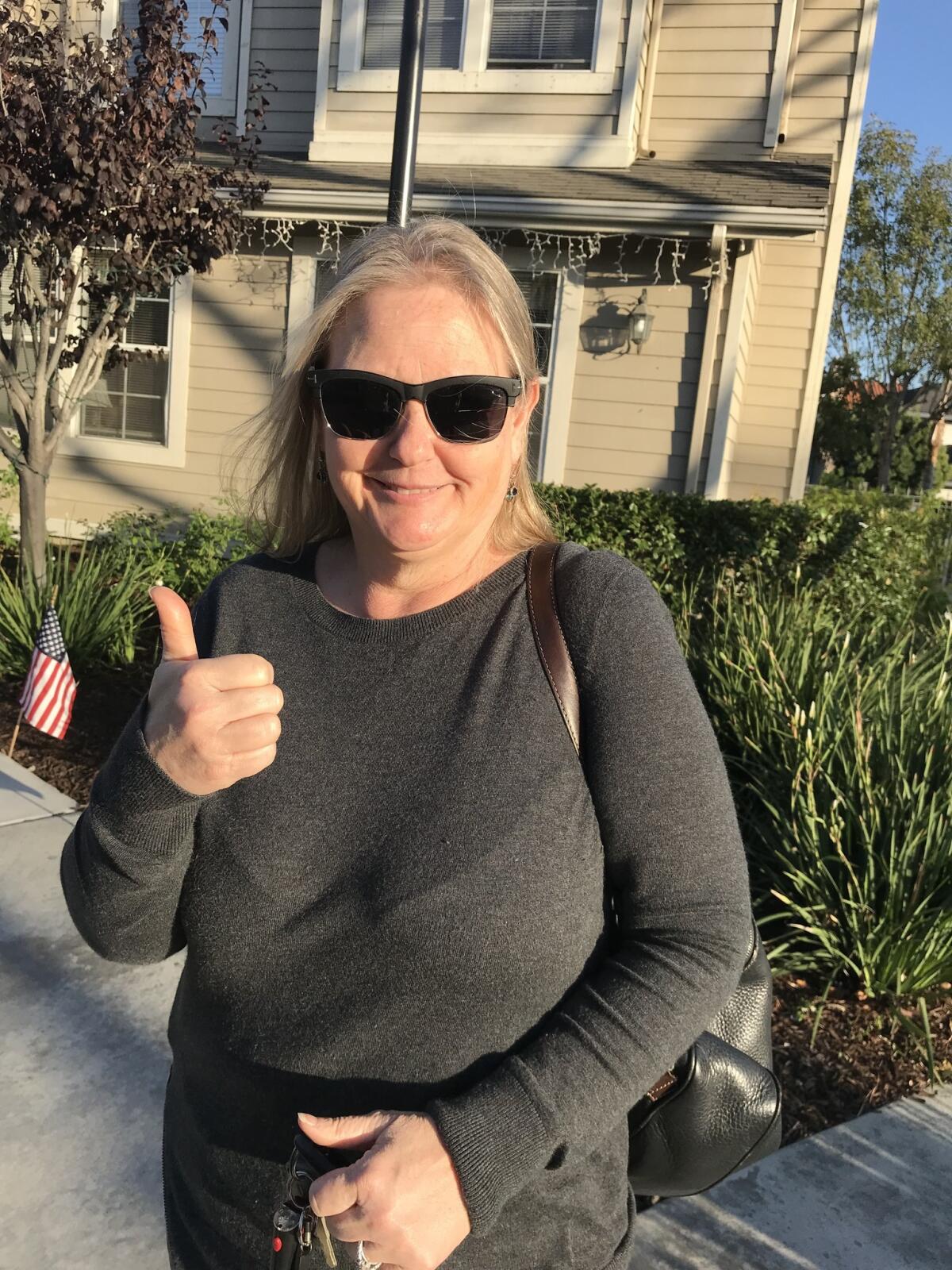
Deb Boyd, a just-retired payroll worker, said she was highly motivated by President Trump to vote for the Republican ticket in the 49th Congressional District.
“I love Trump and I did not want that whack job Nancy Pelosi to be the majority leader. I am hoping Trump can bring us back. We are getting there. We have more citizen minorities employed now.”
Boyd said she voted for Republican Diane Harkey to replace retiring Rep. Darrell Issa (R-Vista) in the 49th District. She voted to reelect Sen. Dianne Feinstein, who was running against another Democrat.
One Orange County immigrant’s vote to oppose discrimination: ‘I belong here’
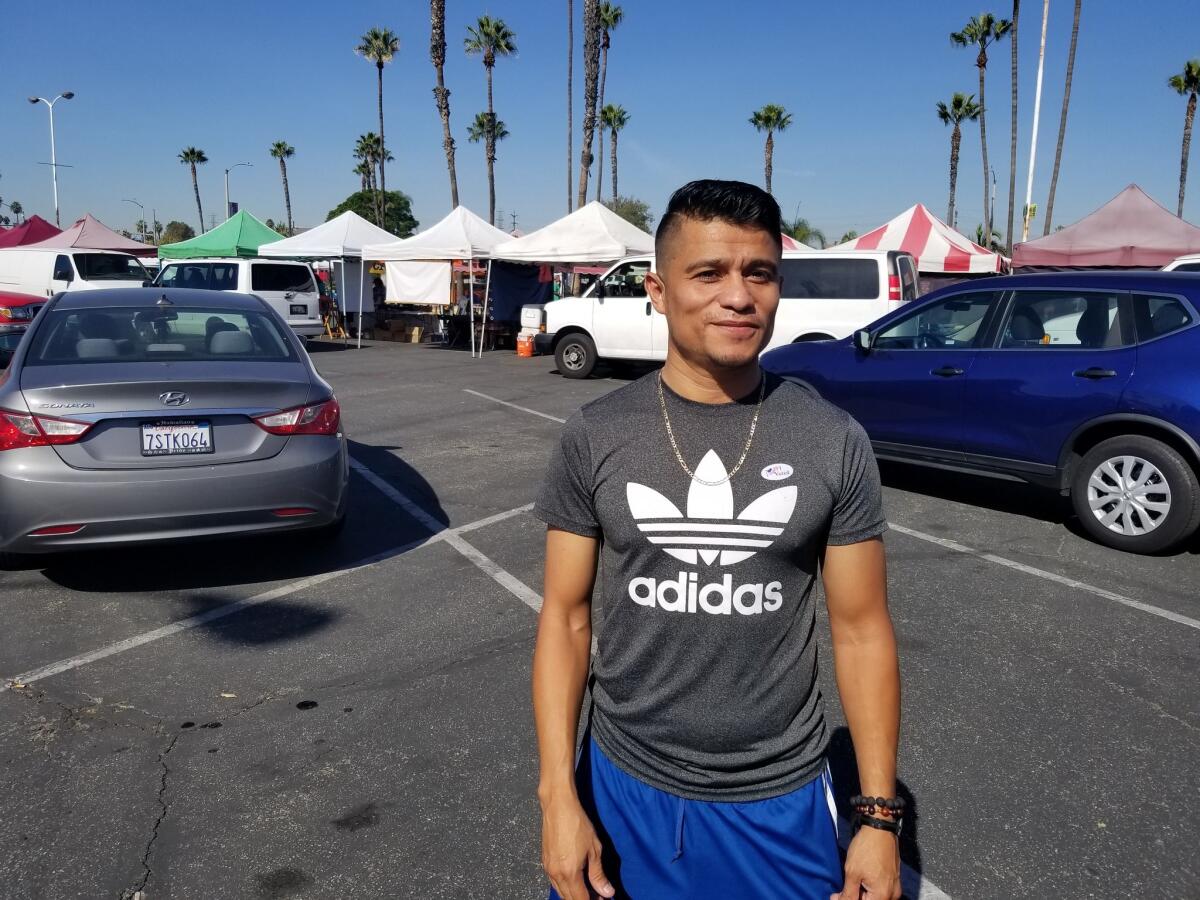
Douglas Guzman hasn’t liked what he’s seen for the last two years. He says he feels racial discrimination, polarization and police brutality are on the rise.
“Especially with the president getting into these Twitter wars so many times,” said Guzman, a 39-year-old rehab technician in Buena Park. “The president should be focusing on the country, not on what other people think.”
He was especially dismayed when Brett Kavanaugh was confirmed to the U.S. Supreme Court, despite allegations of sexual assault against him.
Those factors made him more motivated to vote this year, Guzman says. He voted for Democrat Gil Cisneros in the 39th Congressional District and for Democrat Gavin Newsom for governor.
He said he wants to help flip the House to return checks and balances against President Trump.
“I want more equality for women and for other ethnicities. I want this country to be back the way it was, where you could walk on the street and say hello to everyone and not be afraid,” Guzman said. “I’m a citizen of the United States. I believe I belong here.”
Pelosi confident Democrats will flip the House
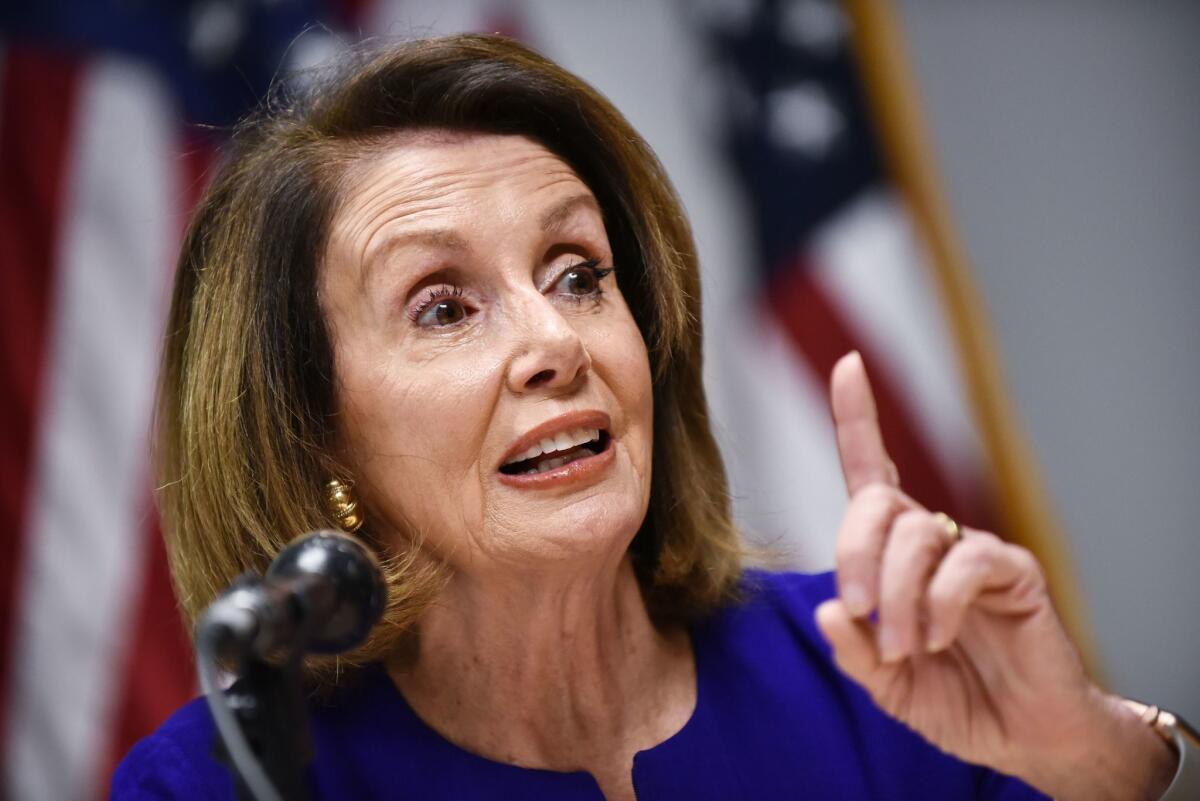
House Minority Leader Nancy Pelosi said Tuesday night that she’s confident Democrats will take control of the House of Representatives.
“We are going to win tonight in the House,” the San Francisco Democrat said on PBS’ “NewsHour,” “because of the quality of our candidates, because of the vitality at the grass-roots level, because of the power of our message — lower healthcare costs, bigger paychecks, more honest government.”
Democrats are confident they will pick up more than the 23 seats they need to take control of the House, although some are skeptical of any Democrat who is measuring the drapes before polls close.
Pelosi, who was speaker of the House for four years, also said she is confident that she would be able to overcome any intra-party battle to lead the chamber.
Former Democrat votes red in Lake Forest in hopes of keeping economy and Trump’s agenda rolling
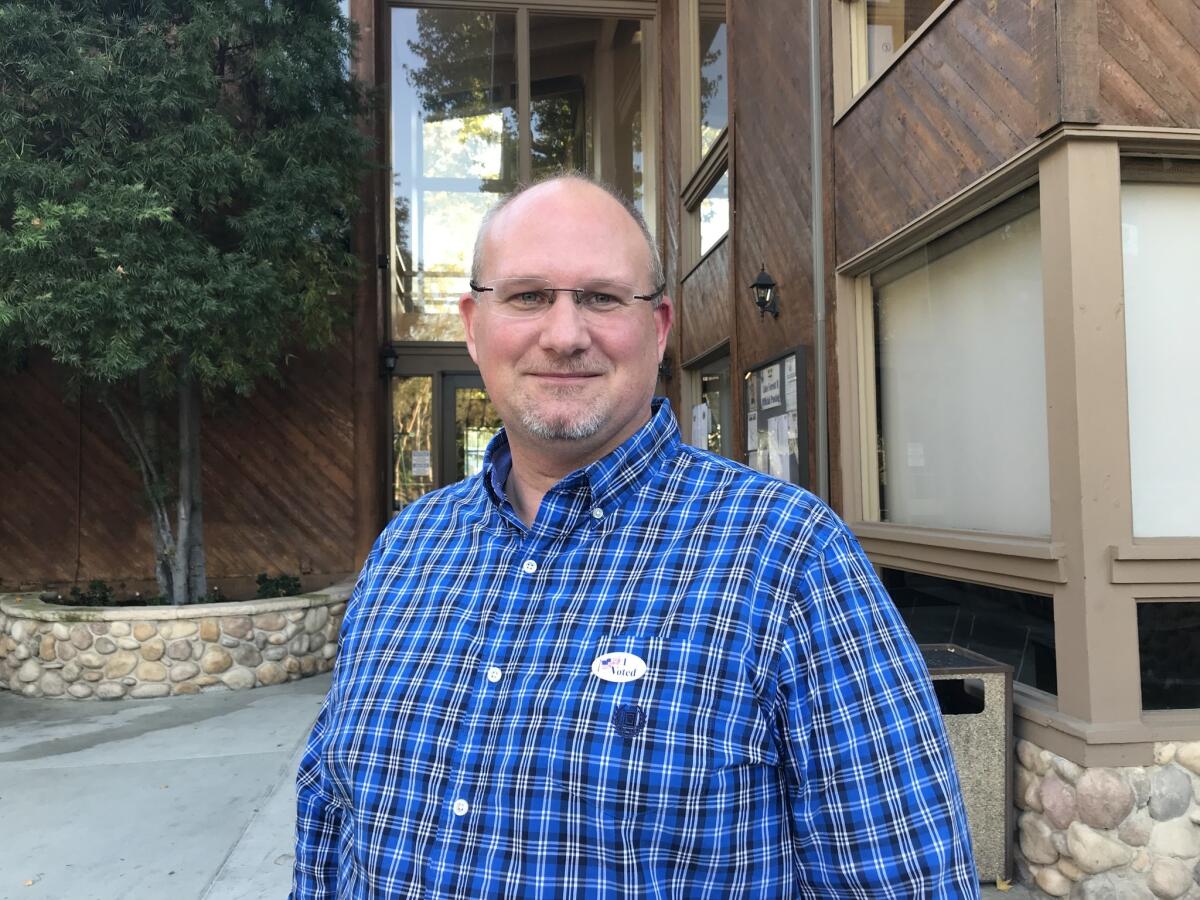
Once upon a time, Joe Way, a 45-year-old Lake Forest university administrator, was a registered Democrat.
That was before 9/11, and before he had a daughter. Taxes, safety and the economy were top of mind as he chose how to cast his ballot Tuesday at a Lake Forest clubhouse.
”I just like how things are going, and I don’t want stalemate,” Way said. “The economy is doing great and that’s a big factor.”
Way said he voted for Rep. Mimi Walters (R-Laguna Beach) to represent the 45th Congressional District a third time because he likes her business-friendly platform.
“Her business policies are pro-growth. I absolutely love her,” he said.
------------
FOR THE RECORD
4:23 p.m.: An earlier version of this post incorrectly said Joe Way voted for Mimi Walters to represent the 39th Congressional District. Walters is running for reelection in the 45th Congressional District.
------------
A proud Trump supporter didn’t base his midterms vote on his support for the president
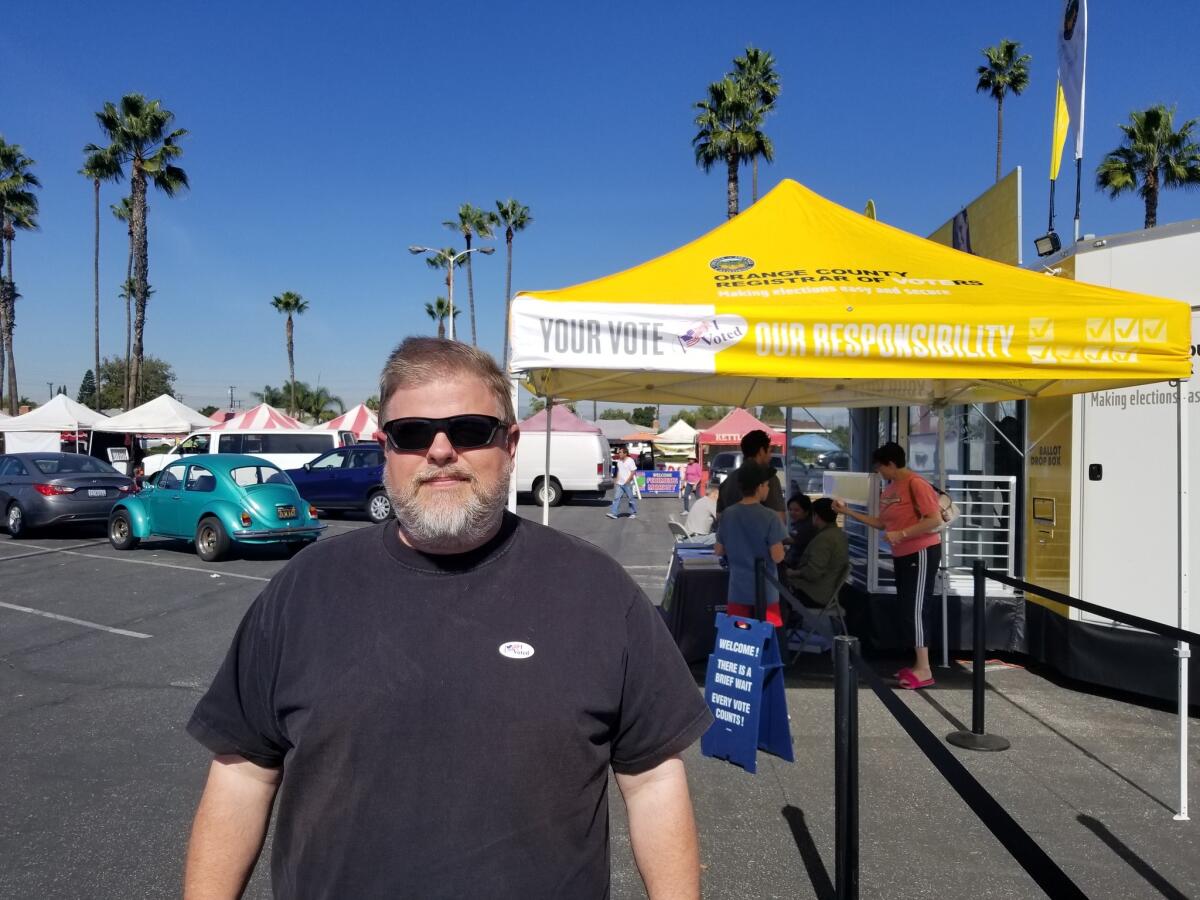
Dewayne Normand is a dedicated Republican voter and a proud supporter of Donald Trump.
But his vote for the 47th Congressional District didn’t come down just to that.
“I don’t just vote because of whether they’re blue or red. I vote based on what they do, what they talk about,” Normand said after casting his ballot outside an early vote center at a Buena Park farmers market on Saturday.
“I’ve seen what he’s done, and it’s not good for the people,” he said of Rep. Alan Lowenthal, a Democrat.
He doesn’t like Lowenthal’s advocacy for low-income housing in the area or his talk about settling refugees in the community.
“None of these people have been vetted properly. He says that they have,” but Normand doesn’t feel it’s thorough enough.
With Trump in the White House, Normand says the country is headed in the right direction. And while he doesn’t like it when Trump “shoots from the hip” and starts name-calling, he’s a fan of most of his policies.
“For the first time in my generation, I see a president following the Constitution and that upsets people.”
A first-time voter cast her ballot for progressive rights

Pitzer College student Judith Welch casts her first vote to maintain the progressive rights that she enjoys.
Pitzer College student Judith Welch, 18, is a first-time voter. She’s voting to maintain the progressive rights that she enjoys in this country.
Huntington Beach couple want to send Trump a message
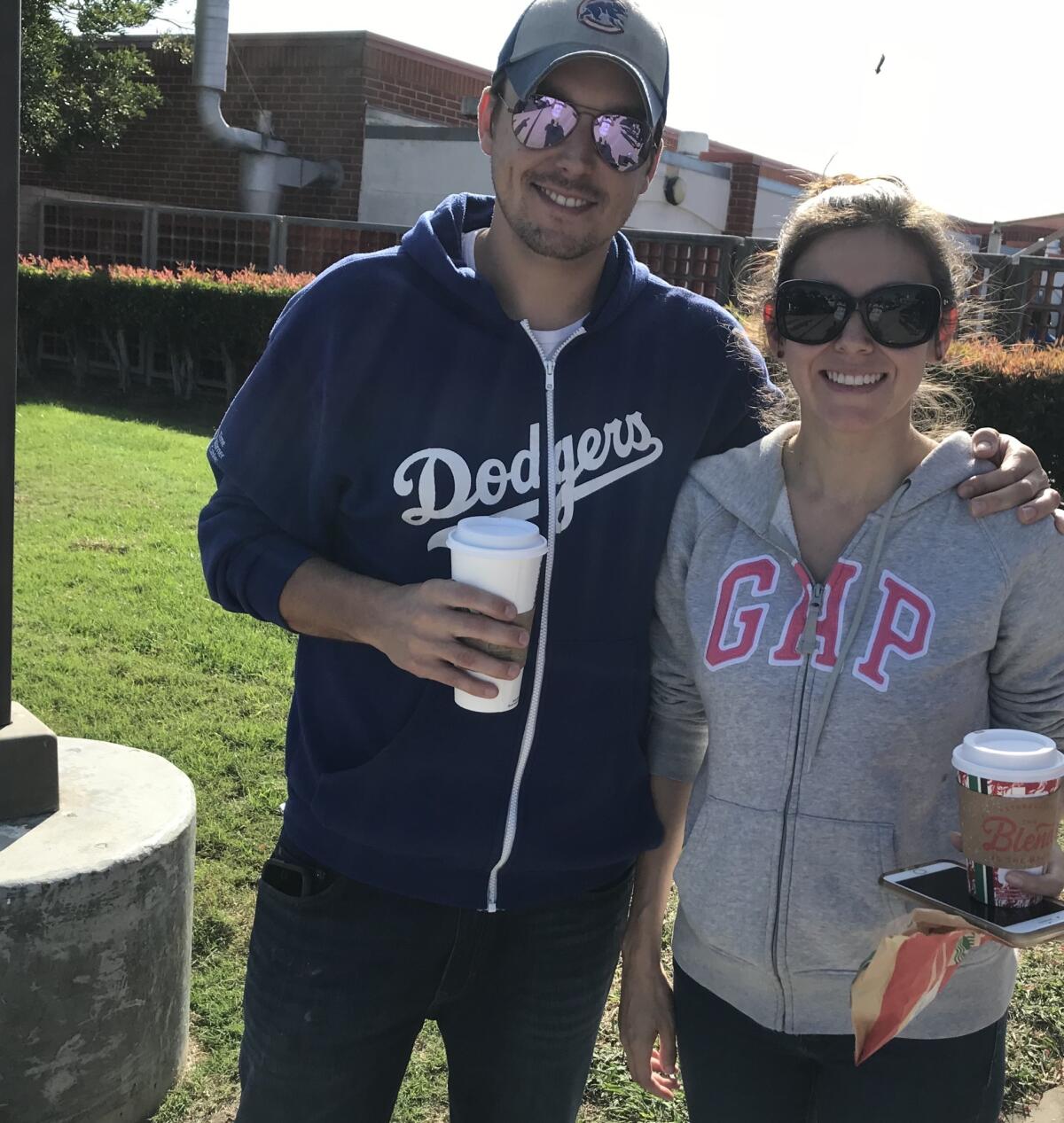
Mike and Leslie Schroeder recently moved from Los Angeles to the heart of conservative Orange County because they could afford a bigger house with a yard in Huntington Beach.
Another benefit they see for the move: Their vote could make difference in Congress. Rep. Dana Rohrabacher (R-Costa Mesa), an outspoken supporter of President Trump, is fighting the toughest reelection bid of his 30-year congressional career, and polls have him neck-and-neck with his Democratic challenger, Harley Rouda.
The Schroeders came to the polling station at Marine View Middle School to get rid of Rohrabacher and strip Trump of the power he has now with Congress.
“My wife is of Mexican descent,” said Mike, “and we have a lot of first- and second-generation Mexicans in our family.”
He said they are deeply troubled by the president’s anti-immigrant rhetoric. If he could speak to Trump, his first line would be, “You got to read the Constitution, buddy.”
A straight Democratic ticket for this 39th District voter: ‘There is no more middle’
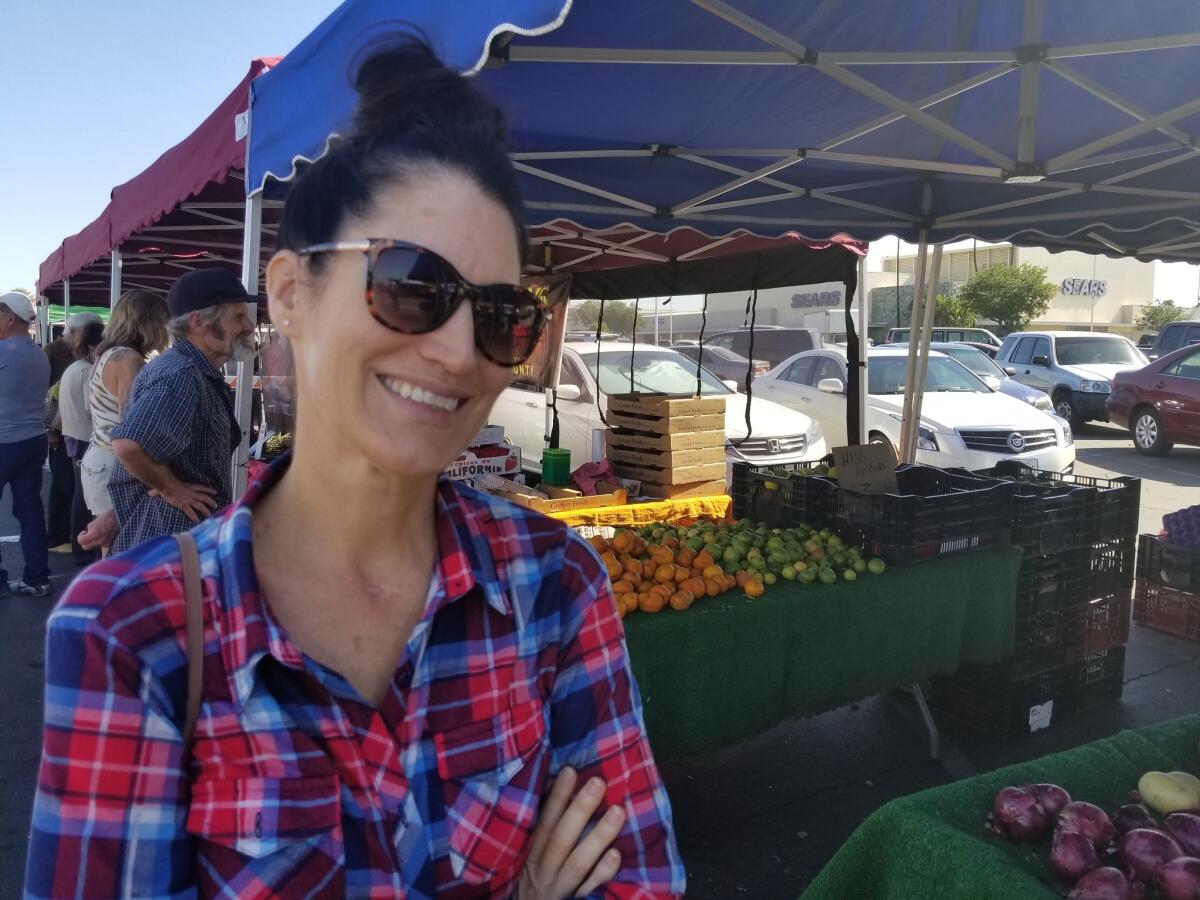
Kyra Kirkwood long considered herself a “conservative” Democrat — she didn’t tend to vote along party lines and thought of herself as more conservative when it came to ballot measures. She’s voted for Rep. Ed Royce (R-Fullerton) before, and she remembers voting for George H.W. Bush during her first presidential election.
This year’s different.
“For the first time, I’m actually voting strongly on party lines just because I don’t like what’s happening,” she said, as she browsed the Buena Park farmers market Saturday. “There’s a lot of us-versus-them mentality going on, and I think it’s really dividing the country.”
She will vote for Gil Cisneros in the 39th Congressional District; she said she liked his emphasis on protecting healthcare and immigration.
“It’s not about ‘This is my land,’ it’s more about inclusion,” said Kirkwood.
But she laments the fact that she feels compelled to cast such a one-sided ballot this year.
“In the past, the Republican ticket, the Republican mentality, was different,” she said. “Those of us who were kind of in the middle, there is no more middle. We’re being forced to either side.”
Hundreds line up outside Los Angeles County registrar’s office in Norwalk
A line of hundreds of people snaked around the Los Angeles County Registrar-Recorder/County Clerk’s office in Norwalk Tuesday as people sought an opportunity to vote.
Many of them had registered at the last moment or had recently moved to Los Angeles County and were directed to the office by voting officials.
Staff handed out water bottles, forms and pens, and told would-be voters that their estimated wait time was two hours. Staff estimated that on Monday there were thousands of people who showed up to iron out similar registration issues.
Chris Lesso, 28, a resident of Echo Park, was one of those standing in line. Looking at the line, he realized he would be late to his 2:15 p.m. shift at Whole Foods.
“I’m probably going to be late, but it’s all right,” he said.
He’s registered in Orange County but moved here in 2015. He came today to re-register to vote in L.A. County.
“I just feel like now is a time more important than ever to express my voice,” Lesso said. “You can tell from the turnout here how everyone feels.”
John Nichols, who lives in Mid-City, registered to vote online on the last day possible. He was told he had to go to the Norwalk office to vote.
“I didn’t know it was going to be this long at all,” Nichols said. He said he works at Yahoo and was supposed to start work at 2 p.m. He wasn’t sure he’d make it in time, but said that was fine.
“With the climate, what’s going on currently in the United States, I couldn’t reconcile with not voting,” Nichols said. “I could never forgive myself if I didn’t.”
Lunch is served: Gubernatorial candidate John Cox delivers pizzas to Mimi Walters’ Newport Beach campaign office
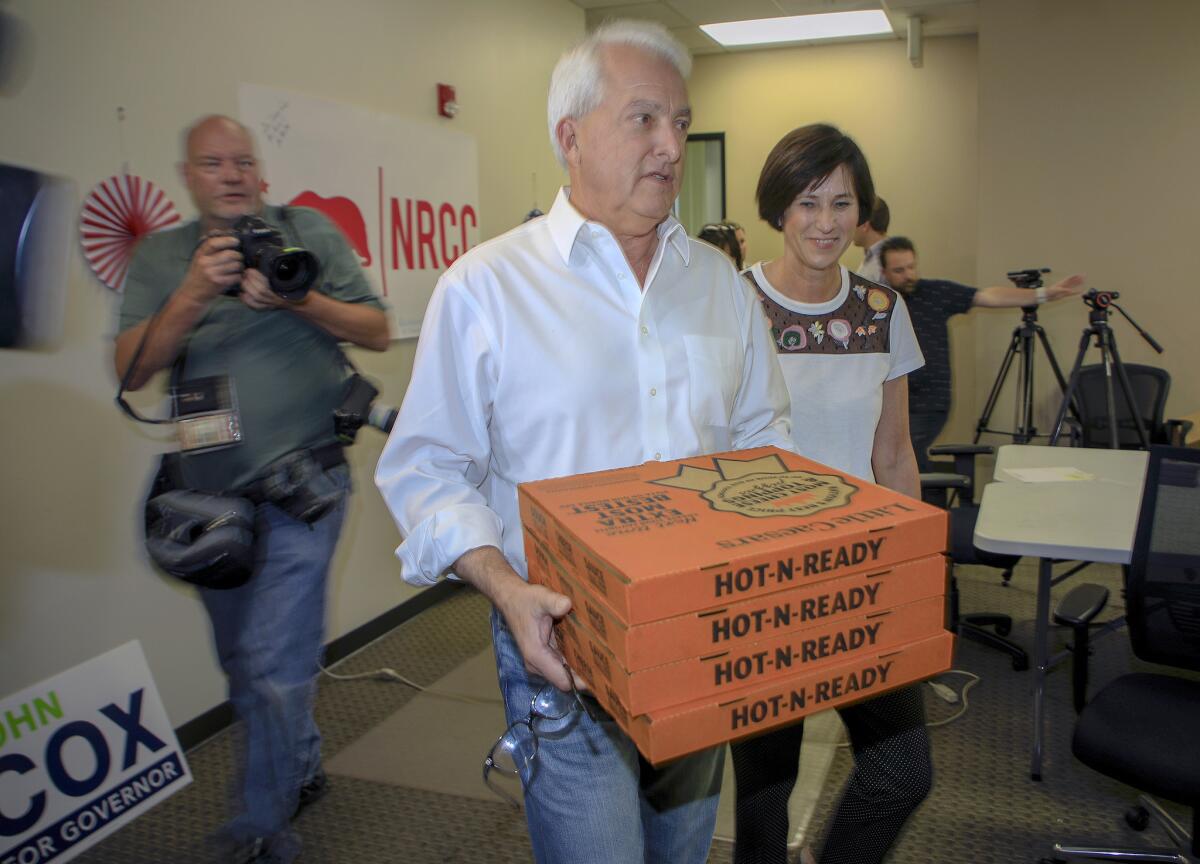
Republican candidate for California governor John Cox delivered pizza to Rep. Mimi Walters at her campaign headquarters in Newport Beach on election day. Walters, the incumbent Republican candidate for the 45th Congressional District, is facing off against Democrat Katie Porter. More election day photos: America goes to the polls
Family that votes together, thrives together
Alex Kim and his younger brother pored over the names and issues linked to Tuesday’s election. Then they marked their ballot guides and went to vote as a family.
“This is our tradition. We love following it and we believe it makes us more aware of such a great privilege,” said Kim, 46, a Newport Beach resident for nearly 30 years.
Kim, who is a registered Republican in a Korean American family of mostly Republicans, doesn’t think President Trump was a factor in how he voted. Take the Senate race between Dianne Feinstein and Kevin de León.
“You would think that because they’re both Democrats, it wouldn’t make much of a difference who wins, but it does. One is a conservative Democrat vs. a progressive Democrat. I judge by issues, not party lines,” said Kim, chief executive officer of Three Kings Public Affairs.
Brother Brian Kim, 36, a registered independent, said he “does not go by ads” and prefers “quiet research. Our family has faith in the democratic process and sure, we’re grateful we can do this.”
Therefore, they don’t always focus on what mainstream political pundits say, hoping that Congress will prioritize key issues like immigration and healthcare in working with the president, rather than the demands of the party.
“Pay attention to local issues, listen to what your friends say their needs are, go to community meetings, ask questions of legislative staff,” Alex Kim says. “And seek out social media influencers.”
“These are factors that are more important than distractions from recalls or getting people out of office. Educate yourselves to make informed decisions and support whoever’s best qualified, no matter their party,” said Alex Kim, who worked as a deputy director and community liaison in the Los Angeles office of former California Gov. Arnold Schwarzenegger.
Their parents — father Chong Ung Kim, a Republican, and mother Jung Sook Kim, a Democrat — both asked their sons about their political leanings in addition to studying measures on their own. “As immigrants, our motivation for voting is to exercise freedoms,” said Alex Kim, who calls Abraham Lincoln a hero.
“If President Trump were standing next to me. I would ask him to please control your Twitter tendencies and to remember what the Statue of Liberty advises us about welcoming others. These are original values for what makes our country great.”
A Young Kim supporter values her ‘very conservative’ viewpoints
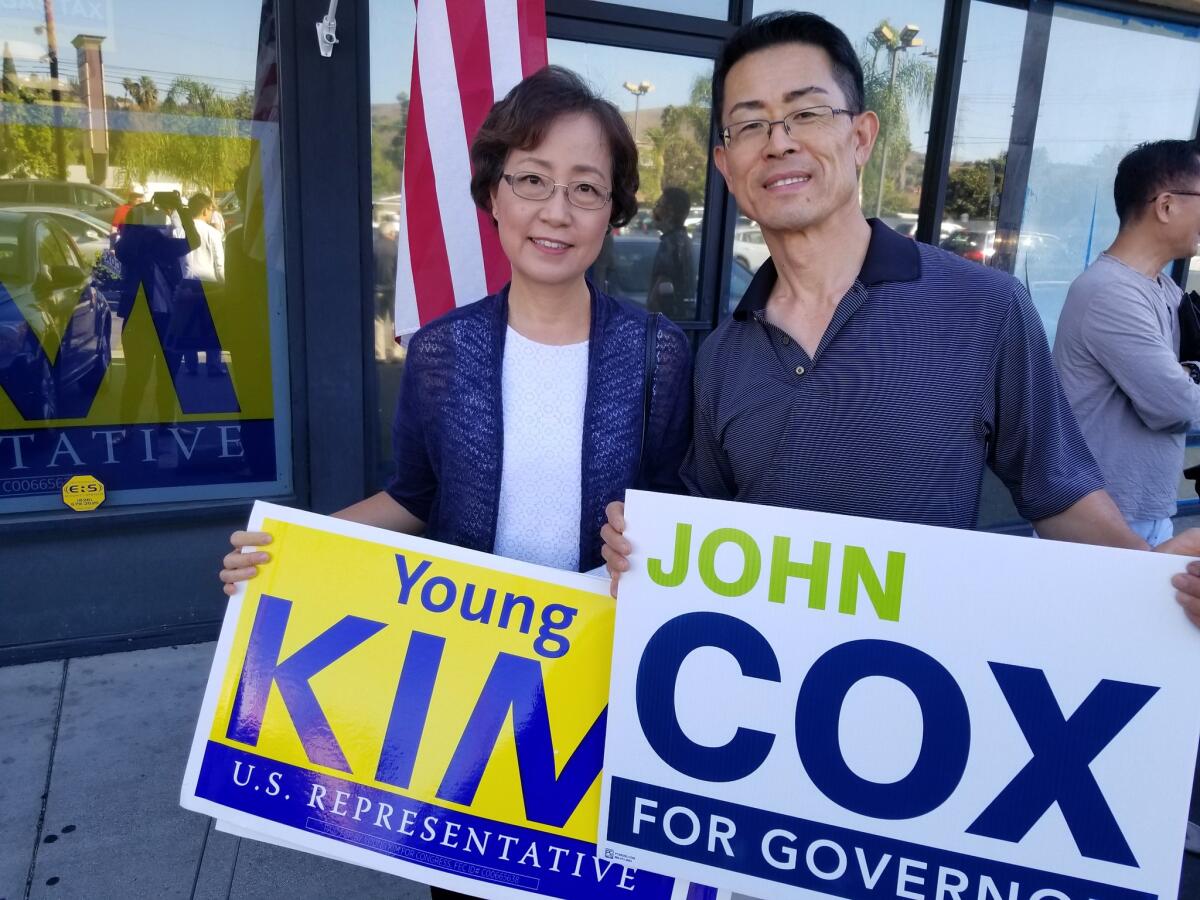
Paul Choi and his wife, Julianne, were holding campaign signs for John Cox and Young Kim as supporters filed out of a GOP field office in Rowland Heights on Saturday.
Choi, a real estate agent from the area, said Cox’s agenda makes much more sense to him than his Democratic rival for governor, Gavin Newsom.
“What’s most important for California at this time is the economy,” Choi said. He is also supporting Kim in her bid for the House seat of retiring Rep. Ed Royce (R-Fullerton), and not just because she’s a fellow Korean immigrant, he added.
“Her strong agenda really speaks to me. … Her agenda is very conservative, very family-oriented and Christian-minded values that Americans have cherished for a long time.”
Choi, 57, hopes Kim will help support President Trump’s agenda if she’s elected to represent the 39th Congressional District. “I’m very proud that he’s one of the most reputable, respectable presidents we’ve elected in our nation over the past several decades,” he said. He likes Trump’s policies on immigration, tax reform and “religious freedom,” he said.
“He’s more strict and more concerned about the people living in the United States as legal immigrants rather than just having an open place for everybody. I think that’s too vague and a very dangerous idea.”
That machine at your polling place isn’t counting your vote — it’s checking your ballot for errors
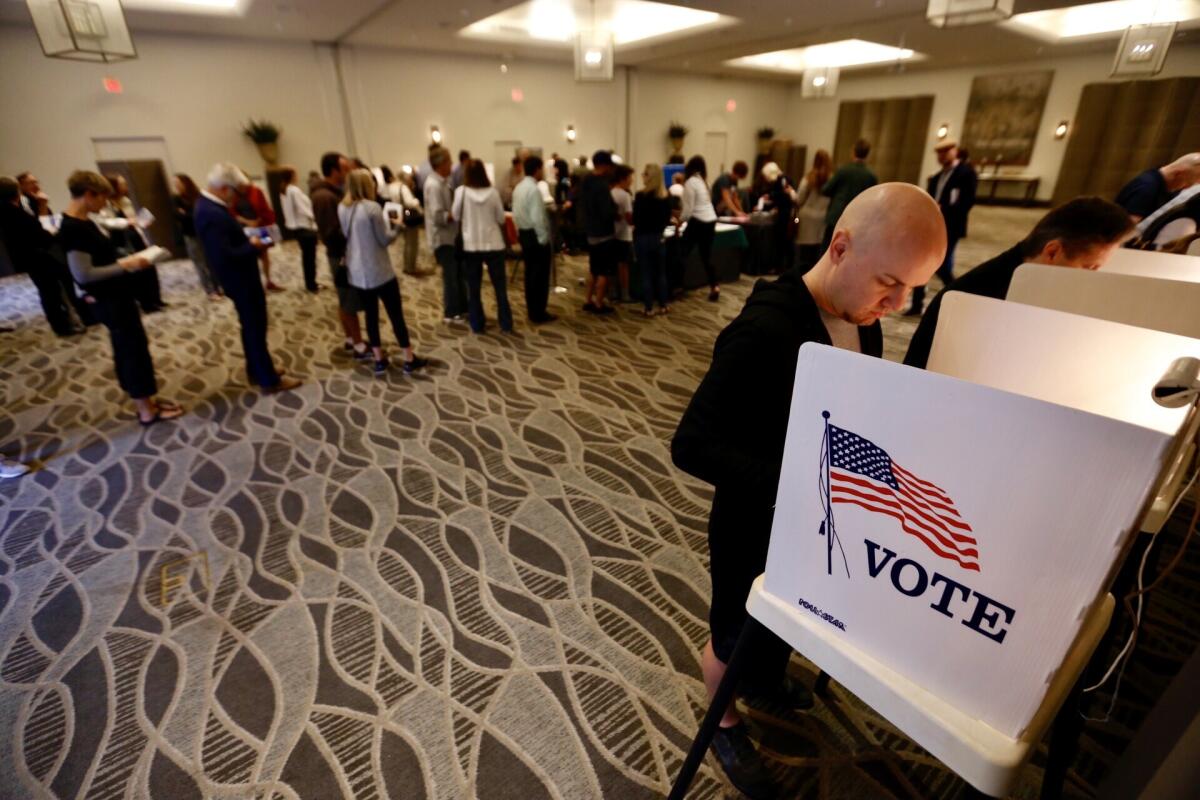
As California voters headed to the polls Tuesday, some voiced concerns via Twitter about whether their ballots would be counted because of malfunctioning machines at their polling places.
But the devices often referred to as “voting machines” aren’t actually there to count your vote.
Rather, those machines, known as precinct ballot readers, are designed to tell a poll worker if a ballot is blank or has too many of its selection bubbles filled in. When it finds one of these issues, you as the voter will have the opportunity to correct your ballot if you want.
Every polling place in Los Angeles County has a precinct ballot reader.
If the precinct ballot reader isn’t working, your vote is still secure and will be counted, officials say.
“In L.A. County, precinct ballot readers assist voters, but do not count ballots,” said Brenda Duran, a spokeswoman for the county registrar’s office.
“After the polls close, ballots are securely transported to our headquarters to be counted. Even if a precinct ballot reader is down, this does not affect the way any vote is counted. Every vote is secure and transported back to us for thorough processing,” Duran said.
The Los Angeles Times is working today with ProPublica’s Electionland project, which monitors voting problems around the country. If you had trouble voting, or if you saw something you want to tell us about, here’s how.
Fountain Valley woman wants Congress to check Trump, but not impeach him
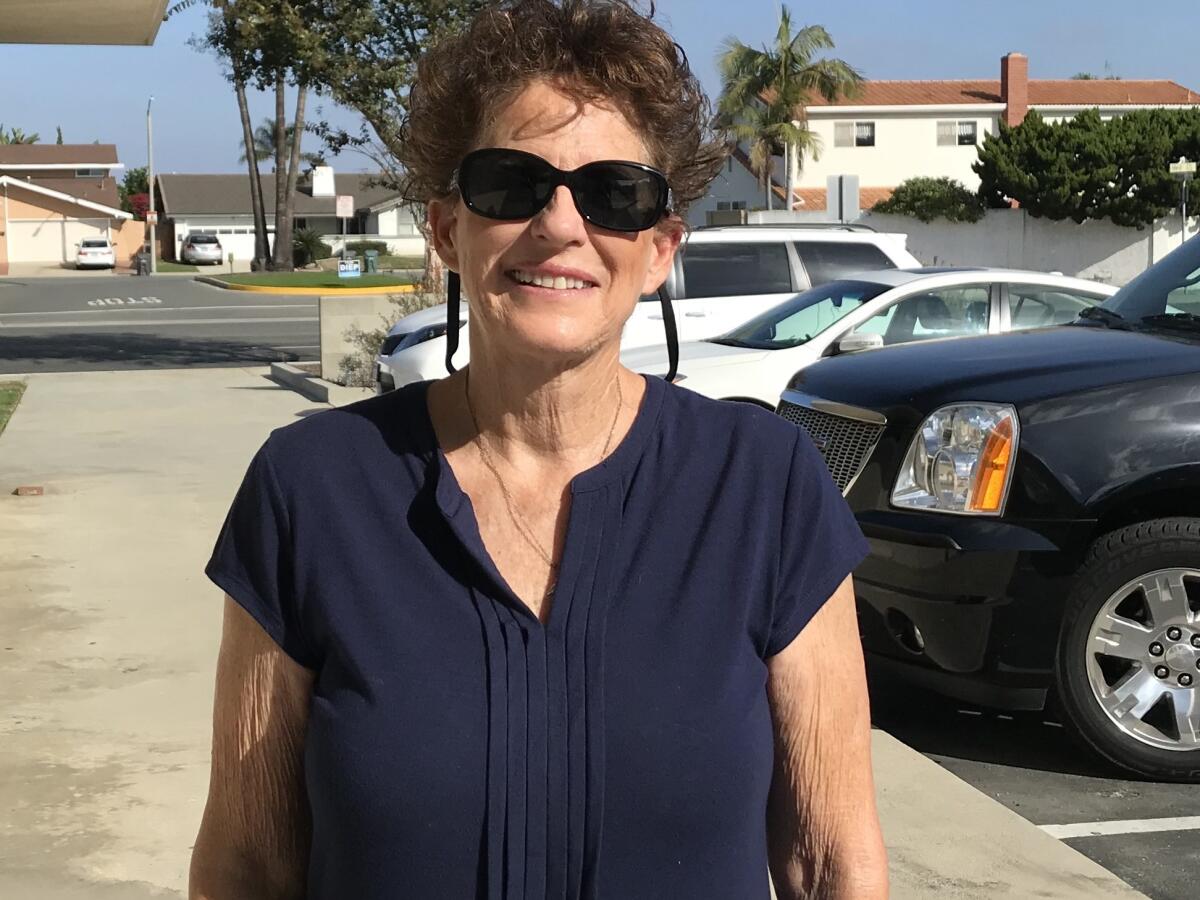
Anna Katsuki wants to oust her longtime congressman, Republican Dana Rohrabacher, from his seat to “restore some balance” in the House of Representatives.
“I’m tired of the anger and hatred,” said Katsuki, 67, a retired professor of counseling at Orange Coast College. “It’s coming from the top.”
Katsuki, a Democrat who votes for Republicans occasionally, said Congress feels like a one-party system these days.
She has a deep aversion to President Trump.
“I can’t stand the guy. I think he is such a misogynist and a liar.”
But if the Democrats win the House, she said, she would like to call House Minority Leader Nancy Pelosi to tell her to not to “waste time and money on impeachment.” She said it would just further divide the nation.
Buses, carpools stay idle in Dodge City as vote-suppression fears fail to materialize
In recent weeks, Dodge City, Kan., became a cause celebre among left-leaning activists after county officials controversially moved the city’s longtime polling station to a new location outside the city limits — more than a mile past the last bus stop.
Nationally, fears quickly spread that election officials were trying to suppress the city’s predominantly Latino population, many of whom work at meatpacking plants. Celebrities including Melissa Etheridge and Debra Messing sprang into action to help organize Lyft rides and buses for any voters who needed transportation. Organizers from across Kansas — and as far away as San Diego — rushed in to help volunteer on the front lines.
But on election day Tuesday, those transportation fears fizzled dramatically as volunteer buses and carpools stayed idle in Dodge City, and activists and residents agreed that the controversy had become overblown.
“The national story doesn’t really appear to be the real story on the ground,” said Edgar Pando, a Dodge City attorney who provides legal aid to low- and middle-income Kansans. “People sort of extrapolated a meaning that wasn’t there, outside looking in, and that seems to be the general consensus.”
As of early afternoon, only about 10 or 15 voters mistakenly showed up to the old Civic Center polling station in Dodge City, where get-out-the-vote organizers loitered in an empty parking lot, bashfully waiting for someone to help.
Nancy Yost — who lives on the opposite side of the state, in Lawrence — with two of her friends, had rented a full-size tour bus to help voters get to the polls, drawn by the stories about the Dodge City polling place drama.
But on Tuesday afternoon, she sat in the empty bus, which had been sitting idle in the Civic Center parking lot all day. But she didn’t regret the decision.
“Our intention was to come and help people, if they needed help, to overcome an obstacle, and it’s still an obstacle, and — so be it,” Yost said. “It’s OK.” She declined to say how much the bus cost. “We felt that it was a good thing to do, and so we chose to do it.”
Similar feelings had overcome Stephen Ruttinger, 70, and Eunice Ruttinger, 71, husband and wife, who also came from Lawrence to volunteer with the local Democratic Party to help get voters to the polls.
Stephen Ruttinger — who wore a “Vietnam Veteran” hat that said “Don’t let the gray hair fool you, we can still kick ass” — grew tearful as he started talking about his military service as the reason he volunteered to help get out the vote.
“I’m a Vietnam vet, and allegedly, I put it on the line for this,” Ruttinger said, his voice halting as he spoke while standing in the gravel parking lot outside the polling location. “It moves me a little bit, I guess.”
One of the voters to accept a ride to the polls was Diego Marquina-Mendez, 18, who rode over from Dodge City Community College to vote for the first time.
His parents immigrated from Mexico and can’t vote, and “they kind of bugged me about it, about how I have the responsibility to vote, and I should do that,” said Marquina-Mendez, who said he and his family have been turned off by President Trump’s stances on immigrants.
But Marquina-Mendez had trouble getting his friends and classmates interested in voting. “I feel like maybe more people should try to get informed about voting, because I have some friends who didn’t really register to vote,” he said.
Past voter turnout from Dodge City’s Latino residents has been abysmally low, and for several hours in the late morning and early afternoon Tuesday, the voters who showed up at Dodge City’s polling station were overwhelmingly white.
The problem wasn’t a lack of buses. The problem is that the area’s Latino population has been “disenfranchised,” said Johnny Dunlap, the Ford County Democratic Party chairman.
“By the numbers we have, the registered Hispanic voters in Dodge City only show up at the polls in the midterms at a rate of about 17%,” said Dunlap. “So there’s something wrong, right? When the white population shows up with 61%, and Hispanic only has 17%, there’s something not right about that.… There are currently no Hispanic elected officials in Ford County, and we’re 60% Hispanic, here.”
Pando, the attorney, said the issue might be that newly naturalized citizens or the children of immigrants haven’t historically been encouraged to get involved. “You’re not raised in a household that teaches you to participate civically and to vote and to inform yourself,” Pando said, also citing past problems with a lack of bilingual signage in the city. “The voters here, especially Hispanic voters, don’t feel invited to partake.”
The polling station Tuesday featured signs in English and Spanish, but it was less welcoming to journalists trying to monitor the situation: An attorney hired by the county forbade journalists on site from taking photos inside.
It is typical for journalists to be allowed to take photographs inside polling stations. The Times took a photo before the attorney, Brad Schlozman, informed a reporter of the rule.
But the decision to forbid photographs might not be as notable as the attorney passing along the order: Schlozman, a former Department of Justice attorney under the George W. Bush administration, received notoriety a decade ago for being the subject of an inspector general report accusing him of politicizing the department’s nonpartisan hiring process.
“My tentative plans are to gerrymander all of those crazy libs right out of the section,” Schlozman wrote in one email released in the investigation.
Ford County Clerk Debbie Cox, who manages polling stations in the county, later told reporters that she thought allowing media inside to document the Dodge City polling station would be “too disruptive” and that she would be releasing government-approved photos of the polling station later.
Cox also received notoriety for an email recently when she forwarded a letter from the ACLU to the Kansas secretary of state’s office, run by Republican Kris Kobach, with the notation: “LOL.”
‘We need a voice’: Latino voters hope for surge in turnout
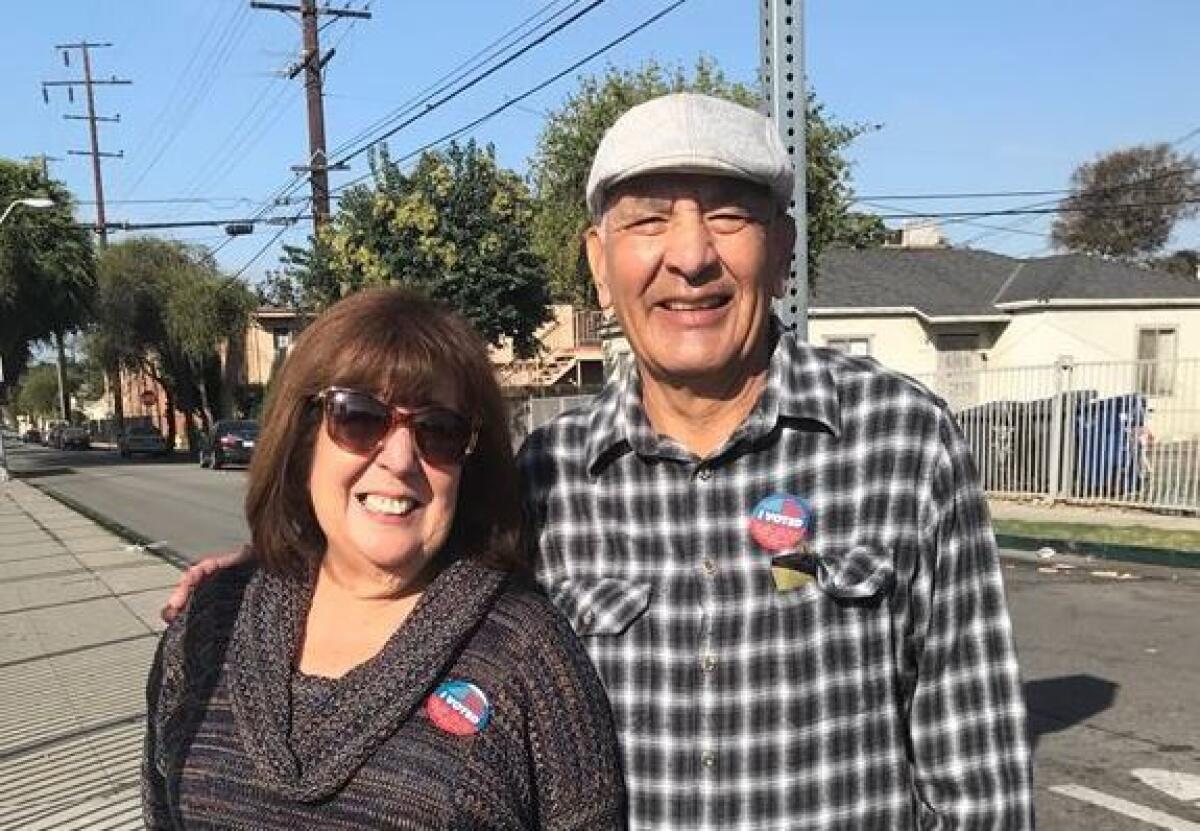
It took only two minutes — maybe less — for 28-year-old Christian Martinez to drop off his vote-by-mail ballot at American Legion Post 335 in South Gate.
“I dropped it off because I wanted to make sure they got it,” he said.
Wearing a green jacket and black pants, Martinez said he voted mostly for Democratic Party candidates, because they fell in line with his beliefs. He said President Trump and his Republican Party also played a factor in how he voted today.
“I didn’t like the candidates,” he said. “I’m not gonna lie, everything that has been going on has played a part, not just ‘I don’t like Donald Trump,’ but more like all the people around him, all the people supporting him and everyone else saying we should do what he says, that’s the right thing to do. I disagree, so I chose not to vote on the Republican side. “
Martinez and others like him will play a pivotal role in today’s election, particularly in key battleground states where the Latino vote could mean the difference between winning and losing.
Still, Martinez makes up a relatively small percentage of eligible Latino voters who cast ballots. Those numbers are lower during non-presidential elections.
There are 29 million Latinos who are eligible to vote in this year’s midterm election, making up about 13% of all eligible voters in the United States. About 44% of Latinos who are eligible to vote are between the ages of 18 and 35.
But that’s also the same age group that has contributed to low turnout rates among Latino voters.
Martinez said he began voting when he was 18. He said his parents vote, but his civic life began to take shape as he read and watched the news more often.
“I felt it was important,” he said. “Since an early age, I’ve been aware that if you’re not active in politics, you’re going to be affecting stuff and just by not voting, by not taking action, you’re allowing other people to take action and do things their way.”
Farther down the street, Ricardo and Terry Avalos had just voted. The husband and wife said they hoped the election would send a blue Democratic wave washing across America.
“Hopefully things will change for the better,” said Terry Avalos, 69.
They said they voted to oppose President Trump, to save healthcare and to also help Democrats take control of the Congress.
“We need a voice,” Terry Avalos said. “We’ve had plenty of Republican presidents before and we had no issues, but this is bad.”
Ricardo Avalos, 71, said he doesn’t like Trump and his rhetoric, but admits he has made some smart financial moves for the country by making sure other nations pay their fair share.
The couple said they voted for Gavin Newsom as governor, but when it came to Proposition 10, the rent-control measure, they couldn’t agree on whether they voted the same.
“We voted yes,” Ricardo Avalos said.
“No,” Terry Avalos said at the same time.
“Yes,” her husband responded. “We voted yes.”
One thing they could agree on was that they had noticed younger people voting. More women too.
“Usually it’s old people,” Ricardo Avalos said.
He said it was a positive thing to see. He hopes that younger Latino men and women turn out to vote and they continue to do so in future elections.
The couple said they were cautiously optimistic about how the election would turn out.
“Last we saw with Hillary [Clinton] and Trump, we went to bed and she was winning. The next morning we woke up and learned she lost the election. It was like a funeral.”
Perhaps no one sees a more grim view of election day than Maria Arriaga, 55.
She said that even though she was a registered voter, work was going to prevent her from going to the polls.
Inside the South Gate market she works at, the Huntington Park resident said she feels left out and guilty.
“I know my vote matters,” she said. “I know it counts and it can help someone.”
Arriaga said she didn’t know how to fill out a vote-by-mail ballot and didn’t know how to figure out who to ask.
She said she did receive text messages about Propositions 8 and 10, and even got one from Ed Hernandez, who is running for lieutenant governor. She also received one in Spanish about the importance of voting.
“I feel terrible,” she said, adding she wanted to vote against Republicans because of Trump.
“It’s the way he’s spoken about women, how he said that woman had a ‘horse face,’ and Republicans have supported him throughout all the things he has done and said.”
Arriaga was referring to Stormy Daniels, the adult film star who is in a legal dispute with Trump.
Arriaga said this is the first election she has missed. She began voting in 1995 after she became a citizen. She said she has missed some midterm elections, but has shown up to cast a ballot in every presidential race.
Not far from Arriaga’s workplace, Florentino Mata, 81, was walking home from his polling station. He said he voted for mostly Democratic candidates.
“I have hope that they can help us, even if I don’t believe they can keep their promises,” he said. “But it’s some hope.”
He said he wants Democrats to take back the House and Senate to prevent any more attacks on immigrants.
Despite the streak of votes he gave to Democrats, he decided to lean toward Republican candidate for governor, John Cox, because he felt he was the better candidate. Mata said he took some advice from his daughter, too.
“All you can do is wait for the results now.”
Was Trump the deciding factor in your election day vote? Tell us what motivated you to cast your ballot
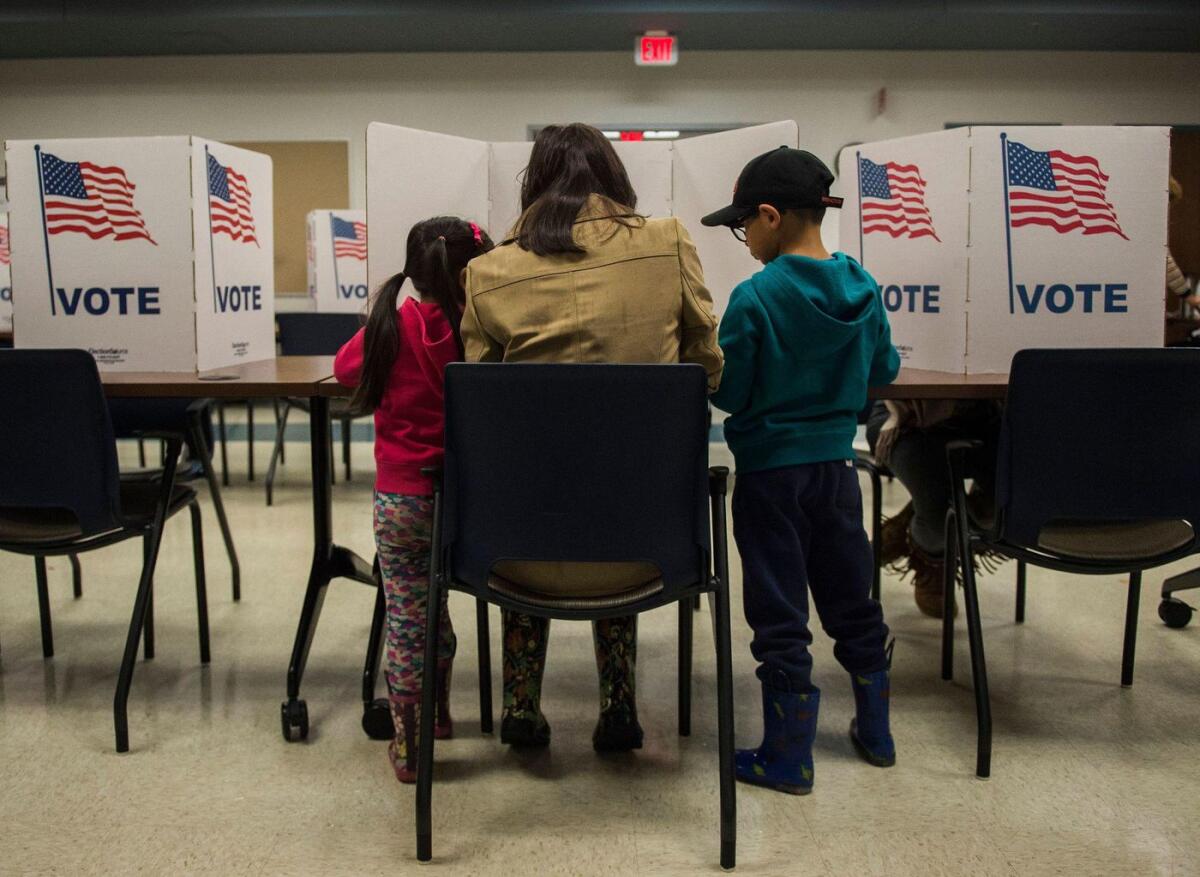
Roughly three out of four likely voters in a Dornsife-L.A. Times poll said they saw their vote this fall as an opportunity to express a view of President Trump. Tell us what motivated you.
Caballero campaign reports break-in at downtown Merced office
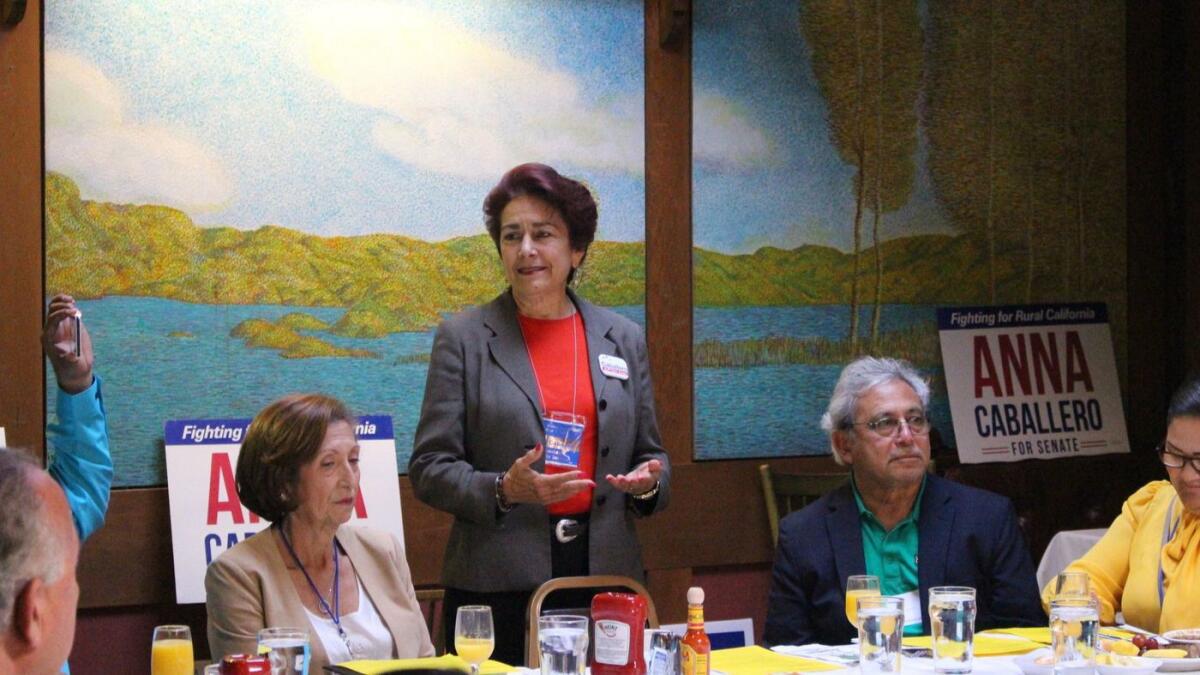
Staffers with the campaign of Anna Caballero, a Democratic Assemblywoman running for state Senate in Central California, on Tuesday reported that their office in downtown Merced was burglarized overnight.
Bob Sanders, a spokesman with the campaign, said a burglar broke a window to enter the building at 16th and N streets. He said the person or group of people stole computers, cellphones and thousands of door hangers with candidate and polling information.
“It is one those things that makes you believe that it was someone who came in under the auspices of being a volunteer,” Sanders said. “They sized the place up, knew where things were … knew exactly what they were doing.”
The spokesman said the computers had voter information and walking maps. Volunteers had planned to pass out the campaign material Tuesday in the heated contest between Caballero and Republican Rob Poythress.
Merced police said the total reported value of property taken is $24,000 and that they have no suspects yet.
State Democrats’ super-majority status in the Legislature hinges on one state Senate seat this year, and Caballero’s race has become the year’s most expensive state legislative contest. She is running against Poythress, a Madera County supervisor, to replace state Sen. Anthony Cannella (R-Ceres) in the 12th District, stretching from Fresno to Monterey counties.
Democratic campaign volunteers also have been making final pushes for Rep. Jim Costa (D-Fresno), who is facing off against Republican Elizabeth Heng in the 16th Congressional District, and for Democrat Josh Harder, who is locked in a virtual tie against Rep. Jeff Denham (R-Turlock) in the neighboring 10th Congressional District, spanning Stanislaus County and southern San Joaquin County.
Campaign manager Ken Smith denounced the actions as the same kind of distortions and lies he said voters were seeing at a national level.
“She knows voters can and will see this felony for what it is: a last desperate attempt to subvert not just the voters will, but our democracy itself,” he said of Caballero.
2 p.m.: This post has been updated with additional comments from Caballero’s campaign manager and the Merced Police Department.
This post was originally published at 1 p.m.
Election day storms down power lines across the Deep South
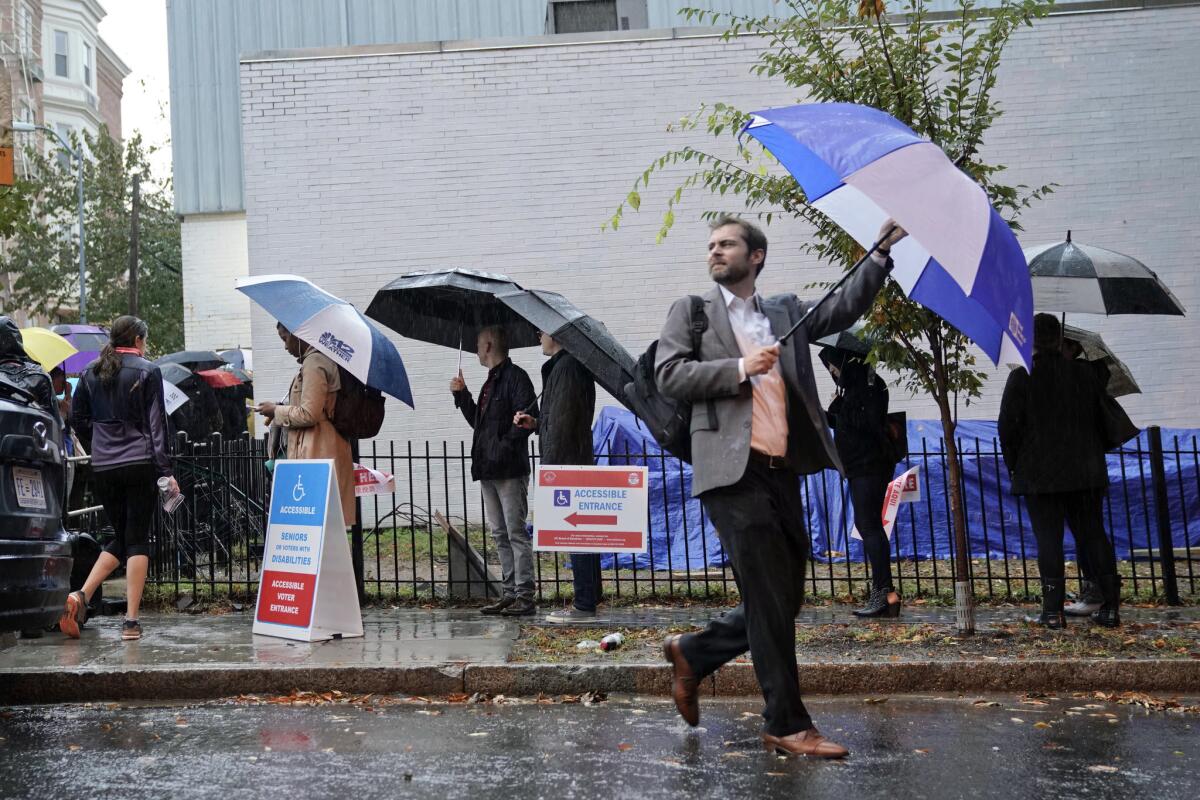
As polls opened across the country, residents of several states were contending with severe weather conditions that could affect voter turnout.
A line of storms moved through the Deep South overnight and early Tuesday, knocking down trees and power lines from Louisiana to South Carolina. There were no serious injuries, but an estimated 11,000 residents were left without electricity.
A separate storm front in central Tennessee killed one person, injured two others and left thousands without power.
The National Weather Service warned of a possibility of high winds, severe thunderstorms and possible tornadoes Tuesday around Baltimore, Washington, D.C., and the mid-Atlantic region.
Dry weather was forecast for the West and Southwest, but significant snow accumulations were expected across the northern Rockies.
In California’s breadbasket, a Trump voter backs Cox while Democrats ‘just don’t seem to get it’
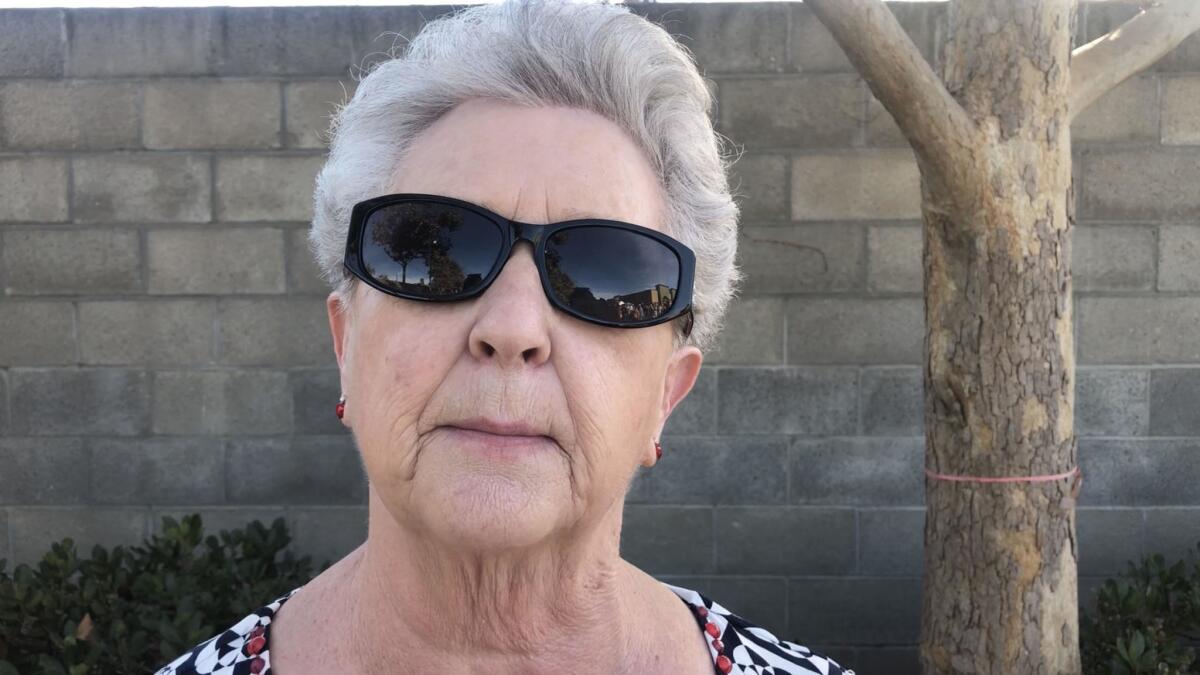
Laurel Brown has voted in every election since she was 23. She wasn’t originally a fan of Donald Trump, but she said she voted for him in 2016 when she realized that, as a businessman, he acts differently from politicians and “is used to getting things done.”
It’s now the same reason, she says, she cast her ballot this election for Republican John Cox in the race for California governor.
Brown, a 73-year-old retired banker in Modesto, lives in a rural part of California known as the breadbasket of the nation. But she said it’s hard to get elected officials and residents from the state’s largest cities to see the major role her region and its agriculture industry play at home and around the world.
“They just don’t seem to get it,” she said.
The no-nonsense approach from Cox and Trump, she said, has resonated with farmers and local business owners who feel weighed down by state regulations and a Democratic state Legislature they don’t believe keeps their interests in mind.
The next Congress should work with Trump because that is what the people elect them to do, Brown said. If she could get the chance to meet the president, she said, “I would thank him for what he is doing to improve America.”
Facebook blocks 115 accounts ahead of U.S. midterm elections
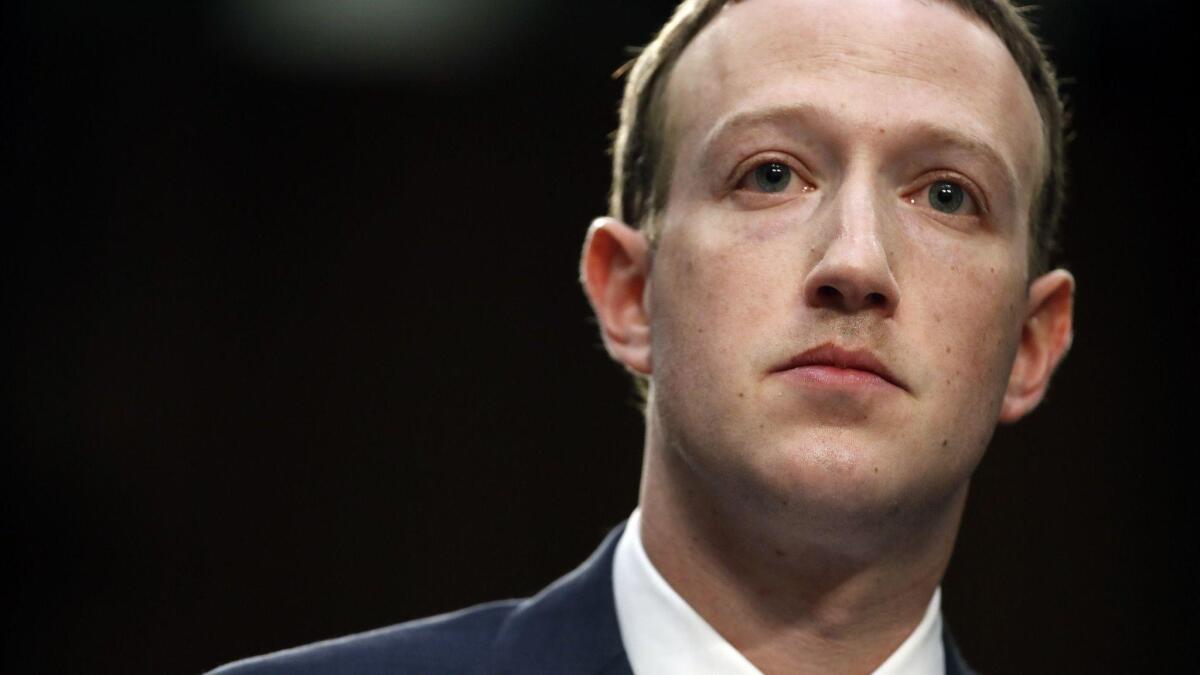
Facebook said it blocked 115 accounts for suspected “coordinated inauthentic behavior” linked to foreign groups attempting to interfere in Tuesday’s U.S. midterm elections.
The social media company shut down 30 Facebook accounts and 85 Instagram accounts and is investigating them in more detail, it said in a blog post late Monday.
Facebook acted after being tipped off Sunday by U.S. law enforcement officials. Authorities notified the company about recently discovered online activity “they believe may be linked to foreign entities,” Facebook’s head of cybersecurity policy, Nathaniel Gleicher, wrote in the post.
U.S. tech companies have stepped up their work against disinformation campaigns, aiming to stymie online troublemakers’ efforts to divide voters and discredit democracy. Facebook’s purge is part of countermeasures to prevent abuses like those used by Russian groups two years ago to sway public opinion ahead of the 2016 U.S. presidential election.
The company based in Menlo Park, Calif., has been somewhat regularly disclosing such purges in recent months, most recently in October. More are likely going forward since, even as its systems get better at detecting and removing malicious accounts, the bad actors are sharpening their attacks too.
Gleicher said Facebook will provide an update once it learns more, including whether the blocked accounts are linked to the Russia-based Internet Research Agency, or other foreign entities.
Almost all of the Facebook pages associated with the blocked accounts appeared to be in French or Russian. The Instagram accounts were mostly in English and were focused either on celebrities or political debate. No further details were given about the accounts or suspicious activity.
Last month, Facebook removed 82 pages, accounts and groups tied to Iran and aimed at stirring up strife in the U.S. and the U.K. It carried out an even broader sweep in August, removing 652 pages, groups and accounts linked to Russia and Iran.
Twitter, meanwhile, has said it has identified more than 4,600 accounts and 10 million tweets, mostly affiliated with the Internet Research Agency, which was linked to foreign meddling in U.S. elections, including the presidential vote of 2016. The agency, a Russian troll farm, has been indicted by U.S. special counsel Robert S. Mueller III for its actions during the 2016 vote.
Facebook, Twitter and other companies have been fighting misinformation and election meddling on their services for the past two years. There are signs they’re making headway, although they’re still a very long way from winning the war.
Facebook, in particular, has reversed its stance of late 2016, when CEO Mark Zuckerberg dismissed as “pretty crazy” the notion that fake news on his service could have swayed the presidential election.
In July, for instance, the company said that its spending on security and content moderation, coupled with other business shifts, would hinder its growth and profitability. Investors expressed their displeasure by knocking $119 billion off Facebook’s market value.
One problem is that it’s not just agents from Russia and other nations who are intent on sharing misinformation and propaganda. There is plenty of homegrown fake news too, whether in the U.S. or elsewhere.
Still, Facebook is seeing some payoff, and not just with the accounts it has been able to find and take down. A recent research collaboration between New York University and Stanford found that user “interactions” with fake news stories on Facebook, which rose substantially in 2016 during the presidential campaign, fell significantly between the end of 2016 and July 2018. On Twitter, however, the sharing of such stories continued to rise over the last two years.
Cameras are rolling: Katie Hill casts her ballot in the 25th Congressional District
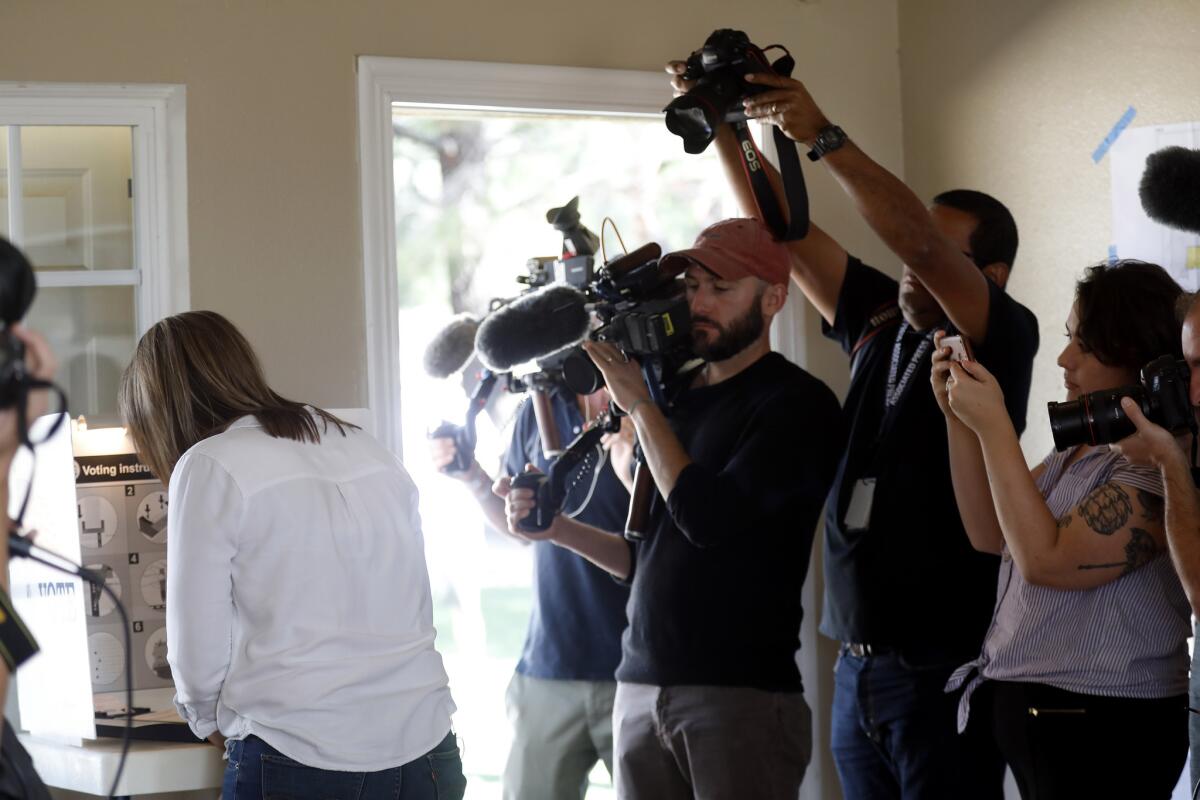
Katie Hill, the Democrat who is challenging Republican incumbent Steve Knight in California’s 25th Congressional District, casts her ballot under the watchful eye of the media at Shepherd of the Hills Church in Agua Dulce. More visual coverage: America goes to the polls
When a ballot choice affects a friend, ‘it changes the game’
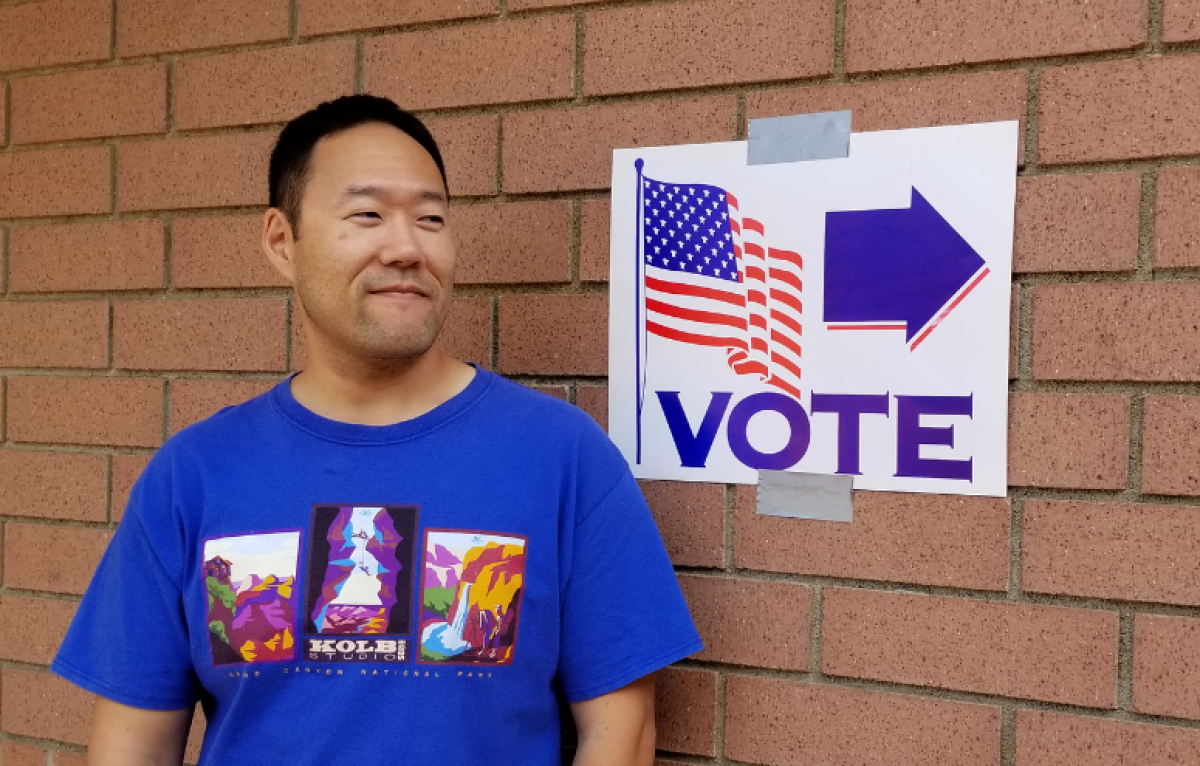
The shouts of children playing soccer in a nearby school yard echoed across the polling station, but Brian Kim kept his focus glued to the ballot guide in his hand.
The 36-year-old Newport Beach resident said he had a friend who was gravely ill and undergoing dialysis, so this election — and Proposition 8 specifically — were very important to him.
“Politics usually doesn’t come up in my circles,” said Kim, who runs a property management business. “Yet when something affects someone you know, it changes the game.”
Kim said he supported the measure, which seeks to cap profits for large dialysis companies. He said he intentionally “did not go by ads or anything when I vote,” preferring “quiet research,” instead.
The registered independent votes in person “because if I had to vote by mail, I would forget.”
In Orange County, officials counted a record 50,000 in-person early voters, according to the county’s registrar of voters. Such numbers are most often often associated with presidential election years.
Kim said that in his view, the turnout numbers “reflect the state of the nation because all over, people are taking this process seriously.”
“It’s touching those who want to change the status quo. They realize this is how they can contribute. They can’t say they don’t like something if they refuse to participate,” Kim said.
‘Change is in the air’ for Newport Beach voter
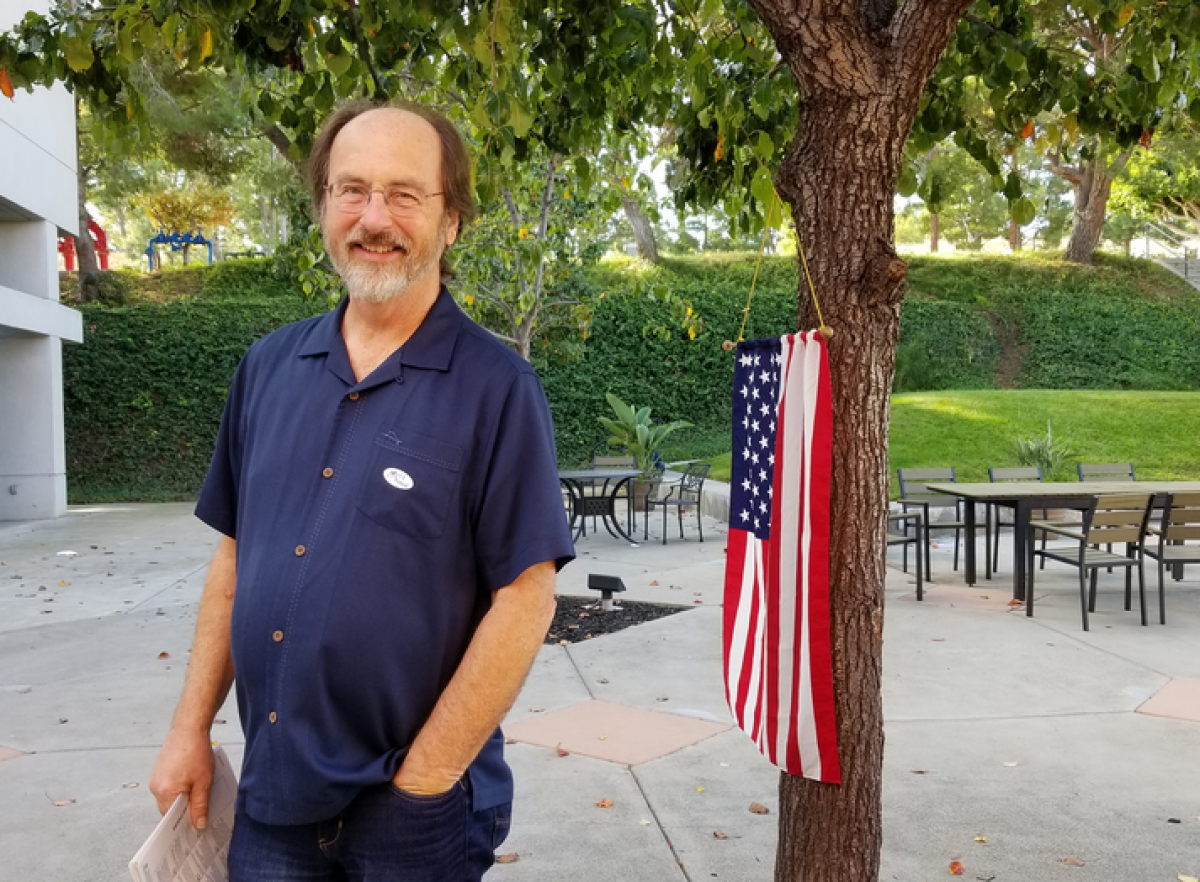
Alan Howarth said he spent the last two weeks “checking out stuff” on one of the world’s most dominant social media arenas before making decisions on who or what to vote for Tuesday.
“I went through a lot of YouTuber opinions and a lot of detailed videos,” said the Newport Beach music composer and sound designer. “There are some people who view the world as I do and it’s important to me to listen to their recent thoughts.”
At 70, the registered independent said he mainly favored Republicans on the ballot, with the governor’s race at the top of his list.
He lives across the street from the Liberty Baptist Church polling station and just walked there to vote, adding that he cast his ballot “for change. Why not? Change is in the air.”
As both a voter and a candidate, he supports Trump
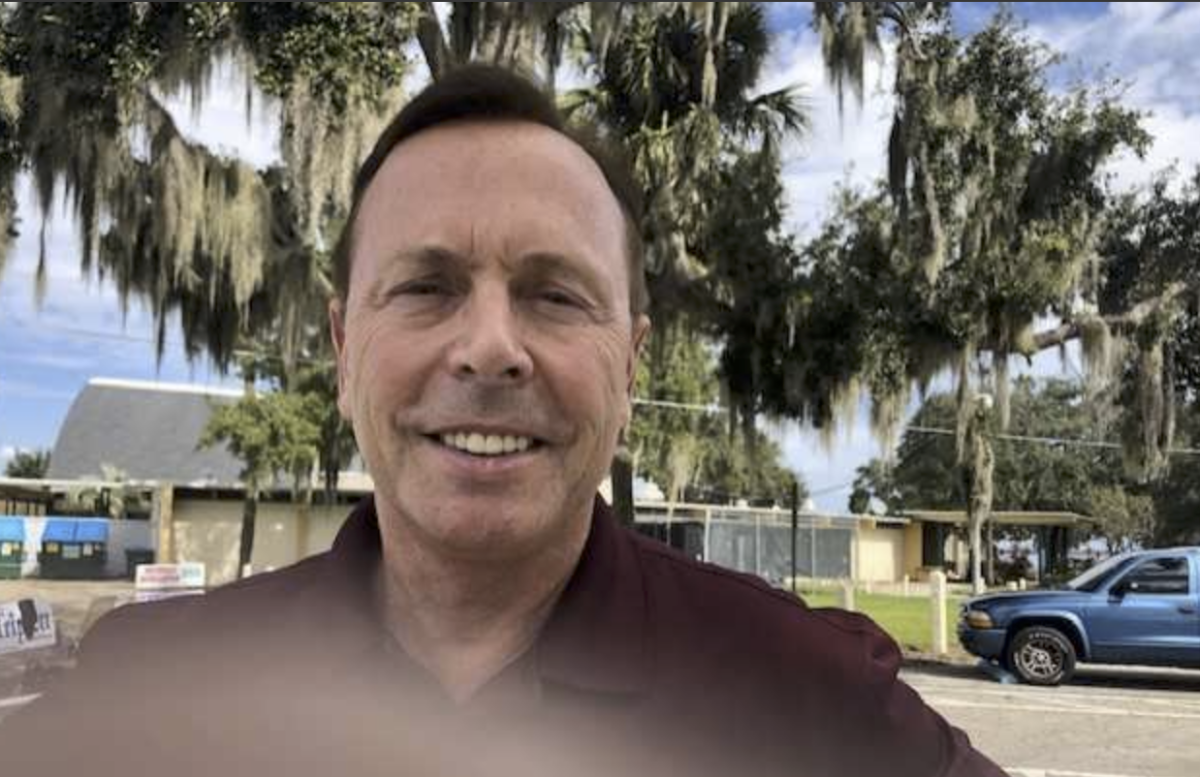
David Smith was doing double-duty outside the Sanford Civic Center in Sanford, Fla. He was there not only as a voter but also as a candidate. He is running as a Republican for the Florida State Legislature in District 28. Despite his party affiliation, he said it did not affect his vote.
“I voted based on the candidates and their positions, mostly,” Smith said as a voter, not as a candidate. Smith also took the time to explain, in his view, how the country works. “They should work with [Trump],” said Smith, a retired Marine colonel. “Those are the checks and balances put into our Constitution by our founding fathers. Between the executive branch and the legislative branch they have an obligation to move the country forward.”
Smith is a fan of President Trump. “He’s doing a great job,” Smith said. “I hope he keeps it up. He has my full support.”
For one Texan, a vote for Cruz is an endorsement of Trump
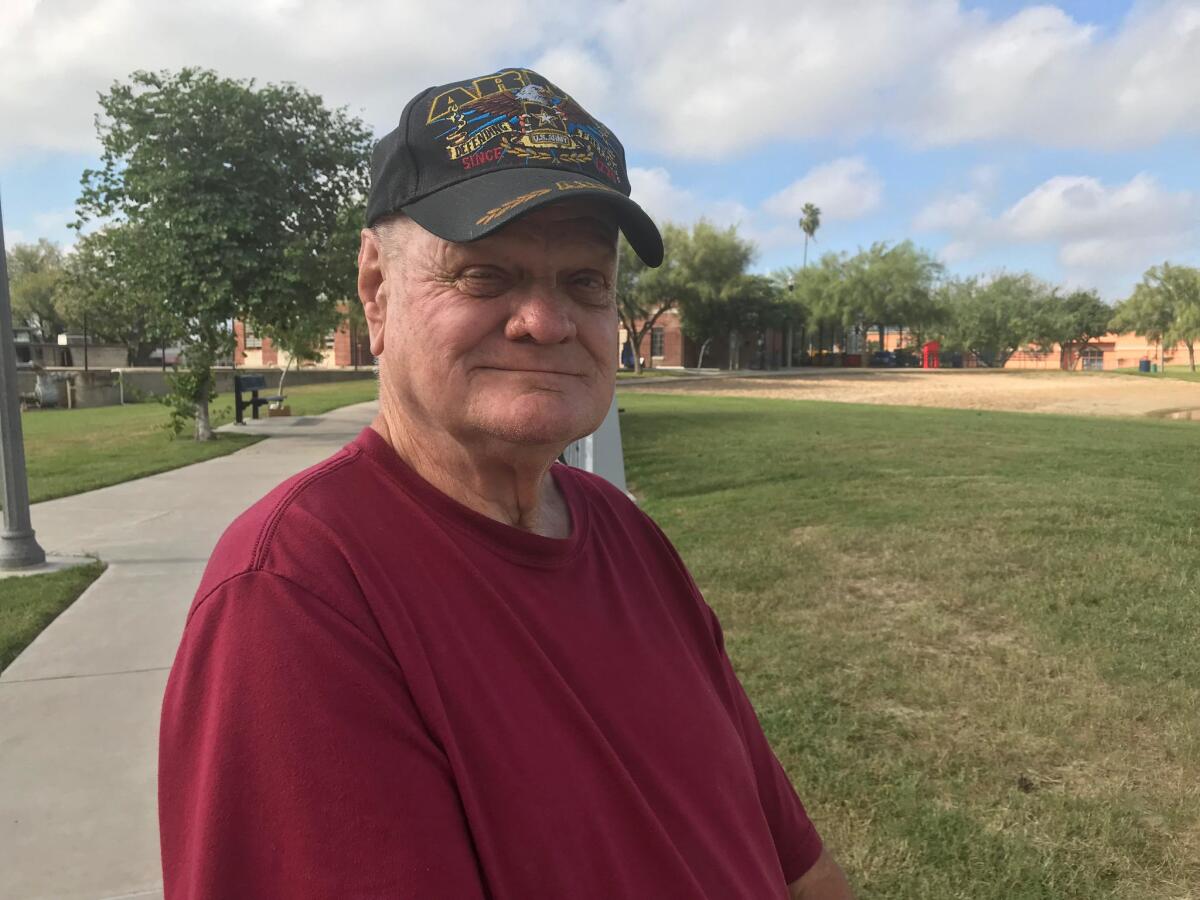
Republican Charles Cooke sees his vote as an endorsement of President Trump.
“The things that have happened in the past two years are good. The jobs, the economy is better than ever, a lot of manufacturing, companies are coming back to the United States,” he said after voting.
Cooke, 73, is glad he voted for Trump.
“He’s a businessman, he’s not a politician, and that’s what we need,” Cooke said.
Cooke ran his own construction company in Atlanta before he retired a decade ago to South Texas. The area is largely Democrat, but moderate. Outside his polling place at a local park, the grass was thick with campaign signs, including those for both Republican Sen. Ted Cruz and his Democratic opponent, Rep. Beto O’Rourke.
Cooke voted for Cruz, whom he sees as a Trump ally.
“I would like to see Congress give him more leeway,” he said of Trump.
And Cooke had a message for the president.
“Thank you for the service you’ve given our country. Thank you for the jobs. This country is a lot better than it’s been for the past eight years.”
Will the election bring order to Washington? A Texas voter hopes so
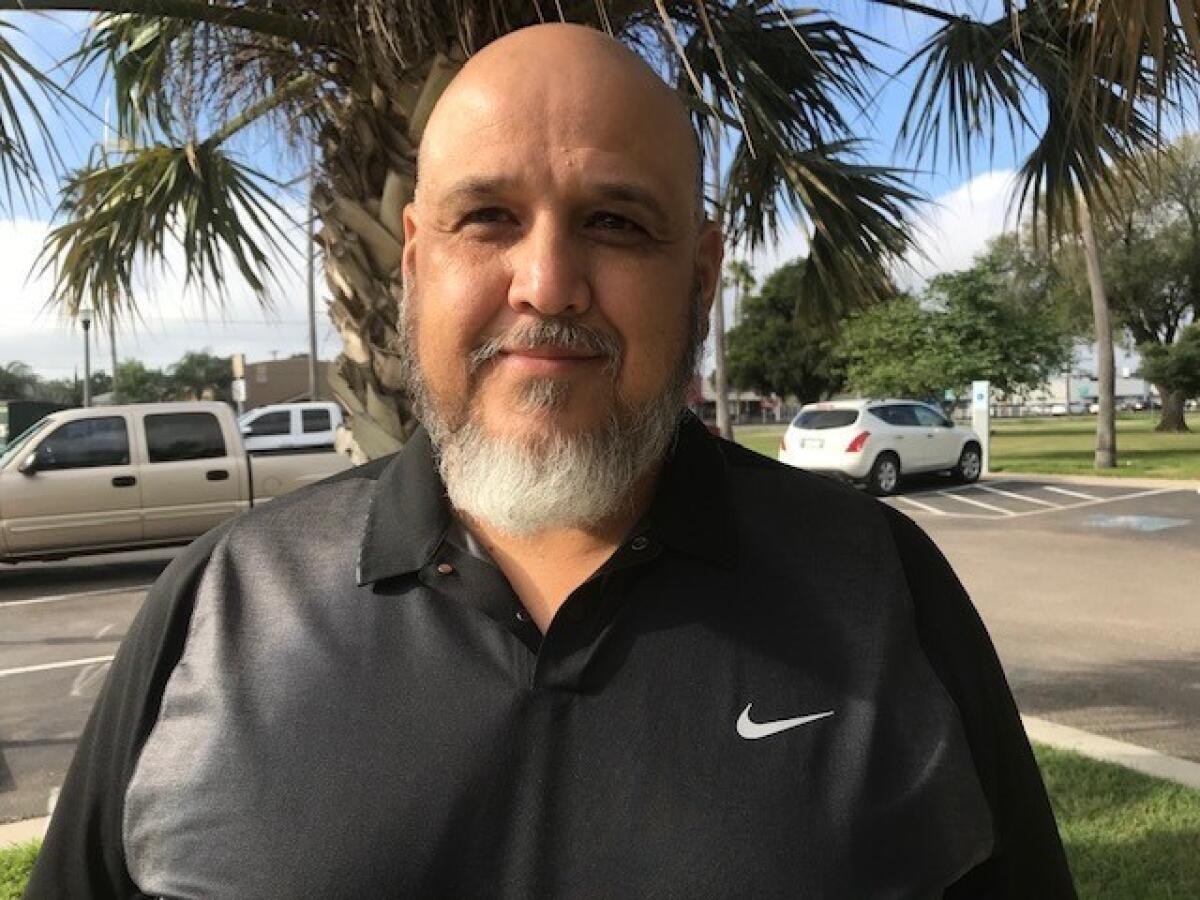
Carlos Garza said he hoped the election would help restore order to Washington.
“It’s a shambles right now,” said Garza, 51, after voting in South Texas.
Garza of Weslaco, Texas, works at a car dealership. He isn’t registered with a political party but identifies with Democrats. He said the Senate race was important to him, although he sees both Beto O’Rourke and Ted Cruz as “good candidates.”
“You can’t say anything if you don’t vote,” he said, adding that during the last presidential election, “people thought the Democratic Party had it sealed and we got blown out of the water.”
Garza didn’t want to comment about Trump’s performance as president. But he said he would like the president to “be more civil” when he speaks.
“Sometimes it comes out harsh, brash, even a little embarrassing,” he said.
Snapshot: Ruffing it on election day
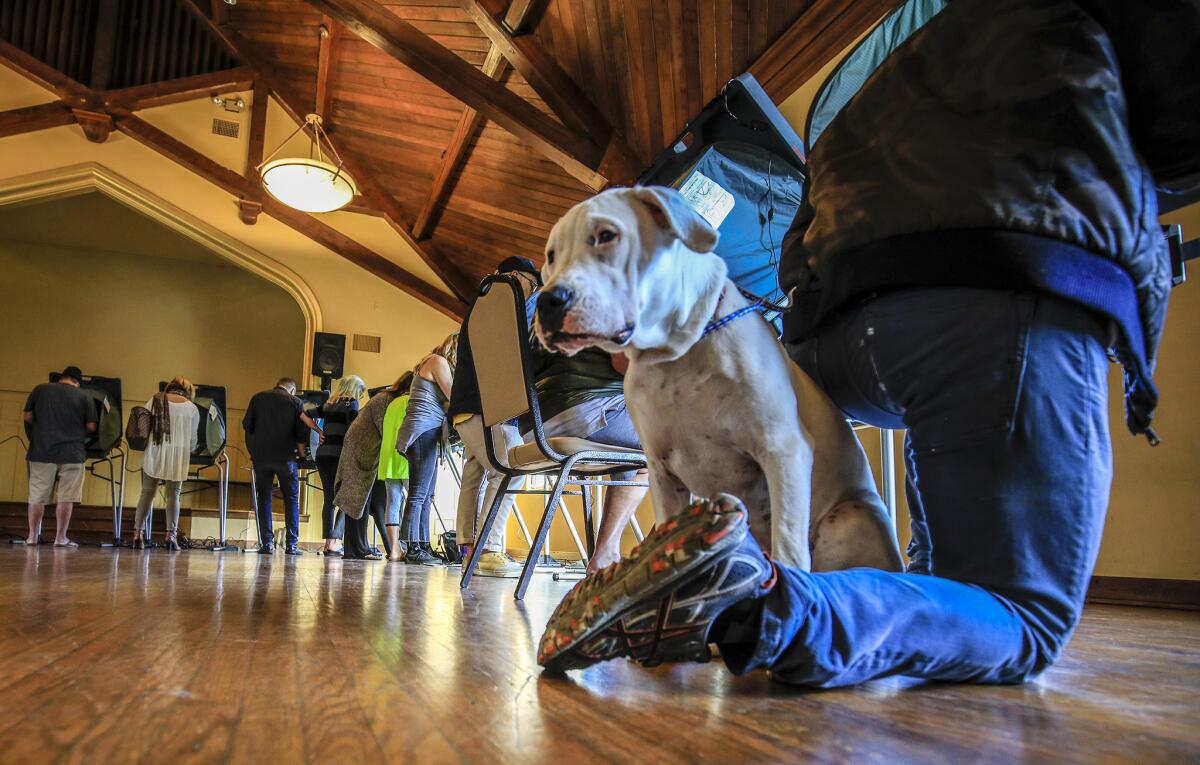
Canine pal Zelda waits for her owner, Tony Payan, to cast his ballot at the Neighborhood Congregational Church in Laguna Beach on Tuesday. More photos: America goes to the polls
Georgia Republican’s unhappiness with Trump won’t affect his decision to vote for GOP gubernatorial candidate
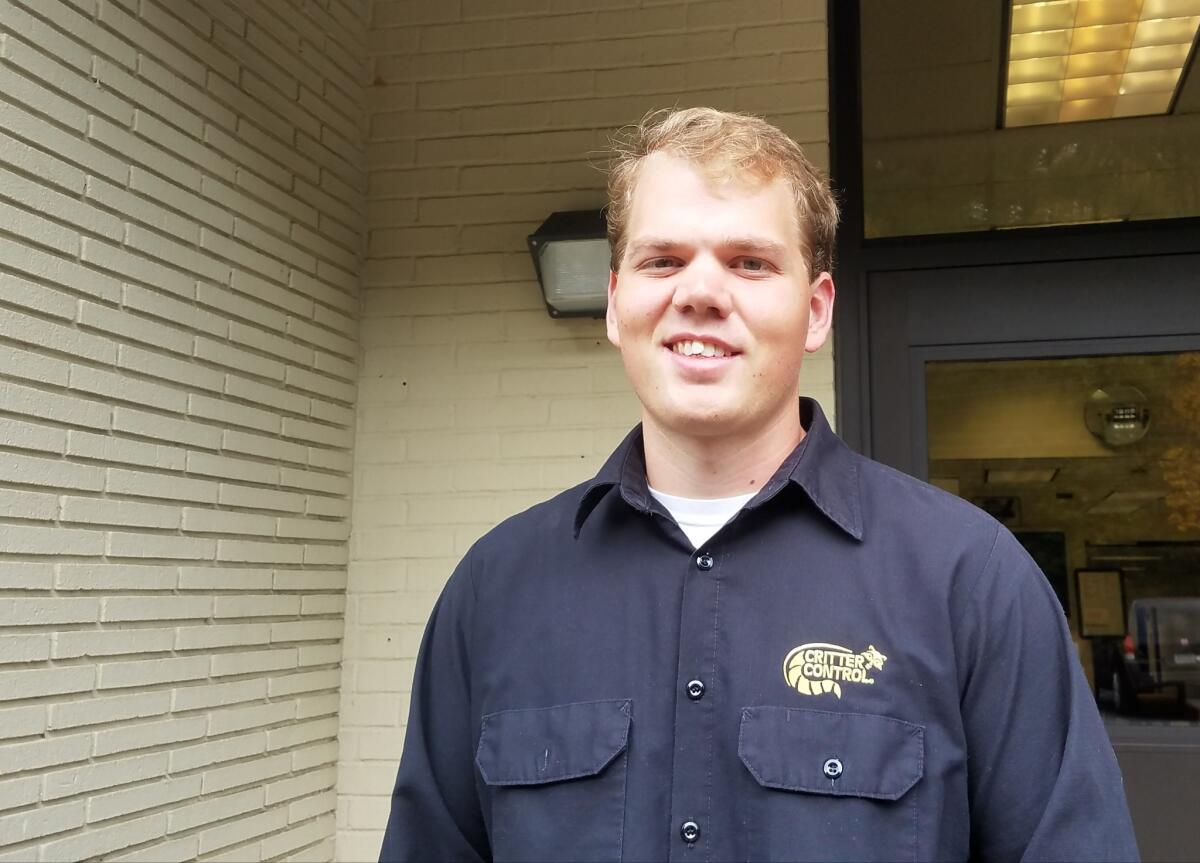
Jonathan Evans, a wildlife removal specialist in Fayetteville, Ga., said President Trump had not affected his vote. A registered Republican, he was voting for Brian Kemp, the Republican candidate in Georgia’s gubernatorial race, in spite of his feelings about Trump.
“I’m upset with Trump,” said Evans, 24, a conservationist who studied wildlife biology and opposes the Trump administration’s environmental and conservation policies. He did not vote for a presidential candidate in the 2016 election.
“He’s doing a good job with the economy, but he’s not helping the environment,” he said of Trump, citing the administration’s plan to strip the Endangered Species Act of key provisions enacted nearly half a century ago to keep plants and animal species from going extinct.
Evans was somewhat torn on Kemp, saying that repeated allegations of voter suppression indicated that Kemp was “kind of making a mess” of being secretary of state. But he felt Kemp would ultimately make a better fit for governor than Democratic candidate Stacey Abrams.
“He grew up in the country and he knows the country; he will help my farming family and friends,” he said. “Abrams is from Atlanta. She will just help out the city.”
He has these words in mind as he fills out his ballot: ‘Trump’s gotta go’
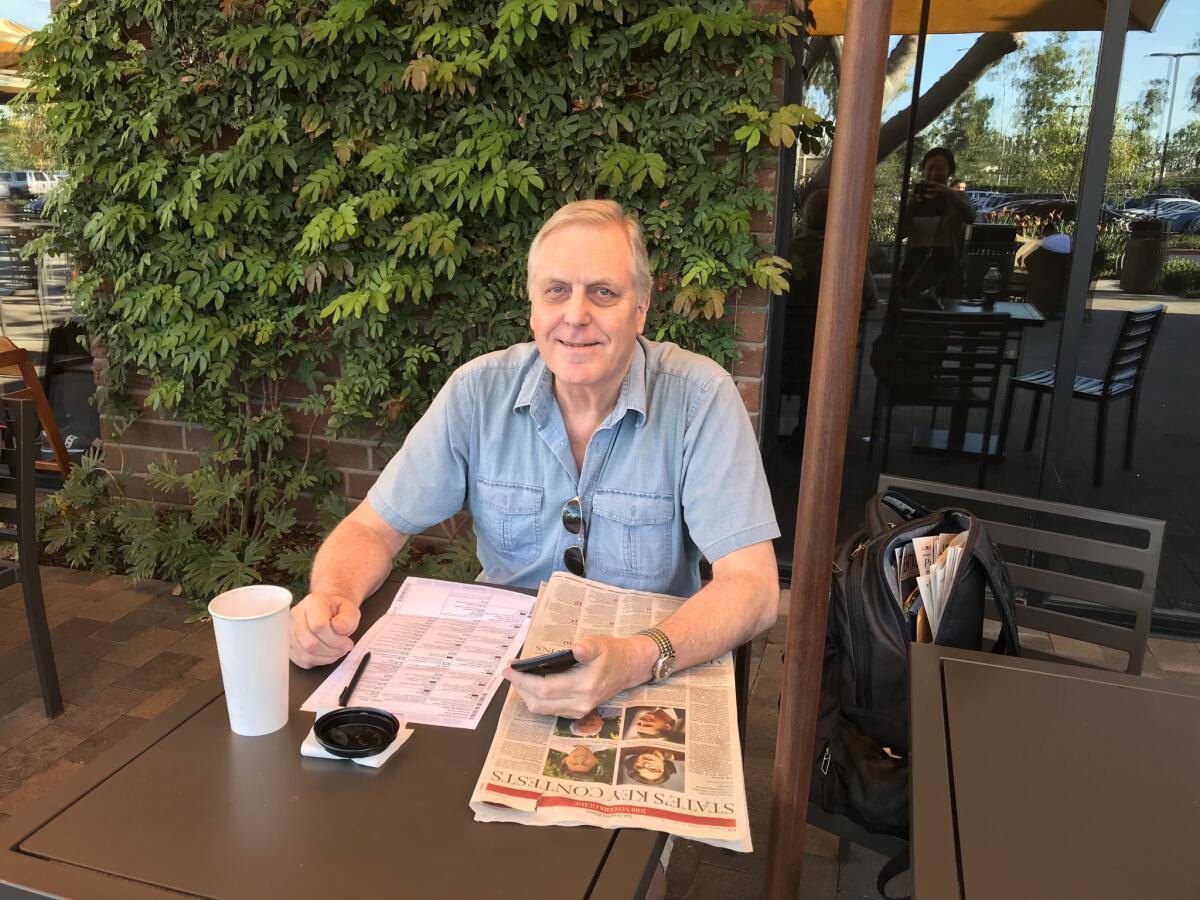
President Trump’s name was nowhere to be seen on James Olsen’s mail-in ballot, but it may as well have been printed on every line.
The 68-year-old retired contractor said he was voting Democrat for all federal offices.
“These are easy choices,” he said as he filled out his ballot on Saturday. “It’s the most important election in my lifetime. Trump’s gotta go.”
Olsen sat outside a taco shop in an Irvine strip mall, marking up the ballot he was planning on dropping off on election day. A registered independent, Olsen said he was nervous and worried about what Trump’s unchecked agenda would mean for the country.
“He’s a maniac, he’s dangerous,” Olsen said, adding that he was particularly outraged by Trump’s latest remarks that he was going do away with birthright citizenship.
As of Saturday, three other mail-in ballots sat untouched in his house — for his two stepchildren and daughter-in-law.
His stepson, he said, is an avid Trump supporter. Olsen said they’ve stopped talking about politics because his stepson responds with personal insults.
“He was brought into the cult,” he said.
Florida woman dislikes Trump but hopes everyone can work together
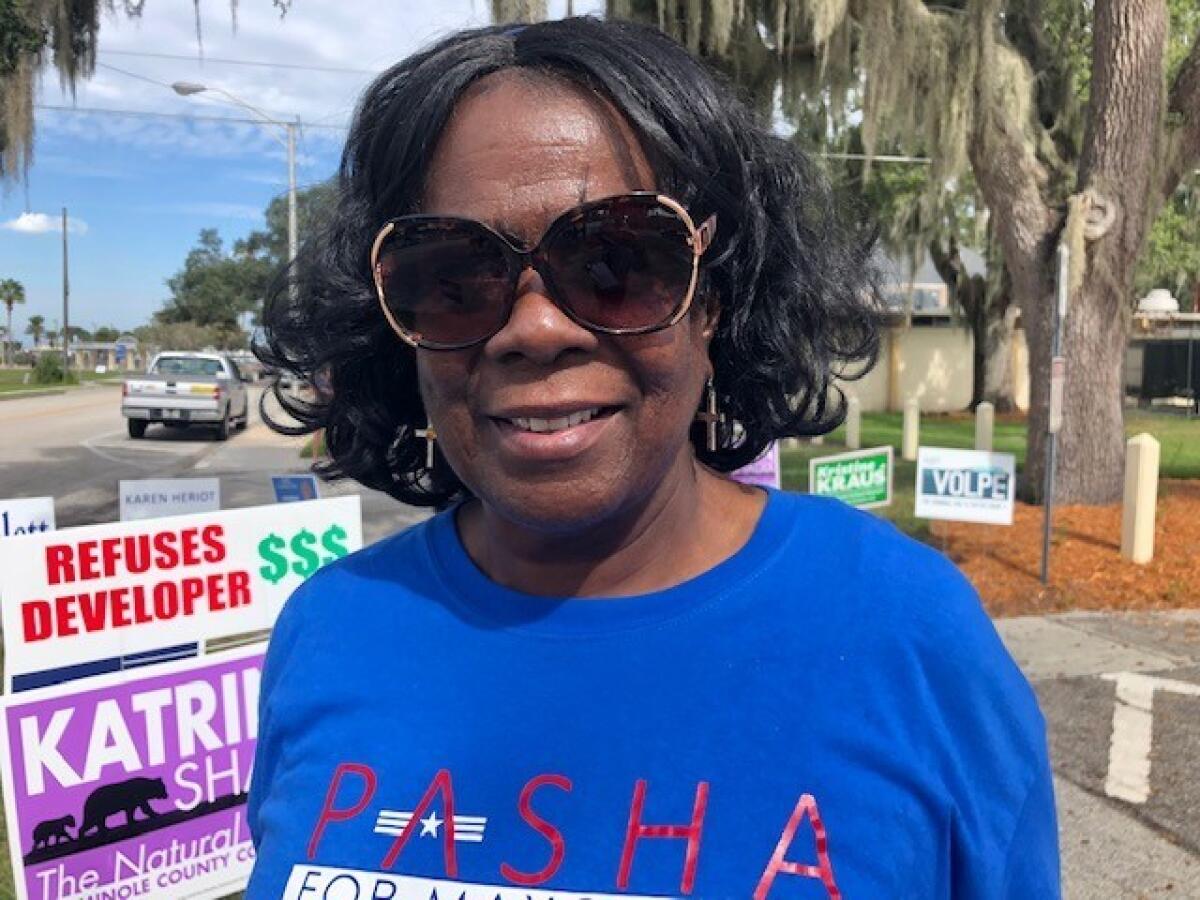
Gloria Coleman was talking to friends, having voted at the Sanford Civic Center, three blocks from the county courthouse. Sanford, Fla., is more known lately as where George Zimmerman killed Trayvon Martin. It’s a racially mixed city that is 60% white and 32% black. Coleman admits to coming to the polls because of President Trump.
“Yes, yes and yes because of some of his policies and some of his prior doings,” Coleman said when asked if Trump influenced her to vote. “I’m just not with it. I think we need a change.”
But Coleman does not have the all or nothing attitude of some voters.
“I’m hoping they [Democrats and Republicans] can work together a little bit and work with [Trump] and not against him. They need to find a solution and meet.”
Coleman, a counselor, said she did not vote for Trump two years ago, but does respect the office he holds.
“He is the president, so I’m going to give him his due respect. So, I call him Mr. President.”
Passing through: Americans go to the polls
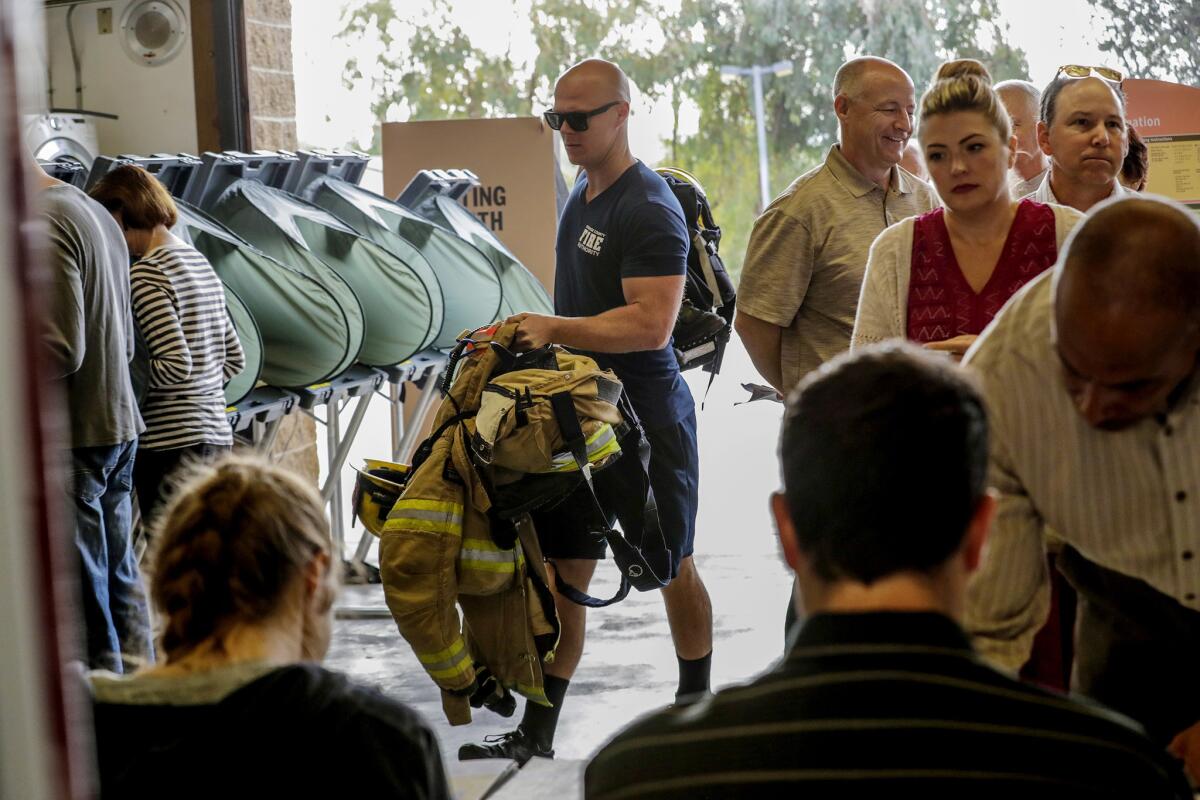
Firefighter Brice Reiner makes his way past voters as he arrives for his shift at Orange County Fire Station No. 32 in Yorba Linda. The firehouse was performing double duty Tuesday as a polling station. More photos: America goes to the polls
A voter’s message to Trump: ‘All Latinos are not the same’

Jose Humberto Espejo, 70, McAllen Texas
For Jose Humberto Espejo, this election is about standing up for democratic principles.
“We want liberty, us Latinos. We have the freedom to vote for who we want,” Espejo, 70, said in Spanish as he left a South Texas polling place with his wife Tuesday morning. “We came to send a message that we are all immigrants in this country.”
Espejo was born outside Guadalajara and came to the U.S. as a migrant worker, tending fields in Central California and Texas. He settled in McAllen, Texas, and in 2000 became a citizen.
A registered Democrat, like many in the surrounding Rio Grande Valley, Espejo is in many ways a moderate. He’s Catholic, and opposes abortion. He said he wished Congress would do more to stop Trump’s policies, which he considers “racist.”
He quoted former Mexican President Benito Juárez in an appeal for civility: “Among individuals, as among nations, respect for the rights of others is peace.”
“All Latinos are not the same,” he said when asked what he wishes he could tell Trump. “We’re not all narcos. I always obey the rules and respect people. I came to [the U.S. to] work, to live, and have lived here for years.”
Vote-by-mail will keep us from knowing voter turnout for days

Voter turnout in Los Angeles County will remain unclear immediately after the elections because of the rising number of mail-in ballots.
The rise in voting by mail has made it much tougher for local governments to calculate voter turnout. That challenge is magnified in places such as Los Angeles County, where a majority of votes could be cast by mail in this election.
As such, it takes more time.
The nation’s most populous county is home to more than 5.2 million registered voters. And of those, about 42% are permanent vote-by-mail voters.
Let’s use the June primary election as an example:
When 100% of the precincts were counted by about 4 a.m. on June 6, voter turnout in L.A. County hovered around 18.6%. Of the 952,633 ballots that were counted, about 30% were vote-by-mail ballots.
By the time the canvassing had been completed more than three weeks later, vote-by-mail ballots accounted for 44.6% of the total ballots cast and turnout came in at a still-underwhelming 29%.
You can get live updates on the current results here.
The county will continue to count ballots throughout the month, ending with the county Board of Supervisors certifying the vote in early December. The secretary of state is scheduled to certify the statement of votes cast on Dec. 14.
In Compton, election day is a time of confusion
Ernest Thomas, 68, sat in his Chevy Tahoe and eyed his smartphone Tuesday morning. He was in no rush to cast his ballot at Gonzalez Park, one of many polling places in Compton.
“I voted a long time ago,” he said.
Thomas sent in his absentee ballot weeks ago. Today he was here to just get coffee.
“Then I’m off to work,” he said with a chuckle.
Thomas has been voting since he was 18 and has never missed an election, especially one where he has the opportunity to tilt some power back to Democrats.
“They have to get back into power,” he said.
Why? Simple, President Trump.
“I just don’t understand this president,” he said.
But voting for his party doesn’t mean he thinks it’s good. In the end, he said both parties needed to come together and stop bickering.
Thomas would not say who he voted for in the governor’s race but said one issue he felt was important was Proposition 10.
The problem was, he thinks he may have messed up his vote. He wanted to vote for more rent control but said he voted against the proposition.
Proposition 10 would repeal the Costa-Hawkins Rental Housing Act, a 1995 law that restricted cities’ ability to enact or expand rent control. Costa-Hawkins bars cities from imposing rent control on apartments built after 1995 (or earlier in cities that already had rent control in place), forbids rent control on single-family homes and condominiums, and prohibits “vacancy control,” which is when a unit’s rent stays capped even after the tenant moves out. Under Costa-Hawkins, Los Angeles cannot impose rent control on apartments built after 1978, when the city’s rent stabilization ordinance was adopted.
“It was confusing,” Thomas said. “I kept hearing no, no, so I voted the way I did.”
A note to our readers: The Times has lifted its paywall on midterm election coverage
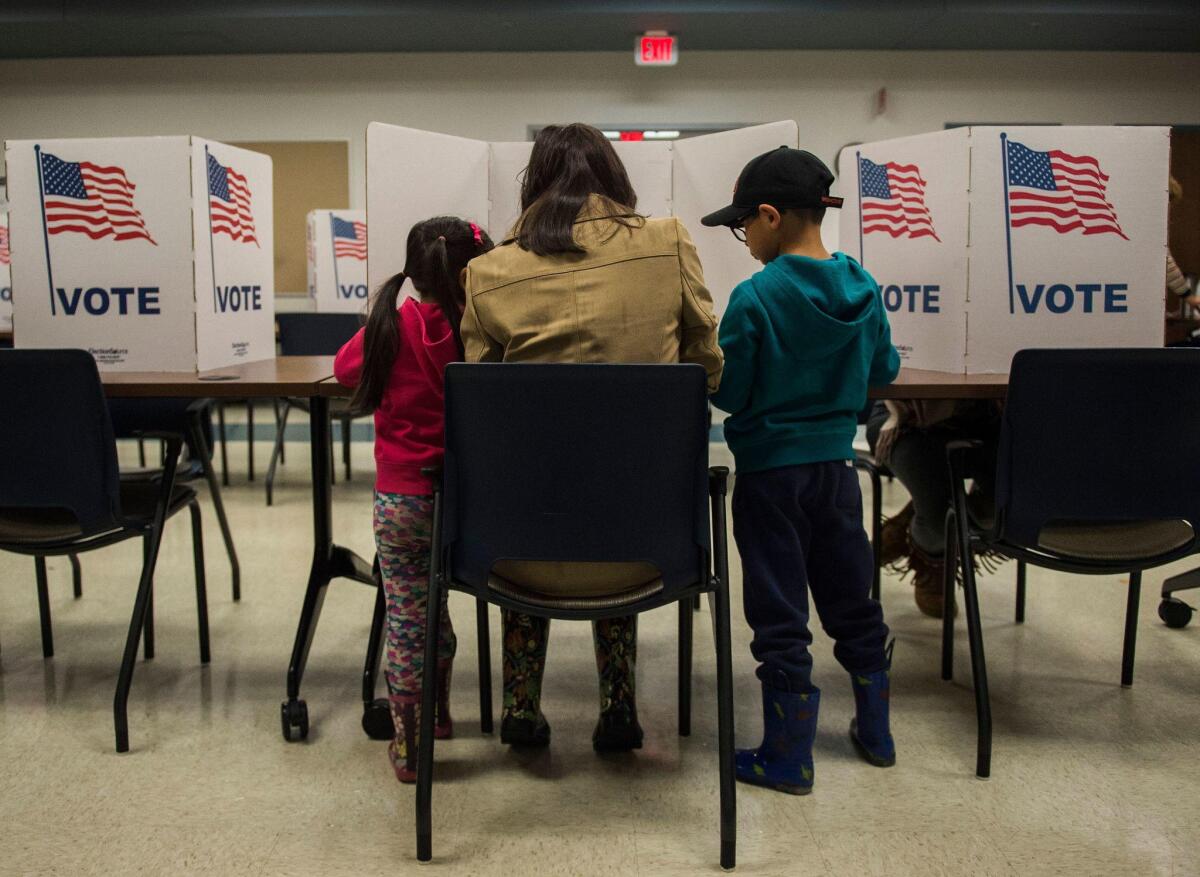
The 2018 midterm elections have consumed and convulsed the nation like few nonpresidential elections have in recent times.
Voters on Tuesday will pour into polling places across the country in elections that give Democrats their first opportunity to claw back into power in the Trump era.
In order to provide the broadest possible access to information, the Los Angeles Times has lifted its online paywall for stories about the elections.
Here is The Times’ developing coverage from Tuesday:
Where California candidates for governor John Cox and Gavin Newsom stand on top issues
A look at the most likely outcomes of the next Congress
5 things to watch for in California’s tight congressional races
Mariachis serenade voters in #dtla’s Westlake neighborhood
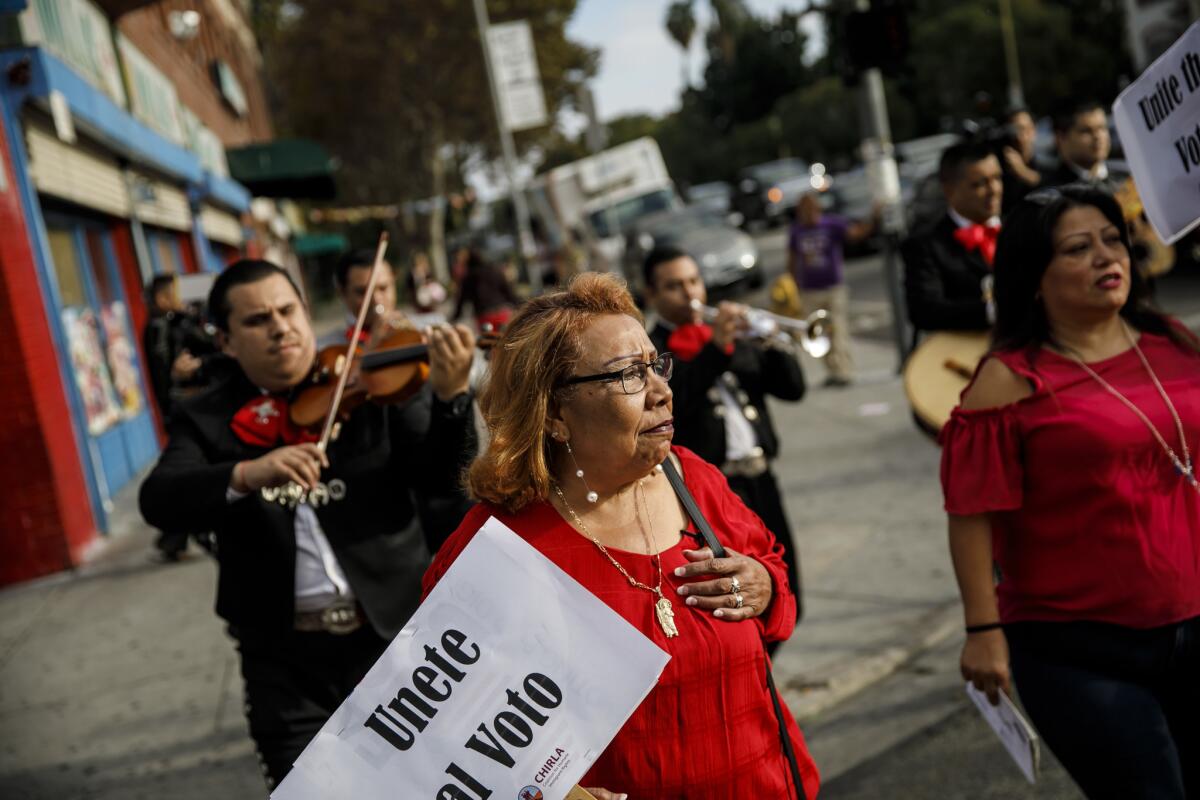
Griselda Sanchez walks to the polls in the Westlake neighborhood of Los Angeles while being serenaded by Mariachi Cuicatlan. The Coalition for Humane Immigrant Rights Los Angeles (CHIRLA) recruited the musicians to help get out the vote Tuesday. PHOTOS: America goes to the polls
Harley Rouda greets supporters for election day rally in Laguna Beach
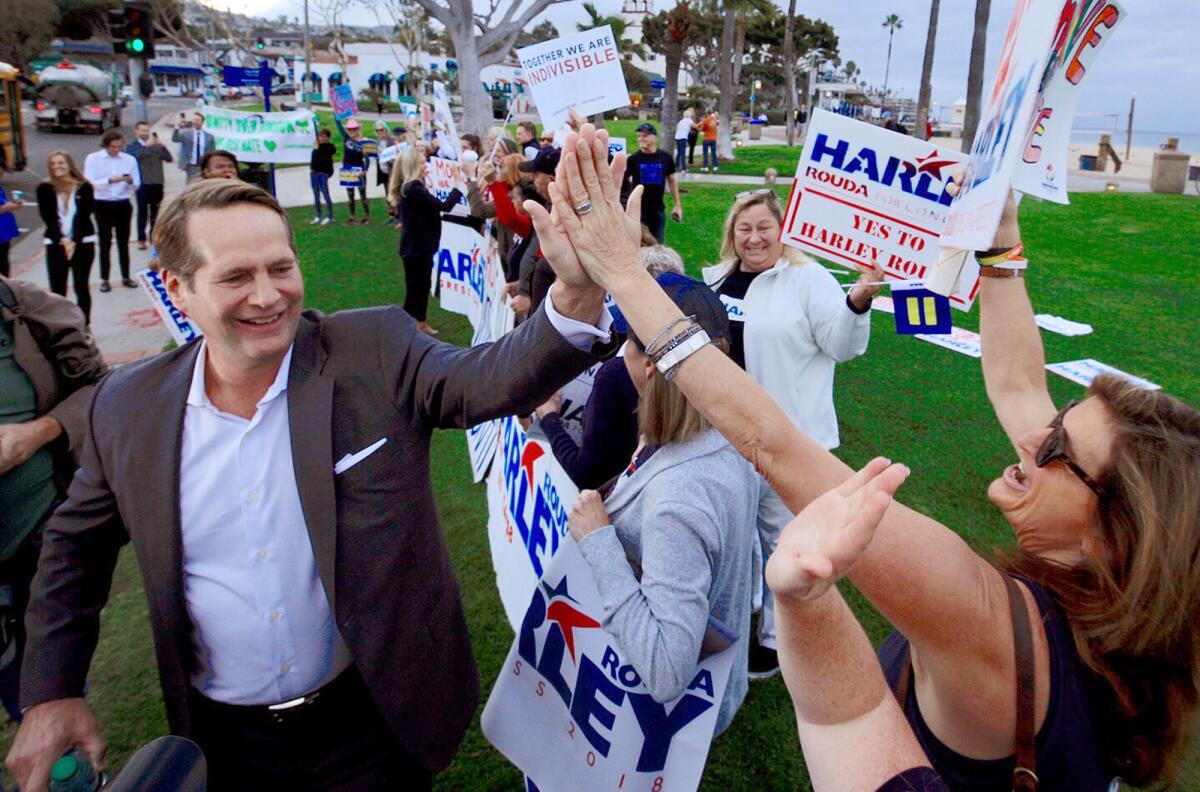
Disapproval of Trump drives Santa Clarita voter to back Democrat Katie Hill against GOP Rep. Steve Knight
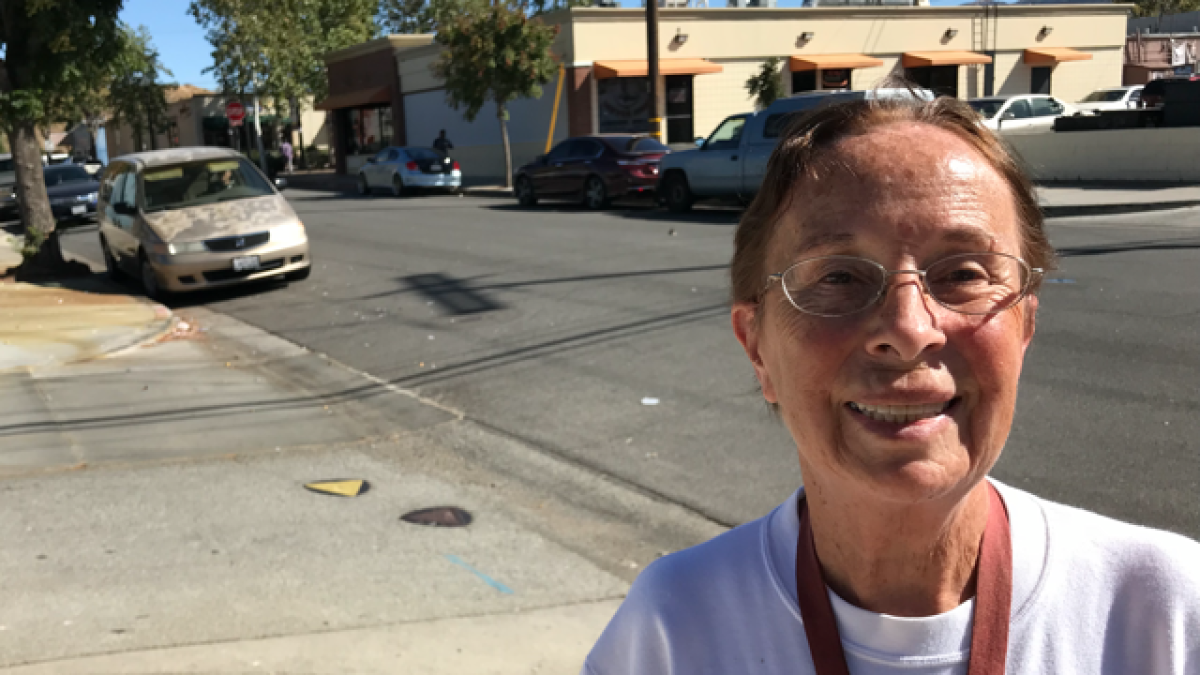
Daniele Washburn of Santa Clarita does not trust Republican Rep. Steve Knight of Palmdale, so she voted to toss him out of Congress and replace him with Democrat Katie Hill.
“Hill, I was not too sure, but I have to vote for somebody, and I can’t stand Trump,” Washburn, 77, said on her way home from a volunteer gig providing clothing to impoverished children. “He says one thing in the morning, another thing at lunch and the opposite at dinner without even thinking. He’s a mean person.”
A retired hospital information technology manager, Washburn is a Democrat who emigrated from France almost a half century ago.
She doesn’t object to all of Trump’s agenda; she supports a border wall. But she’s offended by his attitude toward Latino immigrants.
“We should welcome them, because they make a difference,” she said.
Washburn sees Trump as a “bad person” who fails to respect people regardless of their race or religion.
“We need to take a good look at us as a country,” she said. “The United States used to be the light of the world.”
Trump wasn’t ‘the be all, end all’ for how she voted, Modesto educator says

Shivaugn Alves, 37, an educator in Modesto, speaks about her reasons for voting. (Jazmine Ulloa/Los Angeles Times)
Shivaugn Alves said President Trump wasn’t “the be all, end all” for how she voted this year. But he did play a factor, she said.
“I don’t agree with the way our country is headed with the divisiveness,” said the 37-year-old educator in Modesto. “My vote is a vote for inclusivity for all people, immigrants, LGBTQ, the poor, the rich… for everyone to come together and start unifying our country so that we can build on what we have in common.”
If Trump can start seeing climate change, immigration and education in a more well-grounded way, she added, she would like to see Congress work with him. But that shouldn’t be the case if he continues down the path of hate-mongering and fear tactics, she said.
A lifelong Modesto resident, Alves said she felt confident people would see through the lies this election. If she had Trump before her, she said she would tell him that, “I think he is going to go down in the hall of shame.”
Florida attorney came out to vote against Trump
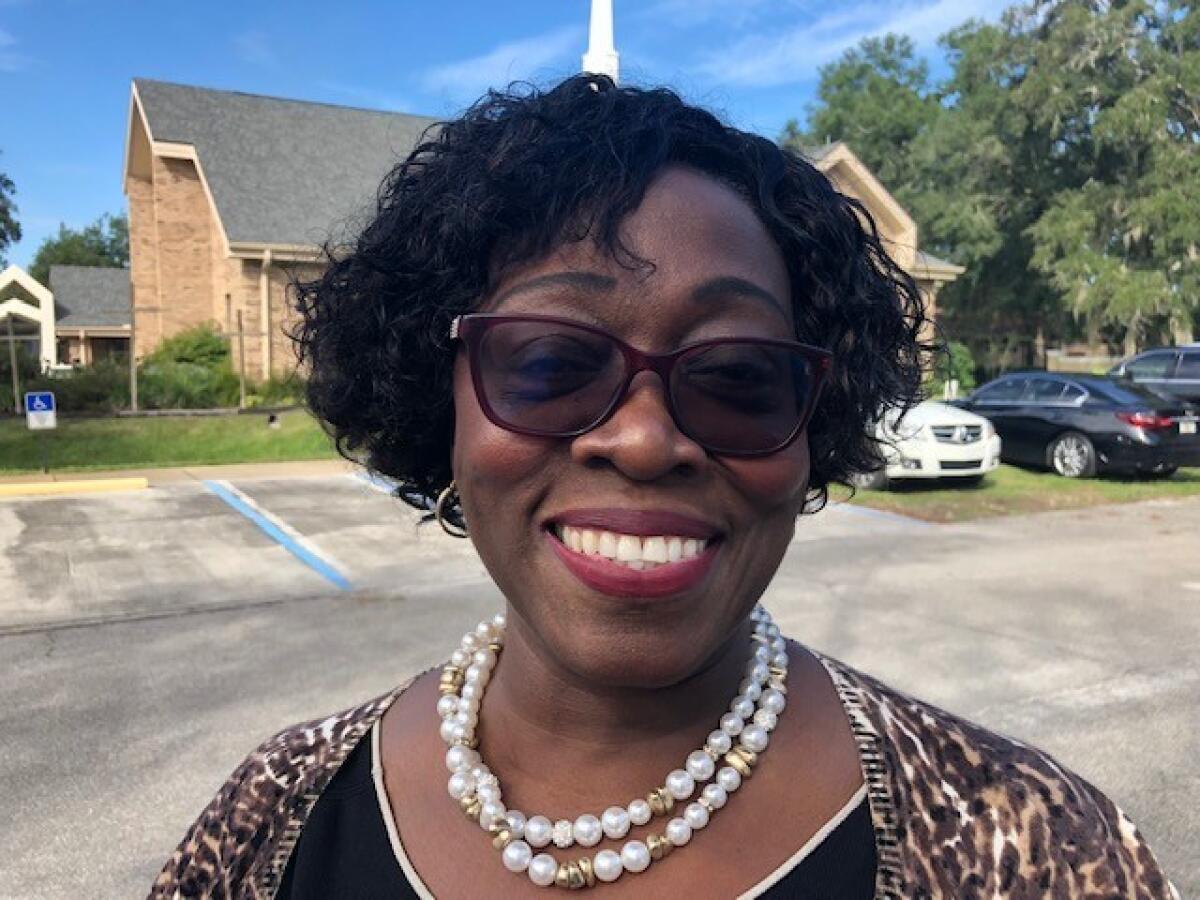
Veronica Anderson was among many voters walking to their cars in a nicely filled grass parking lot after voting at Markham Woods Presbyterian Church in Lake Mary, Fla. Several women had children in tow as they left the church, which was both a polling location and a preschool facility on this election day.
Anderson, an attorney, says President Trump and his policies “substantially” influenced her reasons to vote.
“By that, I mean I’m going to get out and vote against him.”
Anderson, choosing her words with care, advised the president to, “study, listen to professionals. He needs to work with Congress — the new one coming in. That’s what I would tell him.”
For this Georgia voter, it’s all about slapping Republicans down
Christy Jindra, a 54-year-old attorney in Fayetteville, Ga., arrived at his polling station feeling a little uneasy about his vote in Georgia’s bitterly divided gubernatorial race between Democrat Stacey Abrams and Republican Brian Kemp.
“I’d probably not vote for Abrams if Donald Trump wasn’t president,” he said. “Quite frankly, the Republicans have got to be slapped down a bit.”
Jindra used to consider himself a conservative, but voted for Hillary Clinton in 2016 because he did not think Donald Trump was presidential material. His opinion has not changed.
“You don’t believe anything he says,” he said. “It’s horrible.”
While he had reservations about Abrams – he felt too many rallied around her because she’s a black woman and found it odd that California celebrities such as Oprah Winfrey were knocking on doors to campaign for her – Jindra said he did not feel he had enough policy details from Kemp, Georgia’s secretary of state, who has aligned himself with Trump. Jindra was also concerned that Kemp hadn’t stepped down as secretary of state amid allegations of voter suppression.
“I never thought I would be in this place I’m in right now,” Jindra said Tuesday before entering a polling station. “I’m just looking for some hope to slow Trump down.”
Florida Trump supporter has total disdain for Democrats
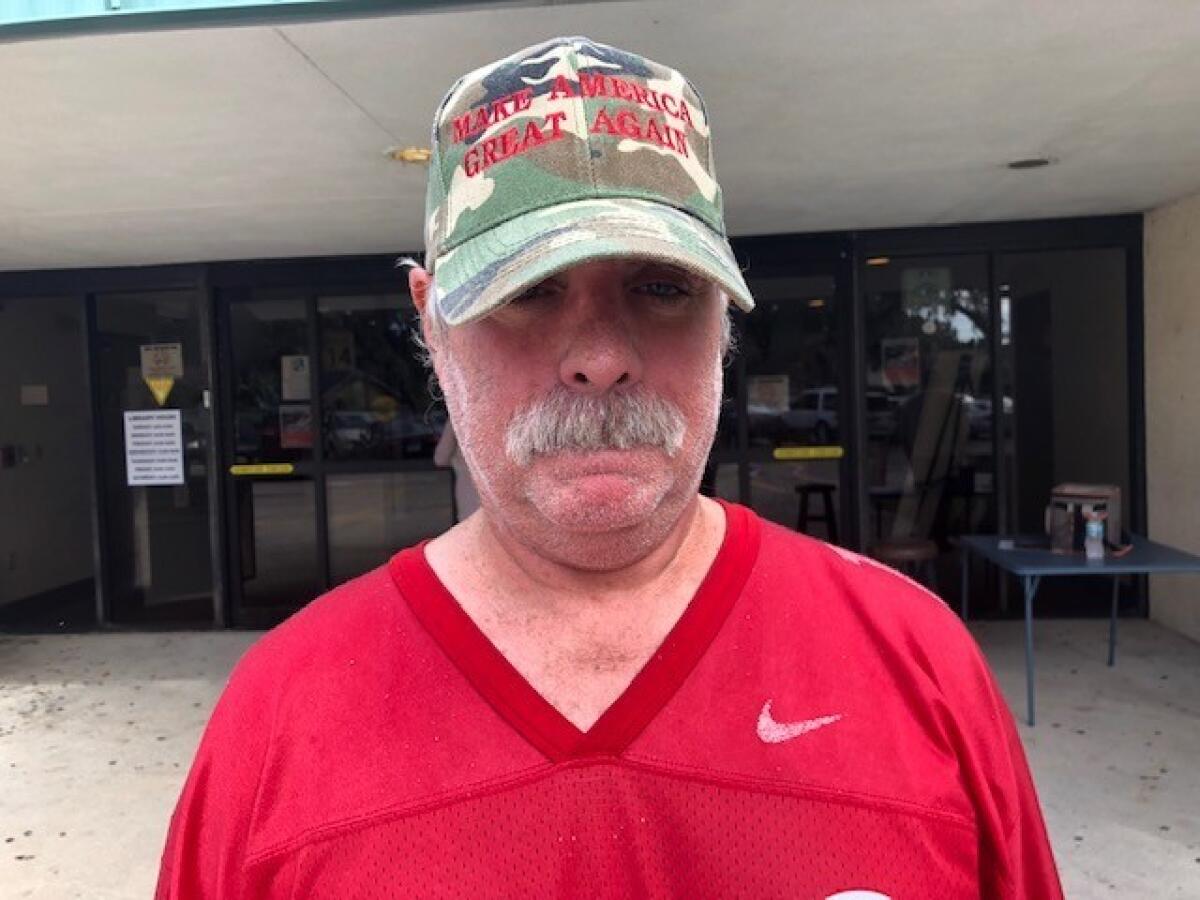
Jay Skibbe showed up at the Lake Mary Public Library to support President Trump in all ways. Lake Mary, located in Orlando’s collar county of Seminole, is a city that has 50% Republican registration and where independents slightly outnumber Democrats.
Skibbe was strong in his beliefs.
“Trump is doing a hell of a job,” he said. “The country is rolling economy-wise but the Democrats are going to vote ‘no’ on everything he wants to do. They are nothing but obstructionists. Idiots. Period.”
Skibbe also had some words for Trump.
“I would like to congratulate him for burning the media with all their lies. He’s brought out all the straws on the liberal media and brought out all the corruption on the Democrats. If he hadn’t been elected, nobody would have known about any of this corruption the Democrats have done.”
Election spending has surpassed $5.2 billion, making it the most expensive midterm in U.S. history. A look at top donors
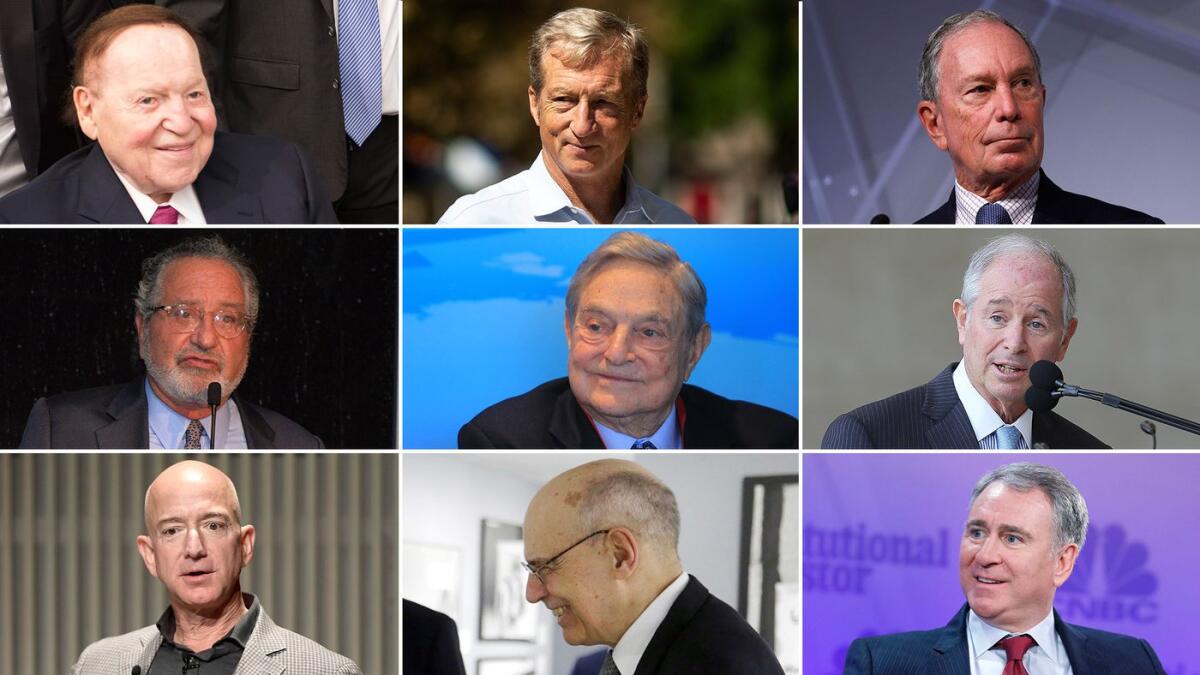
With the election just around the corner and their party on the defensive, Republicans have railed against Democratic billionaires pouring big money into this year’s midterm. But the top political donors in the closely watched battle for control of Congress are a bipartisan and varied lot.
Of the top dozen individuals or family donors, half fund Democrats, five support Republicans and one, Jeff Bezos, has chosen to put nearly all of his contributions toward nonpartisan groups, according to data compiled by the nonprofit Center for Responsive Politics.
The amount of money flowing in this year’s election is jaw-dropping. Driven mostly by seven- and eight-figure amounts from super PACs, spending has already surpassed $5.2 billion, making it the most expensive midterm election in American history.
Nearly 4 million Californians cast their ballots early. Here’s how voter turnout could affect House races
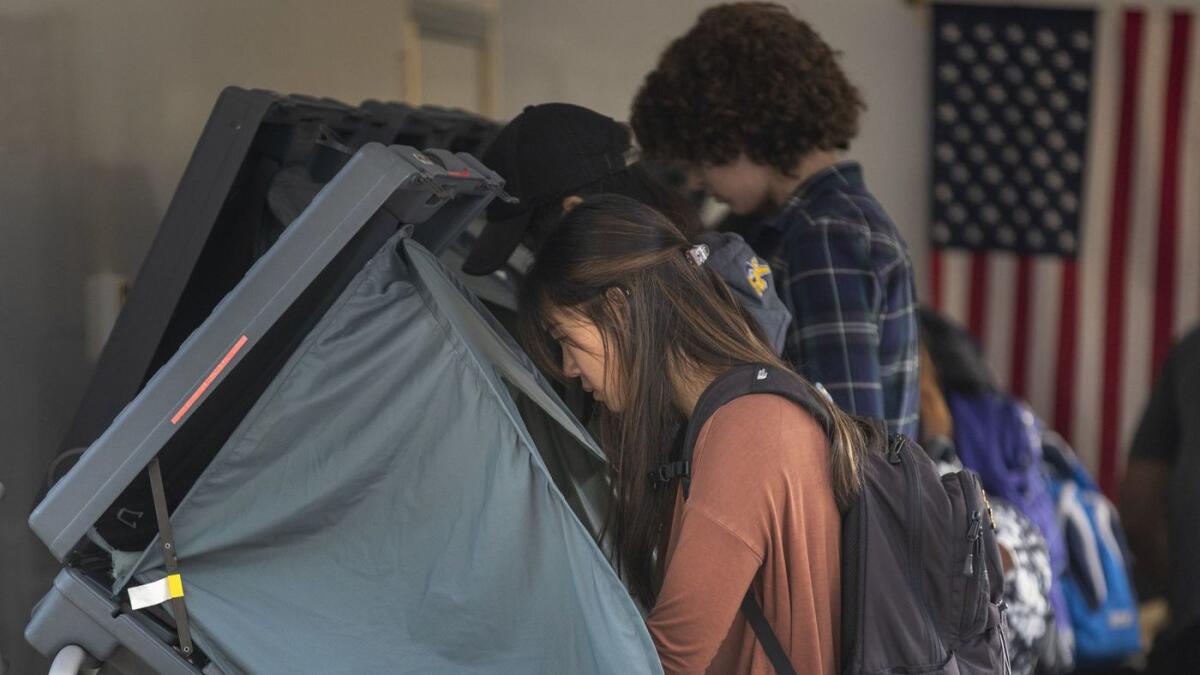
Of all the things nobody can predict in the epic congressional contests in California on Tuesday, the biggest is just who will show up to vote and who won’t.
Nearly 4 million Californians cast their ballots early, mostly by mail. That suggests higher-than-average turnout for a midterm, but short of a presidential election spike.
Voters who lean toward Democrats are most prone to skip elections, strategists say, so the higher the turnout, the better the prospects for Democrats.
“If you’re having a big turnout, it’s coming from somewhere, and it’s more likely to be coming from the low-performing universe of voters historically,” said Bill Carrick, a Democratic consultant in Los Angeles.
The Republican Party holds just 14 of California’s 53 House seats, and that turf could shrink still further Tuesday if the voter backlash against President Trump is as strong as polls suggest.
Depending on the outcome of the election, here are three scenarios for the next Congress
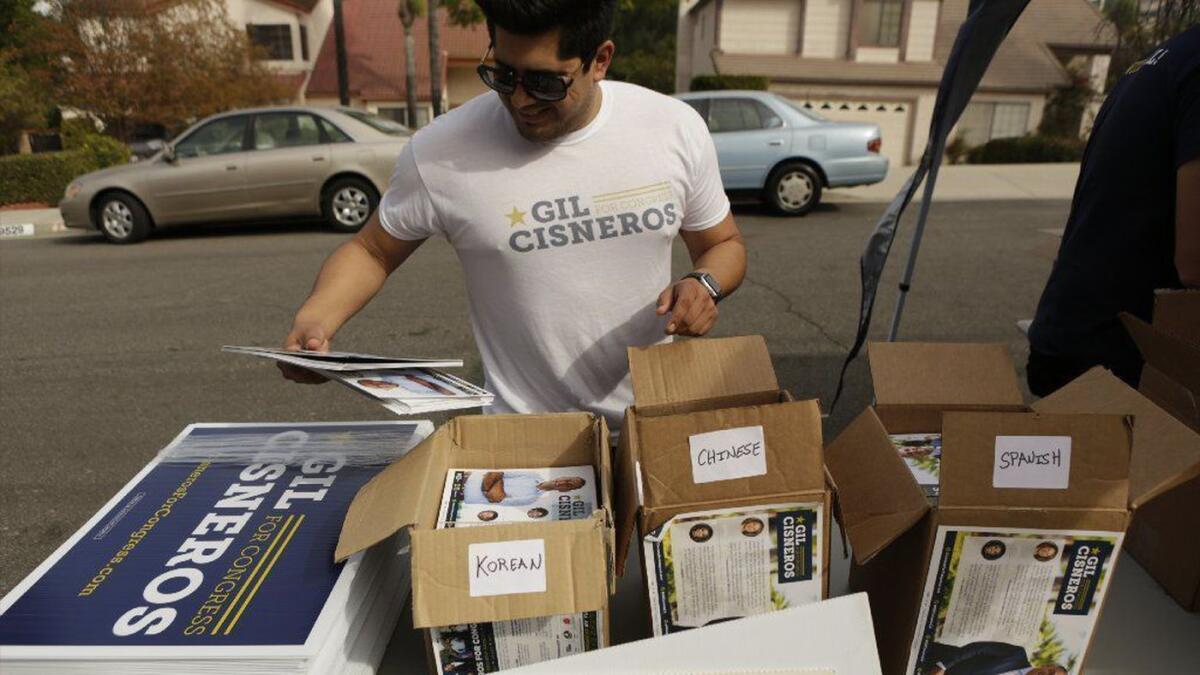
After the surprising results in the 2016 presidential election, pundits are reluctant to make predictions. But expectations are generally that Democrats will gain the 23 seats they need to take control of the House but may lose ground in the Senate, allowing Republicans to widen their 51-49 majority.
Here’s a look at what’s likely in store for the next Congress, depending upon the outcome:
1. Democrats win the House, Republicans keep the Senate
2. Democrats win the House and the Senate
3. Republicans hold the House and the Senate
Polls are open in California. Here’s what you need to know
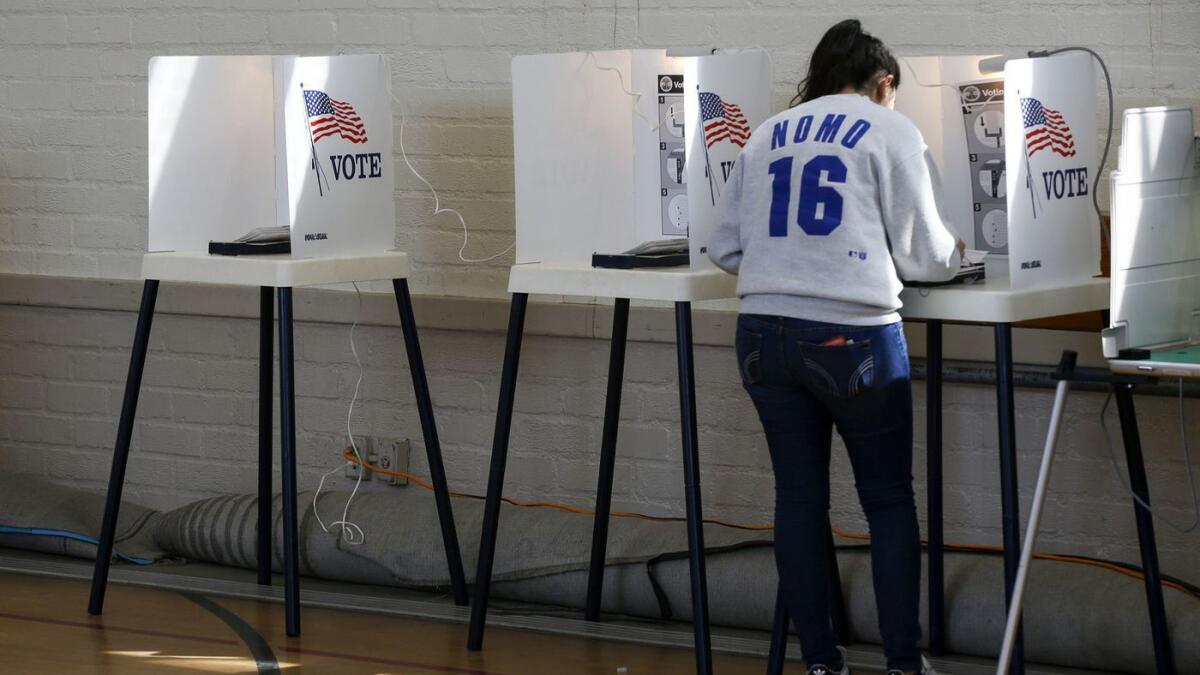
Polls have opened in California. They close at 8 p.m. As long as you are in line by then, you can cast a ballot.
Here is some information on how to vote.
Remember, California allows same-day voter registration. All you have to do is find your county’s election office, go there and cast a provisional ballot, which will be counted once your registration is verified. Here’s where to find yours.
Tech billionaires battle over San Francisco’s homeless tax
Tensions are high ahead of Tuesday’s election in San Francisco, where a ballot measure would tax corporate businesses to fund services for the homeless.
Proposition C, a tax on gross annual receipts of the city’s largest companies, would nearly double San Francisco’s budget dedicated to the curbing homelessness by adding $300 million a year to fund housing, shelters, mental health services and preventive measures.
About 400 businesses, which make up the top 20% of the city’s job base, would be subject to the tax, according to an analysis by City Controller Ben Rosenfield.
Kansas ponders a Democratic shift as the governor’s race between Kris Kobach and Laura Kelly goes down to the wire
On Monday, former Kansas Gov. Bill Graves, a Republican, did what a lot of former elected officials do: He hit the trail again to campaign on behalf of an up-and-coming candidate.
Except there was something highly unusual about the candidate, Laura Kelly, who arrived with Graves at a bookstore in this small town in central Kansas.
Kelly is a Democrat. Graves was trying to help defeat the candidate from his own party, Kris Kobach, the secretary of state.
5 things to watch for in California’s tight congressional races
Of all the things nobody can predict in the epic congressional contests in California on Tuesday, the biggest is just who will show up to vote and who won’t.
Nearly 4 million Californians cast their ballots early, mostly by mail. That suggests higher-than-average turnout for a midterm, but short of a presidential-election spike.
Voters who lean toward Democrats are most prone to skip elections, strategists say, so the higher the turnout, the better the prospects for Democrats.
Gavin Newsom seeks a dynasty, John Cox mere survival, in final days of governor’s race
The final days of California’s 2018 race for governor unfolded more as an extension of the contentious battle between California and President Trump than a contest pitting Democrat Gavin Newsom against Republican John Cox.
Newsom, the clear front-runner, glided into election day rallying for a Democratic incursion into Orange County and other long-held Republican turf. As he aids fellow California Democrats locked in tight congressional races, Newsom’s efforts to help his party’s quest to take control of the House of Representatives could add to his political cachet as a top leader of the Trump resistance.
Cox, meanwhile, continued to offer a bleak portrait of Democratic control in California, accusing Newsom and other party leaders of turning the state into a den of homelessness and economic despair. His rallies with GOP congressional candidates ginned up some media coverage, providing Cox with with a small dose of much-needed public exposure before election day.
‘Global warming is nonsense’ and the ‘tax scam is a massive middle finger’ to families: House candidates on the issues
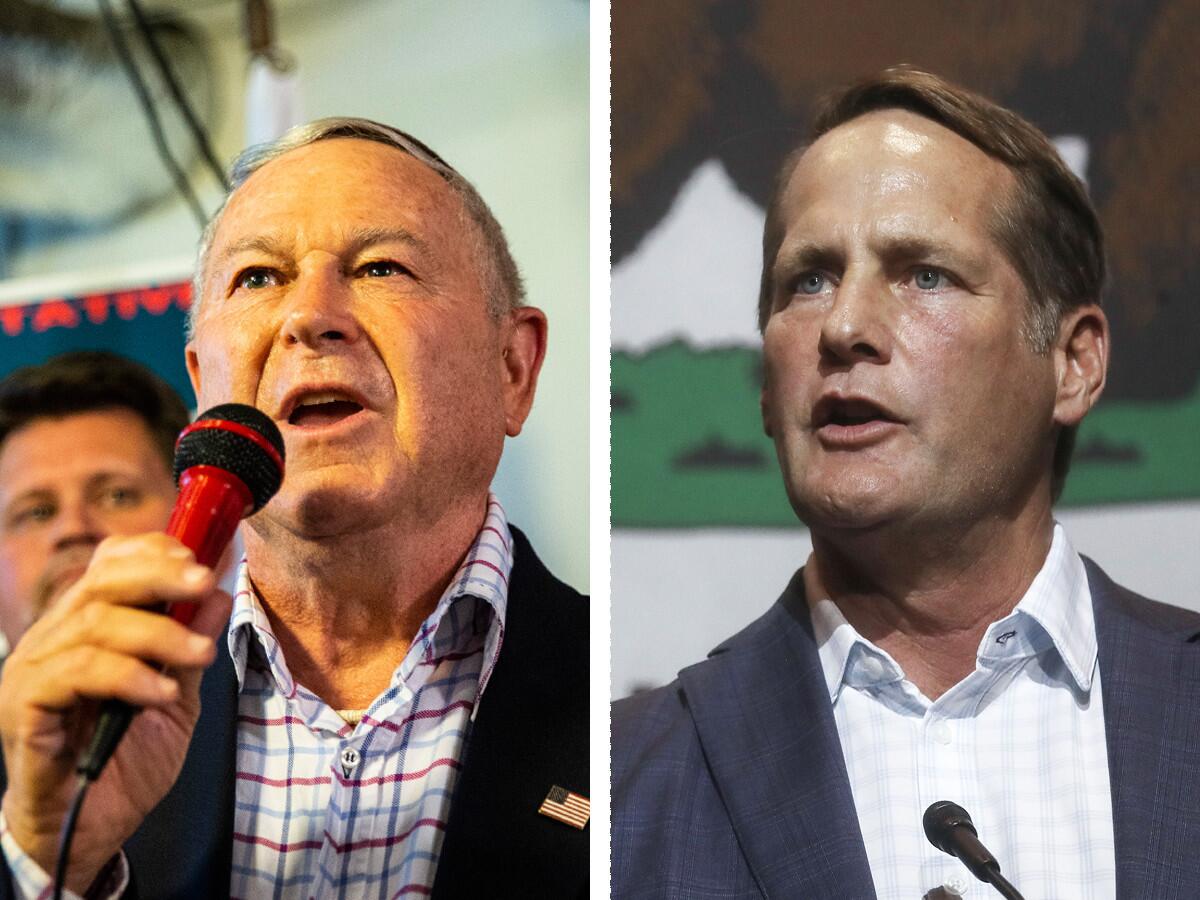
There’s not much that Rep. Mimi Walters (R-Laguna Beach) and Democratic challenger Katie Porter of Irvine agree on. Definitely not healthcare, immigration, taxes, guns or and not President Trump.
And Rep. Dana Rohrabacher (R-Costa Mesa) and Harley Rouda? These candidates couldn’t disagree more on climate change. And don’t even ask about Russia.
There are 20 candidates in races election observers have viewed as potentially crucial to whether Republicans or Democrats will control the House after the midterms.
Rallying Katie Hill’s canvassers, Rep. Schiff tells them: ‘Women are going to transform the Congress’
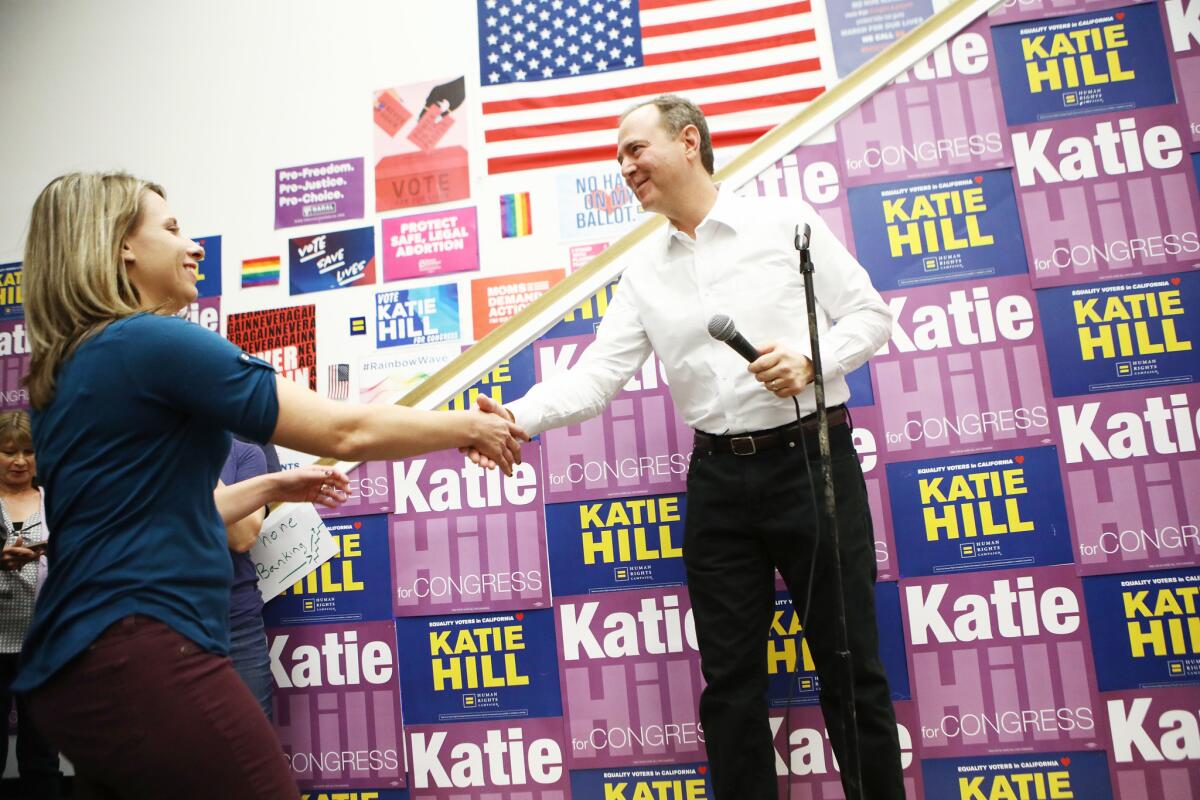
Democrat Katie Hill’s campaign sent out its final round of canvassers Monday evening with a rally push by Rep. Adam B. Schiff and a call for women to transform Congress.
A crowd of mostly women gathered in the House candidate’s Santa Clarita headquarters and listened as Schiff (D-Burbank) helped pump up the canvassers who were preparing to spread out across California’s 25th Congressional District.
“Women are going to transform the Congress, so much for the better,” Schiff said, then referred to the recent confirmation hearings for Supreme Court Justice Brett Kavanaugh. “If half of the members of Congress were women, we wouldn’t leave a credible allegation of sexual assault to be investigated in a matter of hours or days. We would take that seriously. We wouldn’t stand a president mocking the victim of assault if there were a few more women in the Congress of the United States.”
Hill is challenging two-term incumbent Rep. Steve Knight (R-Palmdale) in one of the most hotly contested House races in the state. Democratic presidential nominee Hillary Clinton won the district by almost seven points, making it a top pickup opportunity for the Democratic Congressional Campaign Committee.
Despite the loyalty Knight engenders from a district that sent him back to Congress with 53% of the vote in 2016, Hill’s supporters are confident. As of Monday night, Knight’s official Wikipedia page had been modified to say he served in Congress from 2015 to 2019 and was succeeded by Katie Hill.
Hill got assists from Schiff and Sandra Fluke, an L.A.-based lawyer and women’s rights activist who came to fame when conservative talk show host Rush Limbaugh called her names and questioned her character after she testified in favor of requiring health insurance plans to cover contraceptives in 2012.
Fluke herself made a run for office in 2014, but lost her bid for a California State Senate seat. Her own experiences on the campaign trail gave her a new appreciation for women who can stand up for themselves, she told the audience, praising Hill as someone who has been fighting for the vulnerable for much of her career.
“We know she’s too strong to be silenced, we know she is strong enough to fight for our community, and we know she’s strong enough to fight for our values,” Fluke said.
Gov. Jerry Brown rallies for Gavin Newsom in San Francisco
Gov. Jerry Brown was the main attraction at a rally for gubernatorial candidate Gavin Newsom Monday night in San Francisco, whipping up the crowd as he told them that the Democrat is the “energetic, visionary young governor” California needs.
Striking a humorous and self-deprecating tone during his short speech, Brown told the crowd that “people get a little tired of you in politics” and “luckily, we’re going from the oldest governor to one that’s pretty young.”
A few hundred people, many clutching Newsom signs, packed into a club in the Mission District for the event. Some lined up two hours early the event to secure a spot in the small venue.
Brown, who appeared at the rally with Newsom and Sen. Kamala Harris (D-Calif.), drew the most laughs of the night, warning Newsom, “I’ll be watching from the ranch. But I’m only an hour from Sacramento, Gavin, so do not screw up,”
Highlighting the deep divisions between California and Washington, D.C. , Brown said that President Trump was about “fear, fear and more fear” and Newsom was about “vision, boldness and getting stuff done.”
“Things are really screwed up, look around at what’s happening to democracy,” said Brown, citing authoritarian regimes around the world.
“And you look at our red states — crazy,” he added.
After Brown’s remarks, Newsom told the crowd that he’ll build on Brown’s “extraordinary legacy” and “take risks without being reckless.”
“California is America’s coming attraction,” Newsom said, repeating an oft-used phrase from his campaign. “The world looks to California to lead.”
San Francisco resident Lisa Matthews, who attended the rally, said Newsom will help “counter all the hate and negativity” coming out of Washington.
“I feel very good about Gavin,” said Matthews, 59. “He’s level-headed and supports people from all walks of life and isn’t spouting hate like some people.”
On election eve, Young Kim focuses on turning out her Korean American base

For at least part of her final full day of campaigning, Republican Young Kim returned to her roots.
Canvassing in a heavily Korean neighborhood in Fullerton, Kim walked — and sometimes ran — from door to door to make sure her core base of Korean American voters in the 39th Congressional District cast their ballots before Tuesday.
“I don’t take any community for granted, especially if this election is going to be decided by a few votes,” the former assemblywoman said. She and Democrat Gil Cisneros, who has also been reaching out to Asian voters, are in a close race to replace Kim’s former boss Rep. Ed Royce of Fullerton.
If elected, Kim would be the first Korean American woman elected to Congress. Korean Americans make up an estimated 4% of registered voters here.
On a Monday afternoon, few residents were home; doors with rows of shoes neatly stacked outside stayed shut.
Shane Huh drove up her driveway as Kim came knocking. When she and her husband got out of their car, Kim urged them to vote and gave them the address of their polling place. As Kim left, Huh thrust up her arms in a show of strength. “You must win!” she said in Korean.
Down the block, Sun Bok Kim paused her piano playing to answer the door and tell Kim that she’d already mailed her ballot. “I’m praying for you!” she called out as Kim walked away.
Heading to a Korean market and food court a short distance away, Kim stopped to shake hands and greet customers, many of whom recognized her.
“Annyeonghaseyo!” — “Hello!” she said to each of them. Bong Soo Lee stood behind a counter selling vitamins and said he’d already cast a ballot for her. Her political philosophy aligns with his, he said, adding that “Young Kim is a proud voice of Koreans.”
As she waited for her order at the food court, Kim chatted up Simon Oh of Buena Park, who said he respects her for her long service to the community. He’d already mailed in a ballot for her, he said. “We have to unite for Korean culture,” says Oh. “She is going to work for us and for other communities also.”
“If my community doesn’t support me, I don’t think it will look good on me, “Kim said. “I just want to make sure we turn every voter out, but especially my Korean community.”
‘I don’t want to be the coastal Democrat’: Newsom tells Central Valley supporters
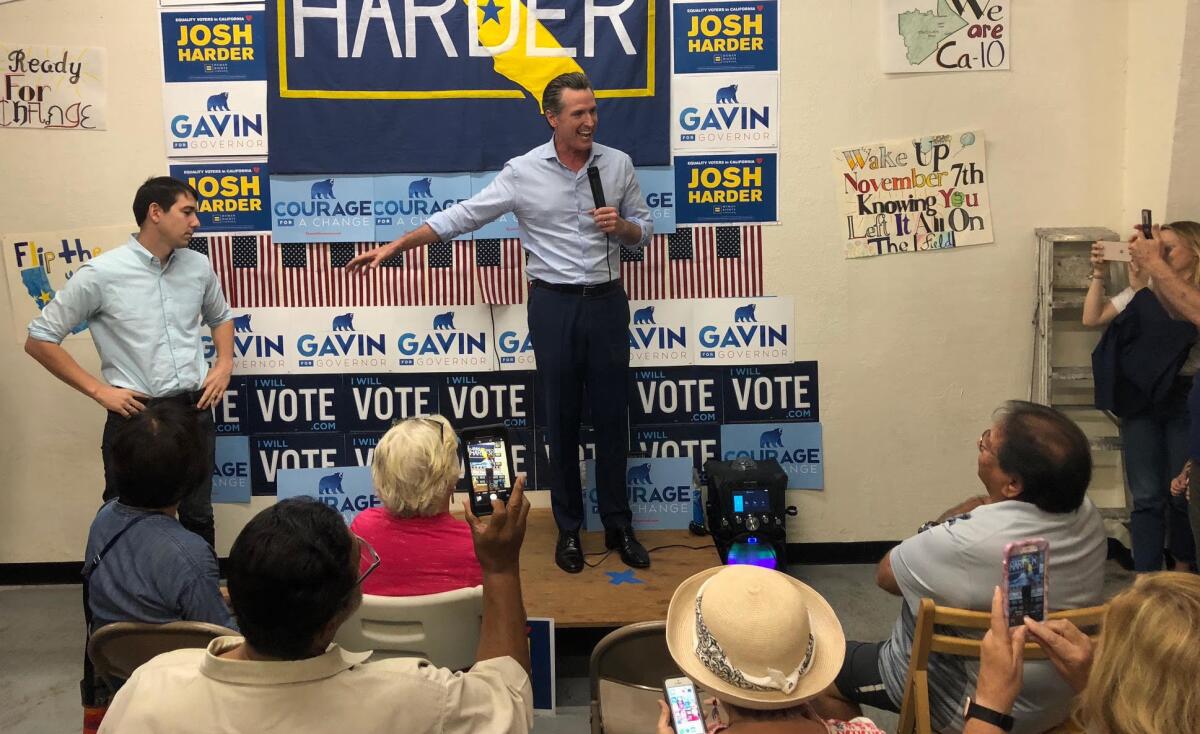
Before heading back to San Francisco on the final leg of his barnstorming tour in the race for California governor, Democrat Gavin Newsom made his final stop at the Modesto warehouse where people have poured in from across the state to campaign for fellow Democrat Josh Harder.
To the cheers of dozens of volunteers, the two-term lieutenant governor and former San Francisco mayor pledged to take on homelessness and income inequality and to fight back against a federal administration that he said goes against the values of the state and its diversity.
“It’s not a gross exaggeration that the world is looking to all of you,” Newsom said. “Californians will play the determinative role in terms of taking back this democracy.”
His opponent, Republican John Cox, who has been touring the state on his own bus, made a stop in Modesto on Sunday to rally supporters with Rep. Jeff Denham (R-Turlock). They also cast the race as a fight for the state’s future — and against the San Francisco values that they said Newsom and Harder represent.
Harder, 32, and Denham, 51, are running in a tight race targeted by national Democrats in efforts to flip the House.
Speaking to reporters afterward, Newsom looked bleary-eyed and weary but confident. When a reporter asked what his first move as governor would be, he laughed and said, “That is a real question now because this could happen in a couple hours.”
Newsom said he made his final stop in the Central Valley because he remained committed to bridging the urban-rural divide and believed Harder, who was born and raised in the district and has a background in tech, was the candidate who could help do that.
Newsom also sought to assuage residents’ concerns over water, calling himself a farmer deeply rooted to farmer’s anxieties over water and the seasons.
“I made that commitment that I am going to be a governor not just for the Bay Area, not just Northern California but the Central Valley, Southern California,” he said. “I don’t want to be a meme. I don’t want to just be the coastal Democrat.”
7:28 a.m. update: This story has been updated with additional comments from Newsom.
This post was originally published at 8:05 p.m.
Help monitor voting problems on election day
The Los Angeles Times is helping ProPublica’s Electionland, a project devoted to monitoring any voting problems that arise across the country on Tuesday.
We want to know about any problems that prevent people from voting. Whether you encounter long lines, registration problems, purged voter rolls, broken machines, voter intimidation or changed voting locations, we want to hear from you.
Your tips will help reporters investigate issues with voting across Southern California on Nov. 6 .
To let us know how your voting experience went, or to tell us if you encountered anything that stopped you or others from casting a ballot, here’s how to sign up.
Text message: Send the word VOTE, VOTA (for Spanish) or 投票 (for Chinese) to 81380 (standard text message rates apply).
WhatsApp: Send the word VOTE, VOTA (for Spanish) or 投票 (for Chinese) to (850) 909-8683.
Facebook Messenger: Go to m.me/electionland.
Twitter: Tweet @electionland to tell us about your experience.
Some Orange County Republican candidates for Congress are campaigning hard — for a state proposition
It’s down to the wire in the midterm elections, and some Republican candidates for Congress in battleground Orange County districts are campaigning hard — for a proposition on the state ballot.
In a year when polls point to enthusiasm and energy on the Democratic side, California Republicans are hoping an unpopular state gas-tax increase is what will motivate their base to get off the couch — and maybe expend some gas — to get to the polls.
That was evident in the final days leading up to Tuesday’s election, with candidates spending their precious final hours speaking at rallies for Proposition 6, which asks voters to repeal the state gas tax hike passed last year.
The legislation increased the gas tax by 12 cents a gallon (diesel by 20 cents) and imposed a new annual vehicle fee with the funds aimed toward road and bridge repairs and transit improvements.
Rep. Mimi Walters (R-Irvine) in the 45th Congressional District and Republican candidate Young Kim in the 39th each appeared at gas-tax rallies twice in the final three days of campaigning.
Walters has donated from her campaign coffers to fund the repeal effort.
Republican Diane Harkey, running to succeed Rep. Darrell Issa (R-Vista) in the 49th District, headlined a rally on Sunday.
Eager supporters greet Rep. Mimi Walters in final push to save her seat
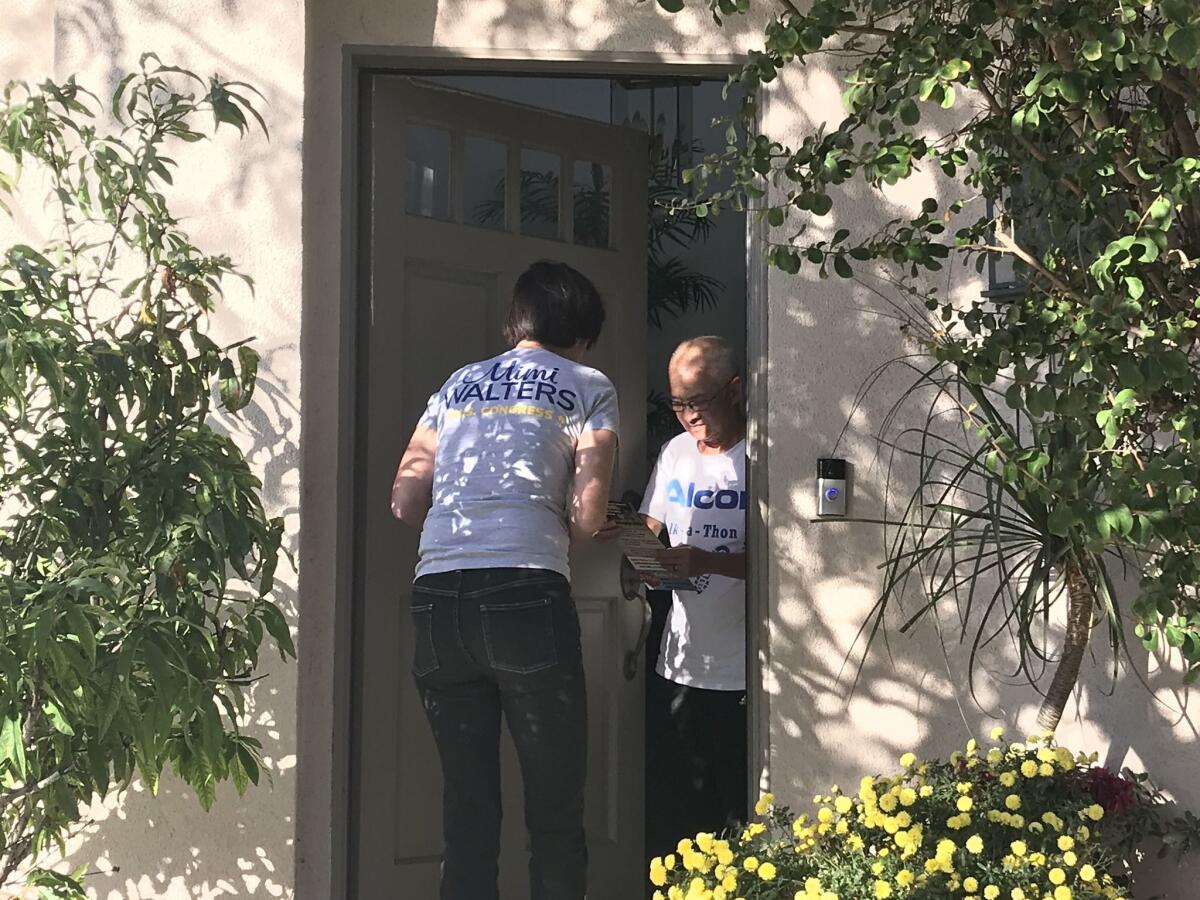
Poll numbers show the race for the House seat in California’s 45th Congressional District in a dead heat — but in the tony suburban housing tracts where Rep. Mimi Walters (R-Irvine) went knocking on doors Monday afternoon, it was all enthusiastic supporters who greeted her.
Using a voter information app, Walters was focusing her eleventh-hour efforts on getting likely supporters to the polls.
“We’ve got, let’s see…” Ray Martin, 65, said, going through the adults living in the house. “We’ve got five, you’ve got five.”
“Great, I’ve got five votes out of this house,” Walters said, pumping her fist.
“Good luck. We’ve got to keep it going,” Martin said.
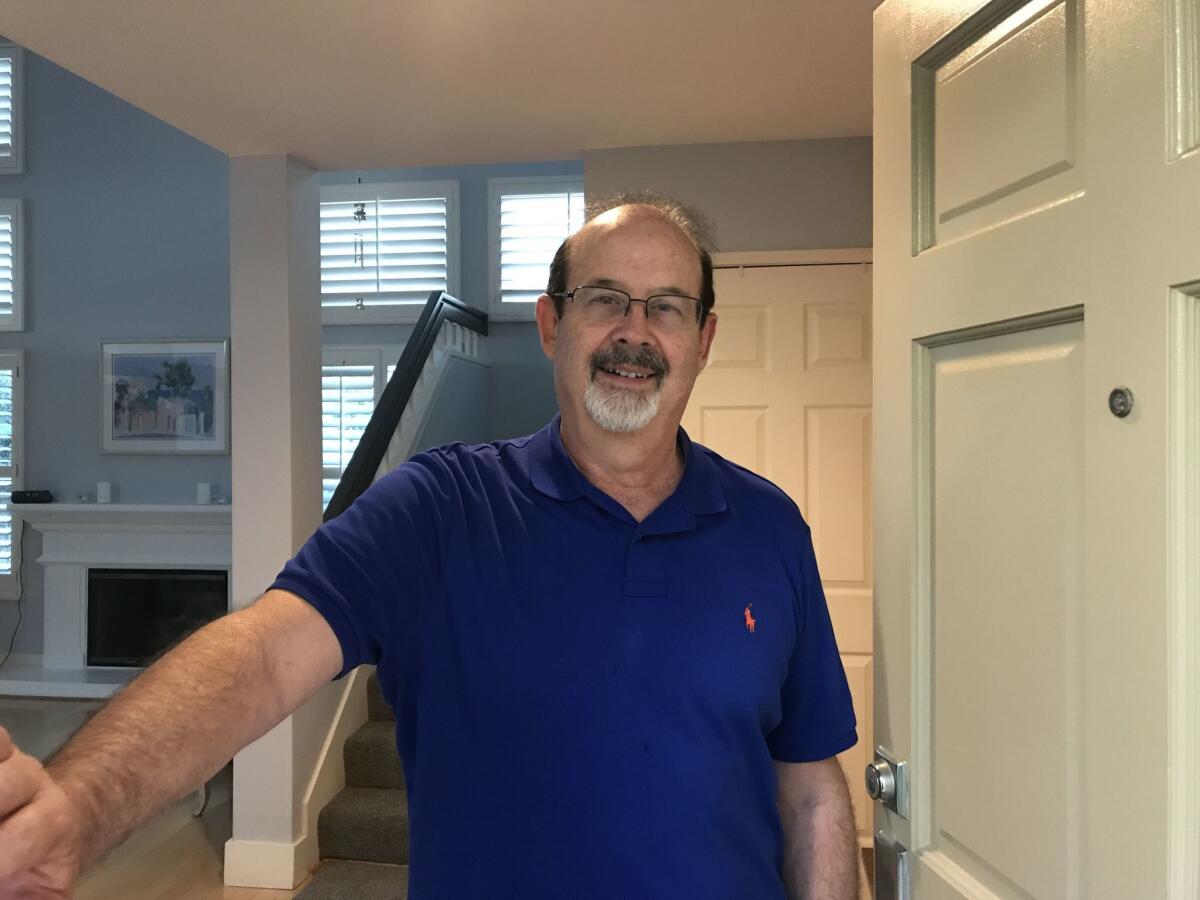
Martin said he agreed with Walters’ principles of less government regulation, lower taxes and financial accountability. He said he wanted the Republicans to maintain control of the house so they could continue the agenda he voted for in 2016 — President Trump’s agenda.
“Strong economy, a common-sense government, America first, strong borders, law and order,” he said, adding that he was puzzled by the opposition. “Feels like we’ve got something going. Why wouldn’t everyone want the country to prosper? Resist for what?”
Walters said she believed the race was close only because of the millions of dollars poured into the district by the national Democratic Party.
The policies of her challenger, UC Irvine law professor Katie Porter, “do not reflect what this community is all about,” she said.
Asked how often Trump comes up in her conversation with voters, Walters said, “Not really that often.”
A few doors down from Martin, 40-year-old Jackie Clinton also excitedly told Walters that she had her and her husband’s vote.
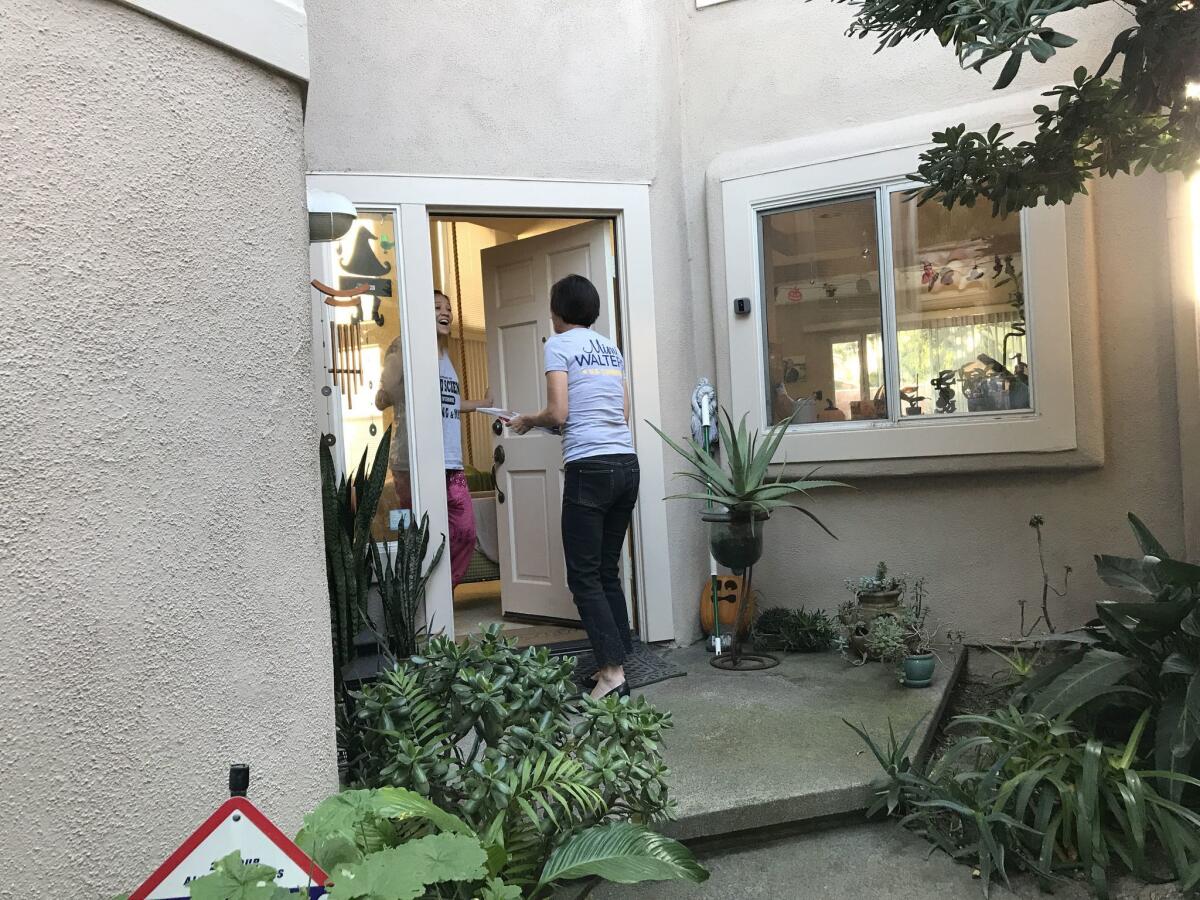
Later, Clinton told a reporter she had to keep her voice down — they had a volunteer for the Porter campaign who had been renting an upstairs room for the last two months.
Clinton, a database engineer, said they had avoided talking about their political leanings, although the volunteer may have very well guessed it from the number of firearms in the house. She said she felt strongly about fiscal responsibility and the 2nd Amendment.
“We can’t lose control of the House. We’re barely hanging on by the skin of our teeth,” she said.
In a sign of shifting demographics in the traditional Republican stronghold, which has never sent a Democrat to Congress, at least a third of the voters who came to the door were Asian Americans.
One Asian American man told Walters that 10 of his friends had all gotten together the night before and voted for Republicans across the board.
“You’re Republican, right? I love it,” he said. “We all vote for Republicans. … You’re the right one.”
Hundreds of Democrats fan out in final days of campaign in effort to unseat Rohrabacher
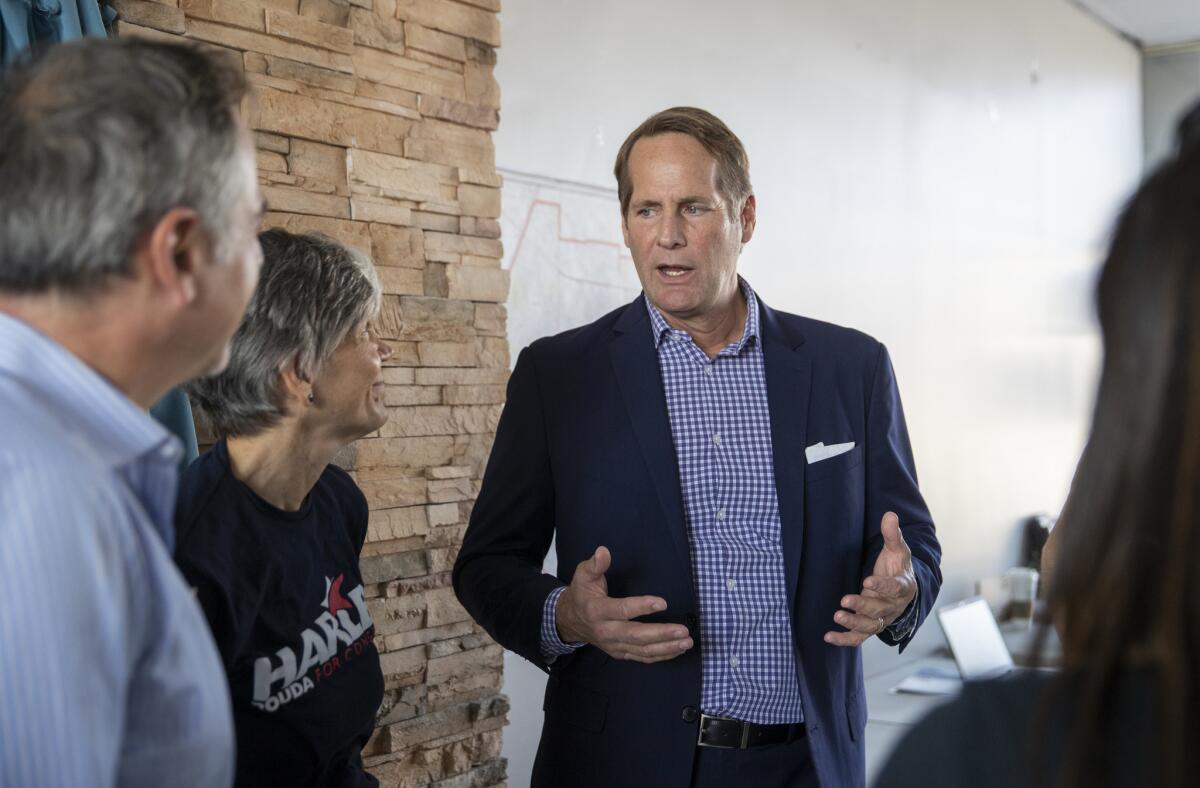
In Costa Mesa, busloads of volunteers from the Westside of Los Angeles arrived on Monday to canvass for Harley Rouda, the Laguna Beach Democrat vying to unseat Rep. Dana Rohrabacher in the 48th Congressional District, which has long been owned by the Republicans.
“This is the first time I’ve come out to canvass since 1964 and the Fair Housing Act,” said Lucie Hinden, 70, of Beverlywood. Her Democratic congresswoman, Karen Bass, is considered a shoo-in, so she came south where she might make a difference. “We were looking for very tight races.”
You can’t get much tighter than this one, according to polls. Rohrabacher has the advantage of many more registered Republicans in the district. But dislike of President Trump is high, and Rouda has run a stronger campaign against Rohrabacher than the incumbent has experienced in his 30 years in Congress.
“Just on Saturday and Sunday, we had several thousand volunteers in the field,” said Rouda’s spokesman, Jack d’Annibale. “Those volunteers knocked on 142,000 doors.”
In terms of volunteers and doors knocked, he said the campaign was the No. 1 field operation for the Democrats nationwide.
Rouda and actress Marisa Tomei rallied up the volunteers before they set out to canvass.
“I’m so grateful for all of you showing up to flip this district!” she said. “I’m here to cheer you guys on and bring this home.”
Rouda thanked his campaigners and Rohrabacher for “keeping both feet in his mouth.”
“Dana Rohrabacher thinks climate change is a global fraud; we know it’s the No. 1 issue facing humanity long term,” he said. “Dana Rohrbacher is for offshore drilling, says it’s good for the fish, and I’m dead set against it.”
What to do if you’re not on the list at your polling place
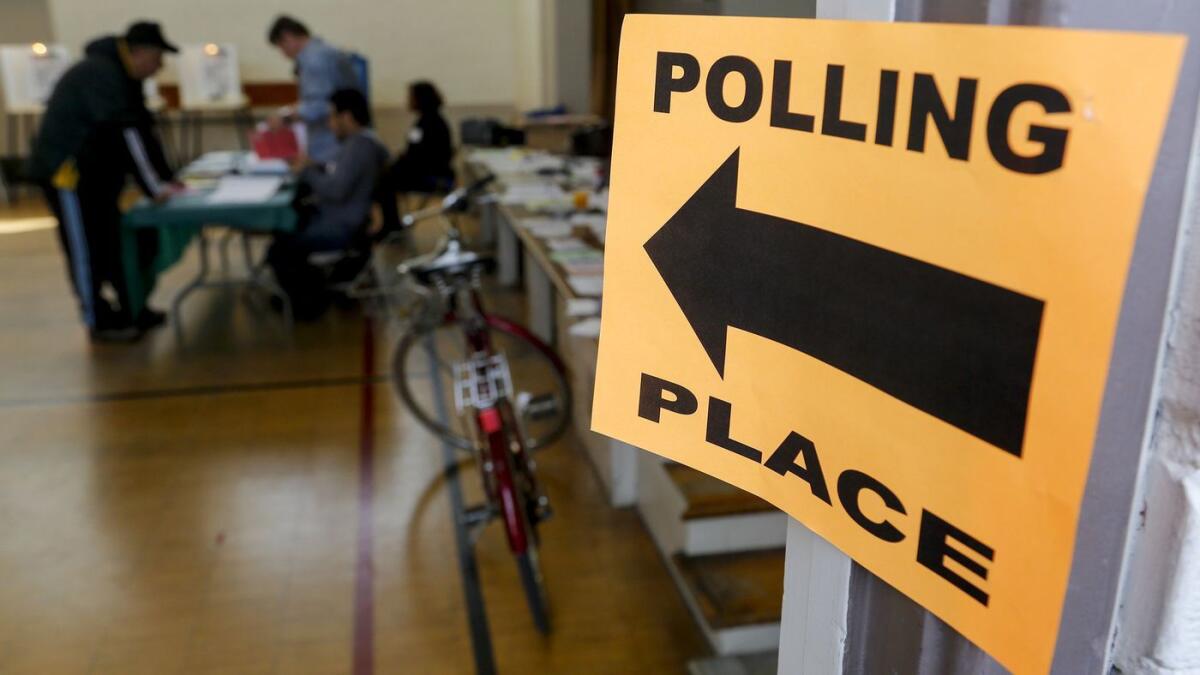
You’re registered, and election day is almost here. Now what? Here are some answers to your voting questions:
What if I go to to the polls and I’m not on the list?
The poll worker will help you. They can look up if you’re registered to vote in a different location. You can also request a provisional ballot, which you’ll fill out the same way as a normal ballot. Request a receipt for your provisional ballot and check back a few days later to make sure it was counted.
Do I have to vote in every race?
No. If you feel strongly about some candidates or propositions but not others, you can opt to leave some races blank. That’s known as under-voting. When you turn in your ballot, the machine might flag that you left some parts blank, and the poll worker will double-check that you meant to do that. You can say, “Yes, I did,” and the rest of your votes will be counted normally.
Asian American vote can be ‘key to victory,’ Rep. Judy Chu says to rally volunteers for Katie Porter
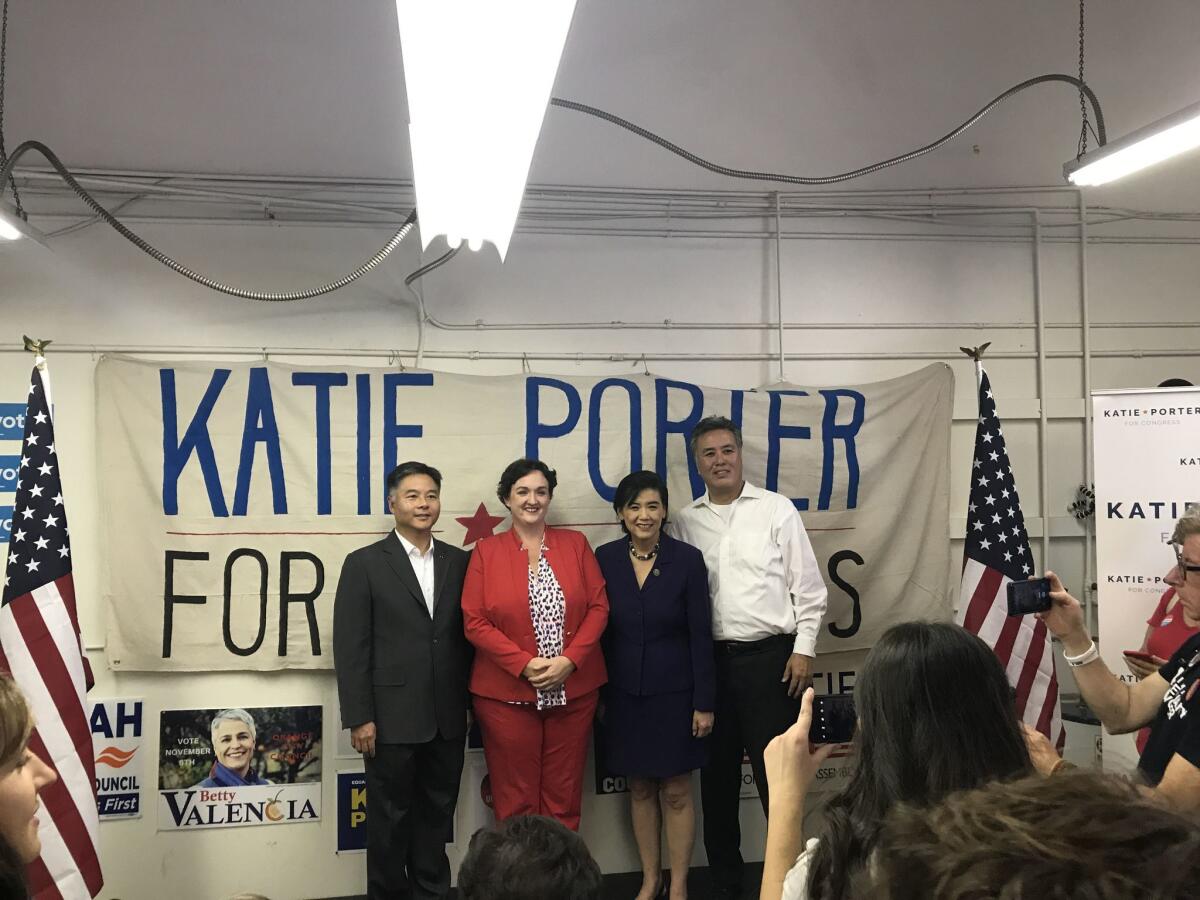
Asian American congressional representatives from California were out in full force supporting Democratic candidate Katie Porter on Monday in her bid to replace Rep. Mimi Walters (R-Laguna Beach).
Rep. Judy Chu (D-Monterey Park) noted the area’s significant Asian American population and said getting those voters out could get Porter over the finish line.
“If they all vote for Katie Porter, guess what, they can be the key to victory,” she said to dozens of eager volunteers.
The 45th Congressional District is nearly a quarter Asian American. Even so, that population makes up only 13.5% of registered voters.
Rep. Ted Lieu (D-Torrance) was at Porter’s Tustin campaign offices with his parents, who live in the district, in Irvine. He talked about how Republicans had major fundraising powers on their side, but “they don’t have people.”
“We have people, we have you,” he said to the volunteers, most of whom were not Asian, “You can be the margin of error.”
Anna Zeng, 18, was canvassing a second time for Porter. She said she had been politically apathetic until the deadly school shooting in Parkland, Fla., which jolted her into getting involved.
“I realized, like most of my generation, no one else is going to fight for us,” said the college freshman. “The adults aren’t going to do it.”
She organized walkouts at her high school and helped her mother register to vote for the first time. She’s been Skyping, calling and texting friends to get them out to the polls Tuesday, she said.
Steven Chen, 56, has been volunteering for political campaigns for decades but said he saw many others in the Chinese immigrant community newly energized since the 2016 election.
“I can see the passion,” he said.
Chen, who works in IT, said he was initially a Republican when he first became a citizen but became a Democrat about 20 years ago because he cared about the environment for his children.
Rep. Adam Schiff talks about renewing Russia probe if Democrats flip the House
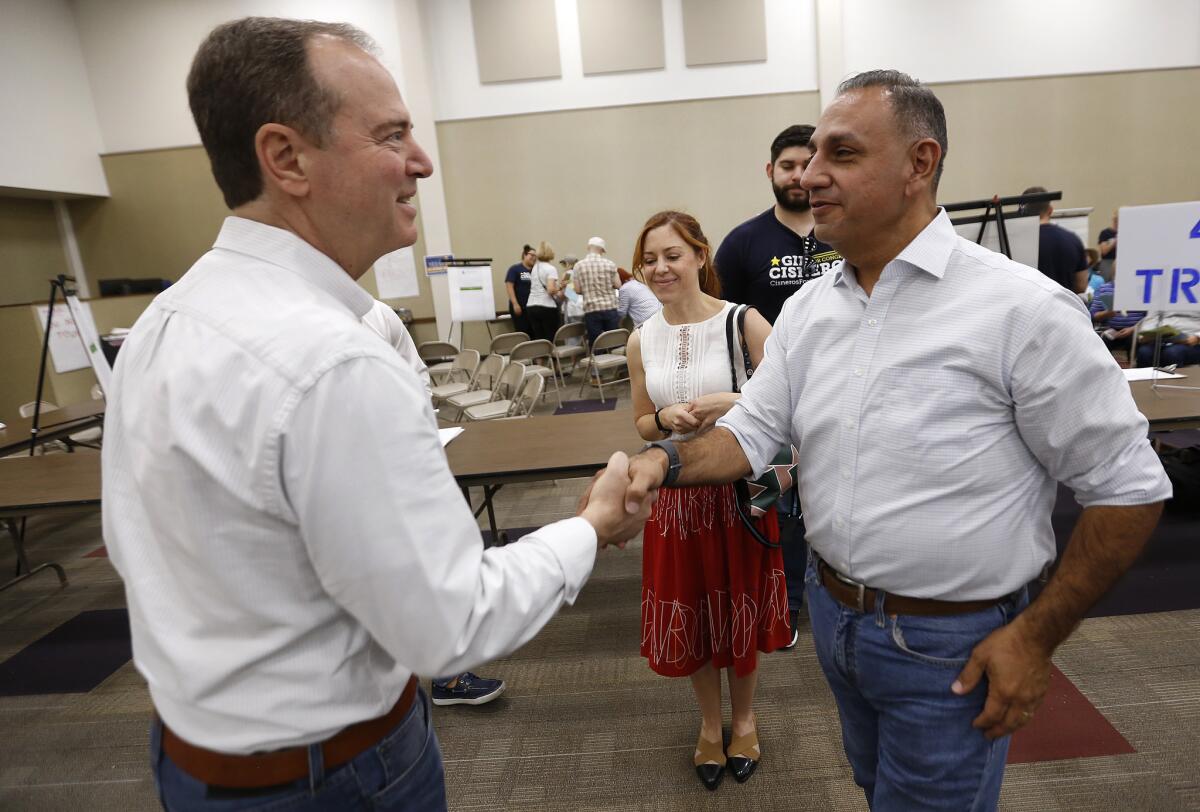
With fewer than 24 hours before polls open, Rep. Adam B. Schiff (D-Burbank) spent Monday afternoon stumping with Democrat Gil Cisneros, who’s locked in a tight battle with Republican Young Kim to replace her former boss Rep. Ed Royce (R-Fullerton).
Schiff, ranking member of the House Intelligence Committee, said he was feeling optimistic about Democrats’ chances of netting the 23 seats they need to take back control of the House. If they succeed, Schiff is widely expected to take over as chair of the committee tasked with investigating Russia’s meddling in the 2016 election.
“We’re not taking anything for granted,” Schiff said, but laid out his priorities as the committee’s chair if control of the House flips. Reviving the investigation into Russia’s election meddling is at the top of the list, Schiff said, and also probing whether Russia has financial leverage over President Trump through his business interests.
“The president has sought to keep that off limits, but if that’s the leverage Russians pose that’s a real threat to our country,” Schiff told The Times.
The Republican-led committee ended its investigation into Russian meddling by saying no evidence was found of conspiracy between Trump’s team and Russians. Democrats said the majority had only conducted a superficial probe.
Another priority would be repairing the rift between Congress and the intelligence community, which he blamed on the release of a controversial memo by House Intelligence Committee Chairman Devin Nunes (R-Tulare). The memo made allegations that the FBI did improper surveillance of a former Trump campaign advisor during the 2016 election, a charge Democrats and the FBI have denied.
On stage, Schiff laid out the stakes of the election for several dozen volunteers gathered to knock on doors.
“It is not just that we have a deeply unethical man in the Oval Office,” Schiff said. “What has our Republic trembling right now is that he has a Congress that is deeply complicit in what he is doing...That changes tomorrow.”
Times staff writer Chris Megerian contributed to this report.
‘We are pro people not dying.’ Parkland students captivated the nation, but will their message resonate on election day?
They’ve held hundreds of rallies including a massive gathering on the National Mall, appeared with Trevor Noah and other late-night television hosts, and challenged elected officials to face-to-face debate.
But nine months after the teenage students from Parkland, Fla., were thrust to the fore of America’s daily political discourse following the mass shooting at Marjory Stoneman Douglas High School, their calls for gun control, and for registering and turning out young voters, have been largely overtaken by the nation’s daily crush of controversies.
While the effort they ignited was viewed early on as a possible tipping point, even the slaying of 11 people in a Pittsburgh synagogue last weekend with weapons that included an assault rifle triggered a muted response concerning gun control.
‘We are building a foundation’: Democrat Andrew Janz’s supporters hopeful for a win against Rep. Devin Nunes despite the odds
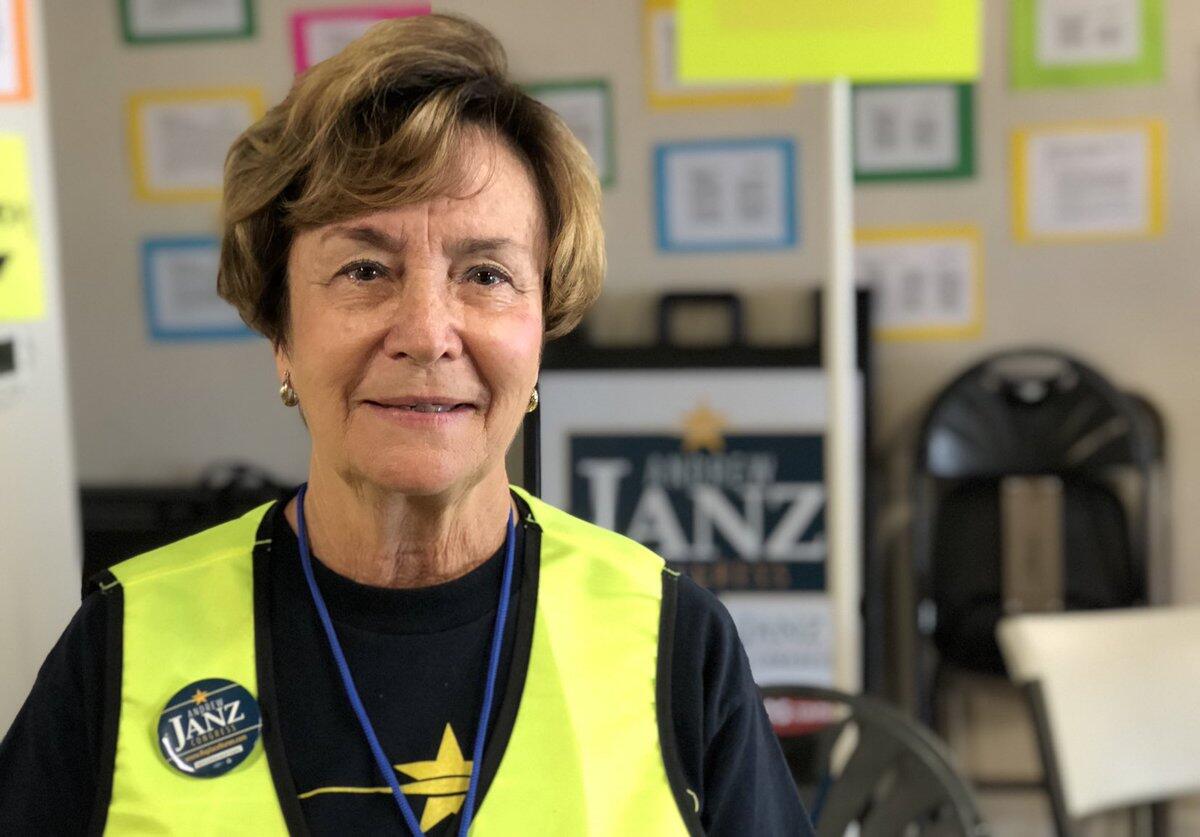
Republican Rep. Devin Nunes is beloved by his supporters in this rural Central Valley district where GOP registered voters safely outnumber Democrats. But that hasn’t stopped 71-year-old Patty Lennon from working to unseat him over the last year.
The retired kindergarten teacher on Monday was one of dozens of volunteers helping to coordinate and train canvassers making a final push for Democrat Andrew Janz. Like many Janz supporters there, she said Nunes had lost his way and is playing into President Trump’s hands at the expense of his constituents.
“I don’t see it as a Republican or Democrat thing,” she said, decked in a yellow traffic vest and jeans. “I see it as doing what is best for the Valley. People thought we needed a change in 2016, and I think we need that change for seat 22.”
Janz, a 34-year-old Fresno County prosecutor, decided to challenge Nunes after the election of Trump. He poses the most serious competition Nunes, an eight-term incumbent and highest-ranking member of the House Intelligence Committee, has faced in years. But the odds against Janz are so high that national Democrats chose not to fund him in the solidly Republican 22nd Congressional District.
Spanning the more conservative parts of Fresno and Tulare counties, the district has a voter registration advantage of nine percentage points over Democrats and Trump beat Hillary Clinton here by nearly 10 points.
Nunes, 45, defeated his last Democratic opponent by roughly 35 points. He has spent much of his political career focused on water storage and irrigation. But he’s faced scrutiny in the last year over his actions to protect Trump from the Russia investigation, his family’s out-of-state dairy farm and what critics call his lack of responsiveness to constituents. Janz’s supporters are optimistic that Nunes has lost enough ground that the Democrat has a chance.
Janz’s campaign office in a North Fresno shopping center was buzzing. Lennon said she felt hopeful and teared up at the prospect of his victory amid a year of hurtful rhetoric from Trump, immigrant children in cages and deadly violence at a Pittsburgh synagogue. Even if Janz lost, she said, she would remain positive.
“We are building a foundation to move forward,” she said. “If it is not this time, it will be next time.”
Nearby, Daniel Schwartz, 57, was preparing to knock on doors. He came to volunteer for the first time, frustrated by what he called a false narrative from Nunes that Janz supporters are “communist radicals” and “San Francisco liberals.”
“People in the community need to realize that we are other people like them,” the Fresno landlord said. “We are their neighbors.”
How to get a free ride to the polls on election day
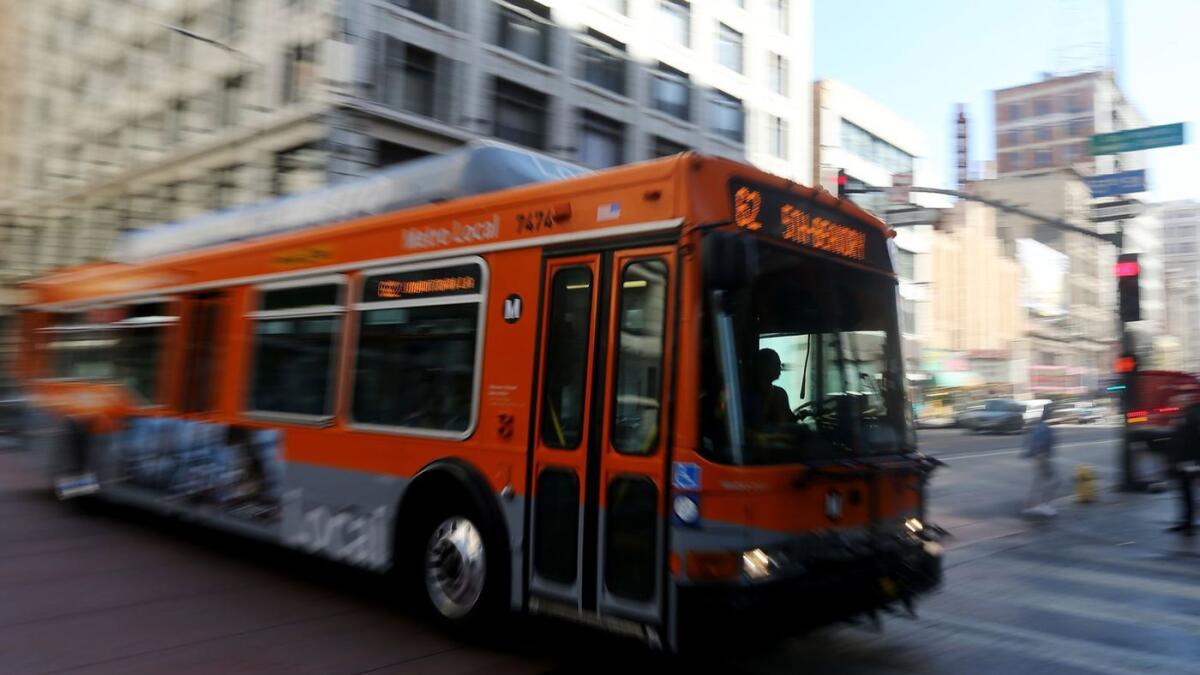
On Nov. 6, rides on L.A. Metro’s six rail lines and 2,200 buses will be free from 12:01 a.m. to 11:59 p.m. Eliminating the $1.75 fare for a day will cost the agency an estimated $600,000, officials said.
Metro will also offer a free one-way ride on its bike-share system, which has stations in Venice, Echo Park and downtown Los Angeles. Users should enter the code 1162018 to waive the $1.75 fee.
The nation’s two largest ride-hailing companies, Lyft and Uber, are also offering discounts and subsidies to some voters through partnerships with voter turnout organizations.
6 House races to watch in California as election day approaches
Democratic candidates are raising staggering sums of money, driven mostly by increased enthusiasm by donors on the left and aided by ActBlue, the online fundraising platform for progressive candidates.
It’s especially pronounced in California, where the GOP is badly diminished after more than two decades of decline brought about by political and demographic changes.
U.S. House candidates are making their final pushes across California one day before the midterms. Here are six competitive races to pay attention to:
- 25th Congressional District: Rep. Steve Knight vs. Katie Hill
- 39th Congressional District: Young Kim vs. Gil Cisneros
- 45th Congressional District: Rep. Mimi Walters vs. Katie Porter
- 48th Congressional District: Rep. Dana Rohrabacher vs. Harley Rouda
- 49th Congressional District: Diane Harkey vs. Mike Levin
- 50th Congressional District: Rep. Duncan Hunter vs. Ammar Campa-Najjar
Polls point to Democratic takeover of the House, but here’s what could change that
With the final polls finished, the last ads cut and well over 35 million people already having voted, political operatives in both parties expect Democrats to win back control of the House on Tuesday and make significant gains in state capitals even as Republicans keep narrow control of the Senate.
But as President Trump’s victory in 2016 showed, upsets do happen. And in this election, several factors exist that could change the expected results — in either direction.
Among the big question marks:
First-time candidates aim to unseat seasoned politicians in California House races
The only formal office Jessica Morse has ever held is president of her high school Key Club.
Now the 36-year-old Democrat is in the final days of a campaign to unseat U.S. Rep. Tom McClintock, a Republican from Elk Grove who’s spent decades in elected office.
Morse, a former national security consultant, is going up against an incumbent with a reputation as a anti-tax, limited-government conservative in a district with the highest concentration of Republicans in California.
In Orange County, land of reinvention, even its conservative politics is changing
In La Palma Park Stadium in Anaheim, a month before the Bay of Pigs invasion, 7,500 students and parents skipped school or work and gathered to learn about communist plans to take over the United States.
“Right now, we have a 50-50 chance of defeating the communist threat,” Herbert Philbrick, a former FBI agent, told the crowd on March 8, 1961. “Each day our chances grow less.”
Walter Knott, of berry-farm fame, sponsored the five-day “Christian Anti-Communist School” to help Orange County see the world that he saw, one where big government and liberalism led to Soviet domination.
NBC to pull controversial Trump campaign advertisement
NBCUniversal said Monday that it is pulling President Trump’s controversial campaign advertisement — hours after the spot ran prominently during “Sunday Night Football.”
The 30-second advertisement, which Trump unveiled last week, features images of long lines of people marching, evoking a group of migrants currently making their way through Mexico, and images of Luis Bracamontes, a man who killed two Northern California deputies in 2014 while he was in the country illegally.
Who says young people are unengaged? These folks are organizing, running for office and definitely voting
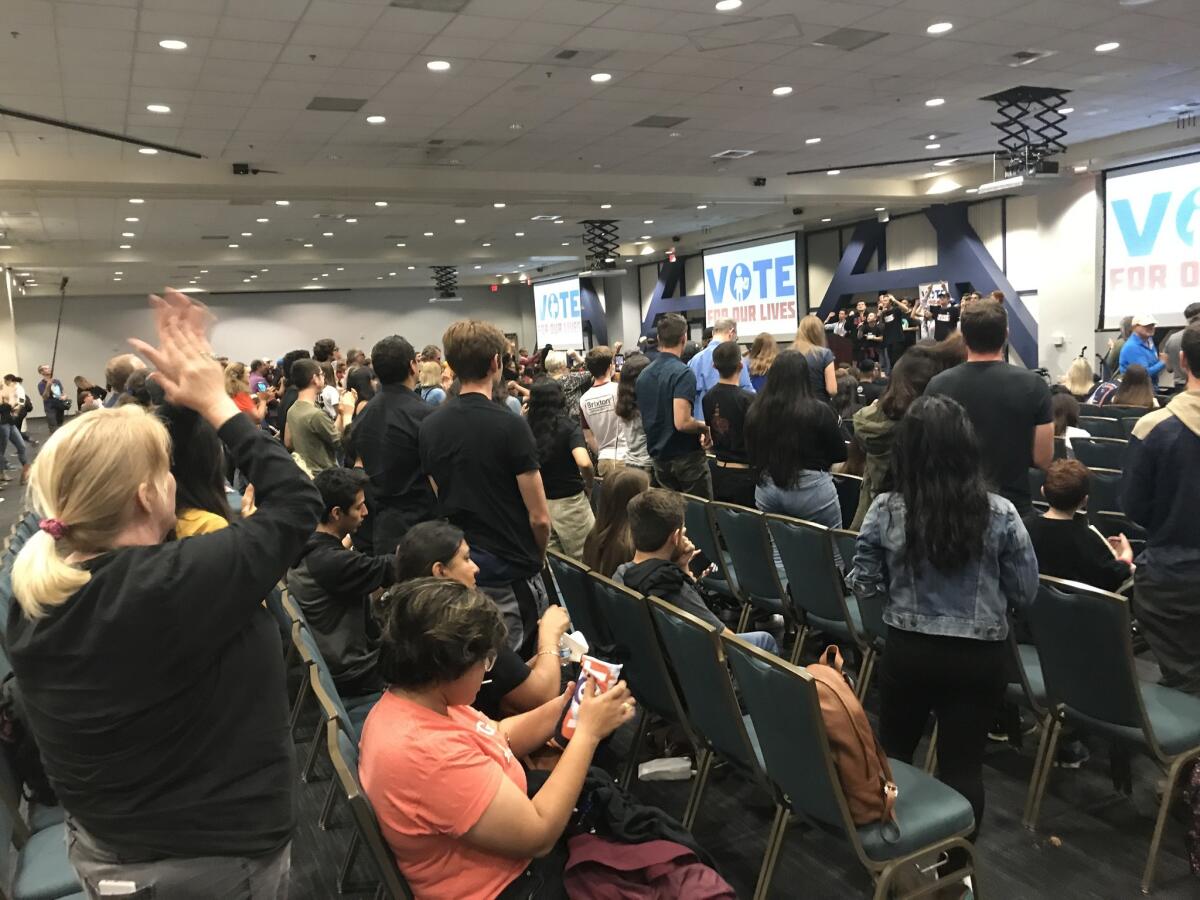
What’ll it take to get young people out to the polls on Tuesday?
If Sunday night’s rally at UC Irvine is any indication, they’re drawn to a cappella with a sick beat, free popcorn and cotton candy — and fellow young people with an inspiring message.
A crowd a couple hundred strong chanted, cheered and gave standing ovations as teenage activists from Marjorie Stoneman Douglas High School took the stage at a campus ballroom to get the young adults of Orange County excited to vote.
There were celebrities — comedian Chelsea Handler and actress Natalie Morales — and Democratic congressional candidates Harley Rouda and Gil Cisneros, who each took a turn at the mike at the “Vote for Our Lives” rally.
But it was fellow students who seemed most able to pump up the crowd.
“There is no generation B. It has to be this generation,” said David Hogg, one of the Parkland, Fla., student survivors-turned-activists.
Hogg was followed on stage by three Orange County students who are running for local city councils in San Clemente and Mission Viejo.
Jackson Hinkle, a 19-year-old candidate for San Clemente City Council, said issues like gun violence and the environment made the election pressing for young voters.
“We’re fighting for the existence of our generation,” he said.
In the audience were fellow young people flying in the face of the stereotype that young people aren’t engaged.
Carly Shaffer, 18, had driven up from San Marcos in northern San Diego County with her mother and sister. Shaffer had spent the morning canvassing as she has been most weekends. During the primaries, when she voted for the first time in her life, she showed up so early she was first in line at her precinct.
“I realized my voice wasn’t going to be heard unless I made it heard,” said Shaffer, who organized three walk-outs at her school as part of a nationwide campaign against gun violence, as she chowed down on popcorn. She said she would not have been nearly as active had Hillary Clinton won the presidency.
UC Irvine freshman Serena Torres said she definitely planned on voting on Nov. 6. It’s her birthday, and she’ll be turning 18.
Torres said her mother, a judge who is politically active, had drilled in her the importance of voting because of all those who fought for women to have the right to vote.
Rep. Dana Rohrabacher describes midterms as a battle between billionaires and patriots
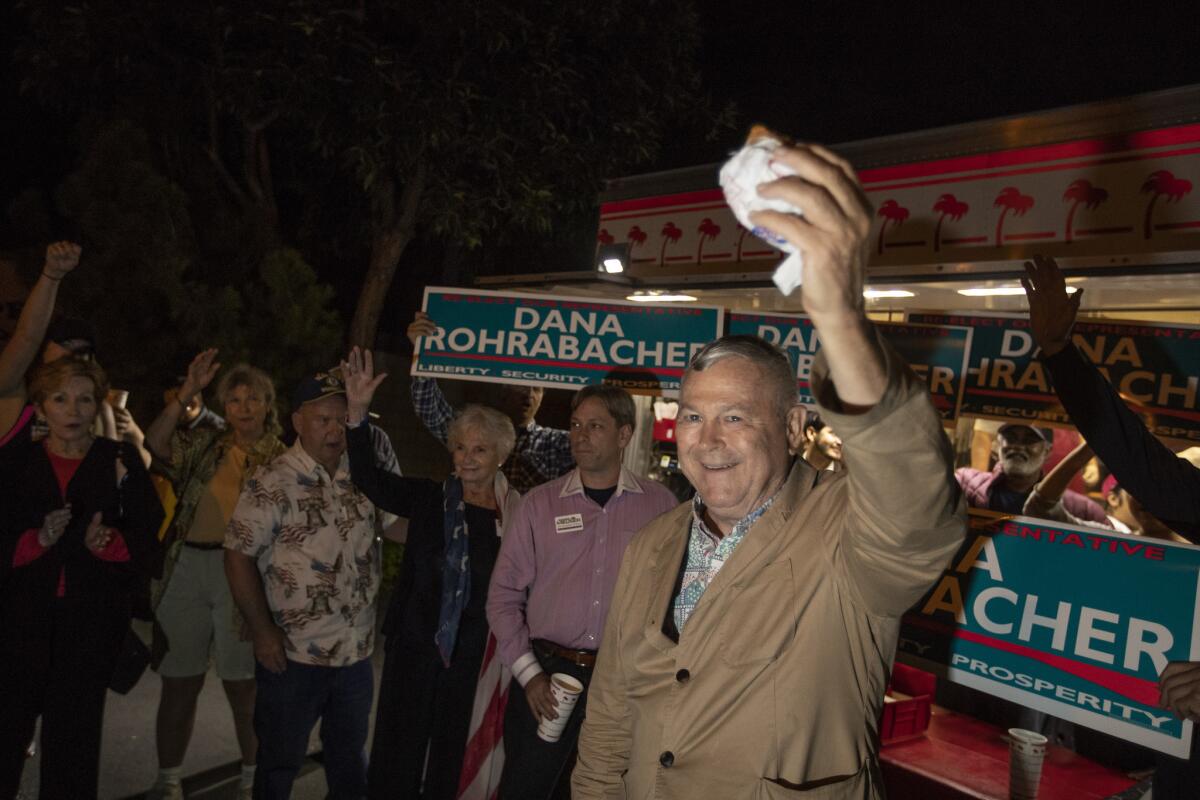
Republican Rep. Dana Rohrabacher treated his supporters to burgers with a side of gratitude at a volunteer appreciation event Sunday night.
The 71-year-old congressman mingled with almost 50 volunteers and fellow Republican politicians in the parking lot of his headquarters in Costa Mesa, in California’s 48th Congressional District.
Children tore through the parking lot while In-N-Out employees shouted order numbers from inside their truck.
In brief remarks at his only campaign event of the weekend open to the news media, Rohrabacher cast the midterm elections as a battle between billionaires seeking to influence regional politics and local patriots.
“These people are trying control this election with their billions of dollars and try to undercut this president,” he said. “I can tell you today we the people are behind the president.”

In a speech to supporters, Rep. Dana Rohrabacher described the upcoming midterm election as a battle between billionaires seeking to exert influence from afar and local patriots who needed to make their voices heard.
The 15-term incumbent is facing a tough challenge from Democrat Harley Rouda, whose campaign has outraised Rohrabacher’s by almost $5 million this cycle. A political committee backed by former New York Mayor Michael Bloomberg is spending $4 million on ads opposing Rohrabacher.
The hotly contested race is one of at least seven in California that could help determine whether Democrats are able to flip control of the House.
In a tweet that appeared within two hours of Rohrabacher’s event ending, President Trump pointed out the “vast sums” Democrats were spending. Trump also praised Rohrabacher as a congressman who works hard and produces for his district.
Fred Whitaker, chairman of the Republican Party of Orange County, said a combination of Republican experience and effort should be enough to stave off the challenge.
“We’ve been running races for a long time,” he said.
Rohrabacher has faced criticism over his friendliness with people connected with Russia’s government. And his disregard of the scientific consensus that human activity is driving climate change has brought him attention nationally.
But local supporters highlighted Rohrabacher’s accessibility and attention to local issues.
Mehrdad Sharif, 50, an anesthesiologist who lives in Laguna Niguel, said he supported Rohrabacher because of what he described as “incremental policies” that helped both the district and the country.
“He’s always out and about in the community, always having events,” said David Taylor. The Irvine native gestured at the lawmaker, who was working his way through the crowd with handshakes and photos. “Look, he’s taking a picture right now. It doesn’t get more responsive than this. You can just go right up to him and talk to him.”
Assemblyman Matthew Harper (R-Huntington Beach), whose district overlaps with the 48th, said he was there to show party solidarity.
“Unified Republicans, especially here in coastal Orange County, win when we stick together,” he said. “Congressman Rohrabacher is someone who we’ve always been able to count on ... he’s a very principled conservative, and he very much reflects this coastal Orange County area.”
Harper and his staff have been putting in 12-hour days, he estimated, as they seek to fight off a well-funded Democratic challenger of their own.
In rejoining Rohrabacher’s reelection efforts, Harper brought his political career full circle: The Huntington Beach native recalled volunteering for Rohrabacher in 1988, when he was a student at Huntington Beach High School.
Read more about the 48th District candidates’ stances on the issues.
Here’s a look at the 11 propositions California voters will weigh on Nov. 6
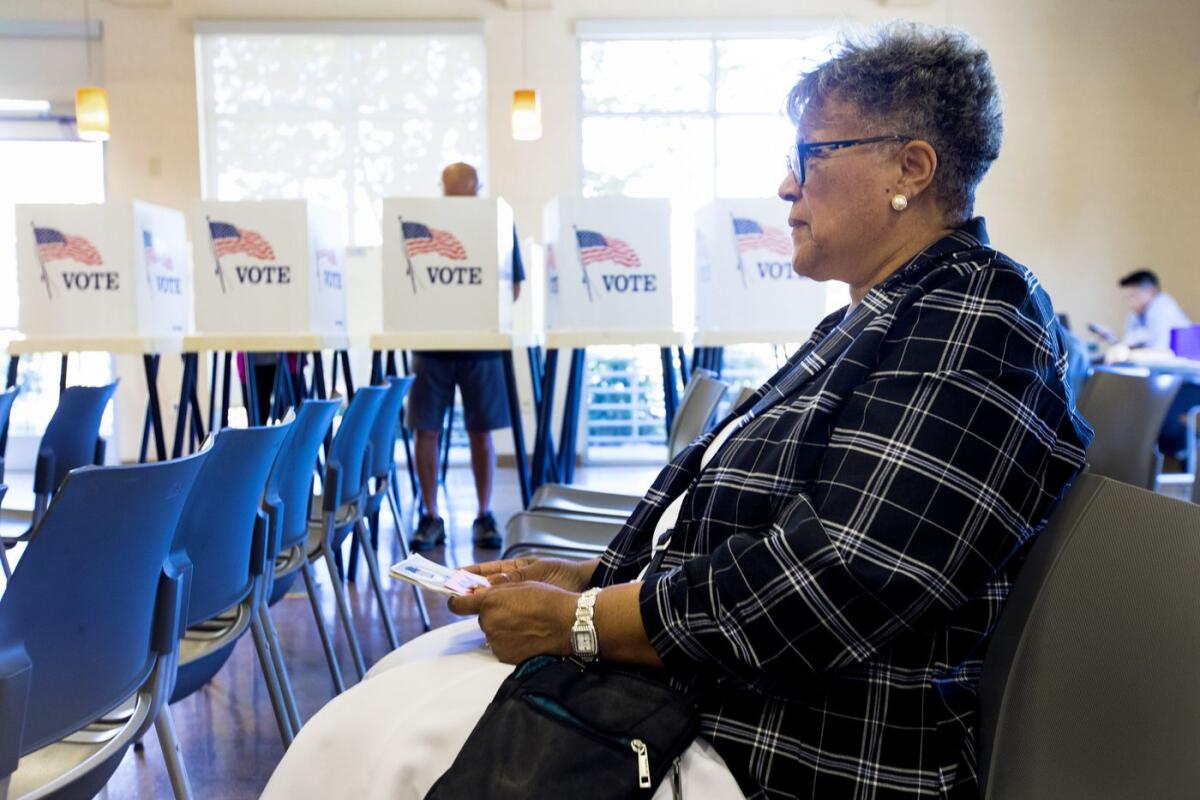
As Californians consider the complicated questions posed by the propositions on the 2018 statewide ballot, they can take some solace in knowing that the list could have been much longer.
A handful of proposals were pulled off the ballot; one was removed by the courts, another was canceled after a legislative deal in Sacramento, a third was just abandoned by its backers, who faced a potentially expensive campaign. But 11 other propositions remain, several sparking multimillion-dollar advertising campaigns that will flood the airwaves and voter mailboxes through election day.
It’s a campaign frenzy as House candidates make their final dash across Central Valley and Southern California
Gil Cisneros didn’t just amble into the final weekend of the midterm election. He ran.
The Democratic congressional hopeful, vying in a tight contest for an open Orange County seat, began a final flurry of get-out-the-vote activities by participating in the O.C. Pumpkin Run, a 5K charity race in Fullerton.
Immediately after, still in running clothes, Cisneros raced to a Buena Park union hall to address more than 100 supporters gathered to make phone calls and knock on doors on his behalf.
Will California flip the House? Here are the key races to watch
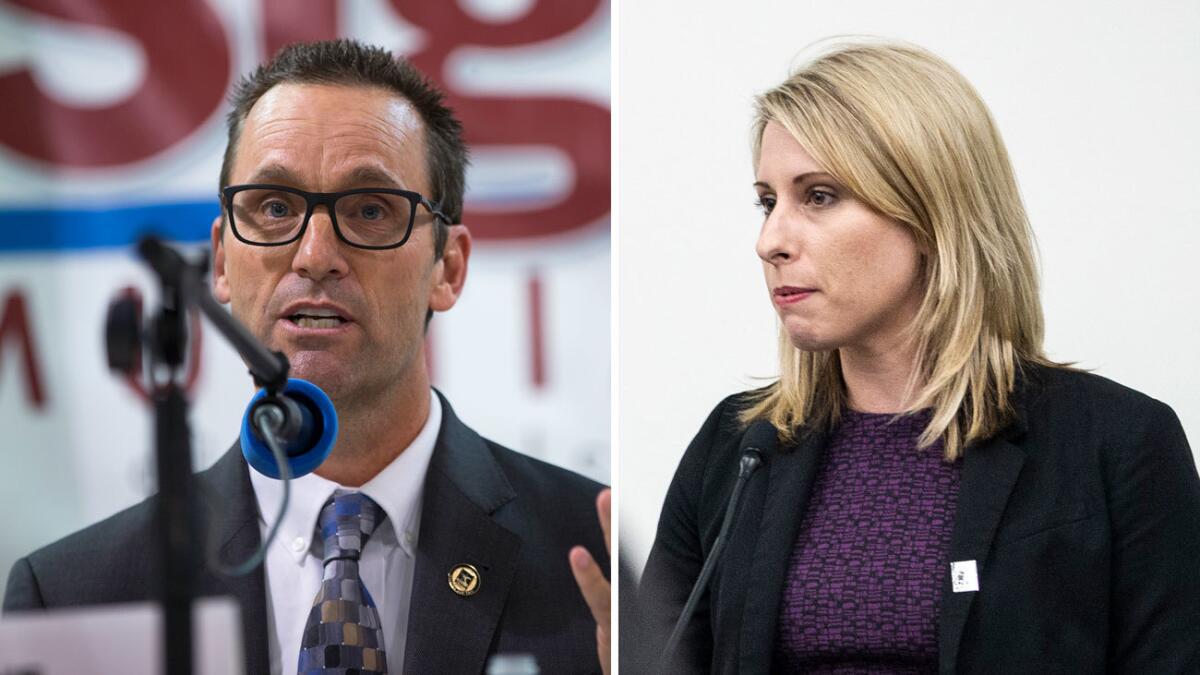
The Nov. 6. midterm elections are shaping up as a referendum on Donald Trump’s presidency, and California is one of the main battlefields as Democrats try to seize control of the House.
The party that holds the presidency typically plays defense in a midterm vote, but Trump’s unpopularity in much of California is driving an extraordinary surge of voter hostility toward Republicans.
Democratic candidates here are raising staggering sums of money, driven mostly by increased enthusiasm by donors on the left and aided by ActBlue, the online fundraising platform for progressive candidates.
The pitched election battle over healthcare is personal for many Southland voters
A few short years ago, Kim Adams couldn’t have told you the name of her representative in Congress.
That changed last year, when Republican Rep. Mimi Walters voted to repeal the Affordable Care Act as Adams watched live on C-Span from her home in Tustin. News cameras showed a smiling Walters taking a celebratory selfie in the White House rose garden after the vote on the Obama-era healthcare law.
That, Adams said, made things personal. After she was diagnosed with multiple sclerosis in 1999, Adams lost her small business as her health deteriorated and she eventually got to a point where she could no longer afford her health insurance premiums. For three years, the single mother was uninsured and unable to get treated for her MS — until the Affordable Care Act kicked in. And her congresswoman had voted to take it away.
What you need to know before the midterm election
The midterm is fast approaching. How many races are actually competitive? Which polls should you trust? And why is California so important this year? Here’s what you need to know before the Nov. 6 election.
Here’s the main thing to keep in mind about the contest for control of the House this year: About 5 out of 6 seats in Congress really aren’t in doubt. They’re either heavily Democratic or heavily Republican, and they’re not likely to flip.
The battleground consists of roughly 60 to 70 districts nationwide, nearly all of which are in territory that Republicans have held for years – in some cases for decades. Democrats have to net at least 23 additional seats nationwide to get a majority. At least half a dozen seats in California are strongly competitive.
A record number of women are running for office. This election cycle, they didn’t wait for an invite
A record number of women are running for the U.S. House, Senate and state legislatures this year — more than any other election in U.S. history.
Traditionally, the major political parties scout out their potential candidates. And typically, says Debbie Walsh, director of the Center for American Women and Politics at Rutgers University, men are sought after more than women.
But in the two years before the 2018 midterm election, amid marches for women’s rights and the growing #MeToo movement, something shifted in a field that has historically paved an easier path for men:
Republicans remain favorites to hold control of the Senate. A look at the key races
Republicans currently control the Senate 51-49.
Democrats need to flip at least two seats to become the majority, which would give them the ability to block additional Trump appointees to federal judgeships and a stronger hand in legislation. But gaining those two additional seats is a tall order.
The 35 Senate races this year include a disproportionate number of Democratic incumbents trying to hang on in conservative states. With 29 seats to defend, compared with just six for the GOP, Democrats will be hard pressed to avoid losing ground, much less gain any.
These are the billionaires hoping to influence elections that will determine control of Congress
One is the world’s richest person, another has been described as a “chain-smoker who often dresses without socks,” and yet another has changed political parties twice, most recently this year.
With the election just around the corner and their party on the defense, Republicans have railed against Democratic billionaires pouring big money into this year’s midterm. But the top political donors of the closely watched battle for control of Congress are a bipartisan and varied lot.
Of the top dozen individuals or family donors, half fund Democrats, five support Republicans and one, Jeff Bezos, has chosen to put nearly all of his contributions toward nonpartisan groups, according to data compiled by the nonprofit Center for Responsive Politics.